
Related News Around the Country and County
July 2

Semafor, Republican megabill faces tallest hurdle yet, Mike Johnson, Eleanor Mueller and Shelby Talcott, July 2, 2025. It’s a make-or-break day for President Donald Trump and House Speaker Mike Johnson as 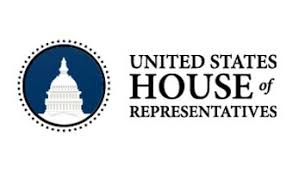 their teams look to muscle the party’s mammoth tax-and-spending bill through the House as-is.
their teams look to muscle the party’s mammoth tax-and-spending bill through the House as-is.
This is their last hurdle and also, potentially, their tallest: The version the Senate passed Tuesday irked both conservatives and moderates by trimming less in spending and more from Medicaid, respectively.
Letters from an American, Historical Commentary: July 1 [Trump’s Budget Bill], Heather Cox Richardson,  right, July 2, 2025. Just after noon
right, July 2, 2025. Just after noon  today, the Senate passed its version of the budget reconciliation bill.
today, the Senate passed its version of the budget reconciliation bill.
All Democrats and Independents voted no. Three Republicans—Susan Collins of Maine, Rand Paul of Kentucky, and Thom Tillis of North Carolina—joined the Democrats in voting no.
That left the bill at 50–50. Vice President J.D.  Vance cast the deciding vote, pushing the measure through the Senate and sending it back to the House to vote on the changes made by the Senate.
Vance cast the deciding vote, pushing the measure through the Senate and sending it back to the House to vote on the changes made by the Senate.
From the reporters’ gallery above the floor, CNN’s Sarah Ferris heard Senator Angus King (I-ME) yell to his Republican colleagues: “Shame on you guys. That was the most disgusting vote I’ve ever seen in my life.”
The measure cuts taxes for the wealthy and corporations and offsets those cuts in part by slashing Medicaid and food security programs for low-income Americans.
But there is at least one aspect of American life on which the bill is lavishing money. While the measure slashes public welfare programs, it pours $170.7 billion into immigration enforcement.
The American Immigration Council broke out the numbers today: The Senate bill provides $51.6 billion to build a wall on the border, more than three times what Trump spent on the wall in his first term. It provides $45 billion for detention facilities for Immigration and Customs Enforcement, an increase of 265% in ICE’s annual detention budget. It provides $29.9 billion for ICE enforcement, a threefold increase in ICE’s annual budget.
When Trump talks about undocumented migrants as being dangerous criminals, he appears to have bought into the fantasy that the U.S. is a hellscape. In fact, about 8% of arrested migrants have been convicted of violent crimes.
The administration defines anyone who breaks immigration law—which is a misdemeanor, not a felony—as a criminal. One of the reasons for the push to get the bill passed before July 4 is that the Department of Homeland Security has blown through its budget and needs the bill’s additional funding to operate.
While the Senate considered the budget reconciliation bill today, President Donald J. Trump visited the new detention facility in the Florida Everglades designed to hold 5,000 undocumented immigrants.
The facility will cost $450 million a year, which will be reimbursed by the Federal Emergency Management Agency (FEMA). The Florida attorney general who came up with the plan gave it the name “Alligator Alcatraz,” a cutesy name for tents filled with cages for undocumented immigrants.

Standing in front of the cages with Florida governor Ron DeSantis and Homeland Security Secretary Kristi Noem laughing, Trump told reporters: “Biden wanted me in here…. It didn’t work out that way, but he wanted me in here, that son of a bitch.”
This is nonsense, but it reveals Trump’s conviction that he is always a victim, his determination to destroy the rule of law that threatened to hold him accountable for his actions, and his own drive to imprison and destroy his political opponents.
Once a new system of detention facilities and ICE agents is established and the idea that a Republican president can legitimately attack his political opponents is accepted, a police state will be in place.
In answer to the question “How many more facilities like this do you feel that the country needs in order to enact your agenda of mass deportations?” Trump said today: “Well, I think we’d like to see them in many states, really, many states. This one, I know Ron’s doing a second one, at least a second one, and probably a couple of more. And, you know, at some point, they might morph into a system where you’re going to keep it for a long time.”
Once that system is in place, it will not matter if Trump is able to do the work of the presidency. Today, a reporter from the Fox News Channel asked Trump about the new detention facility in the Everglades: “Mr. President, is there an expected time frame that detainees will spend here? Days, weeks, months?”
![]() New York Times, Investigation: Trump’s Finances Were Shaky. Then He Began to Capitalize on His Comeback, Russ Buettner (who reviewed 2,000 documents filed in a legal action against Donald J. Trump for a more complete understanding of his financial state than was previously known), July 2, 2025. Contrary to the president’s assertions, records filed in a fraud case against him suggest that his riches were not the product of a steady and strong empire.
New York Times, Investigation: Trump’s Finances Were Shaky. Then He Began to Capitalize on His Comeback, Russ Buettner (who reviewed 2,000 documents filed in a legal action against Donald J. Trump for a more complete understanding of his financial state than was previously known), July 2, 2025. Contrary to the president’s assertions, records filed in a fraud case against him suggest that his riches were not the product of a steady and strong empire.
Last spring, even as Donald J. Trump’s march back toward the White House dominated public attention, his finances, largely out of view, faced serious threats.
In late 2023, Mr. Trump boasted of having between $300 million and $400 million in cash when he testified as part of that legal action, a lawsuit brought by the New York attorney general that accused the Trumps of defrauding their lenders. His cash stockpile, Mr. Trump said, showed “how good a company I built,” and, he added in earlier testimony, “especially for a developer.”
Contrary to those assertions, records filed in the fraud case suggest that Mr. Trump’s cash was not the product of a steady and strong empire.
His balance had fluctuated wildly, hitting a low of $52 million in 2018, a small figure for the size of his operation. The subsequent increase came largely from the sale of properties and a payout of more than $150 million from a passive investment.
Moreover, the version of Mr. Trump’s business that he projects — a real estate development company that executes large, complex tasks — hasn’t existed for a nearly a decade, since the Trumps’ last two major construction projects failed to make money.
![]() New York Times, Investigation: What We Know (and Can’t Know) About Trump’s Wealth, Ben Protess, Andrea Fuller and David Yaffe-Bellany July 1, 2025 (print ed.). Asset Values:
New York Times, Investigation: What We Know (and Can’t Know) About Trump’s Wealth, Ben Protess, Andrea Fuller and David Yaffe-Bellany July 1, 2025 (print ed.). Asset Values:
- Cryptocurrencies: As much as $7.1 billion
- Stocks, bonds and cash: At least $2.2 billion
- Real estate and other business holdings: At least $1.3 billion
![]() New York Times, Trump Withholds Nearly $7 Billion for Schools, With Little Explanation,Sarah Mervosh and Michael C. Bender, July 1, 2025. The money, which was allocated by Congress, helps pay for after-school programs, support for students learning English and other services.
New York Times, Trump Withholds Nearly $7 Billion for Schools, With Little Explanation,Sarah Mervosh and Michael C. Bender, July 1, 2025. The money, which was allocated by Congress, helps pay for after-school programs, support for students learning English and other services.
The Trump administration has declined to release nearly $7 billion in federal funding that helps pay for after-school and summer programs, support for students learning English, teacher training and other services.
The money was expected to be released by Tuesday. But in an email on Monday, the Education Department notified state education agencies that the money would not be available.
The administration offered little explanation, saying only that the funds were under review. It gave no timeline for when, or if, the money would be released, saying instead that it was “committed to ensuring taxpayer resources are spent in accordance with the president’s priorities.” The frozen funds are unrelated to the millions of dollars in cuts included in the domestic policy bill that squeaked through the Senate on Tuesday.
“It’s catastrophic,” said Jodi Grant, executive director of the Afterschool Alliance, a group that works to expand after-school services for students. She estimated that the federal dollars for after-school and summer-school programs — about $1.3 billion annually — support 1.4 million students, mostly lower income, representing about 20 percent of all students in after-school programs nationally.
The move is likely to be challenged in court and has already been criticized as illegal by Democrats and teachers’ unions, who emphasized that the money had been appropriated by Congress and was approved by President Trump in March as part of a broader funding bill.
“This is lawless,” said Randi Weingarten, president of the American Federation of Teachers.
The administration has taken an aggressive approach to cutting back the federal government’s role in education, including plans to eliminate the Education Department entirely. Though only Congress can abolish the department, the Trump administration has taken an ax to education staffing and funding more broadly as it seeks to whittle down the department.
The administration has suggested that it may seek to eliminate the nearly $7 billion in frozen funding. Russell Vought, the director of the White House Office of Management and Budget, said during a Senate Appropriations Committee hearing last week that the administration was considering ways to claw back the funding through a process known as rescission. The administration would formally ask lawmakers to claw back a set of funds it has targeted for cuts. Even if Congress fails to vote on the request, the president’s timing would trigger a law that freezes the money until it ultimately expires.

Paul Krugman via Substack, Muskenfreude: When an 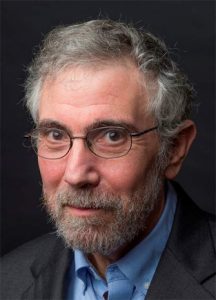 oligarch confronts an autocrat, guess who wins? Paul Krugman, right, July 2, 2025. So the Senate has passed the One Big Beautiful Bill Act.
oligarch confronts an autocrat, guess who wins? Paul Krugman, right, July 2, 2025. So the Senate has passed the One Big Beautiful Bill Act.
True, it could still be blocked if House Republicans stood by their principles. But they won’t. This monstrosity will become the law of the land, and tens of millions of Americans will suffer so that billionaires can pay lower taxes.
Looking forward, those of us who care about a decent society will have to do what we can to make sure that Americans understand who ruined their lives and make the people responsible pay a heavy political price.
But there will be plenty of time for that, so I thought I’d devote today’s post to a more pleasant topic: The humiliation of Elon Musk.
Does taking some satisfaction in Musk’s demise make me a bad person? Maybe, but I’m only human. Should I go easy on Musk because he came out against the terrible bill that just passed? No.
For one thing, Musk’s opposition predictably made no difference. Musk and other oligarchs will soon learn just how little political power their wealth gives them in the political environment they helped create. More on that in a minute.
Beyond that, Musk was against the bill for all the wrong reasons.
The whole DOGE story remains remarkable on a couple of levels. It’s not just that Donald Trump temporarily gave immense power over federal spending to someone who had no legitimate basis for that power — he was neither elected by voters nor, as is normally required for senior officials, approved by the Senate.
 Beyond that, Trump gave that power to a man (shown in file photos at left and below right) who clearly understood nothing about what the government does and what it spends money on — but who, in his arrogance, assumed that he could eliminate trillions of dollars in waste, fraud, and abuse.
Beyond that, Trump gave that power to a man (shown in file photos at left and below right) who clearly understood nothing about what the government does and what it spends money on — but who, in his arrogance, assumed that he could eliminate trillions of dollars in waste, fraud, and abuse.
He couldn’t, of course, and he should have been  fired on the spot after making the absurd claim that millions of dead people were receiving Social Security checks. But he wasn’t. For months after that episode Musk remained in a position to create chaos and degrade the functioning of the government — oh, and condemn large numbers of children to death.
fired on the spot after making the absurd claim that millions of dead people were receiving Social Security checks. But he wasn’t. For months after that episode Musk remained in a position to create chaos and degrade the functioning of the government — oh, and condemn large numbers of children to death.
Now he’s on the outs — but he still lacks the honesty and courage to admit what he got wrong.
What about Musk’s threat to form a new political party? It will go nowhere if he tries. But I don’t think he’ll get anywhere near making good on that threat. As Trump might say, Musk just doesn’t have the cards. My prediction is that very soon one of two things will happen. Either Musk will slink off, tail between his legs. Or he will see his wealth destroyed, faster than he imagines possible.
Most immediately, Musk’s business interests are unusually dependent on federal support, and hence on the good will of whoever is running the government. I’m not sure whether Musk is really the most subsidized businessman in history, but Trump basically got it right here: Beyond that, even great wealth offers little protection from the people in power under an authoritarian regime.
Three years ago NPR’s Planet Money newsletter published a article titled “How Putin conquered Russia’s oligarchy” that people like Musk really should have read before throwing their support behind Trump.
As the article explained, Russian oligarchs played a large role in Vladimir Putin’s rise to power. But a few years after his ascent, Putin summoned the wealthiest among them to the Kremlin to explain who was in charge:
Putin offered the oligarchs a deal: bend to my authority, stay out of my way, and you can keep your mansions, superyachts, private jets, and multibillion-dollar corporations (corporations that, just a few years before, had been owned by the Russian government). In the coming years, the oligarchs who reneged on this deal and undermined Putin would be thrown into a Siberian prison or be forced into exile or die in suspicious circumstances.
And oligarchs who refused to come to heel were replaced by a new breed of oligarchs, who have accrued wealth and power under Putin: the siloviki, which translates roughly to “men of force.”
It can’t happen here, you say. Trump can’t arbitrarily punish wealthy men or seize their property. After all, that would be against the law. And the rule of law still prevails in America, doesn’t it? I mean, we’re not the kind of country where masked men claiming to be government agents kidnap people off the street. Oh, wait.
Still, Musk is a U.S. citizen, which gives him protection, right? Except the Department of Justice has already announced that it will soon be seeking to revoke citizenship for many naturalized Americans. And Trump is already fantasizing about sending Musk back to South Africa.
OK, I don’t expect things to go that far for Musk or any of the other Trump-backing oligarchs who may be having second thoughts — not because I think there are limits to what Trump is willing to do, but because I don’t think any of these guys will have the courage to stand up to him.
July 1
![]() New York Times, Trump Administration:Live Updates: Senate Debate on Trump’s Policy Bill Stretches Into Third Day, Michael Gold, Megan Mineiro and Catie Edmondson, July 1, 2025. Vice President JD Vance arrived at the Capitol prepared to cast a tiebreaking vote on the sprawling bill, but it was not clear when Republicans would be ready to call a final vote.
New York Times, Trump Administration:Live Updates: Senate Debate on Trump’s Policy Bill Stretches Into Third Day, Michael Gold, Megan Mineiro and Catie Edmondson, July 1, 2025. Vice President JD Vance arrived at the Capitol prepared to cast a tiebreaking vote on the sprawling bill, but it was not clear when Republicans would be ready to call a final vote.
Letters from an American, Historical Commentary,  June 30 [Trump’s Big Ugly Bill], Heather Cox Richardson, right, July 1, 2025. “This is the most deeply immoral piece of legislation I have ever voted on in my entire time in Congress,” said Senator Chris Murphy (D-CT).
June 30 [Trump’s Big Ugly Bill], Heather Cox Richardson, right, July 1, 2025. “This is the most deeply immoral piece of legislation I have ever voted on in my entire time in Congress,” said Senator Chris Murphy (D-CT).
“[W]e’re debating a bill that’s going to cut healthcare for 16 million people. It’s going to give a tax break to…massively wealthy people who don’t need any more money. There are going to be kids who go hungry because of this bill. This is the biggest reduction in…nutrition benefits for kids in the history of the country.”
In fact, the drive to slash health insurance is part of the Republicans’ determination to destroy the modern government.
Grover Norquist, a lawyer for the U.S. Chamber of Commerce and one of the key architects of the Republican argument that the solution to societal ills is tax cuts, in 2010 described to Rebecca Elliott of the Harvard Crimson how he sees the role of government. “Government should enforce [the] rule of law,” he said. “It should enforce contracts, it should protect people bodily from being attacked by criminals. And when the government does those things, it is facilitating liberty. When it goes beyond those things, it becomes destructive to both human happiness and human liberty.”
The Republicans’ budget reconciliation bill takes wealth from the American people to give it to the very wealthy and corporations, and Democrats are calling their colleagues out.
“This place feels to me, today, like a crime scene,” Senator Sheldon Whitehouse (D-RI) said on the floor of the Senate. “Get some of that yellow tape and put it around this chamber. This piece of legislation is corrupt. This piece of legislation is crooked. This piece of legislation is a rotten racket. This bill cooked up in back rooms, dropped at midnight, cloaked in fake numbers with huge handouts to big Republican donors. It loots our country for some of the least deserving people you could imagine. When I first got here, this chamber filled me with awe and wonderment. Today, I feel disgust.”
![]() New York Times, Bush, Obama and Bono Commend USAID Staff Members on Their Last Day, Christopher Flavelle, July 1, 2025 (print ed.). Two ex-presidents and a rock star thanked the outgoing workers of a doomed agency.
New York Times, Bush, Obama and Bono Commend USAID Staff Members on Their Last Day, Christopher Flavelle, July 1, 2025 (print ed.). Two ex-presidents and a rock star thanked the outgoing workers of a doomed agency.
As most staff members at the U.S. Agency for International Development marked their final day with the agency, they got thanks from two presidents and a rock star.
The Trump administration has eliminated most U.S. foreign assistance programming, saying that it fails to advance American interests. Secretary of State Marco Rubio and the former Trump adviser Elon Musk worked to dismantle U.S.A.I.D., arguing that its staff was insubordinate. But in recorded messages shared with employees on Monday, former presidents painted a very different picture of the agency and its place in American foreign policy.
Paul Krugman via Substack, Republicans Beware: Medicaid Is Not a Soft Target, Paul Krugman, right, July 1, 2025. America’s health backstop is more popular than ever.
![]() New York Times, U.S. Immigration: Why Is Trump Returning MS-13 Leaders to El Salvador? 5 Takeaways From the Times Investigation, Staff Report, July 1, 2025 (print ed.). The agreement with Nayib Bukele, the president of El Salvador, is undermining a long-running federal investigation into the gang, according to people familiar with the inquiry.
New York Times, U.S. Immigration: Why Is Trump Returning MS-13 Leaders to El Salvador? 5 Takeaways From the Times Investigation, Staff Report, July 1, 2025 (print ed.). The agreement with Nayib Bukele, the president of El Salvador, is undermining a long-running federal investigation into the gang, according to people familiar with the inquiry.
The Contrarian, Opinion: Trump’s falsehoods endanger national security, Jennifer Rubin, July 1, 2025. The “tell” in Donald Trump’s lie about the results of the U.S. bombing of three Iranian nuclear sites was “completely and totally.”
It is one thing to claim (falsely) that we “obliterated” the Iranian program, but “completely and totally obliterate”?
After all, “obliterate” means “to remove utterly.” Did we truly “completely and totally remove utterly” Iran’s nuclear threat? Well, no. We did not.

![]() New York Times, Ford Foundation’s New Leader Is From Yale Law School, Alan Blinder, July 1, 2025. Heather K. Gerken, the dean of the law school, will run the powerful philanthropy, known for pushing for social justice.
New York Times, Ford Foundation’s New Leader Is From Yale Law School, Alan Blinder, July 1, 2025. Heather K. Gerken, the dean of the law school, will run the powerful philanthropy, known for pushing for social justice.
 Ms. Gerken, right, who was seen last year as a contender for the Yale presidency, will take over one of the country’s wealthiest and most influential philanthropies at a time of especially fraught debate about social justice and inequality, two of the foundation’s touchstones.
Ms. Gerken, right, who was seen last year as a contender for the Yale presidency, will take over one of the country’s wealthiest and most influential philanthropies at a time of especially fraught debate about social justice and inequality, two of the foundation’s touchstones.
Meidas Touch Network, Commentary, Trump  Supporters’ Death Threats Against Meidas, Ben Meiselas, July 1, 2025. Yesterday, the Meidas Touch Network reported on the funeral of Minnesota State Representative Melissa Hortman and her husband Mark, who were assassinated on June 14.
Supporters’ Death Threats Against Meidas, Ben Meiselas, July 1, 2025. Yesterday, the Meidas Touch Network reported on the funeral of Minnesota State Representative Melissa Hortman and her husband Mark, who were assassinated on June 14.
In response to our coverage of the funeral, radicalized Trump supporters sent us some of the most heinous messages, including death threats. For example, one Trump supporter said to us, “The country will be lucky once you’re in one of those [caskets] soon. Whole family actually. Couldn’t happen to better people.”
This reminds me: we are not living in normal times. Trump and his supporters are not capable of empathy. It’s why I often refer to it as a death cult. When Trump was asked if he would call Minnesota Governor Walz or attend the funeral, he responded, “I’m not calling him… he’s whacked out… he’s a mess.”
June 30
![]() New York Times, Trump Administration Live Updates: Senate to Begin Voting on Policy Bill, as G.O.P. Grasps for Support, Catie Edmondson and Carl Hulse, June 30, 2025. The Senate will hold a marathon series of votes on Trump’s policy bill, with support in doubt.
New York Times, Trump Administration Live Updates: Senate to Begin Voting on Policy Bill, as G.O.P. Grasps for Support, Catie Edmondson and Carl Hulse, June 30, 2025. The Senate will hold a marathon series of votes on Trump’s policy bill, with support in doubt.
After a weekend session marked by sharp partisan conflict, Senate Republicans hoped to approve the measure and send it to the House. The bill extends nearly $4 trillion in tax cuts first passed in 2017 and partially pays for them by slashing spending on safety net programs.
The Contrarian, Opinion: The worst bill in modern  history, Jennifer Rubin, June 30, 2025. Democrats must make it a career-ender for Republicans.
history, Jennifer Rubin, June 30, 2025. Democrats must make it a career-ender for Republicans.
Lawmakers are not in the dark. Their constituents, rural hospitals, state and local officials, the Congressional Budget Office, conservative think tanks, the Wall Street Journal, and their Democratic colleagues have explained the bill’s horrid consequences.
Republicans might parrot MAGA talking points, but when Sen. Thom Tillis (R-N.C.) distributes  materials to fellow Republicans highlighting the devastation the bill will cause, only the truly deluded can imagine this is anything but horrid policy.
materials to fellow Republicans highlighting the devastation the bill will cause, only the truly deluded can imagine this is anything but horrid policy.
(The Hill quoted a source familiar with the scene at Tuesday’s Senate Republican lunch: “Thom Tillis got up and he had a chart on what the Senate’s provider tax structure will cost different states, including his. His will lose almost $40 billion. He walked through that and said, ‘this will be devastating to my state.’”)
Aside from the disastrous policy objections, Republicans should not delude themselves about the political quicksand they stepped in. The reverse-Robin-Hood scheme is deeply unpopular in every recent public poll.
A Fox News poll shows only 38% support it, while 59% oppose it.
Perhaps the scariest poll for Republicans was one from Maine showing Collins sure has reason for “concern”: Her favorability is a miserable 14% with disapproval at 57%. Mills, the strongest potential 2026 challenger, has a 51-41% favorability rating.
![]() New York Times, G.O.P. Bill Has $1.1 Trillion in Health Cuts and 11.8 Million Losing Care, C.B.O. Says, Margot Sanger-Katz, June 30, 2025 (print ed.). Analysis from the nonpartisan Congressional Budget Office found that Republicans’ new version of the legislation would make far deeper cuts and lead to more people becoming uninsured than previous proposals.
New York Times, G.O.P. Bill Has $1.1 Trillion in Health Cuts and 11.8 Million Losing Care, C.B.O. Says, Margot Sanger-Katz, June 30, 2025 (print ed.). Analysis from the nonpartisan Congressional Budget Office found that Republicans’ new version of the legislation would make far deeper cuts and lead to more people becoming uninsured than previous proposals.

![]() New York Times, Guest Essay: What the University of Virginia Should Have Done, Timothy J. Heaphy (the former university counsel for the University of Virginia), June 30, 2025. Protesters at the University of Virginia showed their support last week for President James Ryan, shown below right in a file photo.
New York Times, Guest Essay: What the University of Virginia Should Have Done, Timothy J. Heaphy (the former university counsel for the University of Virginia), June 30, 2025. Protesters at the University of Virginia showed their support last week for President James Ryan, shown below right in a file photo.
On Friday, Jim Ryan stood on the lawn of Carr’s Hill, the residence of the president of the University of Virginia, alone in the center of a crowd of supporters. He offered brief remarks 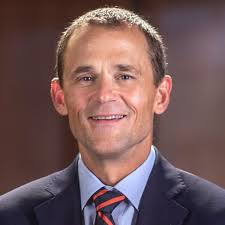 about his inability to fight the forces arrayed against him, including the Trump administration. No one stood alongside him — it was just the university president, Mr. Ryan, explaining why he had made the difficult decision to quit.
about his inability to fight the forces arrayed against him, including the Trump administration. No one stood alongside him — it was just the university president, Mr. Ryan, explaining why he had made the difficult decision to quit.
The moment perfectly illustrated how Mr. Ryan was abandoned by the same people who were supposed to protect the university.
Under investigation by the Justice Department, the university had a strong defense, if only it had  the courage to assert it. Instead of fighting back against what I believe to be false accusations that the university was violating federal law, and the even more outrageous demand that Mr. Ryan resign as a remedy for those alleged violations, the university’s Board of Visitors pushed out a popular president. Instead of presenting facts and law, the board waved the white flag of surrender. Mr. Ryan’s resignation is a victory for intimidation and fear over the rule of law.
the courage to assert it. Instead of fighting back against what I believe to be false accusations that the university was violating federal law, and the even more outrageous demand that Mr. Ryan resign as a remedy for those alleged violations, the university’s Board of Visitors pushed out a popular president. Instead of presenting facts and law, the board waved the white flag of surrender. Mr. Ryan’s resignation is a victory for intimidation and fear over the rule of law.
According to The Times, Mr. Ryan’s departure was prompted by “demands by the Trump administration that he step aside to help resolve a Justice Department inquiry into the school’s diversity, equity and inclusion efforts.” The Civil Rights Division of the Justice Department has been investigating the university for its alleged failure to eliminate D.E.I. programs and continuing to consider race and ethnicity in various programs and scholarships.
I served as university counsel at the University of Virginia from 2018 through 2022. During that time, it was my job to defend the university from unfounded allegations and investigations.
Title VI prohibits racial classifications, quotas or programs that are exclusive to any one race, gender or protected class. It does not prevent federal contractors, such as universities, from pursuing the goal of creating a diverse community, one that ensures all individuals can participate in the learning environment regardless of race, ethnicity, gender, sexual orientation, national origin or political ideology.
The hammer wielded by the Justice Department was the potential cessation of federal grant funding. The university had viable legal options to block this effort, too. Harvard University has ![]() persuasively argued that the university has a First Amendment right to pursue programs that promote a broadly diverse community and deserves due process before grants are removed.
persuasively argued that the university has a First Amendment right to pursue programs that promote a broadly diverse community and deserves due process before grants are removed.
Instead of asserting these valid defenses, the University of Virginia opted to capitulate to the demand for Mr. Ryan’s resignation, tacitly agreeing with the notion that the university somehow engaged in illegal racial discrimination.
Why? By law, the university and all state agencies are represented by the attorney general of Virginia. The current attorney general has been an outspoken opponent of D.E.I. programs. This means rather than having an advocate loyal to the university and its interests, Mr. Ryan and the university were saddled with counsel aligned with the other side.
The university’s governing board took a similar position.
Mr. Ryan was known to urge the university to be both “great and good” in all its endeavors. His departure will result in a less inclusive university community, which will harm all students who choose the University of Virginia. It is a sad day for the university, which will suffer the consequences of this bad decision.

Pro Publica, Investigations: Kristi Noem Secretly Took a Cut of Political Donations, Justin Elliott, Joshua Kaplan and Alex ![]() Mierjeski,
Mierjeski,  June 30, 2025. A dark money group paid $80,000 to Noem’s personal company when she was governor of South Dakota. She did not include this income on her federal disclosure forms, a likely violation of ethics requirements, experts say.
June 30, 2025. A dark money group paid $80,000 to Noem’s personal company when she was governor of South Dakota. She did not include this income on her federal disclosure forms, a likely violation of ethics requirements, experts say.
In 2023, while Kristi Noem, above, was governor of South Dakota, she supplemented her income by secretly accepting a cut of the money she raised for a nonprofit that promotes her political career, tax records show.
In what experts described as a highly unusual arrangement, the nonprofit routed funds to a personal company of Noem’s that had recently been established in Delaware. The payment  totaled $80,000 that year, a significant boost to her roughly $130,000 government salary. Since the nonprofit is a so-called dark money group — one that’s not required to disclose the names of its donors — the original source of the money remains unknown.
totaled $80,000 that year, a significant boost to her roughly $130,000 government salary. Since the nonprofit is a so-called dark money group — one that’s not required to disclose the names of its donors — the original source of the money remains unknown.
Noem then failed to disclose the $80,000 payment to the public. After President Donald Trump selected Noem to be his secretary of the Department of Homeland Security, she had to release a detailed accounting of her assets and sources of income from 2023 on. She did not include the income from the dark money group on her disclosure form, which experts called a likely violation of federal ethics requirements.
Experts told ProPublica it was troubling that Noem was personally taking money that came from political donors. In a filing, the group, a nonprofit called American Resolve Policy Fund, described the $80,000 as a payment for fundraising. The organization said Noem had brought in hundreds of thousands of dollars.
There is nothing remarkable about a politician raising money for nonprofits and other groups that promote their campaigns or agendas. What’s unusual, experts said, is for a politician to keep some of the money for themselves.
June 29
![]() New York Times, G.O.P. Bill Has $1.1 Trillion in Health Cuts and 11.8 Million Losing Care, C.B.O. Says, Margot Sanger-Katz, June 29, 2025. Analysis from the nonpartisan Congressional Budget Office found that Republicans’ new version of the legislation would make far deeper cuts and lead to more people becoming uninsured than previous proposals.
New York Times, G.O.P. Bill Has $1.1 Trillion in Health Cuts and 11.8 Million Losing Care, C.B.O. Says, Margot Sanger-Katz, June 29, 2025. Analysis from the nonpartisan Congressional Budget Office found that Republicans’ new version of the legislation would make far deeper cuts and lead to more people becoming uninsured than previous proposals.
 Republicans’ marquee domestic policy bill that is making its way through the Senate would result in deeper cuts and more Americans losing health insurance coverage than the original measure that passed the House last month, according to new estimates from the Congressional Budget Office.
Republicans’ marquee domestic policy bill that is making its way through the Senate would result in deeper cuts and more Americans losing health insurance coverage than the original measure that passed the House last month, according to new estimates from the Congressional Budget Office.
According to a report published late Saturday night, the legislation would mean 11.8 million more Americans would become uninsured by 2034. Federal spending on Medicaid, Medicare and Obamacare would be reduced by more than $1.1 trillion over that period — with more than $1 trillion of those cuts coming from Medicaid alone.

Politico, Mamdani pushes back on Trump’s latest jab, Gregory Svirnovskiy, June 29, 2025. Trump called Mamdani a Communist and threatened to withhold federal funding from the city in case of a conflict.
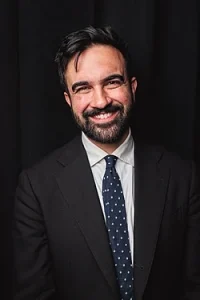 Zohran Mamdani, right, is continuing to sell his progressive vision for New York City amid increasing pressure from President Donald Trump.
Zohran Mamdani, right, is continuing to sell his progressive vision for New York City amid increasing pressure from President Donald Trump.
“I have already had to start to get used to the fact that the president will talk about how I look, how I sound, where I’m from, who I am, ultimately because he wants to distract from what I’m fighting for,” Mamdani told NBC’s Kristen Welker on Sunday on “Meet the Press.” “And I’m fighting for the very working people that he ran a campaign to empower, that he has since then betrayed.”
In the days since Mamdani’s upset victory in a New York City mayoral primary over former Gov. Andrew Cuomo and others, prominent Republicans have pushed to make him the face of the Democratic Party, denouncing his policies as “radical” and “socialist.”
In an interview that aired on “Sunday Morning Futures with Maria Bartiromo,” Trump called Mamdani a Communist and threatened to withhold federal funding from the city in case of a conflict.
“I can’t imagine it, but let’s say this, if he does get in, I’m gonna be president and he’s going to have to do the right thing or they’re not getting any money,” Trump said. “He’s gotta do the right thing.”
June 28
![]() New York Times, News Analysis: With Supreme Court Ruling, Another Check on Trump’s Power Fades, Charlie Savage, June 28, 2025. The court tied the hands of judges at a time when Congress has been cowed and internal executive branch constraints have been steamrolled.
New York Times, News Analysis: With Supreme Court Ruling, Another Check on Trump’s Power Fades, Charlie Savage, June 28, 2025. The court tied the hands of judges at a time when Congress has been cowed and internal executive branch constraints have been steamrolled.
![]() New York Times, A Triumphant Supreme Court Term for Trump, Fueled by Emergency Rulings, Adam Liptak and Abbie VanSickle, June 28, 2025. Using truncated procedures, the six-justice conservative majority gave a green light to many of the president’s most assertive initiatives.
New York Times, A Triumphant Supreme Court Term for Trump, Fueled by Emergency Rulings, Adam Liptak and Abbie VanSickle, June 28, 2025. Using truncated procedures, the six-justice conservative majority gave a green light to many of the president’s most assertive initiatives.
The Supreme Court term that ended on Friday included an extraordinary run of victories for President Trump, culminating in a 6-to-3 ruling largely eliminating the main tool that his opponents have used to thwart his aggressive agenda.
June 26

![]() New York Times, News Analysis: Trump’s Bill Slashes the Safety Net That Many Republican Voters Rely on, Jason DeParle, June 26, 2025. As they push for big cuts in Medicaid and food stamps, Republicans are making a big bet that they can avoid political backlash from working-class supporters who increasingly rely on those programs.
New York Times, News Analysis: Trump’s Bill Slashes the Safety Net That Many Republican Voters Rely on, Jason DeParle, June 26, 2025. As they push for big cuts in Medicaid and food stamps, Republicans are making a big bet that they can avoid political backlash from working-class supporters who increasingly rely on those programs.
From the start of his second term, President Trump has bet that he can appeal to low-income voters while slashing safety net programs on which many of those voters depend.
The enormous tax-and-spending bill he is trying to push through Congress is a high-stakes test of that proposition, a gamble that Mr. Trump can retain the loyalty of his blue-collar supporters despite moves that could harm their immediate economic self-interest.
As approved by the House, the legislation cuts hundreds of billions of dollars in food benefits and removes nearly 11 million people from the health care rolls, while offering large tax cuts skewed to the rich and adding trillions to the national debt. Senate Republicans are considering a similar measure, with bigger Medicaid cuts and smaller reductions in nutritional aid.

![]() New York Times, Trump Justice Dept. Pressuring University of Virginia President to Resign, Michael S. Schmidt and Michael C. Bender, June 26, 2025. The Justice Department has demanded that James E. Ryan step down to help resolve a civil rights investigation into the school, three people familiar with the matter said.
New York Times, Trump Justice Dept. Pressuring University of Virginia President to Resign, Michael S. Schmidt and Michael C. Bender, June 26, 2025. The Justice Department has demanded that James E. Ryan step down to help resolve a civil rights investigation into the school, three people familiar with the matter said.
 The Trump administration has privately demanded that the University of Virginia oust its president to help resolve a Justice Department investigation into the school’s diversity, equity and inclusion efforts, according to three people briefed on the matter.
The Trump administration has privately demanded that the University of Virginia oust its president to help resolve a Justice Department investigation into the school’s diversity, equity and inclusion efforts, according to three people briefed on the matter.
The extraordinary condition the Justice Department has put on the school demonstrates that President Trump’s bid to shift the ideological tilt of the higher education system, which he views as hostile to conservatives, is more far-reaching than previously understood.
The government’s extensive pressure campaign has stripped billions of dollars from elite universities, including Harvard, which has been the target of investigations from at least six different federal agencies. But this is the first time the administration has pushed a university to remove its leader.
The Justice Department has contended to the university that the president, James E. Ryan, has not dismantled the school’s diversity, equity and inclusion programs and misrepresented the steps taken to end them. A spokesman for the department did not immediately return a request for comment.
The demand to remove Mr. Ryan was made over the past month on several occasions by Gregory Brown, the deputy assistant attorney general for civil rights, to university officials and representatives, according to the three people briefed on the matter.
Mr. Brown, a University of Virginia graduate who, as a private lawyer, sued the school, is taking a major role in the investigation. He told a university representative as recently as this past week that Mr. Ryan needed to go in order for the process of resolving the investigation to begin, two of the people said.
Harmeet K. Dhillon, the Justice Department’s top civil rights lawyer, has also been involved in negotiations with the university. She received her law degree from the University of Virginia, where she was a student in the law school at the same time as Mr. Ryan.
Mr. Ryan, hired in 2018 as the university’s ninth president, has leaned into issues like making the school more diverse, increasing the number of first-generation students and encouraging students to do community service. But his approach, which he says will make the university “both great and good,” has rankled conservative alumni and Republican board members who accuse him of wanting to impose his values on students and claim he is “too woke.”

![]() New York Times, Campus Crackdown: Johns Hopkins Gets the Most Federal Money, but Now Much of It Is at Risk, Vimal Patel, June 26, 2025. The university is not a direct target of the Trump administration but faces some of the biggest cuts, as Republicans seek to trim government spending.
New York Times, Campus Crackdown: Johns Hopkins Gets the Most Federal Money, but Now Much of It Is at Risk, Vimal Patel, June 26, 2025. The university is not a direct target of the Trump administration but faces some of the biggest cuts, as Republicans seek to trim government spending.
As President Trump unleashes dizzying firepower at the nation’s top universities, he and his supporters have made the argument that the institutions have brought such action onto themselves.
They turned into bastions of leftism hostile to conservative thought and lost the trust of the American people, according to the administration. The universities accrued massive endowments, becoming less like noble nonprofits spreading good to the world and more like corporations taking advantage of government largess, the argument goes.
Ronald J. Daniels, the president of Johns Hopkins University, which receives the most federal funding of any American university, has been listening.
For years, he has been warning that higher education should make efforts to attract more conservatives to the ranks. His school has pushed for more viewpoint diversity and has touted a partnership with the American Enterprise Institute, a conservative think tank.
 Those efforts do not appear to have protected the university. Johns Hopkins, the first research university in the United States, has been one of the hardest hit by a Republican effort to reduce federal funding flowing to schools.
Those efforts do not appear to have protected the university. Johns Hopkins, the first research university in the United States, has been one of the hardest hit by a Republican effort to reduce federal funding flowing to schools.
The Trump administration has not singled out Johns Hopkins with lists of demands or threats that it would be cut off from funding, as the administration has done with Harvard and Columbia. Still, Johns Hopkins has already laid off more than 2,000 people in the wake of an $800 million research cut. And officials of the university are bracing for deeper cuts to the $4.2 billion it receives in annual federal research money.
The university’s troubles show how a Republican campaign against higher education could decimate the nation’s research enterprise.
![]() New York Times, N.Y.C. Mayor’s Race, ‘Re-elect Eric’: Adams Kicks Off Bid to Oppose Mamdani for Mayor, Jeffery C. Mays, June 26, 2025. With the political world in New York City and beyond still abuzz over Zohran Mamdani’s ascendance as the likely Democratic mayoral candidate, the current mayor, Eric Adams, held a news conference on Thursday to deliver a countermessage: Don’t forget about me.
New York Times, N.Y.C. Mayor’s Race, ‘Re-elect Eric’: Adams Kicks Off Bid to Oppose Mamdani for Mayor, Jeffery C. Mays, June 26, 2025. With the political world in New York City and beyond still abuzz over Zohran Mamdani’s ascendance as the likely Democratic mayoral candidate, the current mayor, Eric Adams, held a news conference on Thursday to deliver a countermessage: Don’t forget about me.
Mr. Adams appeared on the steps of City Hall to formally kick off an independent bid for re-election in November, with a crowd of supporters holding up “Re-elect Eric for Mayor” signs, echoing Mr. Mamdani’s campaign ads that primarily use his first name.
The obstacles the mayor faces are substantial. His approval rating was at historic lows even before he was indicted last fall on charges of bribery and soliciting illegal campaign contributions from foreign nationals. He grew more unpopular after the charges were dropped by the Trump Justice Department, leading to accusations of a quid pro quo that Mr. Adams has denied.
![]() New York Times, New Kennedy Advisers Rescind Recommendations for Some Flu Vaccines, Apoorva Mandavilli, June 26, 2025. Critics saw in the move the beginnings of a more restrictive approach to providing vaccines to Americans.
New York Times, New Kennedy Advisers Rescind Recommendations for Some Flu Vaccines, Apoorva Mandavilli, June 26, 2025. Critics saw in the move the beginnings of a more restrictive approach to providing vaccines to Americans.
An advisory panel recently appointed by Health Secretary Robert F. Kennedy Jr., right, voted on  Thursday to walk back longstanding recommendations for flu vaccines containing an ingredient that the anti-vaccine movement has falsely linked to autism.
Thursday to walk back longstanding recommendations for flu vaccines containing an ingredient that the anti-vaccine movement has falsely linked to autism.
The vote signaled a powerful shift in the way federal officials approach vaccines, putting into action Mr. Kennedy’s deep skepticism about their safety and delivering the first blows to a scientific process that for decades has provided effective vaccines to Americans.
Mr. Kennedy fired all 17 experts on the panel about two weeks ago, and then appointed eight new members, at least half of whom have expressed skepticism about some vaccines.
“We came to this meeting with no predetermined ideas, and will make judgments as if we are treating for our own families,” the panelists said in a statement.
To critics, the two-day meeting of the Advisory Committee on Immunization Practices offered the clearest signs yet that the Trump administration intends to unravel the system that has long guided clinical decisions about vaccination.
“As a physician and scientist who has devoted my entire career to vaccines and preventing and treating infections, this meeting has been devastating to watch,” said Dr. Lakshmi Panagiotakopoulos, an expert on vaccines who resigned from the Centers for Disease Control and Prevention earlier this month.
Dozens of studies have shown the vaccine ingredient, called thimerosal, to be harmless. It has not been a component of most childhood shots since 2001.
“The risk from influenza is so much greater than the nonexistent risk as far as we know from thimerosal,” said the lone dissenter, Dr. Cody Meissner, a professor of pediatrics at Dartmouth Geisel School of Medicine who is widely considered to be the most qualified member of the new committee.
- New York Times, What to Know About the Vaccine Preservative Thimerosal, Teddy Rosenbluth, June 26, 2025. A C.D.C. advisory committee on Thursday voted against flu shots that contain the ingredient.
June 25
![]() New York Times, Kennedy Withdraws Funding Pledge to International Vaccine Agency, Stephanie Nolen, June 25, 2025. Robert F. Kennedy Jr. claimed that Gavi had “ignored the science” in immunizing children around the world.
New York Times, Kennedy Withdraws Funding Pledge to International Vaccine Agency, Stephanie Nolen, June 25, 2025. Robert F. Kennedy Jr. claimed that Gavi had “ignored the science” in immunizing children around the world.
The United States will withdraw its financial support of Gavi, a global organization that helps  purchase vaccines for children in poor countries, Robert F. Kennedy Jr., right, the United States secretary of Health and Human Services, told the group’s leaders on Wednesday, accusing them of having “ignored the science” in immunizing children around the world.
purchase vaccines for children in poor countries, Robert F. Kennedy Jr., right, the United States secretary of Health and Human Services, told the group’s leaders on Wednesday, accusing them of having “ignored the science” in immunizing children around the world.
Mr. Kennedy made the incendiary remarks in a brief, prerecorded video message sent overnight  to a gathering of health ministers and other leaders in Brussels focused on raising funds to support the work of Gavi.
to a gathering of health ministers and other leaders in Brussels focused on raising funds to support the work of Gavi.
“When vaccine safety issues have come before Gavi, Gavi has treated them not as a patient health problem, but as a public relations problem,” Mr. Kennedy said in the address.
Mr. Kennedy said that Gavi’s leaders had been selective in their use of science to support vaccine choices, and that the United States would not deliver on a $1.2 billion pledge made by the Biden administration until the organization changed its processes.
“In its zeal to promote universal vaccination, it has neglected the key issue of vaccine safety,” he said.
In a statement, Gavi’s leaders rejected the suggestion that its vaccine purchases were driven by anything other than the best available evidence.
“Any decision made by Gavi with regards to its vaccine portfolio is made in alignment with recommendations by the World Health Organization’s Strategic Advisory Group of Experts on Immunization (SAGE), a group of independent experts that reviews all available data through a rigorous, transparent and independent process,” Gavi’s statement said. “This ensures Gavi investments are grounded in the best available science and public health priorities.”
Mr. Kennedy is a longtime vaccine skeptic who has upended policies on vaccination in the United States since taking over the top health job for the Trump administration.
His comments to the meeting in Brussels came on the same day that a key vaccine advisory panel for the Centers for Disease Control and Prevention was to meet in the United States. Mr. Kennedy fired all 17 of the previous members of the panel and replaced them with members he chose, several of whom have voiced vaccine skepticism mirroring his own.
Nevertheless, his address to Gavi came as a surprise; the organizers of the summit learned of it just two days in advance and scrambled to figure out where to put it on their program, which was otherwise full of technical panels on how to increase vaccination rates and a pep-rally-style pledging event at which countries would announce their commitment to support Gavi’s mission.
The United States was the largest donor to Gavi, whose work is estimated to have saved the lives of 17 million children around the world over the past two decades.
Mr. Kennedy’s remarks were the first indication that the Trump administration’s decision to end funding for Gavi was motivated by mistrust of vaccines, rather than as part of an overall reduction in foreign aid and support for multilateral institutions.
The summit is held by Gavi every four years to replenish its finances. Gavi had hoped to raise $9 billion for the 2026-2030 period, funds the organization said would allow it to purchase 500 million childhood vaccinations and save at least eight million lives by 2030.
In addition to essential vaccines such as those against measles and polio, Gavi has in recent years helped countries introduce new vaccines into their immunization programs, including one to protect small children against malaria.

![]() New York Times, Mamdani Stuns Cuomo in New York Mayoral Primary, Emma G. Fitzsimmons and Nicholas Fandos, June 25, 2025. Zohran Mamdani, above right, a little-known state lawmaker whose progressive platform and campaign trail charisma electrified younger voters, stunned former Gov. Andrew M. Cuomo, above left, in the Democratic primary for mayor of New York City on Tuesday night, building a lead so commanding that Mr. Cuomo conceded.
New York Times, Mamdani Stuns Cuomo in New York Mayoral Primary, Emma G. Fitzsimmons and Nicholas Fandos, June 25, 2025. Zohran Mamdani, above right, a little-known state lawmaker whose progressive platform and campaign trail charisma electrified younger voters, stunned former Gov. Andrew M. Cuomo, above left, in the Democratic primary for mayor of New York City on Tuesday night, building a lead so commanding that Mr. Cuomo conceded.
Mr. Mamdani, a 33-year-old democratic socialist  from Queens, tapped into a current of anxiety around New York City’s growing affordability crisis. His joyful campaign brought new voters into the fold who rejected the scandal-scarred Mr. Cuomo’s ominous characterizations of the city and embraced an economic platform that included everything from free bus service and child care to publicly owned grocery stores.
from Queens, tapped into a current of anxiety around New York City’s growing affordability crisis. His joyful campaign brought new voters into the fold who rejected the scandal-scarred Mr. Cuomo’s ominous characterizations of the city and embraced an economic platform that included everything from free bus service and child care to publicly owned grocery stores.
The outcome was not official, and even assuming Mr. Mamdani gains the nomination, he faces an unusually competitive general election in November.
With 93 percent of the results in, Mr. Mamdani was the first choice of 43.5 percent of voters. Mr. Cuomo was in second place as the first choice of 36.4 percent of voters.
Mr. Mamdani said he would use his “power to reject Donald Trump’s fascism” and struck a note of unity after a contentious primary.
“This is the biggest upset in modern New York City history,” said Trip Yang, a Democratic strategist.
![]() New York Times, A New Political Star Emerges Out of a Fractured Democratic Party, Liam Stack, June 25, 2025. The emergence of Zohran Mamdani, a democratic socialist, is likely to divide national Democrats, who are already torn about what the party should stand for.
New York Times, A New Political Star Emerges Out of a Fractured Democratic Party, Liam Stack, June 25, 2025. The emergence of Zohran Mamdani, a democratic socialist, is likely to divide national Democrats, who are already torn about what the party should stand for.
The national Democratic establishment on Tuesday night struggled to absorb the startling ascent of a democratic socialist in New York City who embraced a progressive economic agenda and diverged from the party’s dominant position on the Middle East.
As elections go, Tuesday’s party primary for mayor was a thunderbolt: New York voters turned away from a well-funded familiar face and famous name, former Gov. Andrew M. Cuomo, and in doing so made a generational and  ideological break with the party’s mainstream.
ideological break with the party’s mainstream.
They turned to a 33-year-old, three-term state assemblyman, Zohran Mamdani, right, who ran on an optimistic message about affordability and the rising cost of living that has eluded many national Democrats.
What became vividly clear on Tuesday, as votes were counted across the racially and economically diverse neighborhoods of New York, was that Mr. Mamdani had generated excitement among some — though not all — of the traditional pillars of winning Democratic voter coalitions.
Democratic leaders badly want to win over young voters and minority groups in the coming 2026 and 2028 elections — two groups they have struggled to mobilize since the Obama era — but they also need moderate Democrats and independents who often recoil from far-left positions.
June 24
![]() New York Times, Intel Report on Iran Upends Victory Lap Trump Was Hoping for at NATO, Tyler Pager and David E. Sanger, June 25, 2025 (print ed.). President Trump had been eager to celebrate the U.S. strikes on Iran, but a new report indicates the attack set back Iran’s nuclear program by only a few months.
New York Times, Intel Report on Iran Upends Victory Lap Trump Was Hoping for at NATO, Tyler Pager and David E. Sanger, June 25, 2025 (print ed.). President Trump had been eager to celebrate the U.S. strikes on Iran, but a new report indicates the attack set back Iran’s nuclear program by only a few months.
As President Trump landed in the Netherlands on Tuesday for the annual meeting of NATO allies, he was desperate to hold together the fragile cease-fire between Israel and Iran, cursing and cajoling to make sure that history would remember him for bombing Iran’s nuclear sites over the weekend and brokering a peace deal days later.
But just hours after he landed, the leak of a new U.S. intelligence report cast doubt on his repeated claim that the American strikes had “obliterated” Iran’s nuclear programs. Mr. Trump started using the word “obliterated” before he received his first battle damage report, and since then, he has closely monitored which members of his administration have used the same language.
June 23
![]() New York Times, Analysis: Iran’s Nuclear Dreams May Survive Even a Devastating American Blow, Mark Landler, June 23, 2025. Through revolution and upheaval, the program has become intertwined with the country’s security and national identity.
New York Times, Analysis: Iran’s Nuclear Dreams May Survive Even a Devastating American Blow, Mark Landler, June 23, 2025. Through revolution and upheaval, the program has become intertwined with the country’s security and national identity.
President Trump declared a “spectacular military success,” saying that American bombs had knocked out key pillars of Iran’s nuclear program. Even if he is right, the operation may not have delivered a death blow to a program that is deeply embedded in Iran’s history, culture, sense of security, and national identity.
Since Iran first embarked on an ambitious civilian nuclear program in 1974 under the shah, Mohammed Reza Pahlavi, Iran’s leaders have viewed it as a proud symbol of the country’s leadership in the Muslim world, a reflection of its commitment to scientific research, and an insurance policy in its dangerous neighborhood.
What was true under the shah has been true under the theocratic rulers of post-revolution Iran. And it would be true, several experts on Iran said, of any potential future Iranian government, even if the current supreme leader, Ayatollah Ali Khamenei, does not survive an escalating conflict with Israel and the United States.
“In the short term, under immense pressure, Khamenei or his successors will have to make concessions,” said Roham Alvandi, director of the Iranian History Initiative at the London School of Economics. “In the long run, any Iranian leader will come to the conclusion that Iran must have a nuclear deterrent.”
By joining Israel’s military campaign against Iran, Mr. Trump has greatly raised the costs for Iran’s leaders in refusing to accept stringent curbs on their uranium enrichment program. Yet however this conflict ends, he may have given them even more compelling reasons to seek a nuclear deterrent, experts say.
“Any strategic thinker in Iran, present or future, realizes that Iran is located in the Middle East, that its neighbors are Netanyahu’s Israel, the Taliban in Afghanistan, and M.B.S. in Saudi Arabia,” said Professor Alvandi, referring to Prime Minister Benjamin Netanyahu and Crown Prince Mohammed bin Salman.
![]() New York Times, Inside Trump’s Decision to Strike Iran, Mark Mazzetti, Jonathan Swan, Maggie Haberman, Eric Schmitt and Helene Cooper, June 23, 2025 (print ed.). When Israel began its assault on Iran, President Trump kept his distance. But within days he was on a path that led to an extensive bombing mission aided by political and military ruses.
New York Times, Inside Trump’s Decision to Strike Iran, Mark Mazzetti, Jonathan Swan, Maggie Haberman, Eric Schmitt and Helene Cooper, June 23, 2025 (print ed.). When Israel began its assault on Iran, President Trump kept his distance. But within days he was on a path that led to an extensive bombing mission aided by political and military ruses.
June 22
![]() New York Times, Updates: Trump Claims Success After Bombing Key Iran Nuclear Sites, Maggie Haberman, Farnaz Fassihi, Eric Schmitt, Tyler Pager and Eric Nagourney, June 22, 2025. After hitting Iran’s most heavily fortified nuclear installation, President Trump warned of more strikes “if peace does not come quickly.”
New York Times, Updates: Trump Claims Success After Bombing Key Iran Nuclear Sites, Maggie Haberman, Farnaz Fassihi, Eric Schmitt, Tyler Pager and Eric Nagourney, June 22, 2025. After hitting Iran’s most heavily fortified nuclear installation, President Trump warned of more strikes “if peace does not come quickly.”
President Trump said the aim of attacking the three facilities was to destroy Iran’s nuclear capability.
![]() New York Times, More Live Updates: Fate of Iran’s Uranium Stockpile Unclear After U.S. Strikes, Staff Reports, June 22, 2025. Senior U.S. officials said the attack had severely damaged Iran’s nuclear facilities but conceded they did not know the whereabouts of its supply of near-bomb-grade uranium.
New York Times, More Live Updates: Fate of Iran’s Uranium Stockpile Unclear After U.S. Strikes, Staff Reports, June 22, 2025. Senior U.S. officials said the attack had severely damaged Iran’s nuclear facilities but conceded they did not know the whereabouts of its supply of near-bomb-grade uranium.
President Trump suggested that a new government could take over in Tehran.

The Contrarians via Substack, Opinion: Breaking News: U.S. enters war, Jennifer Rubin, right, June 22,2025. Guests: Steven A. Cook, Chief Policy Officer at J Street and former White House special advisor on the Middle East to Vice President Kamala Harris and Jewish Outreach Director on the 2024 Presidential campaign, and Ilan Goldenberg, Senior Fellow for Middle East and Africa Studies, Council on Foreign Relations.

Meidas Touch Network, Commentary: Trump Faces  MAJOR BLOWBACK after DISASTER WAR PLAN, Ben Meiselas, June 22, 2025 (10:53 mins.). Meidas Touch host reports on the instant blowback Trump is receiving after his war plan against Iran is already backfiring.
MAJOR BLOWBACK after DISASTER WAR PLAN, Ben Meiselas, June 22, 2025 (10:53 mins.). Meidas Touch host reports on the instant blowback Trump is receiving after his war plan against Iran is already backfiring.
Iran is a nation of 90 million people that still has a massive stockload of ballistic missiles.

June 21
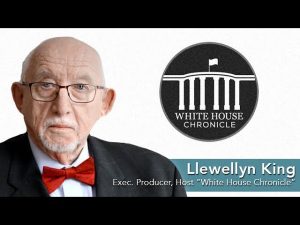
White House Chronicle, Farewell to the U.S. as the World’s Top Science Nation, Llewellyn King, above, June 21, 2025. When I asked John Savage, the retired co-founder of the Department of Computer Science at Brown University, what the essential ingredient in research is, he responded with one word: “Passion.”
It is passion that keeps scientists going, dead end after dead end, until there is a breakthrough.
It is passion that keeps them at the bench or staring into a microscope or redesigning an experiment with slight modifications until that “eureka moment.”
I have been writing about science for half a century. I can tell you that passion is the bridge between daunting difficulty and triumphant discovery.
Next comes money: steady, reliable funding, not start-and-stop dribbles.
It is painful to watch the defunding of the nation’s research arm by roughly a third to a half; the wanton destruction of what, since the end of World War II, has kept the United States the premier inventor-nation, the unequaled leader in discovery.
It is dangerous to believe the status quo ante will return when another administration is voted in, maybe in 2028.
You don’t pick up the pieces of projects that are, as they were, ripped from the womb and put them back together again, even if the researchers are still available — if they haven’t gone to the willing arms of research hubs overseas or other careers.
The work isn’t made whole again just because the money is back. The passion is gone.
There are crude, massive reductions in funding for research and development across the government — with the most axing in the National Institutes of Health (NIH), the National Science Foundation (NSF) and the Department of Energy (DOE). But the philistines with their metaphorical chainsaws have slashed wildly and deeply into every corner of science, every place where talented men and women probe, analyze and seek to know.
This brutal, mindless slashing isn’t just upending careers, causing projects to be abandoned in midstream, destroying the precious passion that is the driver of discovery, but it is also a blow against the future. It is a turn from light to dark.
The whiz kids of DOGE aren’t cost-cutting. They are amputating the nation’s future.
The cutting of funds to NIH — until now the world’s premier medical research center, a citadel of hope for the sick and the guarantor that the future will have less suffering than the past — may be the most egregious act of many.
It is a terrible blow to those suffering from cancer to Parkinson’s and the myriad diseases in between who hope that NIH will come up with a cure or a therapy before they die prematurely. It is a heartless betrayal.
The full horror of the dismantling of what they call the nation’s “scientific pillar” has been laid out by two of America’s most eminent scientists in an essay in the Bulletin of the Atomic Scientists.
They are John Holdren, who served as President Barack Obama’s science adviser and as director of the White House Office of Science and Technology Policy, and Neal Lane, who was President Bill Clinton’s science adviser and is a former NSF director. In their alarming and telling essay, they appeal to Congress to step in and save America’s global leadership in science.
They write, “What is happening now exceeds our worst fears. Consider, first, the National Science Foundation, one of the brightest jewels in the crown of U.S. science and the public interest. …. It’s the nation’s largest single funder of university basic research in fields other than medicine. Basic research, of course, is the seed corn from which future advances in applied science and technology flow.”
Holdren and Lane write, “Of the energy department’s $50 billion budget in fiscal 2024, about $15 billion went to non- defense research and development.”
Some $8 billion of this went to the DOE Office of Science Research, the largest funder in basic research in the physical sciences, supporting 300 institutions around the country including the department’s own 17 laboratories.
In all of the seminal moves made by the Trump administration, what The Economist calls the president’s “War on Science” may be the most damaging.
![]() New York Times, U.S. Immigration: Judge Blocks Trump’s Tying of Transportation Funds to Immigration Enforcement, David W. Chen, June 21, 2025 (print ed.). Attorneys general in 20 states, most led by Democrats, had sued the administration. Similar suits have been filed over funding for other programs.
New York Times, U.S. Immigration: Judge Blocks Trump’s Tying of Transportation Funds to Immigration Enforcement, David W. Chen, June 21, 2025 (print ed.). Attorneys general in 20 states, most led by Democrats, had sued the administration. Similar suits have been filed over funding for other programs.
A federal judge has temporarily blocked the U.S. Department of Transportation from withholding billions of dollars in funding to states unless they complied with the Trump administration’s demands on immigration enforcement.
 A coalition of 20 states, most led by Democrats, filed a lawsuit last month arguing that the administration was usurping Congress’s authority over spending and using that power of the purse to to force states to adopt its policies.
A coalition of 20 states, most led by Democrats, filed a lawsuit last month arguing that the administration was usurping Congress’s authority over spending and using that power of the purse to to force states to adopt its policies.
Judge John J. McConnell Jr., the chief judge of the United States District Court for Rhode Island, agreed with the states. In a preliminary injunction issued Thursday, the judge said that their claims “are likely to succeed because the Defendants’ actions here violate the Constitution and statutes of the United States.”
He also said that the states ”face losing billions of dollars in federal funding, are being put in a position of relinquishing their sovereign right to decide how to use their own police officers, are at risk of losing the trust built between local law enforcement and immigrant communities, and will have to scale back, reconsider, or cancel ongoing transportation projects.”
Rob Bonta, the attorney general of California, who is spearheading the litigation, said in a statement that President Trump was acting in an “immoral — and more importantly, illegal” way by treating crucial funding as a “bargaining chip.”
“I’m glad to see the District Court agrees,” he added, “while we continue to make our case in court.”
In a statement posted on X, Sean Duffy, the secretary of transportation, said: “I directed states who want federal DOT money to comply with federal immigration laws. But, no surprise, an Obama-appointed judge has ruled that states can openly defy our federal immigration laws. This is judicial activism pure and simple and I will continue to fight in the courts.”
Immigration law is enacted by Congress and enforced by the federal government. States rebuffing the Trump administration have said that they are limiting state or local cooperation with federal agents enforcing those laws.
Hopium Chronicles, Pro-Democracy Advocacy: Dems Need To Get Serious About Partisan Voter Registration – My  Conversation With Tom Bonier, Simon Rosenberg, right, June 21, 2025. Starting off sharing a new presentation from our good friend Tom Bonier.
Conversation With Tom Bonier, Simon Rosenberg, right, June 21, 2025. Starting off sharing a new presentation from our good friend Tom Bonier.
Tom put this presentation together a few weeks ago after all states had reported the vote of every individual voter in the 2024 election (that they voted, not how they voted). From that data, using Target Smart’s database of the vote history of all voters in recent years, Tom has developed new understandings of what happened in 2024.
There is one very big takeway from Tom’s new analysis: Republicans out-registered us from 2020 to 2024 and made the battleground states more Republican. In a very close election, this successful effort to make more Republicans mattered; and it tells us that we simply must make partisan voter registration — making more Democrats — a much higher priority in the coming years, particularly as this Republican machine that gave them these advantages is not going away.
The good news is that the new Ken Martin-led DNC is making partisan voter registration a major priority for the first time in decades. Some of the unprecedented support the DNC is providing to the state parties in all 50 states will go to launching party-led voter registration campaigns. For those of you who like to do voter reg work, please contact your state and local Democratic Parties and offered to help them stand up their efforts in your community. It is another way members of our plucky, proud and patriotic community can help us win this fall and in 2026.
This is the first public showing of Tom’s presentation, and I will be working with him on ways to make the data and recommendations more accessible. My hope is that we combine his insights with some of what I presented alongside him at a recent gathering of the Democratic State Parties in Little Rock, Arkansas into a series of posts and discussions here at Hopium.
1 – It Was A Very Close Election, and We Had Important Wins — Trump won by 1.5 points and failed to reach 50%. 115,000 votes changing in MI, PA, WI and Harris wins. We picked up a seat in the House and were less than 4,000 votes from making Hakeem Jeffries Speaker. We had important downballot wins in AZ, NC, MI, NV, PA, WI. While we have work to do this was a narrow win not a landslide, and our road back is not insurmountable.
2 – Finding More Voters, Forging A New Majority — The dramatic gains Trump made with Latinos and young people (particularly young men) unraveled the coalition that had gotten us 51% of the vote on average over the last four Presidential elections. We will need to imagine and build a new majority coalition now and need a concerted party wide effort to make gains with voters of all kinds — working class, rural, Latinos, young men, etc. As part of this strategy we need to make partisan voter registration a core responsibility of the Democratic Party at all levels once again and not leave this important work to outside, non-partisan groups.
3 – Getting On The Right Side Of Opportunity/Winning The Big Economic Argument: As I wrote the other day, we need a deep and long conversation about how we can win the big economic argument with MAGA in the coming years. Three consecutive Dem Presidents have left the country far better than we found it. Three consecutive GOP Presidents have been economic and societal wrecking balls. We should not be losing the economic argument to these guys, or losing ground with working class voters given our economic track record. There needs to be urgency about finding a better path here, and it is very possible that Trump’s dangerous economic plans – tariffs, mass deportation, huge tax cuts for wealthy Americans, spending cuts for everyone else – will give us a big opportunity to make our case very soon (sure looks that way!!!).
It is time now for Democrats to move beyond our flaccid and failed “prices are too high” narrative and 1) reconnect our economic arguments to opportunity and prosperity for all 2) tear into his reckless and dangerous economic agenda that is already raising prices, threatening our prosperity and betraying the central promises Trump made to working people in his campaign.
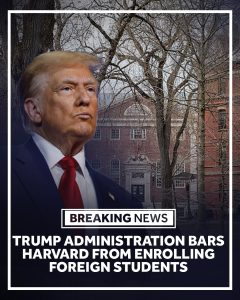
![]() New York Times, Harvard and Trump Restart Talks to Potentially End Bitter Dispute, Michael S. Schmidt and Alan Blinder, June 21, 2025 (print ed.). Details about the discussions emerged after President Trump said the two sides, which have been locked in court battles for weeks, might reach a settlement soon.
New York Times, Harvard and Trump Restart Talks to Potentially End Bitter Dispute, Michael S. Schmidt and Alan Blinder, June 21, 2025 (print ed.). Details about the discussions emerged after President Trump said the two sides, which have been locked in court battles for weeks, might reach a settlement soon.
Among other conditions, the administration wanted Harvard to establish “merit based” hiring and admissions policies, and to see the influence of its faculty curbed.
Harvard University and the Trump administration have restarted talks to potentially settle the acrimonious dispute that led President Trump to wage a far-reaching attack on the school and raised stark questions about the federal government’s place in higher education, according to three people briefed on the negotiations.
The discussions began again this week at a meeting in the White House. At the meeting, Harvard representatives showed White House officials a PowerPoint presentation that laid out measures the school has taken on antisemitism, viewpoint diversity and admissions.
In turn, the White House signaled other steps it would like for Harvard to take on those subjects and later sent a letter laying out conditions that could resolve the conflict, according to one of the people.
 It is unclear how Harvard plans to respond to the letter. A university spokesman declined to comment on the matter.
It is unclear how Harvard plans to respond to the letter. A university spokesman declined to comment on the matter.
Harvard representatives sought a meeting after other higher education leaders expressed hope that it — on behalf of academia — would re-engage with the administration. And Harvard’s outreach came after Education Secretary Linda McMahon publicly raised the prospect of negotiations with a university she routinely criticized. Harvard officials sensed an opening and suggested a briefing on steps the school has taken in recent years, two of the people said.
It is unclear how close both sides are to a potential deal and the exact terms any final agreement would entail. In a post on Truth Social, Mr. Trump said it was “very possible that a Deal will be announced over the next week or so.”
Harvard has been widely praised by Democrats, academics, its alumni and democracy advocates for fighting the Trump administration. But top Harvard officials, according to two people briefed on the matter, have become increasingly convinced in recent weeks that the school has little choice but to try to strike a deal with the White House.

![]() New York Times, Trump Says He Wants to Fund More Trade Schools. Just Not These, Sydney Ember, June 21, 2025. The Job Corps program has long been the subject of debate, but it is now also a point of contention in the administration’s efforts to pull back the social safety net.
New York Times, Trump Says He Wants to Fund More Trade Schools. Just Not These, Sydney Ember, June 21, 2025. The Job Corps program has long been the subject of debate, but it is now also a point of contention in the administration’s efforts to pull back the social safety net.
Late last month, the Labor Department sent a letter to dozens of Job Corps centers across the country. Its message was blunt.
“You are hereby notified that the subject contract is being terminated completely,” the department wrote. “You shall begin immediately all work necessary to provide a safe, orderly and prompt shutdown of center operations.”
The instructions threw into jeopardy the future of Job Corps, a Great Society-era job training program designed to help low-income young people enter the work force.
Many of the program’s students do not have a high school degree or are homeless. Most live, free of charge, in dorms on Job Corps campuses and learn trades in construction, automotive repair, health care and the like. Its defenders claim it offers a lifeline to disadvantaged youths — some 25,000 are served at the 99 centers told to shut down — and provides an on-ramp to employment.
But the Labor Department published a “transparency report” in April that showed something else: low graduation rates and swelling costs. Using those shortcomings as justification, it ordered a “pause in operations” at the 99 Job Corps centers that are operated by outside contractors.
The abrupt decision reignited a longstanding debate over the program’s merits and effectiveness. It also created a new point of contention in President Trump’s efforts to cut costs by dismantling elements of the social safety net.
As Congress debates a budget bill that would reduce funding for federal anti-poverty programs such as Medicaid and food benefits, the White House is also proposing that the Job Corps, with its nearly $1.8 billion budget, be eliminated.
![]() New York Times, News Analysis: How Trump Treats Black History Differently Than Other Parts of America’s Past, Erica L. Green, June 21, 2025 (print ed.). Since taking office in January, President Trump has tried to reframe the country’s past involving racism and discrimination by de-emphasizing that history or at times denying that it happened.
New York Times, News Analysis: How Trump Treats Black History Differently Than Other Parts of America’s Past, Erica L. Green, June 21, 2025 (print ed.). Since taking office in January, President Trump has tried to reframe the country’s past involving racism and discrimination by de-emphasizing that history or at times denying that it happened.
 On the occasion of Juneteenth, a day that commemorates the end of slavery, President Trump took a moment to complain that the national holiday even exists.
On the occasion of Juneteenth, a day that commemorates the end of slavery, President Trump took a moment to complain that the national holiday even exists.
“Too many non-working holidays in America,” Mr. Trump wrote on social media, just hours after his press secretary, Karoline Leavitt, made a point of noting that White House staff had shown up to work.
The president’s decision to snub Juneteenth — a day that has been cherished by generations of Black Americans before it was named a federal holiday in 2021 — is part of a pattern of words and actions by Mr. Trump that minimize, ignore or even erase some of the experiences and history of Black people in the United States. Since taking office in January, he has tried to reframe the country’s past involving racism and discrimination by de-emphasizing that history or at times denying that it happened.
Government websites have been scrubbed of hundreds of words, including “injustice” and “oppression.” Federal agencies eliminated or obscured the contributions of Black heroes, from the Tuskegee Airmen who fought in the military, to Harriet Tubman, who guided enslaved people along the Underground Railroad. School libraries were purged of writings by pre-eminent Black authors like Maya Angelou. Mr. Trump has assailed the Smithsonian Institution for what he characterized as “divisive, race-centered ideology” in its exhibits on race. He ordered the renaming of monuments to honor Confederate soldiers who fought to preserve slavery.
![]()
The Hartmann Report, Bob Kennedy and his anti-vaccine freaks were just caught lying to Congress again about the COVID-19 vaccine, just as a new variant touting a “razor-blade sore throat” arrives, Thom Hartmann, June 21, 2025. NewsGuard Reality Check has again  busted Kennedy, right, and his anti-vax cultists for lying about scientific research.
busted Kennedy, right, and his anti-vax cultists for lying about scientific research.
This time, they claimed that getting the Covid vaccine increases chances of miscarriage and placental blood clots, citing two  peer-reviewed published studies.
peer-reviewed published studies.
News Guard reached out to the authors of those studies and they called out Kennedy’s people’s lies, saying they’d never said any such things and that the actual science proves that getting Covid vaccines actually helps prevent Covid-caused miscarriages and blood clots. Republicans and the truth continue to operate in different universes.
The Hartmann Report, Will we regret Trump being able to use a nuclear weapon? Thom Hartmann, right, June 21, 2025. America confronts two very weird  aspects to Trump’s involvement in Netanyahu’s “stay out of jail” attack on Iran.
aspects to Trump’s involvement in Netanyahu’s “stay out of jail” attack on Iran.
The first is that Russia — oligarchs friendly with Putin, specifically — built the Bushehr nuclear power reactor in Iran and currently has a contract to build eight more, bringing billions in revenue to Russia, Putin, and his buddy. Those billions could well go up in smoke with regime change in Iran, so it’s entirely possible that Trump’s sudden “two week pause” on deciding to bomb Iran is simply a favor to his owner and handler, Vlad.
After all, they’ve had two phone conversations in just the past few days, according to Trump, following Putin sending him a beautiful large portrait of Trump holding up his fist after being shot at and having his ear splattered with the blood of the man standing beside him who got hit with the bullet.
The second weird take is that an “anonymous” White House official is being quoted over on Fox “News” saying that Trump has not taken dropping a nuke on Iran off the table. Eli Clifton, one of the senior advisers over at the Quincy Institute for Responsible Statecraft, tweeted, “The US is considering using a nuclear weapon for the first time since Hiroshima and Nagasaki because our client state murdered our Iranian negotiating partner and started a war?”
— Look out! Retirees being forced into privatized, for-profit, rip-off Medicare “Advantage” plans. New York’s top court just ruled that the sordid deal NYC’s corrupt Mayor Adams worked out with a Medicare “Advantage” provider to force that city’s ~250,000 retirees off real Medicare and into the insanely profitable “Advantage” scam plans was completely legal.
The so-called “Advantage” plans are generating hundreds of billions in profits for insurance companies — for many, it’s their primary profit center now — and some of that money is being recycled into “lobbying” for schemes like this one, leaving workers screwed, particularly when they get seriously ill and the “Advantage” providers begin denying payments for care.
The Hartmann Report, Astonishing: Give Trump a million dollars & you get to become an Army officer, complete with a uniform & everybody must salute you! Thom Hartmann,  right, June 21, 2025.
right, June 21, 2025.
You, too, can play warrior if you’re a large enough Trump donor! Hegseth’s Army just rolled out a new program called “Detachment 201: The Army’s Executive Innovation Corps” that says its goal is to “fuse cutting-edge tech expertise with military innovation.”
So far four tech moguls have jumped at the opportunity to strut around in uniform with Lieutenant Colonel’s silver oak leaves on their shoulders, forcing enlisted and inferior officers to snap to attention and salute them, and every one of their companies have shoveled at least a million into one of Trump’s slush funds. This is Kristi Noem-level corruption and cosplaying, funded with your tax dollars.
June 20

James Greenberg Opinion via Facebook, MAGA is more than a political movement, James Greenberg, June 20, 2025. It’s a symbolic system that answers dislocation with identity, confusion with clarity, and loss with belonging. If we want to push back, we need more than critique. We need a new story—and the civic infrastructure to support it.
When we talk about MAGA, the temptation is to simplify—reduce it to ignorance, racism, authoritarianism. And while those elements are undeniably present, that simplification blinds us to the layered reality of what we’re facing. MAGA is not a single ideology. It’s a fractured but potent worldview, stitched together out of fear, loss, and an offer of belonging.
There are openly authoritarian factions: white Christian nationalists, neo-Nazis, and political opportunists who see democracy as an obstacle to power. There are loyalists who have traded constitutional principle for partisan control. But beyond that are millions of Americans drawn in by something less clear-cut: a sense that the ground beneath them has shifted and that no one in power seems to notice
. For many, MAGA isn’t about policy at all—it’s about feeling seen.
From an anthropological perspective, MAGA functions as a symbolic system. Its power lies not in legislative detail, but in ritual, narrative, and identity. Flags are flown not just in support of a candidate, but as declarations of meaning. Rallies become performances of grievance and imagined redemption. Slogans operate like shared prayers. It’s not politics in the traditional sense. It’s belonging in the face of dislocation.This dislocation isn’t imaginary. It’s rooted in real structural shifts. The collapse of industrial jobs, the erosion of social mobility, the fragmentation of public education, the disappearance of local media—all contribute to a pervasive sense of loss.
Add to that climate disasters, housing precarity, and the stripping of rural and working-class communities by extractive economics, and you get fertile ground for stories that promise a return to order—even if that order is cruel.
The “stolen America” narrative—amplified by cable news, talk radio, and algorithmic social media—offers a simple explanation: you are losing because others are taking what’s yours.
It’s a lie, but a compelling one, because it replaces confusion with clarity. It locates blame. It gives identity to those who feel erased.
If we want to counter this narrative, we need more than facts. We need a coherent, grounded, and emotionally resonant alternative—one that offers a place to stand, not just something to reject.
That counter-narrative might begin like this:
-
- You matter—not because of your income, education, or politics—but because you are part of a shared society whose future depends on all of us.
- This country has been sold out by those who put profit before people—by corporations and political elites who abandoned communities while insulating themselves from the consequences.The struggle isn’t between neighbors. It’s between those who extract and those left to carry the cost.
- Democracy isn’t about shouting the loudest. It’s about showing up—for your neighbors, your community, and the shared spaces that hold us together.
- Patriotism isn’t about who you exclude. It’s about what we build together, and who we refuse to leave behind.
But a story is only as strong as the infrastructure that supports it. And this is where we’ve fallen short. Over the past four decades, many of the institutions that once mediated American life—unions, local newspapers, public schools, even churches—have been defunded, privatized, or politically captured. Into the vacuum stepped commercial media, political spectacle, and ideological silos.
June 19
![]() New York Times, Record Debt Limit Increase Would Break Republican Precedent, Alan Rappeport, June 19, 2025. A proposed $5 trillion debt limit increase would underscore the ideological flexibility that many Republicans are willing to embrace when they are in power.
New York Times, Record Debt Limit Increase Would Break Republican Precedent, Alan Rappeport, June 19, 2025. A proposed $5 trillion debt limit increase would underscore the ideological flexibility that many Republicans are willing to embrace when they are in power.
For years, Republicans have warned about the government’s reliance on borrowed money to pay its bills. That stance has often led to standoffs over raising the nation’s borrowing cap, with Republicans insisting that any increase in America’s so-called debt limit be paired with spending reductions.
This year, the party of fiscal conservatism is poised to discard that philosophy as Republicans prepare to press ahead with domestic policy legislation that combines nearly $4 trillion in tax cuts with a $5 trillion increase to the debt limit. An increase of that magnitude would be a record and underscore the ideological flexibility that many Republicans are willing to embrace when they are in power.
G.O.P. lawmakers are prepared to push through the debt limit increase with only votes from their party, through a budget process called reconciliation. That is making it harder for Republicans to maintain their fiscal hawk credibility, prompting some resistance from a few lawmakers who have warned that they may not vote for the bill if it includes such a large increase in the borrowing cap.
The national debt is approaching $37 trillion. This week, Senate Republicans unveiled legislation that would raise the debt limit by $5.1 trillion, higher than the $4 trillion increase that House Republicans voted for in their bill last month. Such an increase would likely extend the nation’s ability to borrow into 2028.
Most economists and analysts welcome a reprieve from debt limit brinkmanship that has destabilized the economy in recent years. However, raising the debt limit along with legislation that is projected to add $3 trillion to the national debt over a decade suggests that lawmakers are overlooking the nation’s long-term fiscal problems.
![]() New York Times, ‘Little Lobbyists’ Urge Senators to Oppose Trump’s Bill Cutting Medicaid, Megan Mineiro and Margot Sanger-Katz, June 19, 2025. Children with disabilities and their parents who rely on the health insurance program took to Capitol Hill this week to warn that the proposed reductions could be ‘devastating.’
New York Times, ‘Little Lobbyists’ Urge Senators to Oppose Trump’s Bill Cutting Medicaid, Megan Mineiro and Margot Sanger-Katz, June 19, 2025. Children with disabilities and their parents who rely on the health insurance program took to Capitol Hill this week to warn that the proposed reductions could be ‘devastating.’
Letters from an American, Historical Commentary: June 18 [Juneteenth and American Freedoms],  Heather Cox Richardson, right, June 19, 2025. Tomorrow is the federal holiday honoring Juneteenth, the celebration of the announcement in Texas on June 19th, 1865, that enslaved Americans were free.
Heather Cox Richardson, right, June 19, 2025. Tomorrow is the federal holiday honoring Juneteenth, the celebration of the announcement in Texas on June 19th, 1865, that enslaved Americans were free.
That announcement came as late as it did because, while General Robert E. Lee surrendered his Army of Northern Virginia to General Ulysses S. Grant of the U.S. Army on April 9, 1865, it was not until June 2 that General Edmund Kirby Smith surrendered the Trans-Mississippi Department, the last major army of the Confederacy, to the United States, in Galveston, Texas. Smith then fled to Mexico.
Black people in Galveston met the news Order No. 3 brought with celebrations in the streets, but emancipation was not a gift from white Americans. Black Americans had fought and died for the United States. They had worked as soldiers, as nurses, and as day laborers in the Union army. Those who could had demonstrated their hatred of enslavement and the Confederacy by leaving their homes for the northern lines, sometimes delivering valuable information or matériel to the Union, while those unable to leave had hidden wounded U.S. soldiers and helped them get back to Union lines.
But white former Confederates in Texas were demoralized and angered by the changes in their circumstances. “It looked like everything worth living for was gone,” Texas cattleman Charles Goodnight later recalled.
In summer 1865, white legislators in the states of the former Confederacy grudgingly ratified the Thirteenth Amendment, which abolished enslavement except as punishment for a crime.
But they also passed laws to keep freedpeople subservient to their white neighbors. These laws, known as the Black Codes, varied by state, but they generally bound Black Americans to yearlong contracts working in fields owned by white men; prohibited Black people from meeting in groups, owning guns or property, or testifying in court; outlawed interracial marriage; and permitted white men to buy out the jail terms of Black people convicted of a wide swath of petty crimes, and then to force those former prisoners into labor to pay off their debt.
Congress refused to readmit the southern states with the Black Codes in place, and in December 1865, Americans added the Thirteenth Amendment to the Constitution. Six months later, Texas freedpeople gathered on June 19, 1866, to celebrate the coming of their freedom with prayers, speeches, food, and socializing.
By then, congressmen had turned to guaranteeing that states could not pass discriminatory laws against citizens who lived in them, laws like the Black Codes. In 1866 they wrote and passed the Fourteenth Amendment to the Constitution. Its first section established that “All persons born or naturalized in the United States, and subject to the jurisdiction thereof, are citizens of the United States and of the State wherein they reside.” It went on: “No State shall make or enforce any law which shall abridge the privileges or immunities of citizens of the United States; nor shall any State deprive any person of life, liberty, or property, without due process of law; nor deny to any person within its jurisdiction the equal protection of the laws.”
That was the whole ball game, the one that would put teeth behind the principles in the Emancipation Proclamation. The federal government had declared that a state legislature—no matter who elected it or what voters called for—could not discriminate against any of its citizens or arbitrarily take away any of a citizen’s rights. Then, like the Thirteenth Amendment before it, the Fourteenth declared that “Congress shall have the power to enforce, by appropriate legislation, the provisions of this article,” strengthening the federal government.
Celebrations of Juneteenth declined during the Jim Crow years of the late nineteenth and early twentieth centuries, but as Black Americans from the South spread across the country during and after World War II, they brought Juneteenth with them. By the 1980s, Texas had established Juneteenth as a state holiday. Other states followed, and in 2021, thanks in part to pressure from activist Opal Lee, Congress made Juneteenth a federal holiday and President Joe Biden signed the measure into law.
But throughout our history, those determined to preserve a government that discriminates between Americans according to race, gender, religion, ability, and so on, have embraced the idea that true democracy means reducing the power of the federal government and centering the power of the state governments, where voters—registered according to state laws—can choose the policies they prefer…even if they are discriminatory. They have also insisted, as former Confederates did in the late 1860s, that any laws protecting the equal rights of minorities discriminate against the white majority.
In 2025, as the Trump administration echoes  those people, celebrations of Juneteenth are being cut back or even canceled. Corporate sponsors and local governments, as well as the national government, are pulling back their support for festivals and Juneteenth events.
those people, celebrations of Juneteenth are being cut back or even canceled. Corporate sponsors and local governments, as well as the national government, are pulling back their support for festivals and Juneteenth events.
Our history matters. Juneteenth is the celebration of a new nation, one that would honor the equality of all Americans—and one that, 160 years after it was established, we are in danger of losing as those in power set about rewriting the record.
The Bulwark, Marco Rubio, Velociraptor, Andrew Egger and Jim Swift, June 19, 2025. It’s never good to see an opponent learn from his  mistakes. So here’s some unsettling news: Like the Jurassic Park velociraptors opening the kitchen door, the White House is learning.
mistakes. So here’s some unsettling news: Like the Jurassic Park velociraptors opening the kitchen door, the White House is learning.
That’s one takeaway from the news yesterday, first reported by the Washington Post, that the administration will resume interviews for student visas for foreign students, but with more stringent requirements.
All applicants will now be obliged to make their social media accounts public “to be scrutinized for hostility toward the United States.”
It’s a significant drawdown from the maximum-hostility interim posture the White House announced last month, when it canceled the issuance of all new student visas while it developed the policies announced this week. That change, in turn, came on the heels of the administration’s iron-fisted first iteration of the policy, which involved canceling current students’ visas on often flimsy pretexts before sending masked plainclothes officers to bundle them into unmarked vans and whisk them away.
The new policy represents a canny political retreat from such excesses. On the merits, it’s far more defensible. It’s hard to imagine the median voter objecting to the sentiment: We shouldn’t invite in immigrants, on student visas or otherwise, who openly profess hatred of America.
But while the new policy is less nakedly hostile than the former maximalist one, its impact may prove to be much the same.
Around the Country and County
June 18

Brad Lander, the New York City comptroller, flanked by several federal agents who are holding his handcuffed arms behind his back. Two of them are wearing masks, and other people behind them are holding up their phones to record the incident.Brad Lander, the New York City comptroller, was arrested on Tuesday by federal agents at an immigration courthouse. (Associated Press photo by Olga Fedorova via the New York Times). Shown below a collage of photos showing federal agents man-handlling California’s senior U.S. Senator, Democrat Alex Padilla, before forcing him to the floor and handcuffing him as he tried to ask a question at a press conference held by U.S. Homeland Security Secretary Kristi Noem, shown also, in a Los Angeles federal office building that housed Padilla’s district office suite.

![]() New York Times, Images of Handcuffed Democrats Start to Pile Up in Trump’s Crackdown, Katie Glueck, June 18, 2025. Federal agents have arrested a growing number of the party’s elected officials, fueling liberal outrage and conservative accusations that Democrats are carrying out publicity stunts.
New York Times, Images of Handcuffed Democrats Start to Pile Up in Trump’s Crackdown, Katie Glueck, June 18, 2025. Federal agents have arrested a growing number of the party’s elected officials, fueling liberal outrage and conservative accusations that Democrats are carrying out publicity stunts.
A United States senator forced to the floor and handcuffed by federal agents for interrupting a news conference. A mayor taken into custody by masked officials in military-style fatigues. A political candidate pushed against a wall and handcuffed in a dispute at an immigration courthouse.
With tensions rising over President Trump’s mass deportation policies, the government crackdown is extending to the political opposition.
 As Democrats struggle to push back against the administration, federal agents have arrested or clashed with a growing number of the party’s elected officials. The scenes of chaos reflect the tinderbox nature of this political moment, and the expanding national battles over due process, the rule of law and the system of checks and balances.
As Democrats struggle to push back against the administration, federal agents have arrested or clashed with a growing number of the party’s elected officials. The scenes of chaos reflect the tinderbox nature of this political moment, and the expanding national battles over due process, the rule of law and the system of checks and balances.
“This is executive authority, especially in the Department of Homeland Security, running out of control,” said Senator Tina Smith, a Minnesota Democrat. “Do the members of Congress need security details to defend themselves from the executive branch? God, I hope not.”
The most recent instance came on Tuesday, when Brad Lander, the New York City comptroller and a mayoral candidate, was arrested at an immigration courthouse in Lower Manhattan as he tried to escort a migrant whom agents were seeking to arrest.
The Department of Homeland Security suggested that Mr. Lander, who has trailed in polls of the mayoral race, was seeking to “undermine law  enforcement safety to get a viral moment,” and said that he had assaulted law enforcement, claims he denied after his release later Tuesday.
enforcement safety to get a viral moment,” and said that he had assaulted law enforcement, claims he denied after his release later Tuesday.
Certainly, plenty of politicians over the years have gotten themselves arrested in an effort to draw attention to themselves or their cause. Many elected Democrats have rushed to show how fiercely they are opposing Mr. Trump’s administration, and have been rewarded for doing so by the party’s base. Accusations of grandstanding flowed in quickly from Republicans on Tuesday.
“Stop using this as a means of self promotion in an effort to make yourself relevant in advance of an election,” Representative Mike Lawler, a New York Republican, wrote on social media.
But to many Democrats, the images of the suit-and-tie-clad Mr. Lander being manhandled showed a chilling turn in the country’s politics.
![]()
The Hartmann Report, The Politics of Hate: How Trump Weaponized Our Darkest Instincts, Thom Hartmann, right, June 18, 2025. Why America must confront the corrosive force that Trump is trying to  use to tear us apart.
use to tear us apart.
Yesterday, I spoke with you about the importance of our government embracing free speech and not trying to stifle it or intimidate (or deport) people for unpopular political writings. Today, let’s examine the flip side of that argument: hate speech, the power and danger of hate itself, and how we defeat it as Trump tries to use it to manipulate us.
Hate is poison; it never makes anything better. It’s corrosive like an acid, eats away at our empathy and reason, and eventually destroys our very humanity. When nations are consumed by hate — like Germany was in the 1930s, or the American South was during Jim Crow — the result is invariably the destruction of civil society and its replacement with political, economic, and legal systems based in and dependent upon violence.
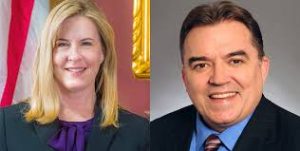
Hate killed a state legislator (shown above with her murdered husband) in Minneapolis this past weekend, nearly killed Paul Pelosi with a hammer, and fuels the same violent rage that burned through Charlottesville, stormed the Capitol on January 6th, and has been stalking school board meetings and statehouses across America for the past two decades.
Hate brought Senator Alex Padilla to his knees; does anybody believe that if he’d been white he’d have been dragged out like that and beat to the ground? It inspired Senator Mike Lee and Elon Musk to essentially congratulate a would-be mass murderer. It just arrested the Comptroller of New York City for trying to defend a man seeking asylum in the United States.
Hate blew up the Federal Building in Oklahoma City, took down the twin towers on 9/11, and keeps loading the chambers of mass shooters while whispering lies about enemies and conspiracies until blood spills in schools, synagogues, churches, and supermarkets.
So, why does Trump — and why do his followers,  including those elected to federal and state office, and his cabinet members — so vigorously embrace hate?
including those elected to federal and state office, and his cabinet members — so vigorously embrace hate?
Trump is the first president in American history to explicitly use hate as a campaign tool and then embrace it as the central focus of his rule. He launched his first campaign by calling Mexicans “rapists,” proposed a Muslim ban, called for violence at his rallies, and used dehumanizing language to describe immigrants, women, and political opponents. For Memorial Day, he posted a social media message calling the half of Americans who voted against him “scum.”
This wasn’t political strategy in the traditional sense — it was a revival of something far more dangerous: the politics of hate as a tool for seizing and maintaining power.
![]() New York Times, House Policy Bill Would Add $3.4 Trillion to Debt, Swamping Economic Gains, Tony Romm, June 18, 2025 (print ed.). The updated findings from the Congressional Budget Office amounted to the latest dour report card for the president’s signature legislation.
New York Times, House Policy Bill Would Add $3.4 Trillion to Debt, Swamping Economic Gains, Tony Romm, June 18, 2025 (print ed.). The updated findings from the Congressional Budget Office amounted to the latest dour report card for the president’s signature legislation.
 House Republicans’ sprawling package to cut taxes and slash federal safety-net programs would add about $3.4 trillion to the debt, according to nonpartisan congressional analysts, who reported on Tuesday that the minor gains in economic growth under the bill would not offset its full fiscal impact.
House Republicans’ sprawling package to cut taxes and slash federal safety-net programs would add about $3.4 trillion to the debt, according to nonpartisan congressional analysts, who reported on Tuesday that the minor gains in economic growth under the bill would not offset its full fiscal impact.
The updated findings from the Congressional Budget Office amounted to yet another dour  report card for the president’s signature legislation, which passed the House last month but now faces the prospect of significant revisions to its core components in the Senate.
report card for the president’s signature legislation, which passed the House last month but now faces the prospect of significant revisions to its core components in the Senate.
In its current form, the House Republican bill would extend and expand a set of expiring tax cuts enacted by President Trump during his first term. It would pay for some of those expensive components with deep cuts to federal anti-poverty programs, including Medicaid and food stamps.
![]() New York Times, The Senate Wants Billions More in Medicaid Cuts, Pinching States, Sarah Kliff and Margot Sanger-Katz, June 18, 2025 (print ed.). Republicans are seeking to limit a tax loophole that gives states more federal matching funds. Many state budgets could be hurt.
New York Times, The Senate Wants Billions More in Medicaid Cuts, Pinching States, Sarah Kliff and Margot Sanger-Katz, June 18, 2025 (print ed.). Republicans are seeking to limit a tax loophole that gives states more federal matching funds. Many state budgets could be hurt.
 The Senate policy bill released Monday would cut billions of dollars more from Medicaid than the earlier, House-passed legislation — in large part by cracking down on a budgeting maneuver used by 49 states that congressional Republicans have called a scam or gimmick.
The Senate policy bill released Monday would cut billions of dollars more from Medicaid than the earlier, House-passed legislation — in large part by cracking down on a budgeting maneuver used by 49 states that congressional Republicans have called a scam or gimmick.
It does this by limiting Medicaid provider taxes, a loophole that states use to collect more federal matching funds for Medicaid, an insurance program for the poor that covers roughly 70 million Americans.
For decades, taxing providers like hospitals has been a major part of how states pay Medicaid bills, but this tactic has come under scrutiny in Congress this year as Republicans look for ways to help pay for President Trump’s tax cuts.
Cutting provider taxes would probably mean funding shortfalls of hundreds of billions of dollars for states over the next decade, leaving them with budget holes to fill. To offset the losses, states would most likely need to explore cutting other services or raising other taxes.
Hopium Chronicles, Pro-Democracy Advocacy, Trump Is Wagging All The Dogs He Can Find (Video), Simon Rosenberg, June 18, 2025. Hawley On Trump’s Budget Bill: “It’s very bad policy, and it hurts poor people.”
Sharing a recording of a great discussion I had yesterday with journalist Adam Klasfeld for his Substack, “All Rise News.” We spent the bulk of the conversation talking about the argument I’ve been advancing that Trump is failing, weak and increasingly unpopular; a big blubbery baby man and anything but a strong man.
A quick summary: Other than breaking a lot of things and enriching himself Trump has very few wins he can point to right now.
His economic strategy is slowing the global and US economies, has caused our credit rating to be downgraded, threatens the fiscal integrity of the United States, raises prices on everyone and does not cutting them, and will cause tens of millions to lose their health insurance, tens of millions more will see their health care costs rise and the overall health care system will be dramatically weakened.
He promised to end the Ukraine war, bring peace to the Middle East, end the Gaza conflict, 90 trade deals in 90 days, rip Greenland from Europe, make Canada the 51st state. None of that has happened, global leaders are not bending the knee and some are even mocking him to his face while visiting the Oval Office.
His budget bill is wildly unpopular, and struggling to get through Congress. What may be the largest protest movement in American history has formed gainst him. It has become impossible to hide the buffoonery of his Star Wars cabinet. He looks terrible. His ties are longer, his pants higher and his Truths more unhinged. He fled the G7 on Monday.
Respected elected officials in America are getting arrested, charged, assaulted and assasssinated. Marines are on the streets of an American city. Everything he is doing appears designed to make China and Russia — not America — great again.
The circle of defiance to Trump’s agenda of sabotage, plunder and betrayal keeps growing and growing. The world, the American people and reality itself just aren’t bending the knee.
Our democracy is proving more resisilient and our people more patriotic than he expected.
Their first effort to wag the dog — change the subject — immigration enforcement escalation in Los Angeles and across the country — has so far backfired on Trump. The arrests, assaults and assassinations of Democrats may make them feel STRONG AND MIGHTY but the public is rejecting all this. His numbers keep dropping.
June 17
Democracy Docket, Pro-Democracy Advocacy, Marc Elias, June 17, 2025. There is a dangerous pathology 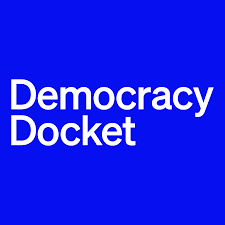 that causes some otherwise intelligent people to bend over backward to excuse Republican voter suppression. Unable to defend it on the merits, they instead claim it is ineffective or even counterproductive.
that causes some otherwise intelligent people to bend over backward to excuse Republican voter suppression. Unable to defend it on the merits, they instead claim it is ineffective or even counterproductive.
This impulse is particularly noticeable in the legacy media, where both-sides coverage is all too common. But you also see it among some so-called election experts, who likewise find comfort in falsely insisting that both political parties are equally culpable for deploying unsavory tactics.
If our democracy does not ultimately survive this era, it may well be because performative neutrality killed it — or at least hid its murder from view and then claimed it is still alive. Yet, even now, recognizing that one political party is protecting democracy and the other is undermining it is too much for these individuals and legacy institutions to abide by.
There is no arena where this issue is more contentious, and the stakes are higher, than in Republican efforts to limit who can register, vote and have their vote counted. There is no question that the Republican Party, under Donald Trump, has prioritized voter suppression.
GOP-controlled legislatures have enacted new, draconian anti-voting measures. The RNC boasts that its top priority is running “election integrity” programs that make voting more difficult. We  have seen a tidal wave of new litigation from the Republican Party and its allies aimed at purging voters, allowing more voter challenges, restricting voting and discarding lawfully cast ballots.
have seen a tidal wave of new litigation from the Republican Party and its allies aimed at purging voters, allowing more voter challenges, restricting voting and discarding lawfully cast ballots.
This has created a quandary for the both-sides crowd. They can’t plausibly argue that Democrats are engaging in comparable behavior. In fact, Democrats and their allies are at the forefront of fighting GOP efforts.
Instead, they have adopted a new, pernicious argument to discount the effect of the GOP’s mass disenfranchisement machine. They claim that voting laws and voter suppression programs make little difference to who votes or has their vote counted. Essentially, they argue that the GOP is wasting its money.
To declare a pox on both parties, practitioners of both-sides journalism — and those who support them — must proclaim that, despite the Republican Party’s efforts, the playing field on which the two parties compete is fair and level. This is awkward, to say the least.
Setting aside the morality of discounting a political party’s efforts to disenfranchise voters, this approach requires both political parties to misunderstand what is in their electoral interests. Indeed, both the Democratic and Republican parties must be wrong to conclude that voter suppression measures affect the outcome of elections. And they must both be wrong in the same direction.
It also requires that civil rights and voting rights groups — and their right-wing counterparts — have likewise misunderstood the effects (or lack thereof) of these laws and practices on voters. Finally, it means that hundreds of state and federal judges have been mistaken in evaluating evidence and setting these laws aside for negatively impacting citizens’ ability to vote.
If this seems unlikely, it is. And trafficking in this nonsense is not only wrong but dangerously immoral. It might have been excused when Republicans denied what they were doing or cloaked their voting law changes in the guise of reform. But those days have long passed.
Republicans spent five months trying to throw out more than 65,000 lawful votes to steal a North Carolina state Supreme Court election. When they failed, Donald Trump’s Department of Justice picked up the fight and filed a lawsuit. There are not two sides to what the GOP is doing. And there is nothing ineffectual about it.
Recently, the RNC sought to intervene in a lawsuit brought by the Democratic Party to block Trump’s illegal executive order that purports to prohibit states from counting ballots mailed by voters in advance of Election Day but received shortly thereafter. The RNC and its allies have been targeting these laws for years because they correctly believe that disqualifying these lawful ballots would advance their partisan electoral interests.
In support of their motion, the RNC submitted an affidavit from a senior party official stating unequivocally that “post-election mail-in ballot deadlines also specifically harm Republican candidates and voters [because] Democratic voters tend to mail their ballots later on average than Republican voters, which results in late-arriving ballots favoring Democratic candidates.”
Yet when the legacy media covers this issue — as with other issues involving voting — it largely ignores these direct statements from political parties in favor of so-called experts who offer more equivocal evaluations. Who would know more about the composition of these ballots? The Democratic and Republican parties, or journalists and the sources they select to fit their stories?
When it comes to voting rights, there is no topic the legacy media latches onto more quickly than voter ID. And, once again, those seeking to condemn both sides will cherry-pick laws with the fewest obvious partisan effects.
Yet, recently, the independent media outlet Bolts noted that a new voter ID law in Indiana, which bans the use of college IDs, would have a dramatic effect. According to the report, in the county where Indiana University Bloomington is located, “two-thirds of people who cast ballots at the only on-campus polling place this November used a student ID.” A review of past results from that precinct indicates that the law will disproportionately affect Democratic candidates.
So why, then, do so many in the legacy media continue to discount the effects of voter suppression on the outcome of elections?
Part of the reason is that people in the legacy media are unlikely to personally experience it and therefore discount its effects on others. Most journalists are college-educated and live in cities controlled by Democrats. They have reliable mail service. They have jobs that enable them to vote during the workday. They simply do not see voter suppression as a threat to them and thus discount it for others.
More importantly, those committed to a both-sides frame of reference cannot accept the effects of voter suppression as real without losing their ability to engage in performative neutrality. They can take a stand against the January 6 insurrection by justifying that not all Republicans supported it. They can decry election denialism by valorizing the few Republicans who condemn it.
There is no similar space when it comes to voter suppression. The entire GOP supports voter suppression. Every House Republican voted against anti-suppression legislation when it was before Congress. Every Republican governor and statewide Republican elected official in charge of elections supports it today. It is simply too big and pervasive within the GOP to maintain a both-sides approach — even when the GOP tells us what it is doing.
Hopium Chronicles, Pro-Democracy Advocacy, Double TACOS, Dropped Papers, Declining Poll Numbers — Monty Python Or American President? Simon Rosenberg, June 17, 2025. Our protests this weekend were dignified, joyous, enormous, peaceful. An  affirmation of our great American democratic tradition. They were, and remain this morning, a searing counterpoint to the extraordinary chaos and repeated failure we continue to see from Trump. My overwhelming sense of the moment is that early Trump 2.0 is failing, they know it, and they have begun to panic.
affirmation of our great American democratic tradition. They were, and remain this morning, a searing counterpoint to the extraordinary chaos and repeated failure we continue to see from Trump. My overwhelming sense of the moment is that early Trump 2.0 is failing, they know it, and they have begun to panic.
Let’s just look at what happened in the last 24 hours.
The G7: Trump went to the G7, arrived late for his first meeting, bent the Trumpian knee to Putin, tweeted that Tehran, a city of 10m, needed to evacuate, left a day early blowing off a meeting with Zelensky, refused to sign a joint statement on Iran and Israel, then signed it late last night. In an impromptu press event with UK PM Keir Starmer he dropped papers all over the place. At the G7, as it was at his parade, his ridiculous tie has gotten longer, his pants higher, and he looks ever more comical, cartoonish, far more like an SNL caricature than a serious leader: Trump fled the G7 in part because everything being discussed there was an implicit rebuke of him and a reminder of his many failures. He did not bring peace to Ukraine in 24 hours, as he repeatedly promised. He did not bring peace to the Middle East as he repeatedly promised. He did not end the Gaza war as he repeatedly promised. He has not negotiated “90 deals in 90 days” as he repeatedly promised. Europe has not ceded Greenland as he has demanded, nor has Canada agreed to become the 51st state. His tariffs have slowed the economy of every country in the world, including all those in the G7 and our own, something I am sure he was reminded of in the discussions yesterday.
Despite him having all this “strength” the world is not bending the knee to Trump, something all can see; while the world also seems him repeatedly, pathetically, urgently, bending the knee and all of his other ugly parts to Putin, again and again and again.
Immigration Double TACO: As we got numbers in the last week that his immigration escalation was unpopular and the country was turning on him, Trump danced and wiggled. He announced a roll back of enforcement in rural areas and with some businesses. Then Sunday is one of his most unhinged posts of the year he said he was directing immigration resources against blue areas. Then this morning we learned that actually there is no roll back. Trump chickened out from his initial chickening out. Holy double TACO Batman! From The Washington Post this morning:
The Department of Homeland Security on Monday told staff that it was reversing guidance  issued last week that agents were not to conduct immigration raids at farms, hotels and restaurants — a decision that stood at odds with President Donald Trump’s calls for mass deportations of anyone without legal status.
issued last week that agents were not to conduct immigration raids at farms, hotels and restaurants — a decision that stood at odds with President Donald Trump’s calls for mass deportations of anyone without legal status.
Officials from Immigration and Customs Enforcement, including its Homeland Security Investigations division, told agency leaders in a call Monday that agents must continue conducting immigration raids at agricultural businesses, hotels and restaurants, according to two people familiar with the call. The new instructions were shared in an 11 a.m. call to representatives from 30 field offices across the country.
ICE and HSI field office supervisors began learning about a likely reversal of the exemption policy Sunday after hearing from DHS leadership that the White House did not support it, according to one person with knowledge of the reversal.
An official from DHS had sent an email Thursday telling agents to “hold on all worksite enforcement investigations/operations on agriculture (including aquaculture and meat packing plants), restaurants and operating hotels.” That message went out hours after Trump suggested he was sympathetic to concerns raised by farmers and hospitality executives about his deportation plan. The Washington Post spoke with four people who confirmed that a call was held Monday with the agency’s leadership.
There will be no safe spaces for industries who harbor violent criminals or purposely try to undermine ICE’s efforts,” Tricia McLaughlin, an assistant secretary for DHS, said Monday. “Worksite enforcement remains a cornerstone of our efforts to safeguard public safety, national security and economic stability.”
Um, who is in charge of our government? Stephen Miller? Putin? Elon? Trump?
June 16

![]() New York Times, Live Updates: Minnesota Man Is Charged With Murder of Lawmaker, Ernesto Londoño, Jeff Ernst and Yan Zhuang, June 16, 2025. Vance Boelter was captured late Sunday after a two-day manhunt that put the state on edge. He is expected to face first-degree murder charges in the attacks, which killed a state lawmaker and wounded another.
New York Times, Live Updates: Minnesota Man Is Charged With Murder of Lawmaker, Ernesto Londoño, Jeff Ernst and Yan Zhuang, June 16, 2025. Vance Boelter was captured late Sunday after a two-day manhunt that put the state on edge. He is expected to face first-degree murder charges in the attacks, which killed a state lawmaker and wounded another.
The largest manhunt in Minnesota’s history came to an end late Sunday when a man accused of assassinating a state lawmaker and shooting another was finally captured, after SWAT teams used drones to track him crawling through a wooded area outside Minneapolis.
The suspect, Vance Boelter, 57, was arrested and charged, concluding an extensive two-day search that rattled Minnesotans. Mr. Boelter surrendered near Green Isle, Minn., a town where he had a home with his wife and children. The police said they searched the area after a resident spotted the suspect on a trail camera.

Shown above are assassination victims Melissa Hortman of Minnesota, the top Democrat in her state’s House of Representatives for years, and her husband, Mark. A politically motivated gunman also seriously wounded State Senator John A. Hoffman, another Democrat, and his wife, Yvette, in separate attacks at their homes in suburban Minneapolis on Saturday, June 14, 2025. The gunman also fired at police officers before fleeing.
Lincoln Square Media, Analysis: The Latest from  Minnesota after the Assassinations, Susan J. Demas, June 16, 2025. J. Patrick Coolican, the Editor of the Minnesota Reformer, talks about the right-wing disinformation echo chamber that sprang into action after the weekend shootings of Democratic lawmakers.
Minnesota after the Assassinations, Susan J. Demas, June 16, 2025. J. Patrick Coolican, the Editor of the Minnesota Reformer, talks about the right-wing disinformation echo chamber that sprang into action after the weekend shootings of Democratic lawmakers.
Letters from an American, Historical Commentary: June 15 [U.S. Political Assassinations and No Kings Marches],  Heather Cox Richardson, right, June 16, 2025. Yesterday began with the horrific news that a gunman had shot two Minnesota lawmakers and their spouses in what Minnesota governor Tim Walz said appeared to be a “politically motivated assassination.”
Heather Cox Richardson, right, June 16, 2025. Yesterday began with the horrific news that a gunman had shot two Minnesota lawmakers and their spouses in what Minnesota governor Tim Walz said appeared to be a “politically motivated assassination.”
Law enforcement officers encountered the suspected gunman, 57-year-old Vance Boelter, coming out of Hortman’s house. He was dressed as a police officer. Officers exchanged gunfire with him before he fled, leaving behind his vehicle, which looked much like a police car. In it was a list of dozens of people he wanted to kill. They were mostly Democrats or people connected to abortion rights efforts. Law enforcement officers captured Boelter tonight.
MAGA Republicans are working hard to identify Boelter with what Senator Mike Lee (R-UT) called “Marxism” and Senator Bernie Moreno (R-OH) called “the extreme left,” but as investigative journalist Phil Williams of NewsChannel 5 Nashville notes, public databases show Boelter was in the past a registered Republican. His evangelical religion and his anti-LGBTQ and anti-abortion stances reflect MAGA positions. Boelter’s roommate told reporters that Boelter was a “strong” supporter of President Trump.
![]() Associated Press via Politico, Protester shot and killed at ‘No Kings’ rally in Utah, police say, Staff Report, June 15, 2025. The victim was a bystander to a confrontation.
Associated Press via Politico, Protester shot and killed at ‘No Kings’ rally in Utah, police say, Staff Report, June 15, 2025. The victim was a bystander to a confrontation.
A man believed to be part of a peacekeeping team for the “No Kings” protest in Salt Lake City shot at a person who was brandishing a rifle at demonstrators, striking both the rifleman and a bystander who later died at the hospital, authorities said Sunday.
Police took the alleged rifleman, Arturo Gamboa, 24, into custody Saturday evening on a murder charge, Salt Lake City Police Chief Brian Redd said at a Sunday news conference. The bystander was Arthur Folasa Ah Loo, 39.
Detectives don’t yet know why Gamboa pulled out a rifle or ran from the peacekeepers, but they accused him of creating the dangerous situation that led to Ah Loo’s death. The Associated Press did not immediately find an attorney listed for Gamboa or contact information for his family in public records.
The Utah chapter of the 50501 Movement, which helped organize the protests, said in a statement on Instagram that they condemned the rifleman in Salt Lake City, and thanked first responders and “our safety team” for the quick response.
June 15

Proof, Investigative Commentary: Over 250 Photos From Around the Nation and the World From the Historic “No Kings Day” Protests, Seth Abramson, left, June 15, 2025. Almost no one showed up to Donald Trump’s surprisingly timid, depressing, and generally lackluster birthday party in Washington, but protests against him were bursting at the seams across the globe.
“No Kings Day” may well go down in history—and should arguably be celebrated in the future on every June 14, given that that’s Donald Trump’s birthday… and his birthday is a day that should be obliterated from America’s collective memory if at all possible.
While June and July already have several holidays, from Juneteenth to July 4, at least until Trump is gone from American life by peaceful, legal means it seems No Kings Day is worth its own celebration, as it’s less a remembrance of the past than a promise regarding America’s future. There’ll be no kings in America but the American people.
With all this in mind, I’ll say that what follows may be my favorite piece of curatorial journalism of all those I’ve ever done. It’s certainly the first one ever to actually make me happy.
I decided to try to find crowd photos of as many of the over 2,000 No Kings Protests as possible, not just the ones held in the U.S. but those held around the world on June 14, 2025.
That’s right: the photos below aren’t just from America but all over the globe. It’s hard to articulate what a historic moment No Kings Day was, but saying that it was a global celebration is probably a good start.
Compiling these photographs turned out to be a massive undertaking. For all that Jeff Bezos and the Washington Post hilarious claimed that only “thousands” were showing up to the thousands of No Kings protests, it was, of course, millions. And that means that there were in fact so many protests that trying to find photographic evidence of them all is an impossibility. So my goal here was to at least find hundreds of protests that in total would at a minimum show hundreds of thousands of anti-Trump protesters.
I hope readers will understand why the repository below is only for Proof subscribers: while I of course only used photographs that had been made public, I certainly don’t want to risk any of the MAGAs who spent No Kings Day watching the saddest parade in American history (the birthday bash that Donald Trump threw for himself at the American taxpayer’s expense) deciding to harass any of the thousands and thousands and thousands of people who appear along with their hometowns in the photographs below.
On the subject of The Saddest Parade in History, it’s the one that happened in D.C. as the nation was protesting Trump’s openly fascist agenda. Trump aimed to celebrate his birthday (a birthday that makes him about the age Joe Biden was when Mr. Trump began saying Biden was too old to be President of the United States) by spending tens of millions of taxpayer dollars and causing tens of millions in damage to Washington’s roads on a parade that was short in every way imaginable. It was short timewise and it was short in terms of its route, which was only 1,600 meters.
It was also lackluster in ways even I couldn’t have imagined beforehand. On Twitter and Bluesky I compiled some of the chatroom comments that were made during the event in (of all places) a conservative chatroom: the online site of Rupert Murdoch’s New York Post. You’ll truly be stunned at how universally Trump’s parade was panned.
But after all, why not? Below you can see a photo from the extremely scattershot and extremely slow-moving parade whose only intention, apparently, was to force soldiers to dress up in awkward period costumes for a would-be dictator. Certainly, the crowd was sparse (see image below) and the event itself so sluggish that many online were seen to wonder—in all earnestness—whether the same few tanks were being driven around the block several times to make the whole event seem more robust than it was.
As for the music? It wasn’t music at all but muzak—lyric-free almost-covers of well-known hits that had been carefully calibrated not to provoke civil lawsuits. Picture lots of unremarkable guitar solos. In fact, the music was so horrid that many online wondered if much of the $45 million Trump had demanded for his parade had instead been pocketed by him and/or his pals. It certainly wasn’t spent on any licensing fees.

Yes, the structure at the background of the bottom photo is the Presidential Viewing Stand; so in looking at the photo you are, in fact, looking at the very thickest part of the paltry crowd at Trump’s birthday bash. Even as his fans crowed online that the claimed attendance (apparently a White House-provided figure) was 200,000—if past is precedent, the White House was simply using a jazzed-up version of the number of meaningless digital RSVPs as an attendance quote—observers, including this author, suspect that the total number of attendees was likely in the thousands only. (And if this is to be believed, which is a mystery as yet unsolved, some of those in attendance may have been paid as seat-fillers; certainly, Donald Trump loves to secretly do what he has long accused his political opponents of doing, and he continues to falsely say that Democrats pay protesters when in fact he’s the only U.S. politician who has been caught doing so in recent years.)
By contrast, as someone born in 1976 I think I can safely say that I’ve never seen so many large, enthusiastic, diverse, festive, and truly dynamic protests across America as we saw on No Kings Day. And there were virtually no reports of property damage or arrests, despite some sinister far-right LEO folks seemingly hoping there would be.
Editor’s Note: See GIF by Medha Murtagh via Substack here.
And just to cleanse your palate, now, here’s a small sample of my favorite No Kings Day photographs (with the full photo archive below the subscriber fold a bit further down).

President Trump, age 79, accompanied by First Lady Melania Trump and aide Walt Nauta, slumps on the reviewing stand for the June 14 parade celebrating both the U.S. Army and Trump’s birthday. Bulwark analyist Will Sommer said: “Trump looks like, ‘Why did I do this? I thought this was going to be cool.'”
The Bulwark, Opinion: Trump’s Parade FLOPS as MILLIONS Protest Nationwide, June 14-15, 2025 (17:47 mins). Trump’s Parade FLOPS as MILLIONS Protest  Nationwide. Jonathan V. Last, Sarah Longwell, Will Sommer, and Andrew Egger talk Trump’s sad, sparsely attended military/birthday parade in Washington DC while ‘No Kings’ protests across the country draw unprecedentedly massive crowds.
Nationwide. Jonathan V. Last, Sarah Longwell, Will Sommer, and Andrew Egger talk Trump’s sad, sparsely attended military/birthday parade in Washington DC while ‘No Kings’ protests across the country draw unprecedentedly massive crowds.
Andrew Egger: This is the guy who’s [allegedly] channelling the popular will. He is the avatar and embodiment of “America.” Because that’s the specific argument he’s made, the optics of this becomes much more important.
Will Sommer: “You had soldiers handing out cans of Dana White’s energy drink.”
JVL “What a world ….One of the things this may have helped with is just making people feel like they’re not crazy and they’re not alone.”
Sarah Longwell: “The idea that he was humiliated today — ’cause I guarantee that it matters so much to him — that’s one of the things we get to feel good about it.”
June 14

![]() New York Times, Live Updates: Minnesota Lawmaker Is Assassinated in Targeted Attack, Governor Says, Mitch Smith and Jonathan Wolfe, June 14, 2025. Melissa Hortman, a Democratic state representative, and her husband (shown above) were fatally shot, Gov. Tim Walz said, and a separate attack targeted a state senator. Officials warned that the gunman was at large.
New York Times, Live Updates: Minnesota Lawmaker Is Assassinated in Targeted Attack, Governor Says, Mitch Smith and Jonathan Wolfe, June 14, 2025. Melissa Hortman, a Democratic state representative, and her husband (shown above) were fatally shot, Gov. Tim Walz said, and a separate attack targeted a state senator. Officials warned that the gunman was at large.
Two Democratic state legislators and their spouses in Minnesota were found shot early Saturday in what the state’s governor described as an apparent politically motivated assassination attempt.
One of the lawmakers, State Representative Melissa Hortman, died, as did her husband, Mark. State Senator John A. Hoffman, right, and his wife 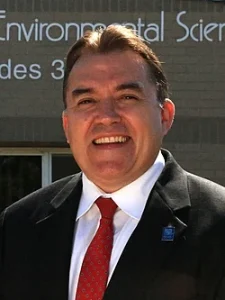 Yvette were shot multiple times, but remained alive as of Saturday morning.
Yvette were shot multiple times, but remained alive as of Saturday morning.
The authorities were searching for an assailant who targeted two long-serving lawmakers who had prominent roles in the Minnesota Capitol, where Democrats and Republicans hold nearly equal numbers of seats. Officials said the assailant was impersonating a police officer, and shot at officers who were arriving at one of the lawmakers’ homes.
“This was an act of targeted political violence,” Gov. Tim Walz said. “Peaceful discourse is the foundation of our democracy. We don’t settle our differences with violence at gunpoint.”
Ms. Hortman, a lawyer by training and a  legislator for about 20 years, served as the speaker of the Minnesota House of Representatives for a six-year period ending earlier this year. A resident of Brooklyn Park, just outside Minneapolis, she represented a safely Democratic district and routinely won re-election by more than 20 percentage points. Ms. Hortman was married with two children, according to her state legislative bio.
legislator for about 20 years, served as the speaker of the Minnesota House of Representatives for a six-year period ending earlier this year. A resident of Brooklyn Park, just outside Minneapolis, she represented a safely Democratic district and routinely won re-election by more than 20 percentage points. Ms. Hortman was married with two children, according to her state legislative bio.
Ms. Hortman helped Democrats pass several key policies on abortion rights, marijuana and medical leave and other issues in 2023 and 2024, when her party briefly held full control of the state government. After last year’s elections, when Republicans made gains in legislative races and Mr. Walz lost his bid for vice president, Ms. Hortman defended Democrats’ record leading the state.
“I wouldn’t change what we did because we invested in Minnesotans,” Ms. Hortman said. “We made child care cheaper. We made getting housing built a high priority. We made some pretty considerable investments in state infrastructure projects.”
Mr. Hoffman, a fourth-term state senator from Champlin, another Minneapolis suburb, chairs the Senate’s Human Services Committee. His home address was published on his bio page on the Senate’s website. He won his most recent election by 10 percentage points.
“A hallmark of my approach is collaboration across the aisle,” Mr. Hoffman wrote in a letter to constituents ahead of last year’s legislative session. “I firmly believe that the path to progress for our state involves considering input from all perspectives, regardless of which party holds the majority.”
Mr. Hoffman, who has a daughter, also owns a business consulting firm in Minnesota. Before being elected to the Senate, he served on a local school board in the Minneapolis suburbs.

 Associated Press, Authorities still searching for suspect in shooting of 2 Minnesota state lawmakers,Tim Sullivan, Steve Karnowski and Alanna Durkin Richer, June 14, 2025. Hundreds of law officers fanned out across a Minneapolis suburb Saturday in pursuit of a man (shown above) who authorities say posed as a police officer and fatally shot a Democratic state lawmaker in her home in what Gov. Tim Walz called “a politically motivated assassination.”
Associated Press, Authorities still searching for suspect in shooting of 2 Minnesota state lawmakers,Tim Sullivan, Steve Karnowski and Alanna Durkin Richer, June 14, 2025. Hundreds of law officers fanned out across a Minneapolis suburb Saturday in pursuit of a man (shown above) who authorities say posed as a police officer and fatally shot a Democratic state lawmaker in her home in what Gov. Tim Walz called “a politically motivated assassination.”
Authorities identified the suspect as 57-year-old Vance Boelter, shown above, and the FBI issued a reward of up to $50,000 for information leading to his arrest and conviction.
Boelter is a former political appointee who served on the same state workforce development board as Hoffman, records show, though it was not clear if or how well they knew each other.
The early morning attacks prompted warnings to other elected officials around the state and the cancellation of planned “No Kings” demonstrations against President Donald Trump. Authorities said the suspect had “No Kings” flyers in his car and writings mentioning the names of the victims as well as other lawmakers and officials, though they could not say if he had any other specific targets.
A Minnesota official told The Associated Press that the suspect’s writings also contained information targeting prominent lawmakers who have been outspoken in favor of abortion rights.
Lance’s Substack, First Thoughts On Hearing Reports Of The Politically Motivated Assassinations In Minnesota, Lance F Rosen, right,  June 14, 2025. It is heartbreaking, and I am outraged personally. I wish I had words to console the families and friends whose loved ones were taken from them in such fashion.
June 14, 2025. It is heartbreaking, and I am outraged personally. I wish I had words to console the families and friends whose loved ones were taken from them in such fashion.
The people of Minnesota who are sheltering in place right now have every right to be frightened, but because they are a strong people and have real leadership, they will come out of this shaken but undeterred.
You will all be deluged with news coverage of these shootings, and most of it will be “facts only,” vacuous, sterile and ambiguous. Or it will be limited to the “human interest” side of it, which will abide by the usual rules of mainstream media “objectivity” that serves to cut the heart out of the actual reality underlying this tragedy, which I see as the following:
1. The warnings leading up to today’s “No Kings Marches” nationally were loud and clear that the far right was planning violent attacks. They were openly making threats on their platforms which were publicized by various media. The shooter (whose profile is not yet available to me as of this posting) had in his vehicle leaflets advertising the local No Kings March, a manifesto which he wrote, and a hit list of prominent Democrats including Governor Walz, so we know these shootings were not random or on impulse. The shooter’s disguise as a policeman indicates significant forward planning. It should also be in the front of our minds that Governor Walz is a prospective Democratic Presidential candidate who is one of Trump’s leading rivals in 2028.
2. Beginning in March, Trump, Patel, Bondi, Miller,  and Gabbard proceeded to dismantle specific FBI programs and to end the use of tools for tracking and pre-empting domestic terrorism by white supremacist groups and individuals. Let that sink in. TheTrump regime both incited and allowed these shootings. Simultaneously they are also deliberately provoking violence coming from
and Gabbard proceeded to dismantle specific FBI programs and to end the use of tools for tracking and pre-empting domestic terrorism by white supremacist groups and individuals. Let that sink in. TheTrump regime both incited and allowed these shootings. Simultaneously they are also deliberately provoking violence coming from  their opposition in order to justify their plans for martial law and dictatorship. I have no hesitation in saying it, just like that.
their opposition in order to justify their plans for martial law and dictatorship. I have no hesitation in saying it, just like that.
3. They blinded federal law enforcement which had eyes on those who might perpetrate this kind of attack. They pardoned the far-right terrorists who attacked our Capitol and are making them into patriotic heroes. They have demonized Democratic leaders as communists, child predators, baby-killers, insurrectionists, allies of the drug cartel and China, and have told their supporters that they will use the military domestically and are at war with drug and human traffickers allowed into the US by Joe Biden and the Democrats.
4. Every single drop of blood spilled in Minnesota today is on the hands of the above-named figures of the Trump administration, one which embodies the ideals of white supremacy and employs strategic violence in pursuit of an authoritarian state.

Remember the names of the victims because their assassinations demand justice. And be clear, this was no “lone nut.” The regime has a private army of many more like this shooter, and there will be more casualties. The shooter was clearly associated in some fashion with an organized network operating on social media, and their purpose is nothing other than terror.
5. The initiative to go after these terror networks must now come from the states and local governments, simply because the Trump regime has obstructed federal agencies from doing it. They have weaponized political, religious, and ideological race-hatred, and are using strategic violence to neutralize their growing political opposition, just like the Nazis did. This is a two-pronged strategy carried out by both their federal law enforcement shock troops of ICE, and Donald Trump’s private army of stochastic Nazi terrorists. The power of state Governors, Attorney Generals, and District Attorneys to investigate, arrest, and prosecute, is our main guardrail against this increased threat of political violence.
6. Nazis and white supremacist networks in Police and Sheriff’s departments are active and well known. They are often part of local militias, and covertly assist them by tipping them off about investigations, exposing law enforcement informants and agents when they infiltrate, and operating generally as a terrorist fifth column. White supremacists in law enforcement must be exposed and purged, across the board. They wear their white nationalist and Neo-Confederate tattoos proudly and flaunt their associations. They are a security risk and their views should be judged as a danger to the public safety, not as first amendment protected speech.
7. It is a mistake to see this as an isolated attack by someone with a political grudge or mental health issue. These are the opening shots of a war. The elected leadership of the blue states, cities, and local governments need to deploy their resources to protect their citizens from both the violent terrorists of the far right in their backyard, and those wearing government uniforms being sent in by Donald Trump. And these states must coordinate their actions and reactions to insure maximum support for the others. We as citizens have both the obligation and ability to exert the pressure where it is needed to bring these urgent changes about. We are not pushing for blue state secession, because the US Constitution must be defended, not nullified.
…
10. It is both a time to grieve, and to also take stock of what we are doing. The times ahead will require us to form new alliances, to carefully rely upon trusted information, and to find those sources of courage which will be needed for what awaits us in this unfolding nightmare. When your enemy resorts to terrorism and violence it is a sign that they are weakening and desperate. Don’t Look for “good news.” Let’s work together to make some.
Lincoln Square Media, Pro-Democracy Advocacy: ‘It’s  Our America’: LIVE from the ‘No Kings’ Protests Across the Country, Susan J. Demas, June 14, 2025. Today is a good day to celebrate our democracy.
Our America’: LIVE from the ‘No Kings’ Protests Across the Country, Susan J. Demas, June 14, 2025. Today is a good day to celebrate our democracy.
Many of us in Lincoln Square/Lincoln Project family have fanned out at “No Kings” protests on Saturday, June 14 in what organizers are calling the largest single-day mobilization since Trump returned to office.
While he’s celebrating himself with a military parade, millions of Americans are exercising our First Amendment rights at more than 2,000 demonstrations across the country.
Here’s our first update. [More coverage below.]
Politico, Federal prosecutors now charging immigrants who don’t submit fingerprints under dormant 1940s law, Hassan Ali Kanu, June 14, 2025. The Alien Registration Act requires non-citizens to register with  the federal government. That provision hadn’t been enforced in 75 years.
the federal government. That provision hadn’t been enforced in 75 years.
Federal officials have begun carrying out President Donald Trump’s orders to enforce a World War II-era criminal law that requires virtually all non-citizens in the country to register with and submit fingerprints to the government.
Since April, law enforcement in Louisiana, Arizona, Montana, Alabama, Texas and Washington, D.C., have charged people with willful “failure to register” under the Alien Registration Act, an offense most career federal public defenders have never encountered before. Many of those charged were already in jail and in ongoing deportation proceedings when prosecutors presented judges with the new charges against them.
The registration provision in the law, which was passed in 1940 amid widespread public fear about immigrants’ loyalty to the U.S., had been dormant for 75 years, but it is still on the books. Failure to register is considered a “petty offense” — a misdemeanor with maximum penalties of six months imprisonment or a $1,000 fine.
In reviving the law, the Trump administration may put undocumented immigrants in a catch-22. If they register, they must hand over detailed, incriminating information to the federal government — including how and when they entered the country. But knowingly refusing to register is also a crime, punishable by arrest or prosecution, on top of the ever-present threat of deportation.
“The sort of obvious reason to bring back registration in the first place is the hope that people will register, and therefore give themselves up effectively to the government because they already confessed illegal entry,” said Jonathan Weinberg, a Wayne State University law professor who has studied the registration law.
 Associated Press via CBS News, Cities brace for crowds at “No Kings” protests nationwide, Staff Report, June 14, 2025. Cities large and small were preparing for major demonstrations Saturday across the U.S. against President Trump — events being promoted as “No Kings” protests. The gatherings come as officials urge calm, National Guard troops mobilize and Trump attends a military parade in Washington, D.C., to mark the Army’s 250th anniversary.
Associated Press via CBS News, Cities brace for crowds at “No Kings” protests nationwide, Staff Report, June 14, 2025. Cities large and small were preparing for major demonstrations Saturday across the U.S. against President Trump — events being promoted as “No Kings” protests. The gatherings come as officials urge calm, National Guard troops mobilize and Trump attends a military parade in Washington, D.C., to mark the Army’s 250th anniversary.
A flagship “No Kings” march and rally are planned in Philadelphia, but no events are scheduled to take place in Washington, D.C., where the military parade will take place on Trump’s 79th birthday. Organizers of the protests say they want to take attention away from the parade.
The demonstrations come on the heels of protests flaring up around the country over federal immigration enforcement raids that began last week and Trump ordering National Guard troops and Marines to Los Angeles where protesters blocked a freeway and set cars on fire.
Police in Los Angeles responded with tear gas, rubber bullets and flash-bang grenades while officials enforced curfews the city and Democratic governors called Trump’s Guard deployment “an alarming abuse of power” that “shows the Trump administration does not trust local law enforcement.”
Governors and city officials vowed to protect the right to protest and to show no tolerance for violence.
“New Yorkers may have different emotions right now,” said New York City mayor Eric Adams in a briefing on Friday. NYC is expected to see hundreds of thousands of demonstrators, organizers said. “And they have a right to express that, but we want to be clear you do not have a right to engage in violence and lawlessness.”What is No Kings Day?
The “No Kings” theme was orchestrated by the 50501 Movement, to support democracy and against what they call the authoritarian actions of the Trump administration. The name 50501 stands for 50 states, 50 protests, one movement.
Protests earlier this year have denounced Trump and billionaire adviser Elon Musk. Protesters have called for Trump to be “dethroned” as they compare his actions to that of a king and not a democratically elected president.
The No Kings Day of Defiance has been organized to reject authoritarianism, billionaire-first politics and the militarization of the country’s democracy, according to a statement by organizers. The event was promoted by Walmart heiress Christy Walton, herself a billionaire, in a full-page advertisement she took out in the New York Times last Sunday. No Kings Day merchandise has cropped up for sale on Amazon, Temu and other online retailers.
Organizers intend for the protests to counter the Army’s 250th anniversary celebration — which Trump has ratcheted up to include a military parade, which is estimated to cost $25 million to $45 million that the Army expects to attract as many as 200,000 people.
![]() New York Times, Live Updates: Protests Against Trump Policies Kick Off Across the Country, Mike Baker, Sean Keenan and Rick Rojas,June 14, 2025. Demonstrations have started in Nashville, Houston, Atlanta and Newark, N.J. Los Angeles said it was preparing for a turnout that “may be unprecedented” after days of sustained protests against the Trump administration’s crackdown on immigration.
New York Times, Live Updates: Protests Against Trump Policies Kick Off Across the Country, Mike Baker, Sean Keenan and Rick Rojas,June 14, 2025. Demonstrations have started in Nashville, Houston, Atlanta and Newark, N.J. Los Angeles said it was preparing for a turnout that “may be unprecedented” after days of sustained protests against the Trump administration’s crackdown on immigration.
Protesters began filling plazas and streets in cities across the country on Saturday morning, mobilizing for mass demonstrations to counter the Trump administration’s immigration crackdown, cuts to federal services and a large military parade in Washington that coincides with the president’s 79th birthday.
June 13

Letters From An American, Historical Analysis: June 12 [Militarization of United States], Heather Cox Richardson, right, June 13, 2025. At a press conference  for Secretary of Homeland Security Kristi Noem, aboveleft, in Los Angeles today, Noem’s security assaulted
for Secretary of Homeland Security Kristi Noem, aboveleft, in Los Angeles today, Noem’s security assaulted  Senator Alex Padilla (D-CA), dragged him into the hallway, forced him to the floor, and handcuffed him as he tried to ask the secretary a question.
Senator Alex Padilla (D-CA), dragged him into the hallway, forced him to the floor, and handcuffed him as he tried to ask the secretary a question.
Senator Padilla, shown above right and below being rfoughed up by Noem’s security detail, is the highest-ranking Democrat on the Senate Judiciary subcommittee on immigration, citizenship, and border safety. That subcommittee has “oversight of federal agencies with citizenship, asylum, refugee, and immigration enforcement responsibilities.”
After the attack, Senator Padilla explained: “I’m here in Los Angeles today, and I was here in the federal building in the conference room, awaiting a scheduled briefing from federal officials as part of my responsibility as a senator to provide oversight and accountability. While I was waiting for the briefing…, I learned that Secretary Noem was having a press conference a couple of doors down the hall. Since the beginning of the year, but especially…over the course of recent weeks, I—several of my colleagues—have been asking the Department of Homeland Security for more information and more answers on their increasingly extreme immigration enforcement actions. And we’ve gotten little to no information in response to our inquiries.
“And so I came to the press conference to hear what she had to say, to see if I could learn any new additional information…. At one point, I had a question. And so I began to ask a question. I was almost immediately forcibly removed from the room. I was forced to the ground, and I was handcuffed. I was not arrested. I was not detained.
“I will say this. If this is how this administration responds to a senator with a question, if this is how the Department of Homeland Security responds to a senator with a question, you can only imagine what they’re doing to farm workers, to cooks, to day laborers out in the Los Angeles community and throughout California and throughout the country. We will hold this administration accountable.”
Secretary Noem implied that neither she nor her security knew who the senator was, but even if she had forgotten speaking with him in Senate hearings, a video of the encounter records him saying clearly: “I’m Senator Alex Padilla. I have a question for the secretary.” Senator or not, he did not behave in a way that suggested a threat to the secretary. The Department of Homeland Security said Padilla “chose disrespectful political theater and interrupted a live news conference” and claimed that he “lunged” toward the secretary.
Senator Patty Murray (D-WA) answered: “This is a lie. We all saw the video. The Senator clearly identified himself, and he did not ‘lunge’ toward anyone.” She added: “If these miserable propagandists will lie to you about roughing up a U.S. Senator in a room full of reporters, what won’t they lie to you about?”
 The assault on Padilla comes days after the Department of Justice under Trump indicted Representative LaMonica McIver (D-NJ), below left, on federal charges saying she impeded immigration officers outside a New Jersey detention center.
The assault on Padilla comes days after the Department of Justice under Trump indicted Representative LaMonica McIver (D-NJ), below left, on federal charges saying she impeded immigration officers outside a New Jersey detention center.
 While Democratic senators and representatives are outraged, they are having little success getting their Republican colleagues to join them. House speaker Mike Johnson (R-LA) suggested that Padilla had charged Noem—the videos show no such thing—and suggested the Senate should censure Padilla for “wildly inappropriate” behavior.
While Democratic senators and representatives are outraged, they are having little success getting their Republican colleagues to join them. House speaker Mike Johnson (R-LA) suggested that Padilla had charged Noem—the videos show no such thing—and suggested the Senate should censure Padilla for “wildly inappropriate” behavior.
While much focus has been on the assault itself, what Noem was saying before Padilla spoke out is crucially important. “We are not going away,”  she said. “We are staying here to liberate this city from the socialists and the burdensome leadership that this governor and that this mayor have placed on this country and what they have tried to insert into the city.”
she said. “We are staying here to liberate this city from the socialists and the burdensome leadership that this governor and that this mayor have placed on this country and what they have tried to insert into the city.”
In other words, the Trump administration is vowing to get rid of the democratically elected government of California by using military force.  That threat is the definition of a coup. It suggests MAGA considers any political victory but their own to be illegitimate and considers themselves justified in removing those governmental officials with violence: a continuation of the attempt of January 6, 2021, to overturn the results of a presidential election.
That threat is the definition of a coup. It suggests MAGA considers any political victory but their own to be illegitimate and considers themselves justified in removing those governmental officials with violence: a continuation of the attempt of January 6, 2021, to overturn the results of a presidential election.
![]()
The Hartmann Report, Opinion: Noem, the FBI & Trump Just Sent a Message to America: the Police State is Not Coming—it’s Here, Thom Hartmann, right, June 13, 2025. Senator Alex Padilla asked a question. The regime  answered with fists, lies, and a chilling promise: “We’re not going away.”
answered with fists, lies, and a chilling promise: “We’re not going away.”
We’re now living in an early-stage police state. After California Senator Alex Padilla was assaulted for saying, “I’m Senator Alex Padilla and I have question for the Secretary,” DHS Secretary and notorious puppy murderer Kristi Noem went on Fox “News” and lied to the American people, saying that he hadn’t identified himself, she didn’t know who he was, and that he was “lunging into the room.”
The violence inflicted on Padilla was the point. And it’s being celebrated in real time by MAGA, Fox, and the Trump administration. After all, dictators can’t be dictators without first cowing the people, terrifying even elected officials, and asserting their absolute and unlimited power to use violence any where, any time, and under any circumstances they choose.
 “We are not going away,” Noem, left, said in a snarling comment that provoked the question from Padilla. “We are staying here to liberate this city from the socialist and the burdensome leadership that this governor [Newsom] and that this mayor [Bass] have placed on this country.”
“We are not going away,” Noem, left, said in a snarling comment that provoked the question from Padilla. “We are staying here to liberate this city from the socialist and the burdensome leadership that this governor [Newsom] and that this mayor [Bass] have placed on this country.”
For the record, the job of the federal government is not to “liberate“ cities from the leaders they themselves have elected. That’s what Putin did when he forced all the elected governors of the Russian states (oblasts) to resign and replaced them with men he had appointed. Even suggesting it is deeply and profoundly unAmerican.
This is the Trump administration once again nakedly asserting that they are above the law, are committed to acting without ethical or moral restraint, and that they have no obligation to honor the constitutionally-defined oversight role of members of Congress. That they are intent on running a dictatorship here in America, not a democratic republic.
They have arrested and are prosecuting a member of the House of Representatives who was simply doing her job at an immigration detention center. They are ignoring explicit orders by federal judges and the Supreme Court. They are literally disappearing people, including American citizens, off the streets of our cities. And now they’ve taken an United States Senator to the ground.
This is not what the people who fought and died to create and sustain this country had in mind.The genius of the Founders was Montesquieu’s idea of three branches of government with checks on each other’s power. It’s essential to democracy. Trump (2nd branch) has been trashing judges (3rd branch) and has now violently attacked a congresswoman and a US Senator (1st branch).
He’s spitting on the graves of the Framers of our Constitution. And to emphasize their ignoring the Constitution and its requirement that both Congress and the courts can exercise oversight of the president, White House Press Secretary Karoline Leavitt said: “The courts should have no role here. There is a troubling and dangerous trend of unelected judges inserting themselves into the presidential decision-making process.”
Similarly, they refuse to respect the right of American citizens to protest that’s laid out in the First Amendment, “the right of the people peaceably to assemble, and to petition the Government for a redress of grievances.”
Trump came right out and said that if anybody in Washington, DC tries to protest his birthday parade, he will meet them with violence:“ For those people that want to protest, they’re going to be met with very big force. Very big force!”
That wasn’t a threat against vandals or even people who might try to disrupt Dear Leader’s birthday celebration: it was a threat against people who may “protest.”
This echoes the behavior of Hitler’s goons in the early 1930s as they set out to violently intimidate anybody — particularly members of Parliament — who may challenge him. Or Bull Connor as he bloodied protestors in Birmingham in the 1950s and 1960s.
Under Trump and Noem, federal agents have been given carte blanche to use violence against nonwhite people (it’s probably no coincidence that Senator Padilla is a brown-skinned son of Mexican immigrants), including kidnapping them in broad daylight and sending them to foreign concentration camps with no access to due process whatsoever. Noem could easily have taken the Senator’s question, or just said, “I’m happy to meet with you after this press conference.“ Instead, she chose escalation and violence, which is why Democrats are today calling on her to resign.
![]() New York Times, Trump’s Use of National Guard in Limbo After Court Rulings, Charlie Savage, Kellen Browning and Laurel Rosenhall, June 13, 2025. Judge Charles Breyer ordered the administration to return control of the National Guard to the California governor. But he also ruled that it was premature to restrict the use of active-duty Marines.
New York Times, Trump’s Use of National Guard in Limbo After Court Rulings, Charlie Savage, Kellen Browning and Laurel Rosenhall, June 13, 2025. Judge Charles Breyer ordered the administration to return control of the National Guard to the California governor. But he also ruled that it was premature to restrict the use of active-duty Marines.
A federal judge on Thursday temporarily blocked the federal government’s mobilization of the California National Guard to protect immigration agents from protesters in Los Angeles. He ruled that the Trump administration had illegally taken control of the state’s troops and ordered them to return to taking orders from Gov. Gavin Newsom.
In an extraordinary 36-page ruling, Judge Charles Breyer of the Federal District Court in San Francisco severed Mr. Trump’s control of up to 4,000 National Guard troops, hundreds of whom are already deployed in the streets of Los Angeles on his orders. The judge said the administration’s seizure of them violated required procedures in a federal statute.
President Trump’s “actions were illegal — both exceeding the scope of his statutory authority and violating the Tenth Amendment to the United States Constitution,” Judge Breyer wrote. “He must therefore return control of the California National Guard to the governor of the state of California forthwith.”TROOPS IN L.A.Read a federal judge’s ruling striking down Trump’s taking control of the California National Guard.
The directive would have taken effect at noon Pacific time on Friday. But the Trump administration immediately filed a notice that it was appealing Judge Breyer’s decision. The U.S. Court of Appeals for the Ninth Circuit agreed to stay the ruling while it reviews the case, temporarily blocking it from taking effect.
The ruling, which accused Mr. Trump of setting a “dangerous precedent for future domestic military activity,” was the latest in a series of judicial rebukes to Mr. Trump’s expansive claims of wartime or emergency powers over matters ranging from deporting people without due process to unilaterally imposing widespread tariffs. Court rulings blocking his actions as likely illegal have enraged the White House.
Judge Breyer’s ruling on the National Guard went beyond what California had asked for. While the state’s lawsuit had contended that Mr. Trump’s mobilization of the National Guard was illegal, its specific motion was for a temporary restraining order limiting military forces under federal control to guarding federal buildings in the city and no other law enforcement tasks.
Judge Breyer blocked Mr. Trump from using California’s National Guard at all. But he also rejected a request by the state and Governor Newsom to restrain a separate group of active-duty Marines, which the administration has also mobilized to counter the protesters.
June 12
![]() New York Times, Trump Administration Sues New York Over Law Barring ICE From Courthouses, Luis Ferré-Sadurní, June 12, 2025. State lawmakers passed the ban in 2020 when President Trump in his first term escalated arrests of undocumented immigrants at state and local courts.
New York Times, Trump Administration Sues New York Over Law Barring ICE From Courthouses, Luis Ferré-Sadurní, June 12, 2025. State lawmakers passed the ban in 2020 when President Trump in his first term escalated arrests of undocumented immigrants at state and local courts.
The Trump administration sued New York on Thursday over a state law that largely blocks immigration agents from conducting arrests in state or local courthouses, arguing that the measure is an unconstitutional effort to stymie immigration enforcement efforts.
Lawmakers in New York passed the law in 2020 as Immigration and Customs Enforcement officers escalated arrests of undocumented ![]() immigrants at state and local courts during President Trump’s first term. The measure — which says law enforcement officers can arrest people at or near courthouses only if the officers have a court order or criminal warrant signed by a judge — makes it harder for ICE to conduct immigration arrests, which are civil matters.
immigrants at state and local courts during President Trump’s first term. The measure — which says law enforcement officers can arrest people at or near courthouses only if the officers have a court order or criminal warrant signed by a judge — makes it harder for ICE to conduct immigration arrests, which are civil matters.
Pam Bondi, right, the attorney general, cast the state law as a left-wing measure that shielded criminals and endangered public safety. The lawsuit came four months after Ms. Bondi, in one  of her first moves, sued New York over another state law that allows undocumented immigrants to get a driver’s license.
of her first moves, sued New York over another state law that allows undocumented immigrants to get a driver’s license.
“Lawless sanctuary city policies are the root cause of the violence that Americans have seen in California, and New York State is similarly employing sanctuary city policies to prevent illegal aliens from apprehension,” Ms. Bondi said in a statement. “This latest lawsuit in a series of sanctuary city litigation underscores the Department of Justice’s commitment to keeping Americans safe and aggressively enforcing the law.”
The lawsuit, filed in federal court in Albany, is the latest move by the Trump administration in its quest to topple local policies that it argues are unlawfully interfering with its widening immigration crackdown. The White House is looking to force more cooperation from states and cities that are dominated by Democratic officials. Many of those states have large immigrant populations and have passed so-called sanctuary laws that restrict how much local officials can engage with federal immigration authorities.
The administration has already sued some sanctuary jurisdictions, including Chicago; threatened to charge local officials who resist immigration enforcement; and recently released a list of nearly 400 localities it says are interfering with immigration enforcement actions.
![]() New York Times, Opinion: Red-State Universities Will Get Hit by Trump’s Cuts, Too, Richard Florida (visiting professor at Vanderbilt University, a professor at the University of Toronto and a fellow of the Kresge Foundation), June 12, 2025.
New York Times, Opinion: Red-State Universities Will Get Hit by Trump’s Cuts, Too, Richard Florida (visiting professor at Vanderbilt University, a professor at the University of Toronto and a fellow of the Kresge Foundation), June 12, 2025.
A few weeks ago, on social media, President Trump wrote, “I am considering taking Three Billion Dollars of Grant Money away from a very antisemitic Harvard, and giving it to TRADE SCHOOLS all across our land. What a great investment that would be for the USA.”
The message was, presumably, that by going to war with Harvard, he’s getting a twofer: sticking it to “woke” blue-state elites while also making blue-collar workers in red states a priority. He’s not wrong that we should invest more in vocational education and do more to improve the economic conditions for working-class Americans.
But his joust with Harvard — his moves, in particular, to freeze more than $2 billion in federal research funding and cancel federal contracts with the university — is just the most visible part of a wider assault on institutions of higher learning.
Last month, Nature reported that the administration has proposed cutting over $20 billion from the budget for the National Institutes of Health; The Times reported that grants funded by the National Science Foundation were down more than 50 percent compared with the average from 2015 to 2024.
Rather than striking a blow for red-state America, these cuts would actually take a heavy toll on many of the communities in states that went for Mr. Trump in the last election — whose research universities serve as crucial anchors for industry and innovation.
If Mr. Trump wants to make all of America great again, he shouldn’t cut funding for scientific research. He should increase it.
According to a recent report, over the past decade, N.I.H. research funding, which in large part is distributed to universities in the form of grants, has helped generate $787 billion for the American economy and an average of more than 370,000 jobs each year. Every dollar of N.I.H.-funded research generates a total of $2.56 in economic activity.
In the fiscal year 2023, nearly $30 billion, roughly half of the federal funding for higher education research and development, flowed to states Mr. Trump carried in 2024. Texas received about $3.6 billion in federally funded academic research and development. Pennsylvania received about $3.4 billion. North Carolina received about $2.5 billion, Georgia got around $2.2 billion, and Ohio got nearly $2 billion. Florida, Missouri, Tennessee, Wisconsin and Indiana each received more than $1 billion.
If the United States wants to compete with other countries for manufacturing jobs, our best strategy is to leverage our exceptional university research capabilities to rebuild our manufacturing base.
![]() New York Times, Russian Scientist Released After Four Months in Federal Custody, Ellen Barry and Maya Shwayder, June 12, 2025. Kseniia Petrova, a Harvard researcher, still faces criminal charges for failing to declare scientific samples she was carrying in her suitcase.
New York Times, Russian Scientist Released After Four Months in Federal Custody, Ellen Barry and Maya Shwayder, June 12, 2025. Kseniia Petrova, a Harvard researcher, still faces criminal charges for failing to declare scientific samples she was carrying in her suitcase.
 Kseniia Petrova, left, the Russian scientist who spent four months in detention after failing to declare scientific samples she was carrying into the country, was freed on bail from federal custody on Thursday by a magistrate judge in Boston.
Kseniia Petrova, left, the Russian scientist who spent four months in detention after failing to declare scientific samples she was carrying into the country, was freed on bail from federal custody on Thursday by a magistrate judge in Boston.
Since her detention at Boston’s Logan Airport in February, Ms. Petrova has been transferred to detention centers in Vermont, Louisiana, Oklahoma, and, briefly, Rhode Island, before returning to Boston early Thursday.
“Welcome to Massachusetts,” said the judge, Judith G. Dein.
Ms. Petrova, who was handcuffed and dressed in an orange jumpsuit for the hearing, emerged from custody in a T-shirt that read “Hakuna matata,” and embraced Marc Kirschner, the scientist who heads her laboratory at Harvard Medical School.
“Obviously, it’s hard to explain why someone like Kseniia had to be jailed for four months,” said Gregory Romanovsky, her immigration lawyer. He added that her release “means that the legal process, even though it may be slow, is working, which is great.”
Ms. Petrova’s release is a victory, but a temporary one. She is still facing a two-pronged prosecution: The Trump administration began deportation proceedings against her in February, and around three months later, after she challenged the move in court, filed criminal smuggling charges against her.
 Lawyers for the government have said they intend to deport Ms. Petrova to Russia, a country she fled for political reasons in 2022. She has said that if she returns, she fears arrest or even death because of her activism.
Lawyers for the government have said they intend to deport Ms. Petrova to Russia, a country she fled for political reasons in 2022. She has said that if she returns, she fears arrest or even death because of her activism.
In brief remarks outside the courthouse, Ms. Petrova thanked her friends and colleagues for visiting her and sending her books while she was in detention.
“People started contacting me and sending me letters, sending me messages of support — without which I wouldn’t be able to survive,” she said. “I never felt really alone even for a minute.”
Ms. Petrova is unable to work, for now, because of her visa status, and Mr. Romanovsky, her immigration lawyer, said she had not yet decided whether to stay in the U.S.
“She has offers from different countries around the world, countries that are eager to support the research that she is doing,” he said. “She is weighing her options at the moment and she is very grateful to be out.”
Stocks and Jocks Radio (Chicago), Courts Stories, Boeing Crash, Host: Tom “The Chief” Haugh, June 12, 2025. Wayne  Madsen and Andrew Kreig talked about the administration’s effects on colleges, including at Cornell University, as described in a June 6 Tompkins County Town Hall in New York. Then they describe embassy life and the state of Congress today.
Madsen and Andrew Kreig talked about the administration’s effects on colleges, including at Cornell University, as described in a June 6 Tompkins County Town Hall in New York. Then they describe embassy life and the state of Congress today.
June 11

![]() New York Times, News Analysis: Trump Declares Dubious Emergencies to Amass Power, Scholars Say, Adam Liptak, June 11, 2025 (print ed.). In disputes over protests, deportations and tariffs, the president has invoked statutes that may not provide him with the authority he claims.
New York Times, News Analysis: Trump Declares Dubious Emergencies to Amass Power, Scholars Say, Adam Liptak, June 11, 2025 (print ed.). In disputes over protests, deportations and tariffs, the president has invoked statutes that may not provide him with the authority he claims.
To hear President Trump tell it, the nation is facing a rebellion in Los Angeles, an invasion by a Venezuelan gang and extraordinary foreign threats to its economy.
Citing this series of crises, he has sought to draw on emergency powers that Congress has scattered throughout the United States Code over the centuries, summoning the National Guard to Los Angeles over the objections of California’s governor, sending scores of migrants to El Salvador without the barest hint of due process and upending the global economy with steep tariffs.
Legal scholars say the president’s actions are not authorized by the statutes he has cited and are, instead, animated by a different goal.
“He is declaring utterly bogus emergencies for the sake of trying to expand his power, undermine the Constitution and destroy civil liberties,” said Ilya Somin, a libertarian professor at Antonin Scalia Law School who represents a wine importer and other businesses challenging some of Mr. Trump’s tariffs.
Crisis is Mr. Trump’s brand. When he took office the first time, he promised to end “American carnage.” When he announced his most recent re-election campaign, he said he would reverse “staggering American decline.” Ever since he first ran for president in 2015, he has argued that only he can restore the country to greatness.
Now in office again, he is converting that rhetoric into policy. Mr. Trump says that events and circumstances largely considered routine amount to emergencies that allow him to invoke powers rarely sought by his predecessors but embedded in statutes by lawmakers who wanted to ensure presidents could act quickly and aggressively to confront authentic crises.
Frank O. Bowman, a law professor at the University of Missouri, said the laws Mr. Trump has invoked were premised on a presumption that the flexibility they granted would not be abused.
“Genuine emergencies do occur, and Congress knows that it’s slow,” Professor Bowman said. “It wants presidents acting in good faith to move with rapidity.”
But Professor Bowman said Mr. Trump’s approach was different. “Declaring everything an emergency begins to move us in the direction of allowing the use of government force and violence against people you don’t like,” he said.
![]() New York Times, Trump Administration Live Updates: Fulbright Board Quits After Accusing Trump Aides of Political Interference, Staff Report, June 11, 2025. The dozen board members of the prestigious Fulbright program, which promotes international educational exchanges, were said to have resigned, citing political interference by the Trump administration.
New York Times, Trump Administration Live Updates: Fulbright Board Quits After Accusing Trump Aides of Political Interference, Staff Report, June 11, 2025. The dozen board members of the prestigious Fulbright program, which promotes international educational exchanges, were said to have resigned, citing political interference by the Trump administration.
The members were said to be concerned that political appointees at the State Department, which manages the program, were acting illegally by canceling scholarships for almost 200 American professors and researchers based mainly on their research topics.
In a statement, board members stated:
It is our sincere hope that Congress, the courts, and future Fulbright Boards will prevent the administration’s efforts to degrade, dismantle, or even eliminate one of our nation’s most respected and valuable programs. Injecting politics and ideological mandates into the Fulbright program violates the letter and spirit of the law that Congress so wisely established nearly eight decades ago.
In other Trump Administration news:
Hegseth testimony: The top Republican and Democratic members on a Senate panel hearing testimony from Defense Secretary Pete Hegseth criticized the Pentagon for not including additional military assistance for Ukraine in its budget request. Before a House panel on Tuesday, Mr. Hegseth defended the deployment of nearly 5,000 Marines and National Guard troops to Los Angeles.
Meidas Touch Network, Trump Amplified Truth Social Group Peddling Neo-Nazi Propaganda and Holocaust Denial, J.D. Wolf, June 11, 2025. Trump’s repost of a Biden clone theory led directly to a QAnon group promoting Hitler
The movie, created by a leader in the European Neo-Nazi movement, claims Jews are trying to engineer the destruction of the Aryan race by introducing interracial relationships.
The film also claims Jews started WWII by provoking Nazi Germany. Trump Amplified AccountTrump Boosts Account That Amplified Hitler and Nazi Propaganda VideosRead More
Europa: The Last Battle also minimizes the crimes of the Nazi regime and engages in Holocaust denials. Other post reviewed by MeidasTouch from the Q group explicitly denying the Holocaust and spreading antisemitic conspiracies.Antisemitic Posts from Truth Social Group Amplified by Trumpscreenshot 33Gallery3 Images
One post from the Truth Social group suggested Jews ordered the Boulder attack, where a suspect lit protesters on fire, in order to “pass more antisemitism laws.” The attacker injured 15 people gathered for a solitary walk for hostages held by Hamas.Antisemitic post from Truth Social group amplified by Trump
Poitico, Antisemitic post from Truth Social group amplified by Trump, June 11, 2025. Trump’s decision to amplify the account to his followers adds to a long pattern of boosting QAnon-linked content and engaging with extremist figures.
However, this instance crosses a darker threshold: it directly connects the former president to a group promoting open neo-Nazism and Holocaust denial and his own social media platform.
Washington Post, RFK Jr. picks new members of vaccine committee after purge, Lena H. Sun and Lauren Weber, June 11, 2025. Kennedy said they will demand “definitive safety and efficacy data” for vaccine recommendations. His picks include at least two critics of mRNA coronavirus vaccines.
In other news:
Defense Secretary Pete Hegseth faced pointed questions from senior Republicans and Democrats on the Senate Appropriations Committee on Wednesday, in his second  appearance on Capitol Hill this week.
appearance on Capitol Hill this week.
Lawmakers criticized Hegseth for failing to submit a detailed Pentagon spending request for the fiscal year 2026, while the G.O.P.-controlled Congress struggles to agree on a budget reconciliation package. Senator Mitch McConnell of Kentucky, the top Republican on the committee’s defense panel, and Senator Chris Coons of Delaware, the top Democrat, also criticized the Pentagon for not including additional military assistance to Ukraine in its budget request.
June 10

The Warning with Steve Schmidt via Substack and YouTube, Opinion: Trump WILL Unleash Our Military Against American Citizens, Steve Schmidt, June 10, 2025. (13:40 mins.). The Warning will tell you what happens in politics before it happens.
![]() New York Times, Trump Threatens Any Protesters at Military Parade With ‘Very Big Force,’ Erica L. Green and Maggie Haberman, June 10, 2025. “I haven’t even heard about a protest,” at the Saturday event in Washington celebrating the Army, he said, but “this is people that hate our country.”
New York Times, Trump Threatens Any Protesters at Military Parade With ‘Very Big Force,’ Erica L. Green and Maggie Haberman, June 10, 2025. “I haven’t even heard about a protest,” at the Saturday event in Washington celebrating the Army, he said, but “this is people that hate our country.”
President Trump said on Tuesday that protesters who assembled during a military parade he planned in Washington on Saturday for the Army’s 250th birthday would be met with “very big force” — a dark warning that made no distinction between peaceful demonstrations and violent confrontations.
In remarks from the Oval Office before he left for North Carolina, where he was scheduled to participate in events at Fort Bragg related to the anniversary, Mr. Trump boasted about the “amazing day” he planned before saying that any demonstrators would be dealt with harshly.
“For those people that want to protest, they’re going to be met with very big force,” Mr. Trump said. “And I haven’t even heard about a protest, but you know, this is people that hate our country, but they will be met with very heavy force.”
Mr. Trump’s comments came after the president spent several minutes praising his administration’s deployment of thousands of National Guard and Marines in response to protests that had broken out over the weekend in Los Angeles against sweeping federal immigration raids.
The episodes of unrest have included burned cars, concrete chunks hurled at officers and robberies at spots like an Apple store. Supporters of the California protests who oppose Mr. Trump’s immigration crackdowns have said the protests were largely peaceful, and that the episodes of violence have been amplified by Mr. Trump’s allies and administration.

![]() New York Times, Southern Baptists Endorse Effort to Overturn Same-Sex Marriage, Ruth Graham, June 10, 2025. The nation’s largest Protestant denomination was motivated by conservative Christians’ success in reversing Roe v. Wade.
New York Times, Southern Baptists Endorse Effort to Overturn Same-Sex Marriage, Ruth Graham, June 10, 2025. The nation’s largest Protestant denomination was motivated by conservative Christians’ success in reversing Roe v. Wade.
Southern Baptists voted overwhelmingly on Tuesday to call for the overturning of the Supreme Court ruling that legalized same-sex marriage, with strategists citing the successful effort that overturned the right to legal abortions  as a possible blueprint for the new fight.
as a possible blueprint for the new fight.
The denomination has long opposed gay marriage, but Tuesday was the first time its members have voted to work to legally end it. Expanding on conservatives’ success in overturning Roe v. Wade in 2022, the vote signals growing evangelical ambitions to overturn Obergefell v. Hodges, the Supreme Court ruling that was handed down 10 years ago this month.
The Baptists’ vote against Obergefell took place at the end of the first day of the denomination’s annual meeting, which is being held this year at a convention center in Dallas. Attracting thousands of pastors and church members from large and small congregations across the country, the meeting is being closely watched as a snapshot of evangelical sentiment on a range of political, theological and cultural issues.
![]() New York Times, Fake Images and Conspiracy Theories Swirl Around L.A. Protests, Steven Lee Myers, June 10, 2025. Disinformation spreading on social media platforms has stoked an already tense situation.
New York Times, Fake Images and Conspiracy Theories Swirl Around L.A. Protests, Steven Lee Myers, June 10, 2025. Disinformation spreading on social media platforms has stoked an already tense situation.
Misleading photographs, videos and text have spread widely on social media as protests against immigrant raids have unfolded in Los Angeles, rehashing old conspiracy theories and expressing support for President Trump’s actions.
The flood of falsehoods online appeared intended to stoke outrage toward immigrants and political leaders, principally Democrats.
They also added to the confusion over what exactly was happening on the streets, which was portrayed in digital and social media through starkly divergent ideological lenses. Many posts created the false impression that the entire city was engulfed in violence, when the clashes were limited to only a small part.
There were numerous scenes of protesters throwing rocks or other objects at law enforcement officers and setting cars ablaze, including a number of self-driving Waymo taxis. At the same time, false images spread to revive old conspiracies that the protests were a planned provocation, not a spontaneous response to the immigration raids.
The confrontation escalated on Monday as new protests occurred and Defense Secretary Pete Hegseth announced — on X — that he was mobilizing 700 Marines from a base near Los Angeles to guard federal buildings. They are expected to join 2,000 members of the California National Guard whom Mr. Trump ordered deployed without the authorization of the state’s governor, Gavin Newsom, who normally has command of the troops.
The latest deployments prompted a new wave of misleading images to spread — some purporting to show Marines and the military service’s weapons in action. One was a still from “Blue Thunder,” a 1983 action-thriller about a conspiracy to deprive residents of Los Angeles of their civil rights. It features a climactic dogfight over the city’s downtown.
![]() New York Times, Live Updates: 700 Marines Head to L.A. After Night of Scattered Protests, Jesus Jiménez, Orlando Mayorquín, Mimi Dwyer, Francesca Regalado and John Yoon, June 10, 2025. President Trump ordered the Marines to Los Angeles as the police broke up demonstrations against his immigration crackdown. California’s governor called sending in the Marines “a blatant abuse of power.”
New York Times, Live Updates: 700 Marines Head to L.A. After Night of Scattered Protests, Jesus Jiménez, Orlando Mayorquín, Mimi Dwyer, Francesca Regalado and John Yoon, June 10, 2025. President Trump ordered the Marines to Los Angeles as the police broke up demonstrations against his immigration crackdown. California’s governor called sending in the Marines “a blatant abuse of power.”
Hundreds of Marines were expected to take up positions in Los Angeles on Tuesday, joining National Guard troops there and sharpening an extraordinary confrontation between the White House and California leaders over the response to protests against the Trump administration’s immigration crackdown.
The 700 Marines were being sent to protect federal law enforcement officers and property in greater Los Angeles, the U.S. military’s Northern Command said in a statement. Some of the protests in Los Angeles over the last four days, including a rally on Monday afternoon, centered on a group of federal buildings downtown.
The use of military force on domestic soil is rare and is usually reserved for the most extreme situations. Gov. Gavin Newsom of California called the use of active-duty Marines illegal and said that he would sue to prevent their deployment. The state has already sued to block the use of National Guard troops.
 The Trump administration has doubled its deployment of National Guard troops in the Los Angeles area to around 4,000. So far, the troops appear to have largely stayed out of confrontations between protesters and local police, who broke up protests downtown late Monday night.
The Trump administration has doubled its deployment of National Guard troops in the Los Angeles area to around 4,000. So far, the troops appear to have largely stayed out of confrontations between protesters and local police, who broke up protests downtown late Monday night.
Letters from an American, Historical Commentary:  June 9 [Replacing American Government], 2025, Heather Cox Richardson, right, June 10, 2025. At 10:19 last night, White House deputy chief of staff Stephen Miller posted on social media: “Stand with ICE. Pass the B[ig] B[eautiful] B[ill].”
June 9 [Replacing American Government], 2025, Heather Cox Richardson, right, June 10, 2025. At 10:19 last night, White House deputy chief of staff Stephen Miller posted on social media: “Stand with ICE. Pass the B[ig] B[eautiful] B[ill].”
And there it is. The Republicans’ “One Big, Beautiful Bill” is the MAGA regime’s attempt to replace the American government we’ve had since the 1930s with one that reflects the antidemocratic values of Project 2025.
The measure is unpopular. According to a new CBS News/YouGov poll, 60% of Americans think the bill will help wealthy people, while 54% think it will hurt poor people. Forty-seven percent think it will hurt the middle class, while only 31% think it will help the middle class. As Simon Rosenberg  of Hopium Chronicles noted, it’s “[s]tunning how badly Trump and the Rs have lost the debate on what their reconciliation bill will do.”
of Hopium Chronicles noted, it’s “[s]tunning how badly Trump and the Rs have lost the debate on what their reconciliation bill will do.”
The measure changes the nature of the American government by extending tax cuts for the wealthy and corporations and adding significantly more money to immigration enforcement and defense spending. According to the nonpartisan Congressional Budget Office, the measure will add as much as $2.4 trillion to the deficit over ten years; with interest costs of that new debt, the Committee for a Responsible Federal Budget concluded the measure would increase the debt by nearly $3 trillion.
At the same time that it moves money upward and into the white nationalist project of expelling immigrants, the measure guts federal policies and agencies that serve the American people, apparently with the goal of pushing such policies and agencies to the states. The CBO estimates that as many as 13.7 million Americans will lose healthcare coverage if the measure passes, and cuts of nearly $300 billion from the Supplemental Nutrition Assistance Program will mean cuts of about 30% to the programs on which millions of Americans depend.
Miller’s post underscores the administration’s need to change the conversation around the measure, whose 1,000-plus pages lay out the MAGA vision for the United States. “Don’t kid yourself,” Senator Brian Schatz (D-HI) posted. “[T]hey know they are absolutely getting cooked politically w[ith] their terrible bill and rising prices, and they want to create a violent spectacle to feed their content machine. It’s time for the mainstream media to describe this authoritarian madness accurately.”
Trump, Vice President J.D. Vance, and White  House deputy chief of staff Stephen Miller, right, called the protests an “insurrection,” and last night Trump activated at least 2,000 members of California’s National Guard over the protests of California governor Gavin Newsom and Los Angeles mayor Karen Bass.
House deputy chief of staff Stephen Miller, right, called the protests an “insurrection,” and last night Trump activated at least 2,000 members of California’s National Guard over the protests of California governor Gavin Newsom and Los Angeles mayor Karen Bass.
Administration officials are continuing their emphasis on spectacle and performance to try to bring popular opinion back their way. CNN’s Brian Stelter reported today that television personality Dr. Phil McGraw and his camera crew were embedded with ICE during the raids.
According to Dr. Phil’s right-wing TV channel, he was there “to get a first-hand look at the targeted operations.” He also had “exclusive” access to Tom Homan, the man known as Trump’s “border czar,” and recorded interviews with him before and after the L.A. sweeps.
But that, too, is spectacle. As Josh Marshall of Talking Points Memo notes, Homan and Miller are the public face of border enforcement and anti-immigrant policies. But Homan is not part of ICE. He is a White House advisor, working in a civilian capacity. And yet, as Marshall records, he has taken to showing up before the cameras “in either faux military uniforms or, in most cases, civilian garb clearly meant to appear like military-style fatigues along with a ever-changing run of camo or olive drab baseball caps.”
National Press Club, National Press Club Condemns Police Targeting of Journalists Covering Los Angeles Protests, Bill McCarren, Updated June 10, 2025. Following multiple disturbing incidents in which Los Angeles police and sheriff’s deputies targeted, injured, and obstructed journalists covering public protests, National Press Club President Mike Balsamo issued the following statement today:
Police cannot pick and choose when the First Amendment applies. Journalists in Los Angeles were not caught in the crossfire — they were targeted.
A CNN reporter and crew were forcibly removed from a protest zone in downtown Los Angeles, despite journalists being exempt from dispersal orders under California law, and security personnel working with a CNN team were briefly detained. In another widely viewed incident, an Australian television journalist was struck by a less-lethal round fired by police while reporting live on air. Other journalists were injured, blocked from continuing to report, or denied safe access to observe police activity and arrests.
When police target journalists, they are targeting the public’s right to know. With protests continuing in Los Angeles, police must ensure that reporters can safely do their jobs — not obstruct them or place them in harm’s way. The public depends on their reporting to understand what is happening on the ground.”
The National Press Club is calling on Los Angeles Police Chief Jim McDonnell and Los Angeles County Sheriff Robert Luna to immediately:
Stop targeting, detaining, or obstructing journalists. Guarantee that journalists can safely observe and report on public demonstrations. Investigate these incidents and hold those responsible accountable.
Thousands of LAPD personnel have received training that includes instruction on how to work safely with journalists during public demonstrations. We urge officers to put that training into practice, and to respect the critical role of the press in keeping the public informed.
A journalist struck by a police-fired round while reporting live. Reporters detained for doing their jobs. A free society depends on a free press — and police must respect that.
Los Angeles officials must act now. The world is watching.
Associated Press, Florida agency tells newspaper to halt  reporting angle on foundation associated with governor’s wife, Mike Schneider, June 9, 2025. Florida’s child welfare agency sent a letter to a Florida newspaper telling it to “cease and desist” its reporting on foster families for a story about a nonprofit associated with Gov. Ron DeSantis’ wife that is the subject of an investigation.
reporting angle on foundation associated with governor’s wife, Mike Schneider, June 9, 2025. Florida’s child welfare agency sent a letter to a Florida newspaper telling it to “cease and desist” its reporting on foster families for a story about a nonprofit associated with Gov. Ron DeSantis’ wife that is the subject of an investigation.
![]() New York Times, In Trump’s ‘Patriotic’ Hiring Plan, Experts See a Politicized Federal Work Force, Eileen Sullivan, June 10, 2025. Political appointments inherently take into consideration loyalty to the president or the party. But expanding those types of questions to the career civil service is a significant departure.
New York Times, In Trump’s ‘Patriotic’ Hiring Plan, Experts See a Politicized Federal Work Force, Eileen Sullivan, June 10, 2025. Political appointments inherently take into consideration loyalty to the president or the party. But expanding those types of questions to the career civil service is a significant departure.
Republicans have long complained that the federal government is filled with ideologically  opposed bureaucrats who stand in the way of their policies and are too hard to fire. Presidents from both parties have kicked off their time in office with a hiring freeze, looking to put their own stamp on personnel strategies.
opposed bureaucrats who stand in the way of their policies and are too hard to fire. Presidents from both parties have kicked off their time in office with a hiring freeze, looking to put their own stamp on personnel strategies.
But President Trump is the first to ask federal job applicants to describe their allegiance to administration policy in an essay or to mandate training for senior government officials on White House executive orders, experts said. Senior agency officials, who are often political appointees, are to be directly involved in the hiring process, which has not previously been the case.
The guidelines, released last month, arrived at a time when the Trump administration was beginning the process of filling vacancies left by the vast and indiscriminate job cuts of the last four months.
The plan has long been to replace career civil service employees, whom Mr. Trump refers to as the “deep state,” with workers who are more in line with his agenda and have an allegiance to him. Another piece of that effort is already underway, converting some senior positions to “at will” employment so that they are easier to get rid of. Taken together with the new guidelines for traditionally nonpartisan hires, critics see a blueprint for politicizing the bureaucracy.
Democracy Docket, Tracking Trump’s six front war on democracy, Marc Elias, June 10, 2025. In 2019, Steve  Bannon laid out the “flood the zone” strategy that Donald Trump has successfully deployed in his second term:
Bannon laid out the “flood the zone” strategy that Donald Trump has successfully deployed in his second term:
“All we have to do is flood the zone. Every day we hit them with three things. They’ll bite on one, and we’ll get all of our stuff done. Bang, bang, bang. These guys will never — will never be able to recover. But we’ve got to start with muzzle velocity.”
Most observers have interpreted this primarily in terms of policies — the administration signed multiple executive orders at once, making it hard to focus on and fight them all successfully. But this is also the strategy the Trump administration is deploying to capture or destroy the rights and institutions necessary for democracy.
As Bannon suggested, he is attacking them on multiple fronts all at once — at muzzle velocity, he would say. Some have resisted and still look strong. Others capitulated from the start. Most are somewhere in between.
My tip for this week (and the rest of Trump’s term): Pay attention to six key institutions. How well these institutions hold up over the next three and a half years will determine whether our system of government survives. Settle in with a cup of coffee because this is longer than usual, but I have a lot to share.
June 9

Paul Krugman’s Substack, Economic Commentary: Nobody Expected the MAGA Inquisition, Paul Krugman,  right, June 9, 2025. But it’s here, and will destroy American science.
right, June 9, 2025. But it’s here, and will destroy American science.
It was obvious, if you thought about it, that the second Trump administration would be hostile to science and intellectual endeavor in general.
After all, look at some key elements of the MAGA coalition. Fossil fuel interests don’t want anyone studying climate change. Conspiracy theorists like Alex Jones make much of their money selling quack medical remedies, which makes them hostile to conventional medicine. (And partisan orientation became a key factor determining whether people were willing to be vaccinated against Covid.) Practitioners of voodoo economics don’t want anyone looking into the actual results of cutting taxes on the rich. Nativists proclaiming an immigrant crime wave don’t want anyone examining who commits violent crimes. And so on.
Even so, the extreme nature of the assault has caught almost everyone by surprise.
American scientific leadership and the prestige of our research universities are key pillars of U.S. power and prosperity. Corporate America certainly understands that our scientific and educational institutions contribute to its bottom line. So you might have expected even MAGA enthusiasts to be a bit cautious about killing this particular golden-egg-laying goose.
You would have been wrong. Everything points to an effort to effectively destroy U.S. science — not gradually as part of a long-term plan, but over the next year or two.
Start with the money. The preliminary budget the Trump administration released last month called for a cut of almost 40 percent in funding for the National Institutes of Health, more than 50 percent in the budget of the National Science Foundation, the virtual elimination of federal spending on climate and ecological research and a drastic cut in NASA’s research budget. All of this was for fiscal 2026, which begins in October — that is, something like half the federal government’s financial support for science would be eliminated within a few months.
 Then there are the attacks on elite universities. First, the administration in effect demanded control over Harvard’s hiring and its curriculum. The university has refused, and has faced a series of attempted punitive actions, most recently a proclamation that the administration will refuse to issue visas for international students trying to attend Harvard and possibly revoke the visas of student already there.
Then there are the attacks on elite universities. First, the administration in effect demanded control over Harvard’s hiring and its curriculum. The university has refused, and has faced a series of attempted punitive actions, most recently a proclamation that the administration will refuse to issue visas for international students trying to attend Harvard and possibly revoke the visas of student already there.
 And the administration is threatening to revoke Columbia’s accreditation, which is not a power it legally has, but these days, who knows?
And the administration is threatening to revoke Columbia’s accreditation, which is not a power it legally has, but these days, who knows?
Finally, there’s what clearly looks like an attempt to politicize whatever scientific funding remains.
Medical journals have received threatening letters from the Justice Department. An executive  order issued May 23, titled “Restoring Gold Standard Science,” purports to be about restoring “scientific integrity,” but would give political appointees the right to “correct scientific information” and to “forward potential violations to the relevant human resources officials for discipline.”
order issued May 23, titled “Restoring Gold Standard Science,” purports to be about restoring “scientific integrity,” but would give political appointees the right to “correct scientific information” and to “forward potential violations to the relevant human resources officials for discipline.”
And can you think of a group you’d trust less to “correct” science and decide who to discipline than Trump and his people?
As an open letter signed by thousands of scientists says, there are obvious parallels between what the Trumpists are trying to do and the corruption of science by past totalitarian regimes.
So it’s clear what they’re doing.
Science has this awkward tendency to tell you things you didn’t want to know and give you answers you didn’t want. The Trump administration may pretend to want better science, but at a fundamental level MAGA dislikes and distrusts the very idea of science.
And sooner than many imagine, there won’t be much science in America for them to complain about.

![]() New York Times, Kennedy Removes All C.D.C. Vaccine Panel Experts, Apoorva Mandavilli, June 9, 2025. The U.S. health secretary chose to “retire” members of a committee that makes significant decisions about who receives immunizations, including the vaccines for children.
New York Times, Kennedy Removes All C.D.C. Vaccine Panel Experts, Apoorva Mandavilli, June 9, 2025. The U.S. health secretary chose to “retire” members of a committee that makes significant decisions about who receives immunizations, including the vaccines for children.
Robert F. Kennedy Jr., the U.S. health secretary,  on Monday fired all 17 members of the advisory committee on immunization to the Centers for Disease Control and Prevention, saying that the move would restore the public’s trust in vaccines.
on Monday fired all 17 members of the advisory committee on immunization to the Centers for Disease Control and Prevention, saying that the move would restore the public’s trust in vaccines.
About two-thirds of the panel had been appointed in the last year of the Biden administration, Mr. Kennedy pointed out in announcing his decision in an opinion column for The Wall Street Journal.
The C.D.C.’s vaccine advisers wield enormous influence. They carefully review data on vaccines, debate the evidence and vote on who should get the shots and when. Insurance companies and government programs like Medicaid are required to cover the vaccines recommended by the panel.
The committee was supposed to meet June 25 to 27. It’s unclear when the new members will be announced, but the meeting will proceed as planned, according to a statement posted by the Department of Health and Human Services.
This is the latest in a series of moves that Mr. Kennedy, a vaccine skeptic, has made to dismantle decades of policy standards for immunizations. An advisory panel more closely aligned with Mr. Kennedy’s views has the potential to significantly alter — or even drop — the recommendations for immunizations to Americans, including childhood vaccinations.
The decision directly contradicts a promise Mr. Kennedy made to Senator Bill Cassidy, Republican of Louisiana, during his confirmation hearings, when he said he would not alter the panel, called the Advisory Committee on Immunization Practices.
“Of course, now the fear is that the ACIP will be filled up with people who know nothing about vaccines except suspicion,” Senator Cassidy wrote on X.

![]() New York Times, Analysis: Trump Jumps at the Chance for a Confrontation in California Over Immigration, Tyler Pager, Updated June 9, 2025. The situation has all the elements that President Trump seeks: a showdown with a top political rival in a deep blue state over an issue core to his agenda.
New York Times, Analysis: Trump Jumps at the Chance for a Confrontation in California Over Immigration, Tyler Pager, Updated June 9, 2025. The situation has all the elements that President Trump seeks: a showdown with a top political rival in a deep blue state over an issue core to his agenda.
It is the fight President Trump had been waiting for, a showdown with a top political rival in a deep blue state over an issue core to his political agenda.
In bypassing the authority of Gov. Gavin Newsom of California, a Democrat, to call in the National Guard to quell protests in the Los Angeles area over his administration’s efforts to deport more migrants, Mr. Trump is now pushing the boundaries of presidential authority and stoking criticism that he is inflaming the situation for political gain.
Local and state authorities had not sought help in dealing with the scattered protests that erupted after an immigration raid on Friday in the garment district. But Mr. Trump and his top aides leaned into the confrontation with California leaders on Sunday, portraying the demonstrations as an existential threat to the country — setting in motion an aggressive federal response that in turn sparked new protests across the city.
As more demonstrators took to the streets, the president wrote on social media that Los Angeles was being “invaded and occupied” by “violent, insurrectionist mobs,” and directed three of his top cabinet officials to take any actions necessary to “liberate Los Angeles from the Migrant Invasion.”
“Nobody’s going to spit on our police officers. Nobody’s going to spit on our military,” Mr. Trump told reporters as he headed to Camp David on Sunday, although it was unclear whether any such incidents had occurred. “That happens, they get hit very hard.”
![]() New York Times, Analysis: Trump Jumps at the Chance for a Confrontation in California Over Immigration, Tyler Pager, Updated June 9, 2025. The situation has all the elements that President Trump seeks: a showdown with a top political rival in a deep blue state over an issue core to his agenda.
New York Times, Analysis: Trump Jumps at the Chance for a Confrontation in California Over Immigration, Tyler Pager, Updated June 9, 2025. The situation has all the elements that President Trump seeks: a showdown with a top political rival in a deep blue state over an issue core to his agenda.
It is the fight President Trump had been waiting for, a showdown with a top political rival in a deep blue state over an issue core to his political agenda.
In bypassing the authority of Gov. Gavin Newsom of California, a Democrat, to call in the National Guard to quell protests in the Los Angeles area over his administration’s efforts to deport more migrants, Mr. Trump is now pushing the boundaries of presidential authority and stoking criticism that he is inflaming the situation for political gain.
Local and state authorities had not sought help in dealing with the scattered protests that erupted after an immigration raid on Friday in the garment district. But Mr. Trump and his top aides leaned into the confrontation with California leaders on Sunday, portraying the demonstrations as an existential threat to the country — setting in motion an aggressive federal response that in turn sparked new protests across the city.
As more demonstrators took to the streets, the president wrote on social media that Los Angeles was being “invaded and occupied” by “violent, insurrectionist mobs,” and directed three of his top cabinet officials to take any actions necessary to “liberate Los Angeles from the Migrant Invasion.”
“Nobody’s going to spit on our police officers. Nobody’s going to spit on our military,” Mr. Trump told reporters as he headed to Camp David on Sunday, although it was unclear whether any such incidents had occurred. “That happens, they get hit very hard.”
The president declined to say whether he planned to invoke the 1807 Insurrection Act, which allows for the use of federal troops on domestic soil to quell a rebellion. But either way, he added, “we’re going to have troops everywhere.”
ABC News, Trump escalates fight with Newsom with arrest threat over LA protests, Alexandra Hutzler, June 9, 2025. California’s Democratic governor called it a “step toward authoritarianism.”
President Donald Trump said Monday he thinks it would be a “great thing” if border czar Tom Homan arrests California Gov. Gavin Newsom.
President Donald Trump and California’s Democratic Gov. Gavin Newsom escalated their confrontation on Monday over the handling of protests in Los Angeles triggered by Trump’s immigration crackdown.
After Newsom had objected to Trump sending in the National Guard without his consent, Trump on Monday afternoon ordered hundreds of Marines into the city as well.
Earlier Monday, arriving back at the White House after spending the weekend at Camp David, Trump had told reporters he would arrest Newsom if he were “border czar” Tom Homan — hours after Homan said there had been “no discussion” about arresting Newsom.
“I would do it if I were Tom. I think it’s great,” Trump told reporters on the South Lawn.MORE: LA immigration protests live updates
Newsom quickly fired back.
“The President of the United States just called for the arrest of a sitting Governor,” Newsom posted on Instagram along with a video of Trump’s comments. “This is a day I hoped I would never see in America. I don’t care if you’re a Democrat or a Republican this is a line we cannot cross as a nation — this is an unmistakable step toward authoritarianism.”
At a White House event Monday afternoon, Trump was asked by ABC News White House Correspondent Karen Travers what crime Newsom had committed that would warrant his arrest.
“I think his primary crime is running for governor because he’s done such a bad job,” Trump responded.
 Letters from an American, Historical Commentary: June 8 [Tanks Into DC; Troops Into LA], Heather Cox
Letters from an American, Historical Commentary: June 8 [Tanks Into DC; Troops Into LA], Heather Cox  Richardson, right, June 9, 2025. Flatbed train cars carrying thousands of tanks rolled into Washington, D.C., yesterday in preparation for the military parade planned for June 14. On the other side of the country, protesters near Los Angeles filmed officers from Immigration and Customs Enforcement (ICE) throwing flash-bang grenades into a crowd of protesters.
Richardson, right, June 9, 2025. Flatbed train cars carrying thousands of tanks rolled into Washington, D.C., yesterday in preparation for the military parade planned for June 14. On the other side of the country, protesters near Los Angeles filmed officers from Immigration and Customs Enforcement (ICE) throwing flash-bang grenades into a crowd of protesters.
The two images make a disturbing portrait of the United States of America under the Donald J. Trump regime as Trump tries to use the issue of immigration to establish a police state.
In January 2024, Trump pressured Republican lawmakers to kill a bipartisan immigration measure that would have beefed up border security and funding immigration courts because he wanted to campaign on the issue of immigration. During that campaign, Trump made much of the high immigration numbers in the United States after the worst of the coronavirus pandemic, when the booming U.S. economy attracted migrants. He went so far as to claim that migrants were eating people’s pets.
Many Trump supporters apparently believed officials in a Trump administration would only deport violent criminals, although Trump’s team had made it clear in his first term that they considered anyone who had broken immigration laws a criminal.
Crackdowns began as soon as Trump took office, sweeping in individuals who had no criminal records in the U.S. and who were in the U.S. legally. The administration worked to define those individuals as criminals and insisted they had no right to the due process guaranteed by the U.S. Constitution.
Anna Giaritelli of the Washington Examiner reported that at a meeting in late May, White House deputy chief of staff Stephen Miller, who appears to be leading the administration’s immigration efforts, “eviscerated” federal immigration officials for numbers of deportations and renditions that, at around 600 people per day, he considered far too low.
“Stephen Miller wants everybody arrested,” one of the officials at the meeting told Giaritelli. “‘‘Why aren’t you at Home Depot? Why aren’t you at 7-Eleven?’” Miller said.
After the meeting, Miller told Fox News Channel host Sean Hannity that the administration wanted “a minimum of 3,000 arrests for ICE every day, and President Trump is going to keep pushing to get that number up higher each and every single day.” Thomas Homan, Trump’s border czar, took the message to heart. “You’re going to see more work site enforcement than you’ve ever seen in the history of this nation,” he told reporters. “We’re going to flood the zone.”
According to a recent report by Goldman Sachs, undocumented immigrants made up more than 4% of the nation’s workforce in 2023 and are concentrated in landscaping, farm work, and construction work. Sweeps of workplaces where immigrants are concentrated are an easy way to meet quotas.
The Trump regime apparently decided to demonstrate its power in Los Angeles, where over the course of the past week, hundreds of undocumented immigrants who went to scheduled check-in appointments with ICE were taken into custody—sometimes with their families—and held in the basement of the Edward R. Roybal Federal Building in downtown L.A.
This was the backdrop when on Friday, June 7, federal officials launched a new phase of the regime’s crackdown on immigration, focusing on L.A. workplaces. Agents in tactical gear sweeping through the city’s garment district met protesters who chanted and threw eggs; agents pepper sprayed the protesters and shot at them with what are known as “less-lethal projectiles” or “non-lethal bullets” because they are made of rubber or plastic.
Protesters also gathered around the federal detention center, demanding the release of their relatives; officers in riot gear dispersed the crowd with tear gas.
Officers arrested more than 40 people, including David Huerta, the president of the Service Employees International Union California (SEIU), for impeding a federal officer while protesting. Huerta’s arrest turned union members out to stand against ICE.A
At 10:33 a.m. yesterday morning eastern time—so, before anything was going on in Los Angeles—Miller reposted a clip of protesters surrounding the federal detention center in Los Angeles and wrote that these protesters constituted “[a]n insurrection against the laws and sovereignty of the United States.” Miller has appeared eager to invoke the Insurrection Act to use the military against Americans.
On Saturday, in the predominantly Latino city of Paramount about 20 miles south of L.A., Rachel Uranga and Ruben Vives of the Los Angeles Times reported that people spotted a caravan of border patrol agents across the street from the Home Depot. Word spread on social media, and protesters arrived to show that ICE’s arrest of families was not welcome. As about a hundred protesters arrived, the Home Depot closed.
Over the course of the afternoon, protesters shouted at the federal agents, who formed a line and shot tear gas or rounds of flash-bang grenades if anyone threw anything at them or approached them. L.A. County sheriff’s deputies arrived to block off a perimeter, and the border agents departed shortly after, leaving the protesters and the sheriff’s deputies, who shot flash-bang grenades at the crowd. The struggle between the deputies and about 100 protesters continued until midnight.
Almost four million people live in Los Angeles, with more than 12 million in the greater L.A. area, making the protests relatively small. Nonetheless, on Saturday evening, Trump signed an order saying that “[t]o the extent that protests or acts of violence directly inhibit the execution of the laws, they constitute a form of rebellion against the authority of the Government of the United States.”
Based on that weak finding, he called out at least 2,000 members of the California National Guard to protect ICE and other government personnel, activating a state’s National Guard without a request from its governor for the first time in 50 years.
There is real weakness behind the regime’s power grab. Trump’s very public blowup with billionaire Elon Musk last week has opened up criticism of the Department of Government Efficiency that Musk controlled. In his fury, Musk suggested to Trump’s loyal followers that the reason the Epstein files detailing sexual assault of children haven’t been released is that Trump is implicated in them. Trump’s promised trade deals have not materialized, and indicators show his policies are hurting the economy.
And the Republicans’ “One Big, Beautiful Bill” is raising significant opposition. Today Senator Rand Paul (R-KY) complained about the excessive spending in the bill for ICE, prompting Stephen Miller to complain on social media and to claim that “each deportation saves taxpayers hundreds of thousands of dollars.” But David J. Bier of the libertarian Cato Institute on Friday estimated that the deportation plans in the measure would add almost $1 trillion in costs.
There is no doubt that as their other initiatives have stalled and popular opinion is turning against the administration on every issue, the Trump regime is trying to establish a police state.
But in making Los Angeles their flashpoint, they chose a poor place to demonstrate dominance. Unlike a smaller, Republican-dominated city whose people might side with the administration, Los Angeles is a huge, multicultural city that the federal government does not have the personnel to subdue.
June 8
The Atlantic, Political Commentary: For Trump, This Is a Dress Rehearsal, David Frum, June 8, 2025. Ordering the ![]() National Guard to deploy in Los Angeles is a warning of what to expect when his hold on power is threatened.
National Guard to deploy in Los Angeles is a warning of what to expect when his hold on power is threatened.
Yesterday, President Donald Trump ordered the National Guard to quell disorderly protests against immigration-enforcement personnel in Los Angeles. Secretary of Defense Pete Hegseth declared his readiness to obey Trump by mobilizing the U.S. Marines as well. These threats look theatrical and pointless. The state, counties, and cities of California employ more than 75,000 uniformed law-enforcement personnel with arrest powers. The Los Angeles Police Department alone numbers nearly 9,000 uniformed officers. They can surely handle some dozens of agitators throwing rocks, shooting fireworks, and impeding vehicular traffic.
If and when those 75,000 uniformed personnel feel overmatched by the agitators, California can request federal help of its own volition. When California has asked for needed federal help — during the wildfires earlier this year, for example — Trump has begrudged that help and played politics with it. Trump is now forcing help that the city and state do not need and do not want, not to restore law but to assert his personal dominance over the normal procedures to enforce the law.
But if the Trump-Hegseth threats have little purpose as law enforcement, they signify great purpose as political strategy. Since Trump’s reelection, close observers of his presidency have feared a specific sequence of events that could play out ahead of midterm voting in 2026.

The Hill, Trump says he’s meeting with military leaders at Camp David, Colin Meyn, June 8, 2025. President Trump told reporters on Sunday that he’s heading to Camp David to meet with military and other leaders, shortly before he posted a message online calling Los Angeles protesters an “insurrectionist mob.”
During a gaggle before boarding Air Force One, Trump would not rule out invoking the Insurrection Act, which could allow the military to be deployed domestically, but he suggested the protests against immigration raids were not yet an insurrection.
“We’re going up to Camp David; we have meetings with various people about very major subjects,” Trump said.
“We’ll be meeting with a lot of people, including generals, as you know, and admirals.”
Trump wouldn’t say what the meetings would be about or whether any foreign officials would be joining.
Shortly after the gaggle, Trump issued a statement on Truth Social claiming that “violent, insurrectionist mobs are swarming and attacking our Federal Agents to try and stop our deportation operations.”
He said he directed relevant Cabinet officials, including Defense Secretary Pete Hegseth, “to take all such action necessary to liberate Los Angeles from the Migrant Invasion, and put an end to these Migrant riots.”
Hegseth on Sunday morning said Marines were ready to be deployed to Los Angeles if needed.
Trump said he had already deployed some 2,000 National Guard members to quell the protests, a move that has drawn criticism from California leaders, who say it’s not necessary and risks adding to the chaos.
The military is generally barred from carrying out domestic law enforcement duties. Declaring the Insurrection Act is seen as a potential path around those restrictions.
Trump took the rare step of federalizing the California National Guard in order to send them into Los Angeles, effectively bypassing Newsom, who typically commands the state forces.
Newsom mocked Trump on Sunday for claiming the National Guard had done a “great job” before any of its members arrived in the city.
Speaking to reporters, Trump said some protesters had spit on law enforcement officers during clashes, which he said would not be tolerated.
“You know they spit, that’s their new thing,” he said. “And when that happens, I have a little statement … they spit, we hit. And I told them, nobody’s going to spit on our police officers. Nobody’s going to spit on our military.”
He said any protester who spits on police or military would “get hit very hard.”
![]() New York Times, L.A. Protests Analysis: The Legal Issues Surrounding Trump’s Plan to Use Troops to Suppress Protests, Charlie Savage, June 8, 2025. President Trump has long mused about using troops to crush violent protests or riots in blue-state cities. He is now moving to do so in Los Angeles.
New York Times, L.A. Protests Analysis: The Legal Issues Surrounding Trump’s Plan to Use Troops to Suppress Protests, Charlie Savage, June 8, 2025. President Trump has long mused about using troops to crush violent protests or riots in blue-state cities. He is now moving to do so in Los Angeles.
Setting up a rare use of military force on domestic soil, President Trump ordered the Pentagon on Saturday night to send at least 2,000 National Guard troops to respond to protests in Los Angeles set off by his immigration crackdown.
Mr. Trump has long mused about using military force on domestic soil to crush violent protests or riots, fight crime and hunt for undocumented migrants — a move that his aides talked him out of during his first term. Between his two presidencies, he said that he would do so without the consent of state governors if he returned to power.
The order is a significant step in that direction, but for now it stops short of invoking the most expansive power Mr. Trump could claim a right to use. It remains unclear how matters will play out on the ground — and, potentially, in court.
The Bulwark, Opinion: Trump Wants Riots to Unleash  His Authoritarian Playbook, Sam Stein and Bill Kristol, June 8, 2025. Bill Kristol, below right, and Sam Stein look at the growing
His Authoritarian Playbook, Sam Stein and Bill Kristol, June 8, 2025. Bill Kristol, below right, and Sam Stein look at the growing  authoritarian impulse behind Trump’s immigration policy, the targeting of journalists, and the political fight with California.
authoritarian impulse behind Trump’s immigration policy, the targeting of journalists, and the political fight with California.
The tactics may vary but the strategy is clear and it is accelerating.
![]() New York Times, L.A. Protests Analysis: The Legal Issues Surrounding Trump’s Plan to Use Troops to Suppress Protests, Charlie Savage, June 8, 2025. President Trump has long mused about using troops to crush violent protests or riots in blue-state cities. He is now moving to do so in Los Angeles.
New York Times, L.A. Protests Analysis: The Legal Issues Surrounding Trump’s Plan to Use Troops to Suppress Protests, Charlie Savage, June 8, 2025. President Trump has long mused about using troops to crush violent protests or riots in blue-state cities. He is now moving to do so in Los Angeles.
Setting up a rare use of military force on domestic soil, President Trump ordered the Pentagon on Saturday night to send at least 2,000 National Guard troops to respond to protests in Los Angeles set off by his immigration crackdown.
Mr. Trump has long mused about using military force on domestic soil to crush violent protests or riots, fight crime and hunt for undocumented migrants — a move that his aides talked him out of during his first term. Between his two presidencies, he said that he would do so without the consent of state governors if he returned to power.
The order is a significant step in that direction, but for now it stops short of invoking the most expansive power Mr. Trump could claim a right to use. It remains unclear how matters will play out on the ground — and, potentially, in court.
Here is a closer look at the legal and policy issues.
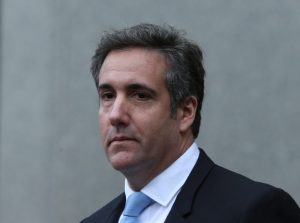 MeidasTouch Network, Political Opinion: Constitution Meets Kevlar — What Could Go Wrong? Michael Cohen, right, June 8, 2025. ICE raids spark protests in Los Angeles, across the countryTrump just deployed 2,000 National Guard troops to California— not for wildfires or floods,
MeidasTouch Network, Political Opinion: Constitution Meets Kevlar — What Could Go Wrong? Michael Cohen, right, June 8, 2025. ICE raids spark protests in Los Angeles, across the countryTrump just deployed 2,000 National Guard troops to California— not for wildfires or floods,  but to intimidate protesters. The crack of boots comes before the crackdown.
but to intimidate protesters. The crack of boots comes before the crackdown.
Let me tell you something, straight up: When the government sends in the troops not to defend the nation but to silence its own people, we’re not just flirting with fascism. We’re buying it dinner, sending flowers, and inviting it to move in. And that, my Substack community, is exactly where we are right now in Trump’s America 2.0. Yesterday, 2,000 National Guard troops were dispatched to Los Angeles—not to provide disaster relief or support wildfire containment, but to suppress protests. Protests, mind you, against the very agencies ripping families apart and deporting people in the dead of night. Against ICE raids that are snatching people from their homes, from hospitals, from houses of worship, even from school pick-up lines.
This isn’t law and order. This is state-sponsored trauma.Subscribed
I’ve said it before, and I’ll say it again louder for the cult in the back: protest is not only legal in America, it’s sacred. It’s as American as baseball, bad coffee, and political corruption. From the Boston Tea Party to Black Lives Matter, protest has always been the pressure valve of a democracy under strain. But here comes President Trump, stomping through the Constitution in steel-toe boots, declaring protest to be the enemy of the state.
And what set him off this time? Peaceful protesters in Los Angeles and New York City who dared to speak up against the inhumane deportations and raids carried out by ICE. I watched as mothers cried in the streets, students linked arms in front of buses, and clergy begged officers to remember their own humanity. In return? Tear gas, rubber bullets, and arrests. As if shouting “let them stay” is a threat to national security.
But Trump wasn’t satisfied with local cops cracking skulls. No, the moment California’s governor resisted using the National Guard to enforce his immigration crackdowns, Trump pulled a move straight out of the despot’s playbook: he federalized California’s Guard. Just like that. With a stroke of a pen and the smirk of a man who believes democracy is a punchline, he stripped a sovereign state of its control and has called up an army of 2,000 soldiers to “restore order.”
Restore order from what? From people holding signs and chanting slogans?
This isn’t “tough on crime.” This is political theater, starring soldiers in camo and directed by a man who knows deep down that his grasp on power relies on suppressing yours.
Letters from an American, Historical Commentary: June 7 [Perverting History Vs. Presenting History], Heather Cox Richardson, right, June 8, 2025. In April, John Phelan, the  U.S. Secretary of the Navy under President Donald J. Trump, posted that he visited the U.S.S. Arizona Memorial “to pay my respects to the service members and civilians we lost at Pearl Harbor on the fateful day of June 7, 1941.”
U.S. Secretary of the Navy under President Donald J. Trump, posted that he visited the U.S.S. Arizona Memorial “to pay my respects to the service members and civilians we lost at Pearl Harbor on the fateful day of June 7, 1941.”
The Secretary of the Navy is the civilian head of the U.S. Navy, overseeing the readiness and well-being of almost one million Navy personnel. Phelan never served in the military; he was nominated for his post because he was a large donor to Trump’s 2024 presidential campaign. He told the Senate his experience overseeing and running large companies made him an ideal candidate for leading the Navy.
The U.S. naval base at Pearl Harbor, Hawaii, is famous in U.S. history as the site of a surprise attack by 353 Japanese aircraft that destroyed or damaged more than 300 aircraft, three destroyers, and all eight of the U.S. battleships in the harbor. Four of those battleships sank, including the U.S.S. Arizona, which remains at the bottom of the harbor as a memorial to the more than 2,400 people who died in the attack, including the 1,177 who died on the Arizona itself.
The day after the attack on Pearl Harbor, the United States entered World War II.
Pearl Harbor Day is a landmark in U.S. history. It is observed annually and known by the name President Franklin Delano Roosevelt called it: “a date which will live in infamy.”
But that date was not June 7, eighty-four years ago today.
It was December 7, 1941.
The Trump administration claims to be deeply concerned about American history. In March, Trump issued an executive order calling for “restoring truth and sanity to American history.” It complained, as Trump did in his first term, that there has been “a concerted and widespread effort to rewrite our Nation’s history, replacing objective facts with a distorted narrative driven by ideology rather than truth. This revisionist movement seeks to undermine the remarkable achievements of the United States by casting its founding principles and historical milestones in a negative light.”
The document ordered the secretary of the interior to reinstate any “monuments, memorials, statues, markers, or similar properties” that had been “removed or changed to perpetuate a false reconstruction of American history, inappropriately minimize the value of certain historical events or figures, or include any other improper partisan ideology.” It spelled out that the administration wanted only “solemn and uplifting public monuments that remind Americans of our extraordinary heritage, consistent progress toward becoming a more perfect Union, and unmatched record of advancing liberty, prosperity, and human flourishing.”
To that end, Trump has called for building 250 statues in a $34 million “National Garden of American Heroes” sculpture garden in order to create an “abiding love of country and lasting patriotism” in time for the nation’s 250th birthday on July 4, 2026.
Trump is using false history to make his followers believe they are fighting a war for the soul of America. “[W]e will never cave to the left wing and the left-wing intolerance,” he told a crowd in 2020. “They hate our history, they hate our values, and they hate everything we prize as Americans,” he said. Like authoritarians before him, Trump promised to return the country to divinely inspired rules that would create disaster if ignored but if followed would “make America great again.”
Trump’s enthusiasm for using history to cement his power has little to do with actual history. History is the study of how and why societies change. To understand that change, historians use evidence—letters, newspapers, photographs, songs, art, objects, records, and so on—to figure out what levers moved society. In that study, accuracy is crucial
Those who cannot remember the past accurately are condemned to repeat its worst moments.
The hard lessons of history seem to be repeating themselves in the U.S. these days, and with the nation’s 250th anniversary approaching, some friends and I got to talking about how we could make our real history more accessible.
After a lot of brainstorming and a lot of help—and an incredibly well timed message from a former student who has become a videographer—we have come up with Journey to American Democracy: a series of short videos about American history that we will release on my YouTube channel, Facebook, and Instagram. They will be either short explainers about something in the news or what we are releasing tonight: a set of videos that can be viewed individually or can be watched together to simulate a survey course about an important event or issue in American history.
Journey to American Democracy explores how democracy has always required blood and sweat and inspiration to overcome the efforts of those who would deny equality to their neighbors. It examines how, for more than two centuries, ordinary people have worked to make the principles the founders articulated in the Declaration of Independence the law of the land.
Those principles establish that we have a right to be treated equally before the law, to have a say in our government, and to have equal access to resources.
The Declaration of Independence is indeed very special to our country. But it is not a declaration of love and unity. It is the radical declaration of Americans that human beings have the right to throw off a king in order to govern themselves.
That story is here, in the first video series of Journey to American Democracy called “Ten Steps to Revolution.”
I hope you enjoy it.
![]() New York Times, With Trump, Bacon Says He Won’t Follow His Party ‘Off the Cliff,’ Annie Karni., June 8, 2025. The Nebraska Republican’s dissent makes him one of a disappearing breed in the G.O.P. — and suggests he may head for the exit.
New York Times, With Trump, Bacon Says He Won’t Follow His Party ‘Off the Cliff,’ Annie Karni., June 8, 2025. The Nebraska Republican’s dissent makes him one of a disappearing breed in the G.O.P. — and suggests he may head for the exit.
to avert a government shutdown.
June 7

![]() New York Times, More Federal Workers Are Flooding the Job Market, With Worsening Prospects, Eileen Sullivan and Lydia DePillis, June 7, 2025 (print ed.). The drastic, sudden pullback in federal dollars is collapsing opportunities for many who’ve spent years in public service.
New York Times, More Federal Workers Are Flooding the Job Market, With Worsening Prospects, Eileen Sullivan and Lydia DePillis, June 7, 2025 (print ed.). The drastic, sudden pullback in federal dollars is collapsing opportunities for many who’ve spent years in public service.
After Matt Minich was fired from his job with the Food and Drug Administration in February, he did what many scientists have done for years after leaving public service. He looked for a position with a university.
Mr. Minich, 38, was one of thousands swept up in the mass layoffs of probationary workers at the beginning of President Trump’s second administration. The shock of those early moves heralded more upheaval to come as the Department of Government Efficiency, led by the tech billionaire Elon Musk, raced through agency after agency, slashing staff, freezing spending and ripping up government contracts.
In March, about 45 minutes after Mr. Minich accepted a job as a scientist in the University of Wisconsin School of Medicine and Public Health, the program lost its federal grant funding. Mr. Minich, who had worked on reducing the negative health impacts of tobacco use, observed that he had the special honor of “being DOGE-ed twice.”
“I’m doubly not needed by the federal government,” he said in an interview.
He is still hunting for work. And like hundreds of thousands of other former civil servants forced into an increasingly crowded job market, he is finding that drastic cuts to grants and contracts in academia, consulting and direct services mean even fewer opportunities are available.
Some states that were hiring, another avenue for former federal government employees, have pulled back. So, too, have the private contractors typically seen as a landing place. The situation is expected to worsen as more layoffs are announced, voluntary departures mount and workers who were placed on administrative leave see the clock run out.
June 5

![]() New York Times, Investigation: The Gutting of America’s Medical Research: Here Is Every Canceled or Delayed N.I.H. Grant, Irena Hwang, Jon Huang, Emily Anthes, Blacki Migliozzi and Benjamin Mueller, June 5, 2025 (print ed.). Some cuts have been starkly visible, but the country’s medical grant-making machinery has also radically transformed outside the public eye.
New York Times, Investigation: The Gutting of America’s Medical Research: Here Is Every Canceled or Delayed N.I.H. Grant, Irena Hwang, Jon Huang, Emily Anthes, Blacki Migliozzi and Benjamin Mueller, June 5, 2025 (print ed.). Some cuts have been starkly visible, but the country’s medical grant-making machinery has also radically transformed outside the public eye.
In his first months in office, President Trump has slashed funding for medical research, threatening a longstanding alliance between the federal government and universities that helped make the United States the world leader in medical science.
Some changes have been starkly visible, but the country’s medical grant-making machinery has also radically transformed outside the public eye, a New York Times analysis found. To understand the cuts, The Times trawled through detailed grant data from the National Institutes of Health, interviewed dozens of affected researchers and spoke to agency insiders who said that their government jobs have become unrecognizable.
In all, the N.I.H., the world’s premier public funder of medical research, has ended 1,389 awards and delayed sending funding to more than 1,000 additional projects, The Times found. From the day Mr. Trump was inaugurated through April, the agency awarded $1.6 billion less compared with the same period last year, a reduction of one-fifth. (N.I.H. records for May are not yet comparable.)
The impacts extend far beyond studies on politically disfavored topics and Ivy League universities like Columbia or Harvard. The disruptions are affecting research on Alzheimer’s, cancer and substance use, to name just a few, and studies at public institutions across the country, including in red states that backed Mr. Trump.

![]() New York Times, Trump Escalates Attack on Columbia by Threatening Its Accreditation, Sharon Otterman, June 5, 2025 (print ed.). The administration notified the university’s accrediting body that federal agencies had found that the school violated Jewish students’ civil rights.
New York Times, Trump Escalates Attack on Columbia by Threatening Its Accreditation, Sharon Otterman, June 5, 2025 (print ed.). The administration notified the university’s accrediting body that federal agencies had found that the school violated Jewish students’ civil rights.
The federal Education Department’s Office for Civil Rights, which two weeks ago found that Columbia violated civil rights laws by “acting with deliberate indifference” toward the harassment of Jewish students, sent a letter on Wednesday to the Middle States Commission on Higher Education, the nongovernmental organization that accredits Columbia.
The letter said that because Columbia was in violation of federal anti-discrimination laws, the Education Department believes it fails to meet the standards for accreditation.
 “University accreditors have an obligation to ensure member institutions abide by their standards,” Linda McMahon, right, the federal education secretary, said in a news release. She said the government looked forward to being “fully informed of actions taken to ensure Columbia’s compliance with accreditation standards, including compliance with federal civil rights laws.”
“University accreditors have an obligation to ensure member institutions abide by their standards,” Linda McMahon, right, the federal education secretary, said in a news release. She said the government looked forward to being “fully informed of actions taken to ensure Columbia’s compliance with accreditation standards, including compliance with federal civil rights laws.”
President Trump has described the accreditation process as his “secret weapon” to force ideological changes at universities.
But the Trump administration does not have direct control over which universities are accredited. Instead, those decisions are made by nongovernmental organizations certified by the government, in a complex process meant to insulate universities from political interference.
Experts on the process said that despite the letter, Columbia faced no immediate threat that its accreditation would be revoked, a process that typically takes years.
“This is another semi-random attack against a celebrity institution,” said Ted Mitchell, the president of the American Council on Education, an association that includes many colleges and universities in its membership. “They are trying once again to skirt due process in order to score political points.”
![]() New York Times, Trump Restricts Harvard’s International Students From Entering U.S., Michael C. Bender, June 5, 2025 (print ed.). President Trump’s administration has sought a workaround to the courts, which have largely blocked his efforts to restrict foreign students.
New York Times, Trump Restricts Harvard’s International Students From Entering U.S., Michael C. Bender, June 5, 2025 (print ed.). President Trump’s administration has sought a workaround to the courts, which have largely blocked his efforts to restrict foreign students.
President Trump said on Wednesday that he  would prevent Harvard University’s international students from entering the country, announcing an aggressive move six days after a federal judge said she would halt the administration’s efforts to disqualify those students from receiving visas.
would prevent Harvard University’s international students from entering the country, announcing an aggressive move six days after a federal judge said she would halt the administration’s efforts to disqualify those students from receiving visas.
Mr. Trump, in the same proclamation, also urged Secretary of State Marco Rubio to consider revoking current visas for Harvard students.
A spokesman for Harvard did not immediately respond to a request for comment.
On Thursday, Judge Allison D. Burroughs of the District of Massachusetts said she would block an effort by the Department of Homeland Security to prevent Harvard from enrolling international students. The administration’s move was part of its attempt to undermine the university’s finances and global influence. About one-fourth of Harvard’s student body comes from other countries.
But Judge Burroughs has not yet issued an injunction, and the administration has continued seeking options for keeping international students out of the country. Mr. Trump has talked about capping the number of student visas for Harvard, and Mr. Rubio has said that his agency would begin revoking visas for some Chinese students.
June 4

The Hartmann Report, Opinion: The Normalization of Evil: We Thought We Were Free, Thom Hartmann, right, June 4, 2025. How ordinary Americans became numb to authoritarianism—step by chilling step.
by chilling step.
It wasn’t all at once (although sometimes the last three months seem that way). Authoritarianism never is. It happens drip by drip, crisis by crisis, until people forget what normal even felt like.
This is how fascism seduces a nation: not by storming the gates, but by wearing down our ability to be outraged. And Donald Trump, more than any political figure in modern American history, has weaponized this steady march into moral and civic numbness.
Ten years ago, if you’d told Americans that a U.S. president would attempt to overturn an election, openly praise dictators, take naked bribes from both foreign potentates and drug dealers, call the press the “enemy of the people,” cage children, pardon traitors and war criminals, and promise to act as a dictator on his first day in office, they’d have laughed. They would’ve told you, “That can’t happen here.”
But it did. And now the real danger is that we’re getting used to it.
Let’s not forget:
— When Trump refused to commit to a peaceful transfer of power in 2020, the political class gasped. Now it’s barely discussed.
— When he orchestrated an attempted coup on January 6th, 2021, it was the top story in the world. Today, most Republicans call it “a protest” or a “tour.”
— Had any previous president invited an immigrant billionaire who promotes fascist memes to rip the guts out of the Social Security Administration and shut down USAID (handing our soft power to the Russians and Chinese) there would have been hell to pay. Now Musk’s extraordinary damage to our government is barely discussed.
— When Trump began calling undocumented immigrants “animals” and labeling judges and prosecutors as “scum,” it horrified the media. Now it’s part of the daily churn.
— When a federal judge’s son was murdered by a Trump campaign volunteer it shocked America; now judges are routinely threatened and Republicans won’t even give the judiciary control over the US Marshall’s Service to protect them.
— When Trump praised Putin and Viktor Orbán and suggested suspending the Constitution, the headlines flared, but then faded fast.
— When he arrested a Tufts University student for having written an op-ed in the student paper critical of Netanyahu and threw her into prison for months, the country was appalled. Now he’s rolling out loyalty tests for civil servants and investigating the social media posts of American citizens returning to the country and nobody’s even discussing it any more.
— When ICE agents showed up in Portland in 2020 in unmarked vans without uniforms and their ID missing, kidnapping people off the streets without warrants, Americans and the media were shocked. Now seeing jackbooted thugs with masks covering their faces and refusing to identify themselves has become “normal.”
This is the playbook. Fascism doesn’t arrive with jackboots; it arrives with media and voter fatigue. As the political theorist Hannah Arendt warned, the very banality and ordinariness of evil is its greatest weapon.
![]() New York Times, Trump Administration Updates: Musk Calls Trump’s Signature Bill an ‘Abomination’ That Will Swell Deficit, June 4, 2025 (print ed.). Elon Musk, the billionaire who led President Trump’s effort to cut government spending, condemned the president’s signature domestic policy bill as a “disgusting abomination” that would swell the “already gigantic budget deficit.”
New York Times, Trump Administration Updates: Musk Calls Trump’s Signature Bill an ‘Abomination’ That Will Swell Deficit, June 4, 2025 (print ed.). Elon Musk, the billionaire who led President Trump’s effort to cut government spending, condemned the president’s signature domestic policy bill as a “disgusting abomination” that would swell the “already gigantic budget deficit.”
Elon Musk lashed out on Tuesday against the far-reaching Republican bill intended to enact President Trump’s domestic policy agenda, posting on X that it was a “disgusting abomination” and telling House members who voted for it: “You know you did wrong.”
The tech billionaire’s criticism of the bill, one of Mr. Trump’s top priorities, was another indication of a widening rift between Mr. Musk and the president. Mr. Musk — who has left his governmental role leading the Department of Government Efficiency — largely presented a united front with the Trump administration until recently.
Last month, Mr. Musk started publicly criticizing Mr. Trump’s bill, saying in an interview with CBS News’s “Sunday Morning” that he was disappointed in the legislation’s size and impact on the deficit.
On Tuesday, Mr. Musk ramped up his criticism, writing on X: “I’m sorry, but I just can’t stand it anymore.” He called the bill “massive, outrageous, pork-filled.” In follow-up posts, he said, “It will massively increase the already gigantic budget deficit,” and “Congress is making America bankrupt.”
“The president already knows where Elon Musk stood on this bill,” said Karoline Leavitt, a White House spokeswoman. “It doesn’t change the president’s opinion. This is one big, beautiful bill, and he’s sticking to it.”
Mr. Trump has urged swift passage of the legislation — officially called the One Big, Beautiful Bill Act — which would slash taxes, providing the biggest savings to the wealthy, and steer more money to the military and immigration enforcement. As written, the legislation would cut health, nutrition, education and clean energy programs to cover part of the cost.
Mr. Musk’s criticism comes at a critical moment for the bill, which passed the House in the face of a strong pressure campaign by Mr. Trump. As Speaker Mike Johnson corralled several competing Republican factions, the president summoned recalcitrant holdouts to the White House, and his staff likened Republican opposition the bill to “the ultimate betrayal.”
But Republican senators have already made clear that they planned to make changes to the bill, which outlines spending and tax cuts. Fiscal conservatives, alarmed at estimates that the bill would add trillions to the national debt, have demanded further changes and cuts to Medicaid and other programs that could help rein in deficits.
![]() New York Times, After Muscling Their Bill Through the House, Some Republicans Have Regrets, Michael Gold, June 4, 2025 (print ed.). The sprawling legislation carrying President Trump’s domestic agenda squeaked through the House with one vote to spare, but some Republicans now say they didn’t realize what they voted for.
New York Times, After Muscling Their Bill Through the House, Some Republicans Have Regrets, Michael Gold, June 4, 2025 (print ed.). The sprawling legislation carrying President Trump’s domestic agenda squeaked through the House with one vote to spare, but some Republicans now say they didn’t realize what they voted for.
![]() New York Times, Smithsonian’s Reaction to Trump’s Firing of Its Museum Director: Silence, Robin Pogrebin, Graham Bowley and Zachary Small, June 4, 2025 (print ed.). Since President Trump announced he was dismissing the head of the National Portrait Gallery on Friday, the Smithsonian has weighed whether to challenge Mr. Trump on his legal authority to fire a museum director employed by the institution.
New York Times, Smithsonian’s Reaction to Trump’s Firing of Its Museum Director: Silence, Robin Pogrebin, Graham Bowley and Zachary Small, June 4, 2025 (print ed.). Since President Trump announced he was dismissing the head of the National Portrait Gallery on Friday, the Smithsonian has weighed whether to challenge Mr. Trump on his legal authority to fire a museum director employed by the institution.
At an emergency meeting on Monday, the Smithsonian’s board and Secretary Lonnie G. Bunch III discussed how to respond to the president’s announcement that he had fired Kim Sajet, the longtime director of the National Portrait Gallery, which is part of the Smithsonian Institution in Washington.
But so far, the Smithsonian, which is not an executive branch agency, has been silent on whether it will dispute a presidential announcement that is distinctly at odds with how the institution has long regarded its independence in hiring and firing.
The Smithsonian has declined to comment.
When Mr. Trump announced the firing on social media, he called Ms. Sajet “a highly partisan person, and a strong supporter of DEI, which is totally inappropriate for her position.” And the White House has compiled a list of grievances that it says led to the president’s action, outlining what it described as acts of partisanship and support of diversity, equity and inclusion efforts, including public comments about racial and gender inequality in America.
The list, which was provided to The New York Times, includes Ms. Sajet being one of four authors of a book called “The Obama Portraits” and her social media posts with prominent Democrats such as Hillary Clinton and Barack and Michelle Obama; one post shows Ms. Sajet attending a reception at Kamala Harris’s home when Ms. Harris was vice president. Some of those activities were part of Ms. Sajet’s official duties, but the White House also referred to her political campaign contributions of $3,982.40 to Democrats, including Mrs. Clinton and Joseph R. Biden Jr.
The Smithsonian’s leadership is being forced to review, not so much the president’s rationale, but his authority to make such a high-level personnel change. If the president has the power to replace Ms. Sajet, he would seem to have similar sway over the executives who operate the institution’s 20 other museums, plus libraries, research centers and the National Zoo.
Two leading House Democrats have disputed Mr. Trump’s power to fire employees of the Smithsonian, calling any such effort “illegal.”
![]() New York Times, U.S. May Strip Harvey Milk’s Name From Navy Vessel, Karoun Demirjian and John Ismay, June 4, 2025 (print ed.). Defense Secretary Pete Hegseth ordered a review of ship names honoring Mr. Milk, a gay rights pioneer, and other leaders. In Mr. Milk’s case, the move is intended as a rebuke of Pride Month.
New York Times, U.S. May Strip Harvey Milk’s Name From Navy Vessel, Karoun Demirjian and John Ismay, June 4, 2025 (print ed.). Defense Secretary Pete Hegseth ordered a review of ship names honoring Mr. Milk, a gay rights pioneer, and other leaders. In Mr. Milk’s case, the move is intended as a rebuke of Pride Month.
Defense Secretary Pete Hegseth has ordered the Navy to review the names of vessels honoring prominent civil rights leaders, including Harvey Milk, who was one of the country’s first openly gay elected officials and a Navy veteran.
According to a senior official familiar with a memo from John Phelan, the secretary of the Navy, they include Thurgood Marshall, the first Black Supreme Court justice; Ruth Bader Ginsburg, another Supreme Court justice, who became a feminist icon; Harriet Tubman, who, after being born into slavery, became an abolitionist instrumental in the Underground Railroad; Lucy Stone, a prominent abolitionist and suffragist; Medgar Evers, a civil-rights leader who was assassinated by a member of the Ku Klux Klan; Cesar Chavez, a labor leader; and Dolores Huerta, another labor leader.
Representative Nancy Pelosi, the former speaker of the House, condemned the move.
“Our military is the most powerful in the world — but this spiteful move does not strengthen our national security or the ‘warrior’ ethos,” Ms. Pelosi, a California Democrat, wrote on social media. “It is a shameful, vindictive erasure of those who fought to break down barriers for all to chase the American Dream.”
June 3
Phi Beta Kappa Lecture, Universities Under Siege, Daniel R. 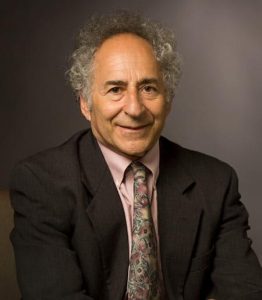 Schwarz, right, Cornell professor since 1968, and Faculty President of Cornell Phi Beat Kappa, in address to more than 250 Phil Beta Kappa students and family members, who responded with a standing ovation, Cornell University, May 23, 2025, excerpted here on June 2-3.
Schwarz, right, Cornell professor since 1968, and Faculty President of Cornell Phi Beat Kappa, in address to more than 250 Phil Beta Kappa students and family members, who responded with a standing ovation, Cornell University, May 23, 2025, excerpted here on June 2-3.
Our Phi Beta Kappa Graduation Ceremony reminds us that the mission of a research university is to discover knowledge and impart knowledge to our students. As teachers we work in partnership with our students to build a culture of excellence. Our job as professors is to transform possibility and opportunity into reality in terms of creating knowledge and giving our students the tools and confidence to take our insights further.
Our students not only explore the world but also imagine the world as it might be. They see the world with fresh vision, and they think about how they can broaden our understanding of our diverse world.
University leadership must defend what universities do in terms of encouraging possibility and opportunity for all students and of fostering objective research. At the same time, universities need to seek public support by communicating better what we do and why in our research and teaching missions.
Whether it be about possible links between childhood inoculation and autism or supposed election fraud or rewriting the history of the Jan. 6, 2020, insurrection and claiming those convicted were “political prisoners,” both University research as well as intellectual and political discussions must be based on factual evidence rather than unproven hypothesis or worse yet, outright falsehoods.
Already a target for the cancellation of research funds, Cornell has no assurance that we will not be next for even more Draconian measures. I am proud of Cornell’s trustees and senior leadership for standing firm in the face aggressive actions to undermine the independence of universities and monitor what we do.
As someone who has written about past anti-Semitism on Ivy campuses, I have no problem with this administration monitoring how Jews or any minority are treated on campuses. But that is vastly different from using the claim of rampant campus anti-Semitism to threaten withholding research funds as a way of dictating curriculum and admission policies or stipulating what books should be in the library of the Naval Academy.
As a teacher-scholar one of whose fields is narrative, I am concerned with the increasing acceptance of false narratives without a scintilla of evidence to support them. We need to learn why so many people believe such falsehoods about our universities, including the pernicious lie that our focus is on indoctrinating students.
Daniel R. Schwarz, below, is Frederic J. Whiton Professor  of English Literature and Stephen H. Weiss Presidential Fellow at Cornell University, where he has taught since 1968. He is recognized as a master teacher, an influential literary critic, and an important public intellectual. He has written 16 books covering a wide variety of subjects from renowned studies of Joseph Conrad, James Joyce, and Wallace Stevens
of English Literature and Stephen H. Weiss Presidential Fellow at Cornell University, where he has taught since 1968. He is recognized as a master teacher, an influential literary critic, and an important public intellectual. He has written 16 books covering a wide variety of subjects from renowned studies of Joseph Conrad, James Joyce, and Wallace Stevens  to examinations of critical theory, the Holocaust (above right), and New York city culture. His recent books include “Reading the European Novel to 1900” (Wiley Blackwell, 2014), “Crises and Turmoil at the New York Times, 1999-2009” (2012, left
to examinations of critical theory, the Holocaust (above right), and New York city culture. His recent books include “Reading the European Novel to 1900” (Wiley Blackwell, 2014), “Crises and Turmoil at the New York Times, 1999-2009” (2012, left ), and “In Defense of Reading: Teaching Literature in the Twenty-First Century” (Wiley Blackwell, 2008). He blogs regularly on the media and higher education for the Huffington Post and has lectured all over the world. His webpage is here.
), and “In Defense of Reading: Teaching Literature in the Twenty-First Century” (Wiley Blackwell, 2008). He blogs regularly on the media and higher education for the Huffington Post and has lectured all over the world. His webpage is here.
New York Times, U.S. Lit a Beacon for Science. Under ![]() Trump, Scientists Fear It’s Dimming, Kate Zernike, June 3, 2025. As America cuts budgets and restricts immigration under President Trump, China and Europe are offering researchers money and stability.
Trump, Scientists Fear It’s Dimming, Kate Zernike, June 3, 2025. As America cuts budgets and restricts immigration under President Trump, China and Europe are offering researchers money and stability.
Many scientists just setting out on their careers, however, fear there is no other option but to leave.
Scientific leaders say that’s risking the way American science has been done for years, and the pre-eminence of the United States in their fields.
China and Europe are on hiring sprees. An analysis by the journal Nature captured the reversal: Applications from China and Europe for graduate student or postdoctoral positions in the United States have dropped sharply or dried up entirely since President Trump took office. The number of postdocs and graduate students in the United States applying for jobs abroad has spiked.
A university in France that created new positions for scientists with canceled federal grants capped applications after overwhelming interest. A scientific institute in Portugal said job inquiries from junior faculty members in the United States are up tenfold over the last two months.
“We are embarking on a major experiment in restructuring the innovative engine in America, and China is the control,” said Marcia McNutt, a geophysicist and the president of the National Academy of Sciences, which was established by President Abraham Lincoln to advise the government on science policy. “China is not going to cut its research budget in half.”
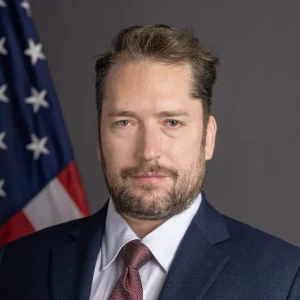
The Daily Telegraph (UK), Investigation: Trump official who shut down counter-Russia agency has links to Kremlin, Benedict Smith, June 3, 2025. Darren Beattie, shown above, was appointed acting under-secretary for public diplomacy and public affairs in February at the U.S. Department of State.
Darren Beattie, who alarmed the State Department with his pro-Moscow views, is married to a woman whose uncle has ties to Vladimir Putin.
Darren Beattie has provoked alarm within the State Department since being appointed in February for his ardent pro-Russian views.
 He has been noted for his focus on destroying the agency tasked with tackling Kremlin propaganda.
He has been noted for his focus on destroying the agency tasked with tackling Kremlin propaganda.
Mr Beattie, the acting under-secretary for public diplomacy and public affairs, is married to a woman whose uncle has taken several roles in Russian politics and once received a personal “thank you” message from Vladimir Putin.
In the years before joining the government, Mr Beattie wrote social media posts suggesting Western institutions should be “infiltrated” by Putin, while he also attacked what he described as the “globalist American empire.”
Donald Trump is under pressure from many in his party, particularly senators, to take a tougher stance on the Russian leader while he continues to refuse to sign a ceasefire deal as the war in Ukraine drags on.
Many of Mr Beattie’s social media posts also concern China, repeatedly calling on the US to  surrender Taiwan to Beijing, and labelling Britain a “poor and pathetic kingdom” that would be “far better off under Chinese dominion.”
surrender Taiwan to Beijing, and labelling Britain a “poor and pathetic kingdom” that would be “far better off under Chinese dominion.”
State Department sources expressed scepticism over whether he had undergone security vetting, a process which has been relaxed under Mr Trump.
Mr Beattie was a member of the first Trump administration, but after being sacked in 2018 for allegedly attending a white nationalist conference, he reinvented himself as an “alt-Right” media figure.
 In May 2021, public records show, he married a Russian woman called Yulia Kirillova, right, in a ceremony in Broward County, Florida.
In May 2021, public records show, he married a Russian woman called Yulia Kirillova, right, in a ceremony in Broward County, Florida.
Ms Kirillova, who according to her Facebook page was educated in Moscow before studying abroad in Canada and Washington, DC, is the niece of Sergei Chernikov, a Russian drinks magnate who part-owns a flat with her mother, Natalia.
Mr. Chernikov, whose net worth was estimated to  be $150 million in 2005, reportedly received a letter of thanks from Putin for his help in the election campaign which first brought the Russian leader to power.
be $150 million in 2005, reportedly received a letter of thanks from Putin for his help in the election campaign which first brought the Russian leader to power.
Both before and after his marriage to Mr Chernikov’s niece, Mr Beattie has repeatedly attacked what he called the “globalist American empire” while praising both Russia and China as counterweights to its “woke” ideology.
Mr Beattie, and Revolver, the news outlet he founded after leaving the first Trump administration, argues that the US has sought to engineer “colour revolutions” around the world – a common trope in Russia and China to dismiss pro-democracy movements as Western-backed coup attempts.
Two months before Russia’s full-scale invasion of Ukraine, he said: “Imagine the whining from the Globalist American Empire if Putin ‘invades’ Ukraine… I love it when our national security bureaucrats fail!”
He has also praised Putin as “brave and strong”, and claimed the Russian leader had “done more to advance conservative positions in the US than any Republican.” He also declared: “Nato is a much greater threat to American liberty than Putin ever was.”
All of these social media posts were still online at 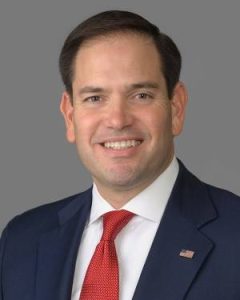 the time of writing, although Mr Beattie has deleted disparaging tweets about Marco Rubio, right, the US secretary of state, having previously claimed his now-boss attended “gay foam parties.”
the time of writing, although Mr Beattie has deleted disparaging tweets about Marco Rubio, right, the US secretary of state, having previously claimed his now-boss attended “gay foam parties.”
According to Ms Kirillova’s Facebook page, she moved to Washington on Jan 28, roughly a week before her husband began his role at the State Department.
Despite his wide-ranging brief at the heart of the US government, Mr Beattie is said to have focused a disproportionate amount of time on seeking to dismantle the Counter Foreign Information Manipulation and Interference hub, known as R/Fimi, while building cultural ties with Russia.‘’
R/Fimi, which tracked and countered propaganda from sources including Russia, China and Iran, was a relatively small agency with a budget of just over $50 million at the time it was shut down.
The US’s adversaries are estimated to spend tens of billions of dollars a year on foreign disinformation.
Sources said Mr Beattie had doggedly pursued the agency after being appointed, taking it apart piece by piece.
Contractors were sacked and officials were ordered to stop communicating with others in the State Department or external partners without explicit permission.
Even before it was disbanded in mid-April, when Mr Beattie told staff in a brief speech that it was “severely misaligned” with the administration’s priorities, its work had essentially wrapped up.
At the same time as Mr Beattie was working on dismantling the agency, he is said to have pushed to rebuild relations with Russia, insisting on instituting cultural exchange programmes in fields such as ballet and hockey.
He is also said to have taken a significant interest in classified material related to Russia, prompting widespread concern about turning over sensitive information to him.
Sources were highly sceptical if it had undergone a security vetting process, which the State Department’s website notes can take anywhere from a couple of months to over a year to complete.
On his first day in office, Mr Trump unilaterally granted top-secret security clearances to personnel in the Executive Office of the President citing a backlog in processing.
MIT Technology Review reported this month that Mr Beattie had launched a sweeping effort to obtain records from R/Fimi staff shortly before it closed, apparently with the intention of characterising it as an organisation dedicated to smearing conservatives.
He asked for communications with or about reporters who write about foreign disinformation, along with references to Mr Trump and his allies. One official said the move amounted to a “witch hunt.”
Mr Beattie would need confirmation by the Senate to take on the under-secretary role full-time: as an acting official, he is limited to 210 days.
 A senior State Department official said: “No one in America cares about a British gossip column. This is all fake news and low even for tabloid standards. Darren is a tremendous colleague who is committed to advancing President Trump’s America First agenda.”
A senior State Department official said: “No one in America cares about a British gossip column. This is all fake news and low even for tabloid standards. Darren is a tremendous colleague who is committed to advancing President Trump’s America First agenda.”
Mr Chernikov and Ms Kirillova have been approached for comment.
Mr Beattie described the allegations as “malicious defamatory trash that is beneath the standards of even the British tabloid press.”
![]() New York Times, After Several Attacks, Heightened Anxiety Among American Jews, Ruth Graham, June 3, 2025 (print ed.). The attack in Colorado on a march in support of hostages held in Gaza contributed to a sense that simply existing in public as a Jewish person is increasingly dangerous.
New York Times, After Several Attacks, Heightened Anxiety Among American Jews, Ruth Graham, June 3, 2025 (print ed.). The attack in Colorado on a march in support of hostages held in Gaza contributed to a sense that simply existing in public as a Jewish person is increasingly dangerous.
The attack on demonstrators in Boulder, Colo., marching in support of hostages being held in Gaza would have been disturbing to Jewish people across the country even if it were the only recent event of its kind.
The suspect told investigators after his arrest that he had been planning the attack for a year, according to court documents. Eight people were hospitalized.
For many, the connections to other recent outbursts of violence were impossible to miss.
The attack in Boulder came less than two weeks after two Israeli Embassy employees were shot and killed as they left a reception at a Jewish museum in Washington. A month earlier, an arsonist set fire to the Pennsylvania governor’s mansion on the first night of Passover while Gov. Josh Shapiro, who is Jewish, slept upstairs with his family.
“What we’ve seen these last few months is a shocking pattern of anti-Israel sentiment manifesting itself in antisemitic violence,” said Halie Soifer, chief executive of the Jewish Democratic Council of America. “With each incident, there’s a further shattering of our sense of security.”
In Colorado and Washington, authorities said, the ![]() suspects shouted “Free Palestine” on the scene. In Pennsylvania, the arsonist later said he had set the fire as a response to Israeli attacks on Palestinians.
suspects shouted “Free Palestine” on the scene. In Pennsylvania, the arsonist later said he had set the fire as a response to Israeli attacks on Palestinians.
![]() New York Times, Judges in Deportation Cases Face Evasion and Delay From Trump A
New York Times, Judges in Deportation Cases Face Evasion and Delay From Trump A![]() dministration, Alan Feuer and Glenn Thrush, June 3, 2025. Administration officials have either violated orders or used obfuscations and delays to prevent federal judges from deciding whether violations took place.
dministration, Alan Feuer and Glenn Thrush, June 3, 2025. Administration officials have either violated orders or used obfuscations and delays to prevent federal judges from deciding whether violations took place.
![]() New York Times, Analysis: As Trump Says He’s Stamping Out Antisemitism, He Advances Similar Tropes, Peter Baker, June 3, 2025. President Trump’s effort to punish Harvard over antisemitism is complicated by his own history of amplifying white supremacist figures and symbols.
New York Times, Analysis: As Trump Says He’s Stamping Out Antisemitism, He Advances Similar Tropes, Peter Baker, June 3, 2025. President Trump’s effort to punish Harvard over antisemitism is complicated by his own history of amplifying white supremacist figures and symbols.
In the Oval Office one day last week, President Trump renewed his no-holds-barred attack on the nation’s oldest university. “They’re totally antisemitic at Harvard,” he declared.
Just 10 hours later, he posted an image of himself striding down a street with the caption, “He’s on a mission from God and nothing can stop what is coming.” Shown in the shadows, watching with approval, was a cartoon figure commonly seen as an antisemitic symbol.
The appearance of the figure, the alt-right mascot Pepe the Frog, was the latest example of Mr. Trump’s extensive history of amplifying white supremacist figures and symbols, even as he now presents himself as a champion for Jewish students oppressed by what he says is a wave of hatred on American college campuses.
As a younger man, Mr. Trump kept a book of Adolf Hitler’s speeches in a cabinet by his bed, according to his first wife. During his first term as president, he expressed admiration for some aspects of the Nazi Führer’s leadership, according to his chief White House aide at the time. In the past few years, he has dined at his Florida estate with a Holocaust denier while his New Jersey golf club has hosted events at which a Nazi sympathizer spoke.
Since reclaiming the White House, Mr. Trump has brought into his orbit and his administration people with records of advancing antisemitic tropes, including a spokeswoman at the Pentagon. His vice president, secretary of state and top financial backer have offered support to a far-right German political party that has played down atrocities committed by the Nazis. And just last week, Mr. Trump picked a former right-wing podcaster who has defended a prominent white supremacist to head the Office of Special Counsel.
Even some prominent critics of Harvard’s handling of antisemitism on its campus find Mr. Trump to be an unpalatable and unconvincing ally. In their view, his real motivations in using the power of the federal government to crush Harvard, seen by the political right as a bastion of America’s liberal, multicultural order, have little to do with concern about a hostile environment for Jewish students.
![]() New York Times, Dutch Government Collapses Over Migration Dispute, Claire Moses, June 3, 2025. The governing coalition in the Netherlands collapsed on Tuesday after the populist leader Geert Wilders withdrew his party over a dispute about migration policy, ending a rocky 11-month rule by the country’s first far-right government and triggering early elections.
New York Times, Dutch Government Collapses Over Migration Dispute, Claire Moses, June 3, 2025. The governing coalition in the Netherlands collapsed on Tuesday after the populist leader Geert Wilders withdrew his party over a dispute about migration policy, ending a rocky 11-month rule by the country’s first far-right government and triggering early elections.
Paul Krugman via Substack, We Are No Longer a Serious Country, Paul Krugman, right, June 3, 2025. “If you’re  explaining, you’re losing.” This line is usually attributed to Ronald Reagan.
explaining, you’re losing.” This line is usually attributed to Ronald Reagan.
Whoever said it definitely had a point, and not just about politics. If you’re trying to explain to people, be they voters or bond investors, that you aren’t really as bad or untrustworthy as you seem, you’re already in deep trouble.
So when I saw Scott Bessent, left, the treasury secretary, declaring Sunday that “The United  States of America is never going to default, that is never going to happen,” my reaction was, “Uh-oh.”
States of America is never going to default, that is never going to happen,” my reaction was, “Uh-oh.”
And it’s not just me. For generations investors have treated U.S. government debt as the ultimate safe asset. Whenever disaster strikes — even if it’s disaster largely made in America, like the 2008 subprime crisis — bond buyers pile into U.S. Treasuries, because America is a serious country, and the idea that we would fail to honor our debts was unthinkable.
But are we still that country? Markets seem to have doubts.
Yesterday the Financial Times had a neat chart showing that there used to be a clear relationship between U.S. interest rates and the international value of the dollar. But since Donald Trump returned to power, that relationship has broken down. Instead, we’ve seen a combination of rising interest rates and a falling dollar:
As many have noted, what we’ve been seeing in recent months, with interest rates and the dollar moving in opposite directions, doesn’t look like what we normally see in the United States, or for that matter advanced nations in general.
Why are markets beginning to treat America as unreliable? It’s not just the debt numbers. Yes, we have large debts, but we’re an immensely wealthy country that, among other things, has lower average taxes than most of our peers. So we certainly have the resources to honor our debts.
But do we have the political will? Maybe even more important, do we have the political seriousness?
Like many economists, I’ve spent a lot of time analyzing the substance of Trump’s tariffs — how much they are likely to raise prices and reduce trade volumes. I’ve also written about the impacts of policy uncertainty, about how hard it is for businesses to make plans when they have little idea what tariff rates will be even a few months from now, let alone over the next few years.
But I wonder whether we’ve spent enough time looking at the policy process — how decisions get made in Trump’s America.
Why, next thing you’ll be telling me that key policy decisions, leading to layoffs of hundreds of thousands of federal workers and many deaths  around the world, have been made by a presidential crony whose erratic behavior may have reflected massive consumption of ketamine, Ecstasy and psychedelic mushrooms.
around the world, have been made by a presidential crony whose erratic behavior may have reflected massive consumption of ketamine, Ecstasy and psychedelic mushrooms.
Oh, wait.

Trump appointee Elon Musk, above left, whose companies receive billions of dollars in U.S. government contracts, prances with a chainshow at a CPAC convention in February to demonstrate his eagerness to slash other federal government spending as Argentina’s right-wing president Javier Milei cheers him on during a spectacle in which Musk repeatedly gave the audience what appeared to be a Nazi salute.

![]() New York Times, A Stephen Miller Staffer and Tough Talk: Inside Trump’s Latest Attack on Harvard, Michael S. Schmidt and Michael C. Bender, June 3, 2025 (print ed.). The Justice Department opened an investigation into the student-run Harvard Law Review. The startling accusations show how the Trump administration is wielding power in pursuit of its political agenda.
New York Times, A Stephen Miller Staffer and Tough Talk: Inside Trump’s Latest Attack on Harvard, Michael S. Schmidt and Michael C. Bender, June 3, 2025 (print ed.). The Justice Department opened an investigation into the student-run Harvard Law Review. The startling accusations show how the Trump administration is wielding power in pursuit of its political agenda.
The Justice Department quietly approached  Harvard University last month with startling claims, even by the extraordinary standards of the Trump administration’s months-long assault on the elite college.
Harvard University last month with startling claims, even by the extraordinary standards of the Trump administration’s months-long assault on the elite college.
The department signaled that it was reviewing claims of discrimination against white men at The Harvard Law Review, and accused the renowned publication of destroying evidence in an open  investigation. The administration demanded that Harvard “cease and desist” from interfering.
investigation. The administration demanded that Harvard “cease and desist” from interfering.
In a series of letters that have not been previously reported, the government also disclosed that it had a “cooperating witness” inside the student-run journal. That witness now  works in the White House under Stephen Miller, right, the architect of the administration’s domestic policy agenda, Trump officials confirmed.
works in the White House under Stephen Miller, right, the architect of the administration’s domestic policy agenda, Trump officials confirmed.
The Law Review is independent of Harvard University. The allegations nonetheless deepened fears among Harvard officials that the administration appeared eager to escalate one of its civil investigations into a criminal inquiry, underscoring how the university’s problems with President Trump extend far beyond the loss of billions in federal funding.
But the aggressive language in the letters from the Justice Department’s two top civil rights lawyers appeared to have overstated the allegations in pursuit of an additional way to punish Harvard. In that way, the episode fits a broader trend in how the administration is wielding federal investigatory powers to impose its political agenda.
![]() New York Times, Smithsonian’s Reaction to Trump’s Firing of Its Museum Director: Silence, Robin Pogrebin, Graham Bowley and Zachary Small, June 3, 2025. Since President Trump announced he was dismissing the head of the National Portrait Gallery on Friday, the Smithsonian has weighed whether to challenge Mr. Trump on his legal authority to fire a museum director employed by the institution.
New York Times, Smithsonian’s Reaction to Trump’s Firing of Its Museum Director: Silence, Robin Pogrebin, Graham Bowley and Zachary Small, June 3, 2025. Since President Trump announced he was dismissing the head of the National Portrait Gallery on Friday, the Smithsonian has weighed whether to challenge Mr. Trump on his legal authority to fire a museum director employed by the institution.
At an emergency meeting on Monday, the Smithsonian’s board and Secretary Lonnie G. Bunch III discussed how to respond to the president’s announcement that he had fired Kim Sajet, the longtime director of the National Portrait Gallery, which is part of the Smithsonian Institution in Washington.
But so far, the Smithsonian, which is not an executive branch agency, has been silent on whether it will dispute a presidential announcement that is distinctly at odds with how the institution has long regarded its independence in hiring and firing.
The Smithsonian has declined to comment.
 When Mr. Trump announced the firing on social media, he called Ms. Sajet “a highly partisan person, and a strong supporter of DEI, which is totally inappropriate for her position.” And the White House has compiled a list of grievances that it says led to the president’s action, outlining what it described as acts of partisanship and support of diversity, equity and inclusion efforts, including public comments about racial and gender inequality in America.
When Mr. Trump announced the firing on social media, he called Ms. Sajet “a highly partisan person, and a strong supporter of DEI, which is totally inappropriate for her position.” And the White House has compiled a list of grievances that it says led to the president’s action, outlining what it described as acts of partisanship and support of diversity, equity and inclusion efforts, including public comments about racial and gender inequality in America.
The list, which was provided to The New York Times, includes Ms. Sajet being one of four authors of a book called “The Obama Portraits” and her social media posts with prominent Democrats such as Hillary Clinton and Barack and Michelle Obama; one post shows Ms. Sajet attending a reception at Kamala Harris’s home when Ms. Harris was vice president. Some of those activities were part of Ms. Sajet’s official duties, but the White House also referred to her political campaign contributions of $3,982.40 to Democrats, including Mrs. Clinton and Joseph R. Biden Jr.
The Smithsonian’s leadership is being forced to review, not so much the president’s rationale, but his authority to make such a high-level personnel change. If the president has the power to replace Ms. Sajet, he would seem to have similar sway over the executives who operate the institution’s 20 other museums, plus libraries, research centers and the National Zoo.
Two leading House Democrats have disputed Mr. Trump’s power to fire employees of the Smithsonian, calling any such effort “illegal.”

New York Times, Judges in Deportation Cases Face ![]() Evasion and Delay From Trump Administration, Alan Feuer and Glenn Thrush, June 3, 2025. Administration officials have either violated orders or used obfuscations and delays to prevent federal judges from deciding whether violations took place.
Evasion and Delay From Trump Administration, Alan Feuer and Glenn Thrush, June 3, 2025. Administration officials have either violated orders or used obfuscations and delays to prevent federal judges from deciding whether violations took place.
![]() New York Times, Dutch Government Collapses Over Migration Dispute, Claire Moses, June 3, 2025. The governing coalition in the Netherlands collapsed on Tuesday after the populist leader Geert Wilders withdrew his party over a dispute about migration policy, ending a rocky 11-month rule by the country’s first far-right government and triggering early elections.
New York Times, Dutch Government Collapses Over Migration Dispute, Claire Moses, June 3, 2025. The governing coalition in the Netherlands collapsed on Tuesday after the populist leader Geert Wilders withdrew his party over a dispute about migration policy, ending a rocky 11-month rule by the country’s first far-right government and triggering early elections.
The move by Mr. Wilders shows how the debate over unauthorized migration continues to roil European politics, a decade after a large-scale influx of people fleeing wars or seeking better economic opportunities unsettled the region.
The coalition’s collapse was confirmed by Prime Minister Dick Schoof, who said he would present his resignation to King Willem-Alexander. He said he would stay on as the leader of a caretaker administration, without Mr. Wilders’s party, until elections and the formation of a new government.
“I think it’s unnecessary and irresponsible,” Mr. Schoof said of Mr. Wilders’s decision.
It was not immediately clear when new elections would take place, but they appeared unlikely to happen before October, plunging the country into political uncertainty for at least the rest of the year. Mr. Wilders’s party has been dropping in Dutch polls lately.
The political crisis comes as the Netherlands prepares to host a NATO summit on June 24 and 25.

Letters from an American, Historical Commentary: June 2 [GOP Reconciliation Bill], Heather Cox Richardson, right,  June 3, 2025. The Republicans’ giant budget reconciliation bill has focused attention on the drastic cuts the Trump administration is making to the American government.
June 3, 2025. The Republicans’ giant budget reconciliation bill has focused attention on the drastic cuts the Trump administration is making to the American government.
On Friday, when a constituent at a town hall shouted that the Republicans’ proposed cuts to Medicaid, the federal healthcare program for low-income Americans, meant that “people will die,” Senator Joni Ernst (R-IA) replied, “Well, we are all going to die.”
The next day, Ernst, right, released a video purporting to be an apology. It made things worse. “I made  an incorrect assumption that everyone in the auditorium understood that, yes, we are all going to perish from this Earth. So, I apologize. And I’m really, really glad that I did not have to bring up the subject of the tooth fairy as well. But for those that would like to see eternal and everlasting life, I encourage you to embrace my lord and savior, Jesus Christ,” she said.
an incorrect assumption that everyone in the auditorium understood that, yes, we are all going to perish from this Earth. So, I apologize. And I’m really, really glad that I did not have to bring up the subject of the tooth fairy as well. But for those that would like to see eternal and everlasting life, I encourage you to embrace my lord and savior, Jesus Christ,” she said.
Ernst blamed the “hysteria that’s out there coming from the left” for the outcry over her comments. Like other Republicans, she claims that the proposed cuts of more than $700 billion in Medicaid funding over the next ten years is designed only to get rid of the waste and fraud in the program. Thus, they say, they are actually strengthening Medicaid for those who need it.
But, as Linda Qiu noted in the New York Times today, most of the bill’s provisions have little to do with the “waste, fraud, and abuse” Republicans talk about. They target Medicaid expansion, cut the ability of states to finance Medicaid, force states to drop coverage, and limit access to care.
And the nonpartisan Congressional Budget Office (CBO) says the cuts mean more than 10.3 million Americans will lose health care coverage.
Welcome to Popular Information, 19 companies pulling back their support for Pride, Judd Legum, Rebecca Crosby, and Noel Sims, June 3, 2025. For years, major corporations publicly celebrated the LGBTQ community.
Corporations regularly highlighted the contributions of LGBTQ employees, facilitated LGBTQ resource groups, donated to pro-LGBTQ charities, and sponsored Pride Month parades each June. This was supposedly part of a principled commitment to inclusion, including the full spectrum of sexual orientations and gender identities.
But, in recent years, many Republicans, including President Trump, have decided that valuing diversity, including the LGBTQ community, constitutes discrimination against straight white men. Pride parades, fun events about accepting people for who they are, were rebranded by these Republicans as part of a nefarious scheme to indoctrinate children. Trump has issued several executive orders targeting the LGBTQ community and pressured corporations to end diversity, equality, and inclusion (DEI) activities.
The pressure campaign appears to be working. Numerous corporations that have previously presented themselves as champions of the LGBTQ community have pulled their support for Pride parades this month, a Popular Information investigation reveals.
In prior years, for example, Lowe’s said it was “proud to celebrate LGBTQA+ Pride month” and posted pictures of its staff wearing rainbow-themed Lowe’s sweatshirts.
Lincoln Square Media, What DOGE Gets Wrong about Tech and Government, Don Moynihan, June 3,  2025. Members of the DOGE network rarely offer thoughtful accounts that depart from the Musk narrative (government is broken, full of talentless hacks, DOGE is fixing things).
2025. Members of the DOGE network rarely offer thoughtful accounts that depart from the Musk narrative (government is broken, full of talentless hacks, DOGE is fixing things).
So I was interested to see a DOGEr express genuine circumspection. This came from Sahil Lavingia, a startup founder, who was interviewed by Ernie Smith about his experience with DOGE.
Lavignia left his start-up, Gumroad, to join Veteran’s Affairs. Here is the key passage:
Now that he’s there, he says he finds himself surrounded by people who “love their jobs,” who came to the government with a sense of mission driving their work. “In a sense, that makes the DOGE agenda a little bit more complicated, because if half the government took [a buyout offer], then we wouldn’t have to do much more,” he says, implying software can replace departing employees. “We’d just basically use software to plug holes. But that’s not what’s happening.”…when it comes down to it, what he’s found is a machine that largely functions, though it doesn’t make decisions as fast as a startup might.
For anyone with a modicum of experience studying or working in government, nothing Lavignia discovered is novel. Public servants care about public service! There is not really that much waste in government! There are too many meetings and decisionmaking is too slow! Indeed, sir! All true!
For his troubles, Lavingia was fired from DOGE shortly after his interview was published. DOGE employees can have massive conflicts interest, traffic in false conspiracy theories, post racist vitriol online or threaten public employees and be fine.
The one thing they cannot do? Admit that government is working better than they expected.
June 2
The Bulwark, Opinion: The Secret Police Are Here,  Jonathan V. Last, June 2, 2025. Trump is losing on policy and the law. But he’s winning on power.
Jonathan V. Last, June 2, 2025. Trump is losing on policy and the law. But he’s winning on power.
1. Masked Men: Dan Goldman represents the 10th Congressional District of New York. Before he entered Congress he was an assistant U.S. attorney in the Southern District of New York. He has spent most of his professional life working hand-in-hand with law enforcement. He’s not a show-pony or an activist. He’s a law-and-order guy.
Three days ago he spoke to the media about his interactions with agents purporting to represent the Department of Homeland Security.
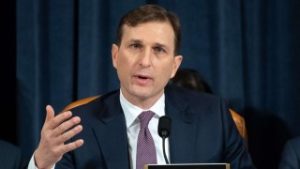
U.S. Rep. Daniel Goldman (above, with commens below):
Let me focus on some of the interactions I had with the ICE agents. I was a federal prosecutor for ten years. . . . I worked with Department of Homeland Security, I worked with ICE agents, I worked with Homeland Security’s investigations. I have never seen any plainclothes officer wearing  a mask. And I asked them, “Why are you wearing a mask?”
a mask. And I asked them, “Why are you wearing a mask?”
One person told me, “Because it’s cold.”
I asked him if he would testify to that under oath. And he walked away and wouldn’t respond to me.
Another person admitted that they’re wearing masks so that they are not caught on video.
And my question to them is: If what you are doing is legitimate, is lawful, is totally above-board, why do you need to cover your face?
2. Refractory Period. This morning Heather Cox Richardson, right, pointed out the duality of this  moment. On the one hand, the Trump administration appears to be losing momentum. The courts have largely ruled against it. Trump’s most important ally, Elon Musk, has been badly wounded and driven out of the government. Congressional Republicans are barely capable of passing a single bill.
moment. On the one hand, the Trump administration appears to be losing momentum. The courts have largely ruled against it. Trump’s most important ally, Elon Musk, has been badly wounded and driven out of the government. Congressional Republicans are barely capable of passing a single bill.
But all of that is happening at the legal and policy levels.
Yet while Trump is losing in the places where politics normally happens in America, he is making gains in three places which have historically been considered out of bounds.
(1) Federal law enforcement. Trump is in the  process of transforming federal law enforcement into an explicitly political force.
process of transforming federal law enforcement into an explicitly political force.
(2) Pardons. Rather than waiting until the final days of his term to issue pardons, as is the norm, Trump, below right, has already made extensive use of the  pardon power to reward his allies—including people convicted of using violence in support of his goals. The obvious goal here is to create an incentive structure to encourage people to take illegal actions on Trump’s behalf.
pardon power to reward his allies—including people convicted of using violence in support of his goals. The obvious goal here is to create an incentive structure to encourage people to take illegal actions on Trump’s behalf.
(3) The military. Trump’s secretary of defense has worked to purge the military’s leadership of flag officers who might place loyalty to the Constitution over loyalty to Trump. He fired the sitting chairman of the Joint Chiefs and replaced him with a general believed to be loyal. He has fired a number of senior officers. And he has taken a chainsaw to the JAG corps, dismantling the legal affairs branch of the military that would, under normal circumstances, advise officers of their duty to defend the Constitution and refuse unlawful orders.
American politics has never been contested in those realms.
Lance’s Substack, Opinion: People Ask Me “What Can I Do, How Can I Resist…” Who Wants To Hear The Answer? Lance Rosen, right, June 2, 2025. One Year Ago I Warned The Democrats That They Were Repeating The Awful Mistakes Of The German Left In Failing To Stop Hitler…I Wasn’t Loud Enough.
Lance Rosen, right, June 2, 2025. One Year Ago I Warned The Democrats That They Were Repeating The Awful Mistakes Of The German Left In Failing To Stop Hitler…I Wasn’t Loud Enough.
There will be no more pulling of punches. My greatest concern right now is not so much what Trump & Co. are doing. It is what we are not doing, because we are following too many of the wrong people and fighting on the wrong battlefields at the wrong time.
So I have a few conceptual points to make about “resistance” with which to reintroduce this year old article, and my purpose in doing so is not to be popular or to get “hearts and likes.” Shares would be more useful.
1. Political resistance, and likewise armed resistance such as what the US is currently supporting in Ukraine, is generally not defined by our day-to-day choices of strategy and tactics. It is a state of mind, and we are either in it, or not in it. The decisions about “what” to do flow from our internalizing the strategic, historical and moral importance of doing something effective as part of an organized force.
2. The future determines the present. There is no prospect for changing anything in the here and now unless it is grounded in a longer range future orientation.
3. Since we want to move people to take action, to sacrifice, to take risks, to be self-starters, they need a reason to believe it will be effective in changing or inspiring other people, and in creating increased potential for accomplishing good things through a movement. Resistance is by definition a social act. The higher strategic purpose of it is to get others to do the same, not for reasons of self-satisfaction. You will need to be part of a network because isolated efforts rarely succeed and are a prescription for disaster if we are living under an actual police state. In short, don’t just narrowly focus everything we are doing on our hopes for future elections, because building our movement is the only thing which will insure that elections even occur.

Trump appointee Elon Musk, whose companies receive billions of dollars in U.S. government contracts, prances with a chainshow at a CPAC convention in February to demonstrate his eagerness to slash other federal government spending as Argentina’s right-wing president Javier Milei cheers him on during a spectacle in which Musk repeatedly gave the audience what appeared to be a Nazi salute.
The Contrarian, Opiniion: Trump and his crew are nuts, It’s time to stop rationalizing the craziness, Jennifer Rubin, June 2, 2025. According to a jaw-dropping New York Times report, during the 2024 campaign, Elon Musk “told people he was taking so much ketamine, a powerful anesthetic, that it was affecting his bladder, a known effect of chronic use.”
He allegedly took a smorgasbord of drugs, including ecstasy and psychedelic mushrooms, while toting around his “daily medication box… [that] held about 20 pills, including ones with the markings of the stimulant Adderall.”
While the Times could not confirm Musk’s drug abuse continued into his stint at the White House, we could all see that Musk “exhibited erratic  behavior, insulting cabinet members, gesturing like a Nazi (shown at left this year) and garbling his answers in a staged interview.” In layman’s terms, the guy has acted nuts and continued to do so in full sight of Donald Trump, whose judgment when it comes to associates has long been abominable.
behavior, insulting cabinet members, gesturing like a Nazi (shown at left this year) and garbling his answers in a staged interview.” In layman’s terms, the guy has acted nuts and continued to do so in full sight of Donald Trump, whose judgment when it comes to associates has long been abominable.
In a responsible media environment, the act of delegating enormous power and access to the most sensitive government and individual data to someone so manifestly unwell would set off demands for investigation—if not impeachment—of the president who had so cavalierly entrusted him with the federal government’s operations. And yet, the corporate and billionaire media continue to obsess over a former president who ran a successful, competent administration with entirely sober and qualified advisers.
“The ever-so-apt term ‘sanewashing’ was born to describe what was going on, and the media’s role. Talk about a cover-up,” wrote Margaret Sullivan regarding 2024 campaign coverage. “Trump’s rallies were exercises in lunacy, as he spun tales about sharks and Hannibal Lecter, rambling for hours.” Sullivan added that “coverage seldom came close to getting across the reality. Instead, we’d hear descriptions about his ‘freewheeling’ style or ‘brash’ approach.”
As lax as the Trump coverage was, consider how much more egregious has been the sanewashing now that he is exercising power in ways that reveal his broken psyche. Even worse, Trump’s entire cohort—whose lunacy is on display every day—get the same treatment.
![]() CNN, Boulder attack suspect used a flamethrower in antisemitic attack, Danya Gainor, Jamiel Lynch, Josh Campbell, Paula Reid, Betsy Klein, Zoe Sottile, Hanna Park, Matt Rehbein and Antoinette Radford, June 2, 2025.
CNN, Boulder attack suspect used a flamethrower in antisemitic attack, Danya Gainor, Jamiel Lynch, Josh Campbell, Paula Reid, Betsy Klein, Zoe Sottile, Hanna Park, Matt Rehbein and Antoinette Radford, June 2, 2025.
A man used a flamethrower and Molotov cocktails to set people on fire Sunday at a Jewish community event in Boulder, Colorado, held in support of hostages in Gaza. He injured at least eight people ranging in age from 52 to 88 before being detained.
 Suspect identified: The FBI identified the lone suspect as Mohamed Sabry Soliman and said he yelled “Free Palestine!” during the attack. He faces multiple felony charges and is expected to appear in court later this afternoon.
Suspect identified: The FBI identified the lone suspect as Mohamed Sabry Soliman and said he yelled “Free Palestine!” during the attack. He faces multiple felony charges and is expected to appear in court later this afternoon.
Suspect’s history: Soliman had applied for asylum in the US and was denied a visa to enter the country in 2005, sources told CNN. White House Deputy Chief of Staff Stephen Miller said Soliman had “illegally overstayed” a tourist visa, although it’s unclear when the tourist visa was issued.
Community outcry: Jewish leaders called for action against attacks on their community in the wake of rising antisemitic violence and threats. Less than two weeks ago, two Israeli Embassy staff members were shot dead in Washington, DC, by an attacker who yelled “Free Palestine!” while being arrested.
![]() CNN, Attack suspect was in the US illegally, DHS official says Lauren Mascarenhas, June 2, 2025. The suspect charged in the Boulder attack, Mohamed Sabry Soliman, was in the US illegally, Department of Homeland Security Assistant Secretary for Public Affairs Tricia McLaughlin said Monday.
CNN, Attack suspect was in the US illegally, DHS official says Lauren Mascarenhas, June 2, 2025. The suspect charged in the Boulder attack, Mohamed Sabry Soliman, was in the US illegally, Department of Homeland Security Assistant Secretary for Public Affairs Tricia McLaughlin said Monday.
June 1
 New York Times, Unease at F.B.I. Intensifies as Patel Ousts Top Officials, Adam Goldman, June 1, 2025.
New York Times, Unease at F.B.I. Intensifies as Patel Ousts Top Officials, Adam Goldman, June 1, 2025.  Senior executives are being pushed out and the director, Kash Patel, is freely using polygraph tests to tamp down on news leaks about leadership decisions and behavior.
Senior executives are being pushed out and the director, Kash Patel, is freely using polygraph tests to tamp down on news leaks about leadership decisions and behavior.
Democracy Docket, Legal Commentary and Advocacy, The Department of Justice no longer represents the best  interests of the American people, Marc Elias, June 1, 2025. Under Pam Bondi, it has been transformed into little more than a cog in the authoritarian machine doing Donald Trump’s bidding. It has abandoned independent judgment and fealty to the law and replaced it with unquestioned obedience to the White House.
interests of the American people, Marc Elias, June 1, 2025. Under Pam Bondi, it has been transformed into little more than a cog in the authoritarian machine doing Donald Trump’s bidding. It has abandoned independent judgment and fealty to the law and replaced it with unquestioned obedience to the White House.
After only five months in office, Trump has transformed the Department of Justice into an instrument for voter suppression. This should come as no surprise.
When Trump nominated Pam Bondi, right, as  Attorney General, Democracy Docket described her as an “election denier” who helped spread “voting conspiracy theories and false allegations of election fraud.” Meanwhile, The Washington Post editorialized that she should be confirmed because she was “qualified” and “serious.”
Attorney General, Democracy Docket described her as an “election denier” who helped spread “voting conspiracy theories and false allegations of election fraud.” Meanwhile, The Washington Post editorialized that she should be confirmed because she was “qualified” and “serious.”
Sadly, we were right, and much of the corporate legacy media was woefully wrong.

Margaret Chase Smith became the first woman ever to serve in both the House of Representatives and the Senate—and the first senator to stand up against Joseph McCarthy’s Red Scare (Photo via Library of Congress).

U.S. Sen. Joe McCarthy (R-Wisconsin) and U.S. Sen. Margaret Chase Smith (R-Maine) (File photos via Washington Post.)
Letters from an American, Historical Commentary: May 31 [Decrying political character assassination],  Heather Cox Richardson, right, June 1, 2025. “I would like to speak briefly and simply about a serious national condition,” Senator Margaret Chase Smith of Maine told her colleagues on June 1, 1950. “It is a national feeling of fear and frustration that could result in national suicide and the end of everything that we Americans hold dear…. I speak as a Republican, I speak as a woman. I speak as a United States senator. I speak as an American.”“
Heather Cox Richardson, right, June 1, 2025. “I would like to speak briefly and simply about a serious national condition,” Senator Margaret Chase Smith of Maine told her colleagues on June 1, 1950. “It is a national feeling of fear and frustration that could result in national suicide and the end of everything that we Americans hold dear…. I speak as a Republican, I speak as a woman. I speak as a United States senator. I speak as an American.”“
Those of us who shout the loudest about Americanism in making character assassinations are all too frequently those who, by our own words and acts, ignore some of the basic principles of Americanism,” she pointed out. Americans have the right to criticize, to hold unpopular beliefs, to protest, and to think for themselves. But attacks that cost people their reputations and jobs were stifling these basic American principles, and the ones making those  attacks were in her own party.
attacks were in her own party.
Wisconsin senator Joe McCarthy, who was sitting two rows behind her, led a faction that had cowed almost all of the Republican Party into silence by accusing their opponents of “communism.”
Other Republicans quietly applauded Smith’s courage but refused to show similar courage themselves with public support.
In a statement in honor of the 75th anniversary of Smith’s Declaration of Conscience, Representative Jamie Raskin (D-MD) noted that our time resembles hers, and decried the “character assassination, baldfaced lies, petty insults, and round-the-clock disinformation” of MAGA Republicans.
“[T]he hollowing out of American political language…tracks the corruption of American government and the disappearance of serious policy debate,” he wrote. “These movements of thought are not just part of one politician’s campaign for power. They are in service of a ruling public philosophy, which treats the government as an instrument for class plunder and private self-enrichment, a get-even-filthier-rich-quick scheme for the president and his family and friends.”
May 31
![]() New York Times, World Scientists Look Elsewhere as U.S. Labs Stagger Under Trump Cuts, James Glanz, May 31, 2025. With the welcome mat withdrawn for promising researchers from around the world, America is at risk of losing its longstanding pre-eminence in the sciences.
New York Times, World Scientists Look Elsewhere as U.S. Labs Stagger Under Trump Cuts, James Glanz, May 31, 2025. With the welcome mat withdrawn for promising researchers from around the world, America is at risk of losing its longstanding pre-eminence in the sciences.
For decades, Bangalore, India, has been an incubator for scientific talent, sending newly minted Ph.D.s around the world to do groundbreaking research. In an ordinary year, many aim their sights at labs in the United States.
“These are our students, and we want them to go and do something amazing,” said a professor at the National Center for Biological Sciences in Bangalore, Raj Ladher.
But this is not an ordinary year.
When Professor Ladher queried some 30 graduates in the city recently about their plans, only one had certain employment in the United States. For many of the others, the political turmoil in Washington has dried up job opportunities in what Professor Ladher calls “the best research ecosystem in the world.” Some decided they would now rather take their skills elsewhere, including Austria, Japan and Australia, while others opted to stay in India.
As the Trump administration moves with abandon to deny visas, expel foreign students and slash spending on research, scientists in the United States are becoming increasingly alarmed. The global supremacy that the United States has long enjoyed in health, biology, the physical sciences and other fields, they warn, may be coming to an end.
“If things continue as they are, American science is ruined,” said David W. Hogg, a professor of physics and data science at New York University who works closely with astronomers and other experts around the world. “If it becomes impossible to work with non-U.S. scientists,” he said, “it would basically render the kinds of research that I do impossible.”
Research cuts and moves to curtail the presence of foreign students by the Trump administration have happened at a dizzying pace.
Spectrum News, Homeland Security claims these locations are “deliberately obstructing the enforcement of federal immigration laws and endangering American citizens,” Natalie Mooney and Wendy Wright, May 30, 2025. The U.S. Department of Homeland Security has accused multiple areas across upstate New York of violating federal immigration law.
 They published a list of what it calls “sanctuary jurisdictions defying federal immigration law.”
They published a list of what it calls “sanctuary jurisdictions defying federal immigration law.”
The list includes the cities of Rochester, Syracuse, Albany, Beacon, Hudson, Ithaca, Kingston, New Paltz, Newburgh and Poughkeepsie, as well as Albany County, Dutchess County, Monroe County, Orange County, Putnam County, Rockland County, Saratoga County, Sullivan County, Tompkins County, Ulster County, Warren County, Wayne County, Westchester County and Yates County.
Homeland Security claims that these locations are “deliberately obstructing the enforcement of federal immigration laws and endangering American citizens.”
 “These sanctuary city politicians are endangering Americans and our law enforcement in order to protect violent criminal illegal aliens,” said DHS Secretary Kristi Noem, left.
“These sanctuary city politicians are endangering Americans and our law enforcement in order to protect violent criminal illegal aliens,” said DHS Secretary Kristi Noem, left.
According to DHS, each jurisdiction will receive formal notification of all potential violations.
In response, Rochester city officials said, “Rochester’s Sanctuary City policy is legally sound and always has been — including during the entirety of the Trump administration’s first term. The city will continue to vigorously defend the legality of this policy and confront the Federal administration’s overused tactics of distortion, distraction and division.”
Hopium Chronicles, Pro-Democracy Advocacy, Revisiting “The Gray and The Brown,” Simon Rosenberg with Ron Brownstein, May 31, 2025. I asked award-winning journalist Ron Brownstein to revisit his seminal 2010 essay, “The Gray And the Brown.”
The difficulty Republicans are going to have in selling Trump’s “more for me, five pencils and two dolls for you” agenda to working people became evident this week in a now-infamous moment in an Iowa town hall with Senator Joni Ernst, shown below.

In the extended clip, you will note that her attempt to parrot the ridiculous GOP talking point that their Medicare/Medicaid cuts will only effect “those people” (illegals!!!!!) devolves into her admitting that: yes, many people will die.

![]() New York Times, News Analysis: Trump, Bashing the Federalist Society, Asserts Autonomy on Judge Picks, Charlie Savage, May 31, 2025 (print ed.). The president has grown increasingly angry at court rulings blocking parts of his agenda, including by judges he appointed.
New York Times, News Analysis: Trump, Bashing the Federalist Society, Asserts Autonomy on Judge Picks, Charlie Savage, May 31, 2025 (print ed.). The president has grown increasingly angry at court rulings blocking parts of his agenda, including by judges he appointed.
President Trump appears to be declaring independence from outside constraints on how he nominates judges, signaling that he is looking for loyalists who will uphold his agenda and denouncing the conservative legal network that helped him remake the federal judiciary in his first term.
Late Thursday, after a ruling struck down his tariffs on most imported goods, Mr. Trump attacked the Federalist Society, leaders of which heavily influenced his selection of judges during his first presidency.
“I am so disappointed in The Federalist Society because of the bad advice they gave me on numerous Judicial Nominations,” Mr. Trump asserted on social media. “This is something that cannot be forgotten!”
Hours earlier Thursday, the Justice Department severely undercut the traditional role of the American Bar Association in vetting judicial nominees. A day before, Mr. Trump picked a loyalist who has no deep ties to the conservative legal movement for a life-tenured appeals court seat, explaining that his pick could be counted on to rule in ways aligned with his agenda.
Together, the moves suggest that Mr. Trump may be pivoting toward greater personal involvement and a more idiosyncratic process for selecting future nominees. Such a shift would fit with his second-term pattern of steamrolling the guardrails that sometimes constrained how he exercised power during his first presidency.
Mr. Trump and his allies have expressed increasing anger at the federal judiciary as courts have blocked his actions, including his aggressive claim to wartime powers to deport migrants without due process and his efforts to freeze grants and dismantle agencies without going through Congress.
Mr. Trump lashed out at the Federalist Society, blaming it for bad advice on whom to appoint to judgeships. He singled out Leonard Leo, a former longtime leader of the Federalist Society who helped recommend his first-term nominees and who exemplifies the conservative legal movement.
“I was new to Washington, and it was suggested that I use the Federalist Society as a recommending source on judges,” the president wrote. “I did so, openly and freely, but then realized that they were under the thumb of a real ‘sleazebag’ named Leonard Leo, a bad person who, in his own way, probably hates America, and obviously has his own separate ambitions.”
In a statement, Mr. Leo said, “I’m very grateful for President Trump transforming the federal courts, and it was a privilege being involved.”
May 30

![]() New York Times, Trump Taps Palantir to Compile Data on Americans, Sheera Frenkel and Aaron Krolik, May 30, 2025. The Trump administration has expanded Palantir’s work with the government, spreading the company’s technology — which could easily merge data on Americans — throughout agencies.
New York Times, Trump Taps Palantir to Compile Data on Americans, Sheera Frenkel and Aaron Krolik, May 30, 2025. The Trump administration has expanded Palantir’s work with the government, spreading the company’s technology — which could easily merge data on Americans — throughout agencies.
In March, President Trump signed an executive order calling for the federal government to share data across agencies, raising questions over whether he might compile a master list of personal information on Americans that could give him untold surveillance power.
 Mr. Trump has not publicly talked about the effort since. But behind the scenes, officials have quietly put technological building blocks into place to enable his plan. In particular, they have turned to one company: Palantir, the data analysis and technology firm.
Mr. Trump has not publicly talked about the effort since. But behind the scenes, officials have quietly put technological building blocks into place to enable his plan. In particular, they have turned to one company: Palantir, the data analysis and technology firm.
 The Trump administration has expanded Palantir’s work across the federal government in recent months. The company has received more than $113 million in federal government spending since Mr. Trump took office, according to public records, including additional funds from existing contracts as well as new contracts with the Department of Homeland Security and the Pentagon. (This does not include a $795 million contract that the Department of Defense awarded the company last week, which has not been spent.)
The Trump administration has expanded Palantir’s work across the federal government in recent months. The company has received more than $113 million in federal government spending since Mr. Trump took office, according to public records, including additional funds from existing contracts as well as new contracts with the Department of Homeland Security and the Pentagon. (This does not include a $795 million contract that the Department of Defense awarded the company last week, which has not been spent.)
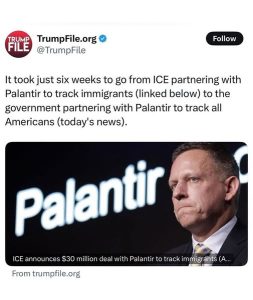 Representatives of Palantir (which is led by Trump ally and billionaire funder Peter Thiel, above) are also speaking to at least two other agencies — the Social Security Administration and the Internal Revenue Service — about buying its technology,
Representatives of Palantir (which is led by Trump ally and billionaire funder Peter Thiel, above) are also speaking to at least two other agencies — the Social Security Administration and the Internal Revenue Service — about buying its technology,  according to six government officials and Palantir employees with knowledge of the discussions.
according to six government officials and Palantir employees with knowledge of the discussions.
The push has put a key Palantir product called Foundry into at least four federal agencies, including D.H.S. and the Health and Human Services Department. Widely adopting Foundry, which organizes and analyzes data, paves the way for Mr. Trump to easily merge information from different agencies, the government officials said.
 Creating detailed portraits of Americans based on government data is not just a pipe dream. The Trump administration has already sought access to hundreds of data points on citizens and others through government databases, including their bank account numbers, the amount of their student debt, their medical claims and any disability status.
Creating detailed portraits of Americans based on government data is not just a pipe dream. The Trump administration has already sought access to hundreds of data points on citizens and others through government databases, including their bank account numbers, the amount of their student debt, their medical claims and any disability status.
Mr. Trump could potentially use such information to advance his political agenda by policing immigrants and punishing  critics, Democratic lawmakers and critics have said. Privacy advocates, student unions and labor rights organizations have filed lawsuits to block data access, questioning whether the government could weaponize people’s personal information.
critics, Democratic lawmakers and critics have said. Privacy advocates, student unions and labor rights organizations have filed lawsuits to block data access, questioning whether the government could weaponize people’s personal information.
![]() New York Times, White House Health Report Included Fake Citations, Dani Blum and Maggie Astor, May 30, 2025 (print ed.). A report on children’s health released by the Make America Healthy Again Commission (created by HHS Secretary Robert F. Kennedy Jr., at right) referred to scientific papers that did
New York Times, White House Health Report Included Fake Citations, Dani Blum and Maggie Astor, May 30, 2025 (print ed.). A report on children’s health released by the Make America Healthy Again Commission (created by HHS Secretary Robert F. Kennedy Jr., at right) referred to scientific papers that did  not exist.
not exist.
The Trump administration released a report last week that it billed as a “clear, evidence-based foundation” for action on a range of children’s health issues.
But the report, from the presidential Make America Healthy Again Commission, cited studies that did not exist. These included fictitious studies on direct-to-consumer drug advertising, mental illness and medications prescribed for children with asthma.
“It makes me concerned about the rigor of the report, if these really basic citation practices aren’t being followed,” said Katherine Keyes, a professor of epidemiology at Columbia University who was listed as the author of a paper on mental health and substance use among adolescents. Dr. Keyes has not written any paper by the title the report cited, nor does one seem to exist by any author.
The news outlet NOTUS first reported the presence of false citations, and The New York Times identified additional faulty references. By midafternoon on Thursday, the White House had uploaded a new copy of the report with corrections.
Dr. Ivan Oransky — who teaches medical journalism at New York University and is a co-founder of Retraction Watch, a website that tracks retractions of scientific research — said the errors in the report were characteristic of the use of generative artificial intelligence, which has led to similar issues in legal filings and more.

The Guardian, US health secretary calls leading medical journals such as Lancet ‘corrupt’ and pushes to create state-run alternatives, Joseph Gedeon, May 29, 2025 (print ed.). Robert F Kennedy Jr. has threatened to ban government scientists from publishing in the world’s leading medical journals, which he branded “corrupt”, and to instead create alternative publications run by the state.
“We’re probably going to stop publishing in the Lancet, New England Journal of Medicine, JAMA and those other journals,  because they’re all corrupt,” the US health secretary, right, said on the Ultimate Human podcast. He accused the publications of being controlled by pharmaceutical companies.
because they’re all corrupt,” the US health secretary, right, said on the Ultimate Human podcast. He accused the publications of being controlled by pharmaceutical companies.
Instead, Kennedy outlined plans to launch government-run journals that would become “the preeminent journals” because National Institutes of Health (NIH) funding would anoint researchers “as a good, legitimate scientist.”
The three publications Kennedy targeted are among the most influential medical journals globally, established in the 19th century and now central to disseminating peer-reviewed medical research worldwide. The Lancet and JAMA each report more than 30m annual website visits, while the New England Journal of Medicine claims more than 1 million weekly readers.

Kennedy has similarly accused the agencies he now oversees – including the NIH, the Centers for Disease Control and Prevention, the Food and Drug Administration, and the Centers for Medicare and Medicaid Services – as “sock puppets” for the pharmaceutical industry.
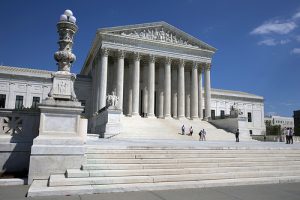
![]() New York Times, Supreme Court Allows Trump Administration, for Now, to End Biden-Era Migrant Program, Abbie VanSickle and Adam Liptak, May 30, 2025. The Trump administration had asked the court to allow it to end deportation protections for more than 500,000 people facing dire humanitarian crises in their home countries.
New York Times, Supreme Court Allows Trump Administration, for Now, to End Biden-Era Migrant Program, Abbie VanSickle and Adam Liptak, May 30, 2025. The Trump administration had asked the court to allow it to end deportation protections for more than 500,000 people facing dire humanitarian crises in their home countries.
The Supreme Court on Friday allowed the Trump administration, for now, to revoke a Biden-era humanitarian program intended to give temporary residency to more than 500,000 immigrants from countries facing war and political turmoil.
![]() The court’s order was unsigned and provided no reasoning, which is typical when the justices rule on emergency applications.
The court’s order was unsigned and provided no reasoning, which is typical when the justices rule on emergency applications.
Justice Ketanji Brown Jackson, joined by Justice Sonia Sotomayor, dissented, saying the majority had not given enough consideration to “the devastating consequences of allowing the government to precipitously upend the lives and livelihoods of nearly half a million noncitizens while their legal claims are pending.”
The ruling, which exposes some migrants from Cuba, Nicaragua, Venezuela and Haiti to possible deportation, is the latest in a series of emergency orders by the justices in recent weeks responding to a flurry of applications asking the court to weigh in on the administration’s attempts to unwind Biden-era immigration policies.
Friday’s ruling focused on former President Joseph R. Biden Jr.’s expansion of a legal mechanism for immigration called humanitarian parole, in which migrants from countries facing instability are allowed to enter the United States and quickly secure work authorization, provided they have a private sponsor to take responsibility for them.
Earlier this month, the justices allowed the Trump administration to remove deportation protections from nearly 350,000 Venezuelan immigrants who had been allowed to remain in the United States under a program known as Temporary Protected Status.
Humanitarian parole and Temporary Protected Status, or T.P.S., are two different mechanisms by which migrants from troubled countries can be temporarily settled in the United States. Humanitarian parole is typically obtained by individuals who apply on a case-by-case basis, while T.P.S. is more often extended to large groups of migrants for a period of time. Individuals can hold both statuses at the same time.
Between the two rulings, the justices have agreed that, for now, the Trump administration can proceed with plans to deport hundreds of thousands of people who had fled war-torn and instable homelands and legally taken refuge in the United States.
![]() New York Times, Why the U.S. Opened Its Doors to Chinese Students, and Why Trump Is Closing Them, Kurt Streeter, May 30, 2025. The 1970s era of academic exchange began as a form of diplomacy, which now stands in sharp contrast to President
New York Times, Why the U.S. Opened Its Doors to Chinese Students, and Why Trump Is Closing Them, Kurt Streeter, May 30, 2025. The 1970s era of academic exchange began as a form of diplomacy, which now stands in sharp contrast to President  Trump’s recent stance toward China.
Trump’s recent stance toward China.
In 1987, when Haipei Shue arrived in the United States as a student, he recalls receiving the warmest of welcomes. He was a graduate student in sociology at the University of Wisconsin-Madison.
“People were curious about us, inviting us to their homes, wanting to be friends,” Mr. Shue said on Thursday, describing an openness that defined his early years in a country then seen by many in China as a beacon of opportunity.
“It was an extraordinary time,” he said.
That era of academic exchange between China and the United States, beginning in the 1970s under President Jimmy Carter as a form of soft power diplomacy, now stands in sharp contrast to the Trump administration’s recent stance toward the country.
The administration announced this week that it would aggressively revoke visas for Chinese students with ties to the Chinese Communist Party or for those studying in broadly defined “critical fields.” The administration also plans to enhance vetting of future applicants for student visas, including looking at social media posts.
Those policies promise to reduce the number of students from China coming to the United States, who have been a fixture on American university campuses for decades. In 2024, there were roughly 277,000 students.
The Trump administration says China exploits U.S. universities to bolster its military and technological capabilities. And Trump officials argue that some Chinese students may pose risks of espionage and technology theft.
![]() New York Times, Analysis: Trump Makes a New Push to ‘Decouple’ U.S. From China, Edward Wong, May 30, 2025 (print ed.). Trump administration officials are getting a second chance to try to sever ties with China by starting a trade war, imposing export controls and revoking student visas.
New York Times, Analysis: Trump Makes a New Push to ‘Decouple’ U.S. From China, Edward Wong, May 30, 2025 (print ed.). Trump administration officials are getting a second chance to try to sever ties with China by starting a trade war, imposing export controls and revoking student visas.
The Trump administration has threatened to revoke the visas of many of the 277,000 or so Chinese students in the United States and to subject future applicants from China, including Hong Kong, to extra scrutiny.
Cargo ships laden with goods from China stopped coming into American ports earlier this spring as President Trump escalated his trade war against Beijing.
And the Trump administration is suspending sales of some critical U.S. technologies to China, including those related to jet engines, semiconductors and certain chemicals and machinery.
 Taken together, the actions by the Trump administration amount to an aggressive campaign to “decouple” the United States from China, as it seeks to break the close commercial ties between the world’s two largest economies and toss away what had been the anchor of the relations between the nations for decades.
Taken together, the actions by the Trump administration amount to an aggressive campaign to “decouple” the United States from China, as it seeks to break the close commercial ties between the world’s two largest economies and toss away what had been the anchor of the relations between the nations for decades.
Aggressive decoupling would bolster American security, from the perspective of Mr. Trump and his aides. And it would also accelerate a trend toward each power being entrenched in its own regional sphere of influence.

![]() New York Times, Elon Musk Leaves Washington Behind but With Powerful Friends in Place, David A. Fahrenthold, Eric Lipton and Jess Bidgood, May 30, 2025. President Trump will send off the world’s richest man in a news conference today at the White House.
New York Times, Elon Musk Leaves Washington Behind but With Powerful Friends in Place, David A. Fahrenthold, Eric Lipton and Jess Bidgood, May 30, 2025. President Trump will send off the world’s richest man in a news conference today at the White House.
Just three months ago, Elon Musk stood before a crowd of roaring conservatives and held up a chain saw. He was at the height of his influence, swaggering in a self-designed role with immense power inside and outside the government.
“We’re trying to get good things done,” he said, using the chain saw as a metaphor for the deep cuts he was making in government. “But also, like, you know, have a good time doing it.”
Mr. Musk’s time in government is over now. His good time ended long before.
Mr. Musk is leaving his government position after weeks of declining influence and increasing friction with both President Trump and shareholders of his own private companies. But Mr. Trump on Thursday suggested that he was still aligned with one of his chief political patrons, saying that he would appear with Mr. Musk at the White House on Friday afternoon for a news conference.
“This will be his last day, but not really, because he will always be with us, helping all the way,” Mr. Trump wrote in a post on his social media site. “Elon is terrific!”
Mr. Musk’s time in Washington has brought significant benefits to his fastest-growing company, SpaceX, the rocket and satellite communications giant. Musk allies were chosen to run NASA and the Air Force — two of SpaceX’s key customers — and one of the company’s major regulators, the Federal Communications Commission.
But Mr. Musk never came close to delivering on the core promise of his tenure: that he could cut $1 trillion from the federal budget.
His Department of Government Efficiency was full of government newcomers who struggled with both the law and the facts. They posted error-filled data and made procedural mistakes undercutting their credibility. They also rushed through cuts without seeming to understand what they were cutting. On the group’s website, 47 percent of the contracts they canceled are listed as saving taxpayers nothing.
![]() New York Times, On the Campaign Trail, Elon Musk Juggled Drugs and Family Drama, Kirsten Grind and and Megan Twohey, May 30, 2025. I’ve been reporting on Musk’s drug use for years. In this article, we found that as he rose to political power last year, his drug consumption was more intense than previously known.
New York Times, On the Campaign Trail, Elon Musk Juggled Drugs and Family Drama, Kirsten Grind and and Megan Twohey, May 30, 2025. I’ve been reporting on Musk’s drug use for years. In this article, we found that as he rose to political power last year, his drug consumption was more intense than previously known.
As Elon Musk became one of Donald J. Trump’s closest allies last year, leading raucous rallies and donating about $275 million to help him win the presidency, he was also using drugs far more intensely than previously known, according to people familiar with his activities.
Mr. Musk’s drug consumption went well beyond occasional use. He told people he was taking so much ketamine, a powerful anesthetic, that it was affecting his bladder, a known effect of chronic use. He took Ecstasy and psychedelic mushrooms. And he traveled with a daily medication box that held about 20 pills, including ones with the markings of the stimulant Adderall, according to a photo of the box and people who have seen it.
It is unclear whether Mr. Musk, 53, was taking drugs when he became a fixture at the White House this year and was handed the power to slash the federal bureaucracy. But he has exhibited erratic behavior, insulting cabinet members, gesturing like a Nazi and garbling his answers in a staged interview.
At the same time, Mr. Musk’s family life has grown increasingly tumultuous as he has negotiated overlapping romantic relationships and private legal battles involving his growing brood of children, according to documents and interviews.
On Wednesday evening, Mr. Musk announced that he was ending his stint with the government, after lamenting how much time he had spent on politics instead of his businesses.
![]()
New York Times, Opinion: Elon Musk’s Legacy Is Disease, Starvation and Death, Michelle Goldberg, right, May 30, 2025 . There is an Elon Musk post on X, his social media platform, that should define his legacy. “We spent the weekend feeding USAID into the wood chipper,” he wrote on Feb. 3. He could have “gone to some great parties. Did that instead.”
. There is an Elon Musk post on X, his social media platform, that should define his legacy. “We spent the weekend feeding USAID into the wood chipper,” he wrote on Feb. 3. He could have “gone to some great parties. Did that instead.”
Musk’s absurd scheme to save the government a trillion dollars by slashing “waste, fraud and abuse” has been a failure. DOGE claims it’s saved $175 billion, but experts believe the real number is significantly lower.
Meanwhile, according to the Partnership for Public Service, which studies the federal work force, DOGE’s attacks on government personnel — its firings, re-hirings, use of paid administrative leave and all the associated lack of productivity — could cost the government upward of $135 billion this fiscal year, even before the price of defending DOGE’s actions in court. Musk’s rampage through the bureaucracy may not have created any savings at all, and if it did, they were negligible.
Now, Musk’s Washington adventure is coming to an end, with the disillusioned billionaire announcing that he’s leaving government behind. “It sure is an uphill battle trying to improve things in D.C., to say the least,” he told The Washington Post.
There is one place, however, where Musk, with the help of his minions, achieved his goals. He did indeed shred U.S.A.I.D. Though a rump operation is now operating inside the State Department, the administration says that it has terminated more than 80 percent of U.S.A.I.D. grants.
Brooke Nichols, an associate professor of global health at Boston University, has estimated that these cuts have already resulted in about 300,000 deaths, most of them of children, and will most likely lead to significantly more by the end of the year. That is what Musk’s foray into politics accomplished.
 White House officials deny that their decimation of U.S.A.I.D. has had fatal consequences. At a hearing in the House last week, Democrats confronted Secretary of State Marco Rubio, left, with my colleague Nick Kristof’s reporting from East Africa, documenting suffering and death caused by the withdrawal of aid. Rubio insisted no such deaths have happened, but people who’ve been in the field say he’s either lying or misinformed.
White House officials deny that their decimation of U.S.A.I.D. has had fatal consequences. At a hearing in the House last week, Democrats confronted Secretary of State Marco Rubio, left, with my colleague Nick Kristof’s reporting from East Africa, documenting suffering and death caused by the withdrawal of aid. Rubio insisted no such deaths have happened, but people who’ve been in the field say he’s either lying or misinformed.
May 29

![]() New York Times, Trump Tariffs Ruled Illegal by Federal Judicial Panel, Tony Romm and Ana Swanson, May 29, 2025 (print ed.). The U.S. Court of International Trade said the president had overstepped his authority in imposing his “reciprocal” tariffs globally, as well as levies on Canada and Mexico.
New York Times, Trump Tariffs Ruled Illegal by Federal Judicial Panel, Tony Romm and Ana Swanson, May 29, 2025 (print ed.). The U.S. Court of International Trade said the president had overstepped his authority in imposing his “reciprocal” tariffs globally, as well as levies on Canada and Mexico.
A panel of federal judges on Wednesday blocked President Trump from imposing some of his steepest tariffs on China and other U.S. trading partners, finding that federal law did  not grant him “unbounded authority” to tax imports from nearly every country around the world.
not grant him “unbounded authority” to tax imports from nearly every country around the world.
The ruling, by the U.S. Court of International Trade, delivered an early yet significant setback to Mr. Trump, undercutting his primary leverage as he looks to pressure other nations into striking trade deals more beneficial to the United States.
Before Mr. Trump took office, no president had sought to invoke the International Emergency Economic Powers Act, a 1977 law, to impose tariffs on other nations. The law, which primarily concerns trade embargoes and sanctions, does not even mention tariffs.
But Mr. Trump adopted a novel interpretation of its powers as he announced, and then suspended, high levies on scores of countries in April. He also used the law to impose tariffs on products from Canada and Mexico in return for what he said was their role in sending fentanyl to the United States.
On Wednesday, the Court of International Trade, the primary federal legal body overseeing such matters, found that Mr. Trump’s tariffs “exceed any authority granted” to the president by the emergency powers law. Ruling in separate cases brought by states and businesses, a bipartisan panel of three judges essentially declared many, but not all, of Mr. Trump’s tariffs to have been issued illegally.
It was not clear precisely when and how the tariff collections would grind to a halt. The ruling gave the executive branch up to 10 days to complete the bureaucratic process of ending them. The Trump administration immediately filed its plans to appeal in the U.S. Court of Appeals for the Federal Circuit.Sign up for Your Places: Global Update. All the latest news for any part of the world you select. Get it sent to your inbox.
For now, the decision threatens to undercut the administration’s efforts to reach trade agreements globally since the president is using the prospect of boundless tariffs — enacted on his own, without congressional approval — as a bargaining chip in negotiations with roughly 18 countries.
The ruling does not affect tariffs issued by the Trump administration under separate legal authorities, including levies on steel, aluminum and cars, and others that Mr. Trump has threatened on pharmaceuticals, semiconductors and other critical products.
![]() New York Times, Court Blocks Tariffs Fragile U.S.-China Truce Trump Delays E.U. Tariffs, Tony Romm, May 29, 2025. Federal Appeals Court Temporarily Spares Trump From Having to Wind Down Tariffs.
New York Times, Court Blocks Tariffs Fragile U.S.-China Truce Trump Delays E.U. Tariffs, Tony Romm, May 29, 2025. Federal Appeals Court Temporarily Spares Trump From Having to Wind Down Tariffs.
A federal appeals court on Thursday temporarily agreed to preserve many of President Trump’s sweeping tariffs on China and other U.S. trading partners. The move paused an earlier decision by a separate court that would have forced the White House to wind down duties deemed to be illegal.
The new order, by the U.S. Court of Appeals for the Federal Circuit, granted the pause on an administrative basis. That decision bought time for the panel’s judges to consider the government’s ask for a longer delay, as Mr. Trump pursues a ruling that would safeguard one of the most potent tools in his global trade war.Which Tariffs Could Be Halted
A U.S. trade court struck down tariffs imposed by President Trump under the International Emergency Economic Powers Act, but a federal appeals court temporarily paused the ruling. Tariffs under a separate national security provision are not affected.
Since taking office, Mr. Trump has relied on a federal emergency powers law as a form of political leverage, hoping to use sky-high duties — or the mere threat of them — to force other governments to make trade concessions.
Lincoln Square Media, ICYMI: Putinism on American Soil, Joe Trippi, right,  May 29, 2025. Trump’s fusion of political power and personal enrichment may seem familiar. It’s how his dear friend, Vladimir Putin, has ruled Russia.
May 29, 2025. Trump’s fusion of political power and personal enrichment may seem familiar. It’s how his dear friend, Vladimir Putin, has ruled Russia. 
The early American republic was deeply suspicious of concentrated wealth.
Fast forward to today, and the picture is inverted. Political candidates depend on massive fundraising machines. Lobbyists write legislation. Billionaires buy platforms, shape discourse, and even negotiate with foreign powers.
Now, with Donald Trump back in the White House, we face the most dangerous form of capital’s dominance yet: a fusion of political power and personal enrichment that corrodes both democracy and markets.
This is not merely a return to a pro-business agenda or deregulation. It is the full flowering of crony capitalism — a system where loyalty to the leader is rewarded with contracts, immunity, and influence, and where state power is wielded in service of Trump and his obsessions.
Trumpism is not about building a strong state or a coherent political vision. It’s about building a network of loyalists who profit from proximity to the president. In that sense, it closely resembles the system Vladimir Putin has built in Russia — one where oligarchs thrive not because of free competition or innovation, but because of their personal loyalty to the regime.
In the face of this creeping Putinism, the defense of democracy cannot be left to institutions alone. They are already under siege — from courts packed with loyalists to agencies purged of dissent. The true counterweight must come from the people themselves. Democracy is not self-executing. It lives only when citizens insist that it does.
If Americans still believe in government of, by, and for the people, then it’s time to reassert the primacy of democracy — before it’s too late.
That means more than voting. It means organizing, speaking out, and yes — peacefully protesting. It means standing in the streets, writing to editors, showing up at school boards and town halls, and refusing to accept a government that serves money over people. And one man over the Constitution. This is not about left or right. It is about whether public life will be shaped by democratic debate or sold off to the highest bidder.
As citizens we must act together, regardless of party and organize a movement to work in every House District to defeat any member who stands with Trump against us. We must make Trump’s supporters in our House fear defeat at our hands in the General Election more than they fear Trump and his MAGA base in the Primary Election. We must rise in numbers that none can mistake as anything other than the People’s House being returned squarely to the hands of the people, by the people. And elect a House for the people that acts immediately to stop Trump at every turn in our name.
A revolt for the ages that would make our founders proud and secure our democracy for our children’s future.
If we want democracy to survive, we must act like citizens, not subjects. We must remind the world — and ourselves — that in America, power still belongs to the people.
That is the fight we are in and the fight we must win.

Meidas Touch Network, Commentary: One Ruling Won’t Stop the  Takeover, Michael Cohen (above, best-selling author, commentator and former Trump personal attorney), May 29, 2025. The court checked Trump’s tariff overreach; but his war on co-equal power is just beginning. This isn’t trade policy; it’s a test run for dismantling democracy, one branch at a time.
Takeover, Michael Cohen (above, best-selling author, commentator and former Trump personal attorney), May 29, 2025. The court checked Trump’s tariff overreach; but his war on co-equal power is just beginning. This isn’t trade policy; it’s a test run for dismantling democracy, one branch at a time.
In a much-needed moment of clarity and constitutional courage, the Court of International Trade actually did its damn job; ruling that President Trump’s unilateral imposition of sweeping global tariffs was not just illegal, but flat-out unconstitutional.
You heard that right. The emperor of impulsiveness, the high priest of petty retribution, has been told “No.” And if there’s one thing I know Trump despises more than a mirror that reflects reality, it’s being told he’s not above the law.
So, let’s be clear: this wasn’t just some misguided economic policy cooked up at Mar-a-Lago over Big Macs and Diet Cokes. This was a shakedown. A mafia move wrapped in our flag. A strongman’s attempt to bully the world into paying tribute, and when the money didn’t come fast enough, he made them kiss the ring for tariff “waivers.”

Donald J. Trump, center, in a promotional photo from his “Apprentice” series of TV and cable shows.
And just like that, multinationals and entire nations found themselves playing The Apprentice: Global Edition, where the only prize was avoiding economic disaster.
The court’s ruling was scathing, unflinching, and patriotic. They affirmed what the Constitution has made clear since 1787: The power to impose tariffs, to regulate international commerce, rests with Congress. Not with one man. Not with a wannabe despot who governs by tweet and temper.
Think about this: on Monday he slaps on a 150% tariff like he’s imposing penalties on a contestant who forgot their lines; Tuesday, he walks it back to 20% because—surprise—someone with actual knowledge whispered in his ear that maybe, just maybe, this isn’t how global markets work. By Friday? Well… no one knows. Not even him.
But Trump doesn’t care about process. He doesn’t even care about results. He cares about domination. Optics. Control. That’s what the tariffs were always about: leveraging fear to gain compliance. If he could force corporations to beg for exemptions, he could show them who’s boss. If he could make foreign governments bow, he could pretend to be the great negotiator. Except he wasn’t negotiating. He was extorting. And the court just called his bluff—BIGLY!
Now here’s the part that should really keep you up at night: What’s he going to do about it?
Because if you think this man—this ego wrapped in flesh—takes kindly to limits on his power, you haven’t been paying attention. Trump is allergic to accountability. The judiciary? A nuisance. Congress? A sideshow. Checks and balances? That’s for suckers and losers.
He doesn’t just want to bend the Constitution; he wants to rewrite it in gold leaf with his name stamped at the top like a Trump University diploma.This ruling isn’t going to stop him. It’s going to provoke him.

Meidas Touch Network, Commentary: Trump Declares Divine Mission and Infallibility in Meme Posts, J.D. Wolf, May 29, 2025. Trump about  himself: “He’s on a mission from God.”
himself: “He’s on a mission from God.”
On Wednesday night, Trump posted two memes to his Truth Social account. In one image, a  tylized photo shows Trump walking down an empty street beneath the caption: He’s on a mission from God & nothing can stop what’s coming.”Trump
tylized photo shows Trump walking down an empty street beneath the caption: He’s on a mission from God & nothing can stop what’s coming.”Trump
Behind him looms a cartoon of Pepe the Frog, a meme (or its variant at left) used by far-right, QAnon, and white nationalist  online communities. The phrase “nothing can stop what’s coming” is a well-known QAnon slogan, used to invoke a coming reckoning or prophetic judgment.
online communities. The phrase “nothing can stop what’s coming” is a well-known QAnon slogan, used to invoke a coming reckoning or prophetic judgment.
The second post featured a mock billboard emblazoned with Trump’s portrait and the statement: “President Trump was right about everything.”
Taken together, the memes portray Trump not just as a political figure but as a divinely sanctioned force of destiny.
This type of messaging has become increasingly common in his social media presence, blurring the line between political propaganda and religious zeal. By amplifying this imagery, Trump continues to suggest he is both infallible and an inevitable, savior-figure.

![]() New York Times, Live Updates: Judge Intends to Block Trump Effort to Stop Harvard From Enrolling Foreign Students, Dana Goldstein, May 29, 2025. The decision was a victory for Harvard in its ongoing confrontation with the White House, which has sought to undermine the university’s finances and influence.Here’s what to know about Harvard’s fight with Trump.
New York Times, Live Updates: Judge Intends to Block Trump Effort to Stop Harvard From Enrolling Foreign Students, Dana Goldstein, May 29, 2025. The decision was a victory for Harvard in its ongoing confrontation with the White House, which has sought to undermine the university’s finances and influence.Here’s what to know about Harvard’s fight with Trump.
A federal judge in Boston said on Thursday that she would temporarily block President Trump’s effort to prevent Harvard from enrolling international students, part of the administration’s all-out battle to undermine the university’s finances and global influence.
The judge’s decision was a victory for Harvard, at least for now, in its ongoing confrontation with the White House, which has already seen the university stripped of billions of dollars in federal funding.
 The result came as 9,000 Harvard students were gathered in Harvard Yard to receive their diplomas, in a spirited graduation ceremony filled with symbols of protest against Mr. Trump and messages of support for international peers. There were sporadic cheers as students, faculty and families learned of the judge’s ruling.
The result came as 9,000 Harvard students were gathered in Harvard Yard to receive their diplomas, in a spirited graduation ceremony filled with symbols of protest against Mr. Trump and messages of support for international peers. There were sporadic cheers as students, faculty and families learned of the judge’s ruling.
Harvard’s lawyers argue that the Trump administration is attacking it politically, in violation of the First Amendment, and have said that international students were panicked and seeking to transfer. “I want to maintain the status quo,” Judge Allison D. Burroughs said in the hearing on Thursday. “People are terrified.”
The Trump administration continues to seek options for restricting the flow of foreign students into the country. It has described visa holders as “agitators,” and President Trump has argued that more of their admissions spots should go to Americans.
The administration stepped up its effort to restrict foreign students across higher education late Wednesday, with an announcement by the secretary of state, Marco Rubio, that officials would begin to “aggressively revoke” the visas of some Chinese students.
Here’s what else to know:
- Political target: The administration has accused Harvard of liberal bias, violating the Supreme Court ban on affirmative action and allowing antisemitic behavior. Harvard’s lawyers argued in court — using the president’s own words and social media posts — that the institution is being politically targeted in violation of the First Amendment. Here’s an overview of the legal fight.
- Funding fight: The Trump administration has frozen more than $3 billion in federal funding to Harvard, and Mr. Trump has said he would like to revoke the university’s tax-exempt status. This week the administration said it would cancel the federal government’s remaining contracts with Harvard, worth an estimated $100 million.

Letters from an American, Historical Commentary: May 28 [Court Blocks Trump Tariffs; Trump Pardons Trump-Friendly Convicts],  Heather Cox Richardson, right, May 25, 2025. Judges continue to decide cases against Trump, with a three-judge panel at the U.S. Court of International Trade ruling today that President Donald J. Trump’s sweeping “Liberation Day” tariffs are illegal.
Heather Cox Richardson, right, May 25, 2025. Judges continue to decide cases against Trump, with a three-judge panel at the U.S. Court of International Trade ruling today that President Donald J. Trump’s sweeping “Liberation Day” tariffs are illegal.
The judges, one appointed by President Ronald Reagan, one by President Barack Obama, and one by Trump himself, noted that the U.S. Constitution gives exclusively to Congress the power to impose tariffs. In 1977, Congress passed the International Emergency Economic Powers Act, often abbreviated as IEEPA, delegating to the president the power to adjust tariffs in times of national emergency, but Trump has used that power far beyond what the Constitution will permit.
Since he took office on January 20, 2025, the judges noted, Trump “has declared several national emergencies and imposed various tariffs in response.” But the IEEPA has “meaningful limits,” the court writes, and “an unlimited delegation of tariff authority would be unconstitutional.” The court blocked all the tariffs Trump imposed under the IEEPA, thus ending Trump’s tariff spree, although the administration will appeal.
“Congress manifestly is not permitted to abdicate or to transfer to other the essential legislative functions with which it is thus vested,” the court writes.
That principle echoes far beyond tariffs, as the impoundment of funds by the “Department of Government Efficiency” takes from Congress the power to pass laws that the executive branch must faithfully execute.
Tariffs were in the news today in another way, too, as Wall Street analysts have begun to talk of “TACO trade,” short for “Trump always chickens out.” The phrase was coined earlier this month by Robert Armstrong of Financial Times and refers to Trump’s habit of threatening extraordinarily high tariffs and then backing down. Armstrong noted that investors have figured out that they can buy stocks cheaply immediately after Trump’s initial tariff announcement and then sell higher when stocks rebound after he changes his mind.
Trump’s tariff machinations — he has moved them more than 50 times since he took office — are also enriching the Trump family. Last week, Trump’s son Eric Trump joined Vietnam’s prime minister Pham Minh Chinh in a groundbreaking ceremony for a $1.5 billion luxury real estate development with three 18-hole golf courses outside the Vietnamese capital of Hanoi.
Vietnam sends more of its exports to the United States than to any other country, and after Trump hit Vietnam with 46% tariffs, top officials in Vietnam ignored the country’s own laws to ink a hurried deal with the Trumps to head the tariffs off. The Trump Organization is also cutting deals in Serbia, Indonesia, and the Middle East.
Trump’s pardons also continue to be in the news.
Today the president granted clemency to 25 people, including former Representative Michael Grimm (R-NY) and  former Connecticut governor John Rowland, both of whom were convicted of tax fraud. Trump also commuted the six federal life sentences of Chicago gang leader Larry Hoover, 74, who was convicted of murder, extortion, money laundering, and drug related offenses, and from prison ran a notorious drug gang that had about 30,000 members across 31 states and brought in an estimated $100 million a year. Hoover still faces what’s left of a 200-year sentence in Illinois for murder.
former Connecticut governor John Rowland, both of whom were convicted of tax fraud. Trump also commuted the six federal life sentences of Chicago gang leader Larry Hoover, 74, who was convicted of murder, extortion, money laundering, and drug related offenses, and from prison ran a notorious drug gang that had about 30,000 members across 31 states and brought in an estimated $100 million a year. Hoover still faces what’s left of a 200-year sentence in Illinois for murder.
While Trump’s pardons of Republicans convicted of tax crimes seem in keeping with his favoring of the wealthy, Trump’s commutation of the sentence of a gang kingpin seems an odd counterpoint to his administration’s stance on undocumented immigrants. Administration officials insist they must be able to deport migrants they allege are gang members even if they have no criminal histories. They can ignore due process, they claim, because of the dangers those individuals present to the American people. And yet Trump has now commuted the sentence of a gang leader convicted of the very sorts of crimes the administration insists justify denying to undocumented immigrants the rights guaranteed by the Constitution.
Hoover’s pardon is reminiscent of Trump’s advice to the right-wing Proud Boys in September 2020 to “stand back and stand by,” as he courted the support of vigilante groups to help him steal the 2020 election. It is in keeping with Trump’s statement that he’s “looking at” pardons for the men convicted of conspiring to kidnap Democratic Michigan governor Gretchen Whitmer.
Federal Legal News Affecting Universities
- New York Times, U.S. Will ‘Aggressively’ Revoke Visas of Many Chinese Students, Rubio Says, Edward Wong, May 29, 2025 (print ed.). Secretary of State Marco Rubio said the targeted students would include those with ties to the Chinese Communist Party and those studying in “critical fields.”
- New York Times, Trump Suggests Limit on International Students at Harvard, Michael C. Bender, May 29, 2025 (print ed.).. The school has so far resisted considerable pressure from the Trump administration to enact other policy changes.
- New York Times, Analysis: Harvard Fight Illustrates Trump’s Worldview: If He Attacks, It’s Your Fault, Maggie Haberman, May 29, 2025 (print ed.). Since regaining the White House, President Trump has been fixated on making an example of those who push back against him.
Trump Administration Legal Claims
- New York Times, To Win Pardons, Trump Allies Echo His Claims of Political Prosecutions, Kenneth P. Vogel, May 29, 2025 (print ed.). President Trump is increasingly using his clemency powers to undermine Justice Department cases against his supporters.
- New York Times, Trump Pardons Former N.Y. Representative Who Pleaded Guilty to Tax Fraud, Liam Stack and Tyler Pager, May 29, 2025 (print ed.). Michael G. Grimm, a Republican, represented Staten Island and part of Brooklyn from 2011 until he resigned in 2015.
- New York Times, Trump Administration Agrees to Return Guatemalan Man to U.S., Mattathias Schwartz and Hamed Aleaziz, May 29, 2025 (print ed.). A federal judge in Massachusetts had ordered officials to “facilitate” his return. The U.S. is still holding a group of other deportees at a base in Djibouti.
More On Tariff Ruling
The Bulwark, Commentary: A Whiff of Courage in the Air, William  Kristol, Andrew Egger, Sam Stein, and Jim Swift, May 29, 2025. Despite the furious assaults by the Trump project, some of our institutions are holding. Others are fighting back. Lots of us have had occasion in recent years to quote Robert Frost’s 1961 comment and lament, that “A liberal is a man too broadminded to take his own side in a quarrel.”
Kristol, Andrew Egger, Sam Stein, and Jim Swift, May 29, 2025. Despite the furious assaults by the Trump project, some of our institutions are holding. Others are fighting back. Lots of us have had occasion in recent years to quote Robert Frost’s 1961 comment and lament, that “A liberal is a man too broadminded to take his own side in a quarrel.”
But could things be changing? Aren’t there signs that some liberals, confronted by the present danger of a real and vicious authoritarian threat, are beginning to take their own side? That side is the side of liberalism broadly construed; the side of the principles and practices of a free society.
What are the signs of hope?
In the midst of a complete takeover and weaponization of the executive branch of government by the authoritarians, and the complete collapse into timid passivity of the legislative branch, the third branch (the courts) is at least trying to step up. Yesterday’s unanimous decision from the  Court of International Trade striking down as unlawful Trump’s “Liberation Day” tariffs was the most recent and one of the most striking examples.
Court of International Trade striking down as unlawful Trump’s “Liberation Day” tariffs was the most recent and one of the most striking examples.
We’ll see how that decision fares upon appeal. But the decision was a unanimous one, from a panel consisting of a Reagan, an Obama, and a Trump appointee. As in other cases in areas ranging from tariffs to immigration to executive governance, federal judges appointed by presidents of both parties have done a lot to remind us that we live—or should live—under a Constitution and the rule of law.
The Constitution and the rule of law used to be things we could all agree on.
Yes, there’s plenty to worry about when these cases make it to the Supreme Court, as they seem destined to. But as someone who’s warned that we can’t count on the courts alone to save us—and as someone who still thinks that’s the case—I have to acknowledge that so many federal judges have done their best.
So have some other civic leaders, from outside the government. After an initial near-collapse of many private-sector institutions before the Trump administration, we’re now seeing at least some resistance. Some law firms are fighting the bullying. Some universities, most notably Harvard, are fighting not just for their own rights and interests but for the principles of the rule of law and free society.
During the 2024 campaign, many of us said that democracy—by which we meant liberal democracy—was on the ballot. I believe subsequent events have proven us right. Democracy lost. We have already paid a great price for that defeat. More, perhaps much more, damage will be done. But at least there are those fighting back in defense of liberalism.
Quick Hits:
DANGEROUS IDEAS: There’s saying the quiet part out loud, and then there’s whatever this was from Education Secretary Linda McMahon yesterday: “Universities should continue to be able to do research as long as they’re abiding by the laws and in sync, I think, with the administration and what the administration is trying to accomplish.”
Hear that, Harvard? Are you listening, Johns Hopkins?  MAGA-approved research—into the perils of biological males in girls’ sports, say, or perhaps racial disparities in crime statistics—can carry on with no worries. You wouldn’t want to get crosswise with “what the administration is trying to accomplish,” though. What are you, some sort of commie subversive?
MAGA-approved research—into the perils of biological males in girls’ sports, say, or perhaps racial disparities in crime statistics—can carry on with no worries. You wouldn’t want to get crosswise with “what the administration is trying to accomplish,” though. What are you, some sort of commie subversive?
Paul Krugman via Substack, Economic Analysis: The Trade Emperor Has Always Been Stark Naked, Paul Krugman, right, May 29, 2025. But it’s  a shock to see someone say it.
a shock to see someone say it.
I’d like to apologize for the crude language I used in my initial reaction to the Court of International Trade ruling basically invalidating Donald Trump’s entire tariff policy.
OK, that’s a lie. Given the circumstances, I was entirely justified in using a bad word. But by gosh and heavens to Betsy, I’ll try to be a bit more decorous today. So here goes.
Punitive tariffs on everyone, including the penguins of uninhabited islands, have been one of the Trump administration’s signature policies, along with epic corruption and abductions by masked men claiming to be federal agents. All of these policies have involved blatant violations of the letter of the law, its spirit, or both. But there has been very little effective pushback.
So it came as a shock yesterday when the United States Court of International Trade suddenly ruled that almost everything Trump has been doing on tariffs is illegal. The Court is clearly right on the merits. But I, like many observers, thought that we were past the point where the merits of cases mattered. It’s gratifying to learn that I was wrong.
For the past 90 years U.S. tariff policy has been set through a process of negotiation with other countries — we’ll cut our tariffs if you cut yours. The purpose of these negotiations is, in large part, to protect ourselves from our own special interests. Once a trade deal has been struck, Representative Bomfog of Middletown can’t insert a special provision benefiting his district’s paperclip factory.
But the rigidity of trade deals can itself be a problem. What if rapid changes in trade create irresistible pressure to do something, but you don’t want to renegotiate everything? So U.S. trade law creates some safety valves — conditions under which presidents can unilaterally impose temporary tariffs that relieve some of the political pressure. The idea was always that presidents, keeping in mind both domestic economic consequences and relations with our allies, would use that discretionary power sparingly.
It was a very clever system, but one utterly unprepared to deal with a president like Donald Trump.
Until he announced the massive “Liberation Day” tariffs on April 2, Trump mainly relied on Section 232 of the 1962 Trade Expansion Act, which empowers the president to impose tariffs when imports “threaten to impair national security.” Such tariffs are supposed to follow a quasi-judicial process in which the Commerce Department investigates the claim, reaches a decision, and the president then chooses whether to act:
May 28

Meidas Touch Network, The Trump Administration Pauses New Student Visa Interviews, Aaron Parnas, May 28, 2025. This could  have devastating impacts on new enrollment at college campuses.
have devastating impacts on new enrollment at college campuses.
According to newly obtained information from Politico, the Trump administration is considering a major policy shift that would require all foreign students applying to study in the U.S. to undergo social media screening. This would mark a significant expansion of current vetting practices.
 A cable obtained by Politico, dated Tuesday and signed by Secretary of State Marco Rubio, right, instructs U.S. embassies and consulates to temporarily halt scheduling new visa interviews for international students. The pause is intended to give time to prepare for the potential rollout of mandatory social media checks
A cable obtained by Politico, dated Tuesday and signed by Secretary of State Marco Rubio, right, instructs U.S. embassies and consulates to temporarily halt scheduling new visa interviews for international students. The pause is intended to give time to prepare for the potential rollout of mandatory social media checks
If implemented, the plan could create serious delays in processing student visas and have financial consequences for U.S. universities, many of which rely heavily on tuition from international students.
The move could reshape how international students engage with U.S. education, potentially deterring many from applying and further straining the country’s higher education institutions.
Paul Krugman via Substack, Economic Analysis: America Turns Its Back on the World and self-betrayal, Paul Krugman, right, May 28,  2025. Blocking foreign students is an act of self-destruction.
2025. Blocking foreign students is an act of self-destruction.
My wife and I are co-authors of a widely used textbook on the principles of economics, which is revised on a three-year cycle. When a new edition comes out, I normally visit a number of schools that might adopt it, usually giving a big public talk, a smaller technical seminar,  and spending some time with students and faculty.
and spending some time with students and faculty.
So it was that at one point I found myself visiting Texas Tech in Lubbock. Yes, it seemed pretty remote to someone who has spent almost his whole life in the Northeast Corridor, but as usual the overall experience was very positive. And it was also surprisingly cosmopolitan: there were students from many nations. I just checked the numbers, and currently 30 percent of Texas Tech’s graduate students are international.
So it is all across America. Our nation’s ability to attract foreigners to study here is one of our great strengths. Or maybe I should say was one of our strengths.
According to Politico, a cable from Marco Rubio, the secretary of state, has directed U.S. embassies and consulates to halt all processing of visa applications from foreigners hoping to study in the United States.
This is reportedly a temporary measure in preparation for a new system in which would-be students will be screened on the basis of their social media history. And you can be sure that the criteria for denying entry will go far beyond, you know, advocating terrorism. Probably asking “Why was Trump talking to West Point grads about trophy wives?” will be grounds for rejection.
This completely insane policy move is presumably a temper tantrum in response to a court’s rejection of the  administration’s attempt to prevent Harvard from admitting foreign students, which was in turn a temper tantrum in response to Harvard’s rejection of demands from Trumpists that they be allowed to dictate the university’s hiring and curriculum.
administration’s attempt to prevent Harvard from admitting foreign students, which was in turn a temper tantrum in response to Harvard’s rejection of demands from Trumpists that they be allowed to dictate the university’s hiring and curriculum.
The courts will probably reject this policy move, too, but I worry that Rubio and co. can put enough sand in the gears of the visa process to bring the entry of international students to a near halt. And even if they can’t, the clear  message to students that they aren’t welcome (and may be arrested once here) will have an immensely chilling effect.
message to students that they aren’t welcome (and may be arrested once here) will have an immensely chilling effect.
It’s hard to overstate the self-destructiveness of this move, and the war on higher education in general. This is madness even in purely economic terms.
Of course, the people now running things do not themselves accept what people like me consider fundamental American values. They may insist that they’re pro-American, but what they mean by “America” is a land of bigotry where your identity is determined by blood and soil, a land of closed borders and closed minds.
And they must be resisted to save the America I believe in.
 Los Angeles Times, Trump lawyer in Harvard battle says DOJ
Los Angeles Times, Trump lawyer in Harvard battle says DOJ  intends to sue UC over antisemitism allegations, Jaweed Kaleem, May 28, 2025 (print ed.). A Justice Department official spearheading President Trump’s battle against Harvard University — which has led to multiple lawsuits and the school losing billions in federal funding — says the administration intends to take the University of California to court over alleged antisemitism.
intends to sue UC over antisemitism allegations, Jaweed Kaleem, May 28, 2025 (print ed.). A Justice Department official spearheading President Trump’s battle against Harvard University — which has led to multiple lawsuits and the school losing billions in federal funding — says the administration intends to take the University of California to court over alleged antisemitism.
“Expect hate crime charges filed by the federal government. Expect Title VII lawsuits,” Terrell added, referring to U.S. civil rights law that protects against employment discrimination  based on “race, color, religion, sex or national origin.”
based on “race, color, religion, sex or national origin.”
The task force has singled out UCLA, USC and UC Berkeley in addition to Harvard and six other U.S. campuses for investigations.
Democracy Docket, Commentary: JD Vance and the gospel of unchecked power Mark Elias, May 28, 2025. JD Vance is a lot of  things: Donald Trump’s loyal lap dog, an observant Catholic and a Yale-trained lawyer.
things: Donald Trump’s loyal lap dog, an observant Catholic and a Yale-trained lawyer.
During his recent interview with the conservative columnist Ross Douthat, the vice president made clear those are in descending order of importance.
 Hours after meeting the new Pope, Vance, shown at left in a file photo by Gage Skidmore, explained how his faith might bend to the realities of his political position and why the rule of law should do the same. Never once did he suggest Trump’s grotesque behavior should ever be tempered, limited or even judged by standards of the law or moral teaching.
Hours after meeting the new Pope, Vance, shown at left in a file photo by Gage Skidmore, explained how his faith might bend to the realities of his political position and why the rule of law should do the same. Never once did he suggest Trump’s grotesque behavior should ever be tempered, limited or even judged by standards of the law or moral teaching.
Indeed, it seemed clear that Vance’s Christianity ends at the point where Trump’s ego begins. The rule of law is useful so long as it enables rather than limits Trump’s exercising power. In this respect Vance is an ordinary sycophant in an extraordinary position of authority.His main complaint during the interview was that the courts are not rolling over for Trump. He chastised the Chief Justice for being “profoundly wrong” in believing the role of the judiciary is to check excesses of the executive branch. In fact, the Chief said it was to “check the excesses of Congress or the executive.”
This was not the only instance in which Vance apparently forgot the role of Congress or the idea of checks and balances. He repeatedly complained about judges blocking the administration’s unlawful and unconstitutional actions — casting them as undemocratic. He whined, “I think you are seeing an effort by the courts to quite literally overturn the will of the American people.”
Later in the interview, he claimed that by “design” the courts “should be extremely deferential to these questions of political judgment made by the people’s elected president of the United States.”
It was not long ago — when Joe Biden was in office — that Republicans routinely pointed out that we do not live in a democracy but rather a constitutional republic in which power is mediated through multiple layers of government and ultimately constrained by the Constitution. Now, Vance is suggesting that an unchecked president is a “small-d democratic principle that’s at the heart of the American project.”
Due process is the only thing that separates lawful governance from authoritarian overreach. That is why Vance sat in the Vatican to defend the indefensible. It is why we can never give up on defending it as a fundamental right owed to everyone.
The Bulwark, Opinion: RFK Jr.’s War on Vaccines Is Here, William  Kristol, Andrew Egger, and Jim Swift, May 28, 2025. Anyone who thinks he’ll stop with COVID shots is deluding themselves. The time to raise hell is now.
Kristol, Andrew Egger, and Jim Swift, May 28, 2025. Anyone who thinks he’ll stop with COVID shots is deluding themselves. The time to raise hell is now.
Elon Musk’s bright-burning but brief turn as shadow president provided a lesson for other would-be revolutionaries in the Trump administration. Move too fast, break too many things, and you risk poisoning the public against you and your work.
It’s a lesson Robert F. Kennedy Jr., right, appears to be taking to  heart. Follow along to understand why — and why now is the moment for public pushback. You’ll be glad you did.
heart. Follow along to understand why — and why now is the moment for public pushback. You’ll be glad you did.
By now it should be clear to everyone, if it somehow wasn’t before, that the secretary of health and human services is gunning for America’s vaccines.
Kennedy, who just last year proclaimed that “there’s no vaccine that is safe and effective,” who has never stopped insisting that vaccines are connected to autism, and who has actively counseled people not to vaccinate their children for years, claimed implausibly after Trump’s reelection that “we’re not going to take vaccines away from anybody.” But since his confirmation, he has been busily laying the groundwork to do exactly that.
In the last few days, Kennedy has started to make his anti-vaccine plans a reality. On Friday, his HHS announced that the FDA would revoke authorization for COVID boosters for most healthy Americans under 65 years old. And yesterday, Kennedy announced in a video posted to social media that the COVID shot would be removed from the vaccine schedule for healthy pregnant mothers and children—a change that will likely lead insurance companies to drop the vaccine from coverage for those groups.
In announcing the change, Kennedy didn’t just say he believed the COVID vaccine to be unnecessary for those groups. He said the change would bring the nation “one step closer to realizing President Trump’s promise to Make America Healthy Again.” The implication was obvious: In Kennedy’s view, the COVID vaccine is an active threat to America’s good health.
As the New York Times’s Maggie Astor notes, this suggestion not only contradicts all available science—infants under six months old face as high a risk of hospitalization with COVID as do people who are 65 to 74 years old, and the best way to give them some protection is for their mother to get the shot while pregnant—it also contradicts the FDA and CDC’s own current guidance as of last week.
In many ways, the COVID vaccine is low-hanging fruit for RFK Jr.
But anyone who thinks Kennedy will stop at the COVID shot is deluding themselves. The man was agitating against vaccines long before COVID arrived on the scene, and his spurious arguments against the COVID shot are arguments he’s deployed time and again against other vaccines as well.
U.S. Technology/Political News
- New York Times, U.S. Pauses Exports of Jet Engine and Chip Technology to China, Ana Swanson, May 28, 2025. President Trump has stopped some critical products and technologies made only in the United States from flowing to China.
- New York Times, A Disillusioned Musk, Distanced From Trump, Says He’s Exiting Washington, Tyler Pager, Maggie Haberman, Theodore Schleifer, Jonathan Swan and Ryan Mac, May 28, 2025. Elon Musk has made clear he is frustrated with the obstacles he encountered as he tried to upend the federal bureaucracy as an adviser to President Trump.
May 27
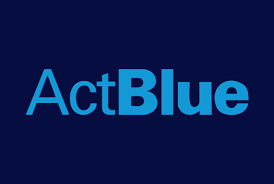
Associated Press via PBS News, Trump wants to investigate  Democrats’ fund-raising but his own campaignhas issues, Brian Slodysko and Steve Peoples, May 27, 2025. When President Donald Trump directed his attorney general last month to investigate online fundraising, he cited concerns that foreigners and fraudsters were using elaborate “schemes“ and “dummy accounts” to funnel illegal contributions to politicians and causes.
Democrats’ fund-raising but his own campaignhas issues, Brian Slodysko and Steve Peoples, May 27, 2025. When President Donald Trump directed his attorney general last month to investigate online fundraising, he cited concerns that foreigners and fraudsters were using elaborate “schemes“ and “dummy accounts” to funnel illegal contributions to politicians and causes.
Instead of calling for an expansive probe, however, the president identified just one potential target: ActBlue, the Democrats’ online fundraising juggernaut, which has acknowledged receiving over 200 potentially illicit contributions last year from foreign internet addresses.
Trump’s announcement contained a glaring omission — his political committees also received scores of potentially problematic contributions.
An Associated Press review of donations to Trump over the past five years found 1,600 contributions from donors who live abroad, have close ties to foreign interests or failed to disclose basic information, often making it difficult, if not impossible, to identify them and verify the legality of their donations Among those was $5,000 linked to a derelict building, and $5,000 from a Chinese businessman who listed a La Quinta Inn as his address. Another sizable donation — $1 million — was made by the wife of an African oil and mining magnate.
 It’s against the law for U.S. candidates and political committees to accept contributions from foreign nationals. Laws also place strict limits on donation amounts and prohibit the laundering of contributions to get around legal caps. For the most part, such donations have been policed by campaigns and the Federal Election Commission, with only the most egregious examples being targeted by federal law enforcement.
It’s against the law for U.S. candidates and political committees to accept contributions from foreign nationals. Laws also place strict limits on donation amounts and prohibit the laundering of contributions to get around legal caps. For the most part, such donations have been policed by campaigns and the Federal Election Commission, with only the most egregious examples being targeted by federal law enforcement.
“This is him taking direct aim at the center of Democratic and progressive fundraising to hamstring his political opponents,” said Ezra Reese, an attorney who leads the political law division at the Elias Law Group, a leading Democratic firm that does not represent ActBlue. “I don’t think there’s any question that they picked their target first. He’s not even pretending.”Trump’s committees collected scores of donations from people living overseas
Democracy Docket, Pro-Democracy Voting Commentary: Ed Martin  was too extreme for GOP senators. Now he’s at DOJ, targeting Trump’s enemies, May 27, 2025. When Trump withdrew Ed Martin Jr. ‘s nomination for U.S. Attorney for the District of Columbia, it came after a growing chorus of Republican senators who found him to be too extreme for the role.
was too extreme for GOP senators. Now he’s at DOJ, targeting Trump’s enemies, May 27, 2025. When Trump withdrew Ed Martin Jr. ‘s nomination for U.S. Attorney for the District of Columbia, it came after a growing chorus of Republican senators who found him to be too extreme for the role.
His work defending Jan. 6 rioters was a bridge too far for Sen. Thom Tillis (R-N.C.), who said he wouldn’t be voting to confirm Martin.
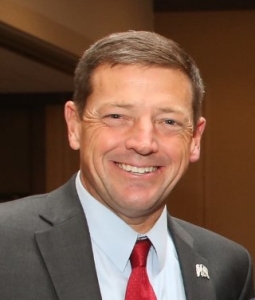 But Martin, right, didn’t fall out of favor with Trump. The president replaced Martin’s nomination as top D.C. prosecutor with Fox News host Jeanine Pirro, and appointed Martin to multiple roles in the DOJ — including the head of a new unit that aims to probe what Trump calls the political “weaponization” of the department under then-President Joe Biden.
But Martin, right, didn’t fall out of favor with Trump. The president replaced Martin’s nomination as top D.C. prosecutor with Fox News host Jeanine Pirro, and appointed Martin to multiple roles in the DOJ — including the head of a new unit that aims to probe what Trump calls the political “weaponization” of the department under then-President Joe Biden.
Trump also appointed Martin as the pardon attorney at DOJ, meaning he’ll advise Trump on who he should pardon. His first pardon on the job? A former Virginia sheriff who was convicted of federal bribery charges. “No MAGA left behind,” Martin wrote of the pardon.
That post, which blatantly undermines the department’s longstanding commitment to apolitical law enforcement, will only add to the worries of some former DOJ attorneys. They  say they’re concerned that Martin will use his new posts to spread disinformation, delegitimize future elections, and target leading Democrats and prosecutors who have pursued Trump. Indeed, it may already be happening.
say they’re concerned that Martin will use his new posts to spread disinformation, delegitimize future elections, and target leading Democrats and prosecutors who have pursued Trump. Indeed, it may already be happening.
As the head of DOJ’s nascent and vague “weaponization working group,” Martin is tasked with leading the department’s investigations into potential abuses of the criminal justice process by current and former officials.
In a February memo announcing the new group, Attorney  General Pam Bondi, right, named former Special Counsel Jack Smith and his staff as a primary subject of investigation, along with New York Attorney General Letitia James (D), Manhattan District Attorney Alvin Bragg (D), and other New York-based officials.
General Pam Bondi, right, named former Special Counsel Jack Smith and his staff as a primary subject of investigation, along with New York Attorney General Letitia James (D), Manhattan District Attorney Alvin Bragg (D), and other New York-based officials.
The department recently launched an inquiry into Andrew Cuomo, the Democratic former New York governor, according to The New York Times. The inquiry comes a month after Martin, as interim U.S. attorney for Washington, D.C., opened an investigation into Cuomo for allegedly making false statements to Congress.
The flurry of probes “should alarm anybody concerned about the rule of law,” Stacey Young, the founder of Justice Connection and a former longtime attorney in the DOJ’s civil rights division, told me. “They seem to be targeting the President’s political enemies, which is antithetical to how the rule of law must work.”
Letters from an American, Historical Commentary: May 26 [Trump Comments  On Memorial Day], Heather Cox Richardson, right, May 27, 2025. President Donald J. Trump’s erratic behavior was on display this weekend in two public speeches: one to this year’s graduates at the U.S. Military Academy at West Point, New York, and the other at Arlington National Cemetery.
On Memorial Day], Heather Cox Richardson, right, May 27, 2025. President Donald J. Trump’s erratic behavior was on display this weekend in two public speeches: one to this year’s graduates at the U.S. Military Academy at West Point, New York, and the other at Arlington National Cemetery.
While both speeches are traditionally nonpartisan, Trump indicated he would make them partisan when he wore a red MAGA hat at West Point.
 The president began both speeches by sticking to a script but then veered off course.
The president began both speeches by sticking to a script but then veered off course.
At West Point on Saturday, his speech went on for over an hour. He attacked diversity, equity, and inclusion programs and said: “The job of the U.S. Armed Forces is not to host drag shows to transform foreign cultures, or to spread democracy to everybody around the world at the point of a gun,” he said. “The military’s job is to dominate any foe and annihilate any threat to America, anywhere, anytime, and any place.”
(In fact, the mission of the Department of Defense is “to provide the military forces needed to deter war and ensure our nation’s security.”)
Lincoln Square Media, Commentary: Tornadoes Don’t Take the Night off, Jennifer Schulze, May  27, 2025. Trump cut the weather experts who sound the alert when the rest of us are sleeping.
27, 2025. Trump cut the weather experts who sound the alert when the rest of us are sleeping.
An EF3 tornado roared through the city of St Louis on Friday, May 16. The 152-mile per hour winds flattened buildings, ripped out power lines, uprooted trees, and even damaged the local zoo. It was the city’s first deadly tornado in 66 years – and it was just one of at least 7 tornadoes that hit multiple states that day.
A little further north, a dust storm reminiscent of the Dust Bowl of the 1930s engulfed Chicago. This multi-day run of severe storms — including over 60-tornadoes — has killed 40+ people and done considerable damage in 13 states and counting. The bad weather continued through Memorial Day Weekend.
Already this year, we’ve had 886 tornadoes, a 35% increase over last year. Plus, hurricane season is right around the corner,too. Seems like a really ridiculous time to be sabotaging the National Weather Service, doesn’t it? But Donald Trump is doing just that.
![]() New York Times, The Trump administration intends to cancel all federal funds directed at Harvard, Stephanie Saul, May 27, 2025. The Trump administration is set to cancel the federal government’s remaining federal contracts with Harvard University — worth an estimated $100 million, according to a letter that is being sent to federal agencies on Tuesday.
New York Times, The Trump administration intends to cancel all federal funds directed at Harvard, Stephanie Saul, May 27, 2025. The Trump administration is set to cancel the federal government’s remaining federal contracts with Harvard University — worth an estimated $100 million, according to a letter that is being sent to federal agencies on Tuesday.
The letter also instructs agencies to “find alternative vendors” for future services.
The additional planned cuts, outlined in a draft of the letter obtained by The New York Times, represented what an administration official called a complete severance of the government’s longstanding business relationship with Harvard.
 The letter is the latest example of the Trump administration’s determination to bring Harvard — arguably the country’s most elite and culturally dominant university — to its knees, by undermining its financial health and global influence.
The letter is the latest example of the Trump administration’s determination to bring Harvard — arguably the country’s most elite and culturally dominant university — to its knees, by undermining its financial health and global influence.
Since last month, the administration has frozen about $3.2 billion in grants and contracts with Harvard. And it has tried to halt the university’s ability to enroll international students.
The letter instructs agencies to respond by June 6 with a list of contract cancellations.

![]() New York Times, Republican Crackdown on Aid to Immigrants Would Hit U.S. Citizens, Madeleine Ngo and Lydia DePillis, May 27, 2025. The Trump administration’s efforts and the G.O.P.’s tax bill aim to restrict benefits for families that include immigrants without permanent legal status.
New York Times, Republican Crackdown on Aid to Immigrants Would Hit U.S. Citizens, Madeleine Ngo and Lydia DePillis, May 27, 2025. The Trump administration’s efforts and the G.O.P.’s tax bill aim to restrict benefits for families that include immigrants without permanent legal status.
Meidas Touch Network, Opinion: This Is What Losing Feels Like,  Michael Cohen, May 27, 2025. Trump’s America doesn’t run on hope or optimism; it runs on vengeance, vanity, and victimhood. Judges are jailed, facts are fake, and freedom is just a slogan on a red hat. Time to end this nonsense!
Michael Cohen, May 27, 2025. Trump’s America doesn’t run on hope or optimism; it runs on vengeance, vanity, and victimhood. Judges are jailed, facts are fake, and freedom is just a slogan on a red hat. Time to end this nonsense!
Trump addressed the graduating class at West Point, America’s premier military academy. A moment that should’ve been about duty, sacrifice, and service to the Constitution. Instead? It turned into a bizarre soliloquy about the size of yachts, the costs of divorce, and how difficult it is to find a “loyal” woman when you’re a “successful” man. Hence, the trophy wife.
We’ve seen the so-called Commander-in-Chief hurl insults at our allies while cozying up to dictators. We’ve watched him undermine the intelligence community—again—this time by suggesting Ukraine provoked Russia with “bad vibes.”
So where does that leave us? It leaves us with a choice: get angry or get active. Or, preferably, both
The institutions we thought would protect us? They’re being gutted, repopulated with loyalists, or turned into corporate subsidiaries of Trump, Inc.
We need to call out the injustices we see every single day.
Because here’s the truth: we can’t afford to wait for “normal” to return. Normal is dead.
Michael Cohen is a bestseller author, host of The Mea Culpa Podcast and former Personal Attorney To President Donald J. Trump.
The Bulwark, Opinion: Trump’s Dangerous Pardon Power, William  Kristol, below right, May 27, 2025. The president’s use of the power, which he deployed again over the weekend, is legal. It’s also a grave threat to the rule of law.
Kristol, below right, May 27, 2025. The president’s use of the power, which he deployed again over the weekend, is legal. It’s also a grave threat to the rule of law.
 In the midst of his administration’s many attacks on the rule of law, Donald Trump’s pardon yesterday of one Virginia sheriff is barely newsworthy. But it is nonetheless a fire bell in the night, a reminder of the breadth and depth of the Trump administration’s assault on our free society.
In the midst of his administration’s many attacks on the rule of law, Donald Trump’s pardon yesterday of one Virginia sheriff is barely newsworthy. But it is nonetheless a fire bell in the night, a reminder of the breadth and depth of the Trump administration’s assault on our free society.

Scott Jenkins, above, the former sheriff of Culpeper County, Virginia, was set to report to jail today.
He’d been convicted in December 2024 by a jury of his peers on one count of conspiracy, four counts of honest services fraud, and seven counts of bribery. Jenkins had accepted more than $75,000 in bribes in exchange for appointing various untrained and unvetted individuals to no-show jobs as auxiliary deputy sheriffs. The evidence was overwhelming, including video of Jenkins accepting bags of cash, the testimony of some of those involved in the scheme, and reports from two undercover FBI agents. In March 2025, Jenkins was sentenced to 10 years in federal prison.
“Scott Jenkins violated his oath of office and the faith the citizens of Culpeper County placed in him when he engaged in a cash-for-badges scheme,” acting United States Attorney Zachary T. Lee said at the time of his sentencing.
But Jenkins was a rabidly anti-immigrant, pro-Trump sheriff who’d become a minor celebrity in MAGA world. Trump  himself may not have known of him, but Ed Martin did.
himself may not have known of him, but Ed Martin did.
Martin, left, you’ll recall, was made Attorney General Pam Bondi’s chief pardon attorney at the Department of Justice after failing to get Senate confirmation as U.S. attorney for the District of Columbia.
![]() New York Times, Trump Pardoned Tax Cheat After Mother Attended $1 Million Dinner, Kenneth P. Vogel, May 27, 2025. Paul Walczak’s pardon application cited his mother’s support for President Trump, including a connection to a plot to publicize a Biden family diary.
New York Times, Trump Pardoned Tax Cheat After Mother Attended $1 Million Dinner, Kenneth P. Vogel, May 27, 2025. Paul Walczak’s pardon application cited his mother’s support for President Trump, including a connection to a plot to publicize a Biden family diary.
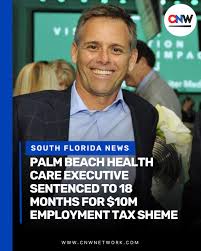
As Paul Walczak, above, awaited sentencing early this year, his best hope for avoiding prison time rested with the newly inaugurated president.
Mr. Walczak, a former nursing home executive who had pleaded guilty to tax crimes days after the 2024 election, submitted a pardon application to President Trump around Inauguration Day. The application focused not solely on Mr. Walczak’s offenses but also on the political activity of his mother, Elizabeth Fago.
Ms. Fago had raised millions of dollars for Mr. Trump’s campaigns and those of other Republicans, the application said. It also highlighted her connections to an effort to sabotage Joseph R. Biden Jr.’s 2020 campaign by publicizing the addiction diary of his daughter Ashley Biden — an episode that drew law enforcement scrutiny.
Mr. Walczak’s pardon application argued that his criminal prosecution was motivated more by his mother’s efforts for Mr. Trump than by his admitted use of money earmarked for employees’ taxes to fund an extravagant lifestyle.
Still, weeks went by and no pardon was forthcoming, even as Mr. Trump issued clemency grants to hundreds of other allies.
Then, Ms. Fago was invited to a $1-million-per-person fund-raising dinner last month that promised face-to-face access to Mr. Trump  at his private Mar-a-Lago club in Palm Beach, Fla.
at his private Mar-a-Lago club in Palm Beach, Fla.
Less than three weeks after she attended the dinner, Mr. Trump signed a full and unconditional pardon.
It came just in the nick of time for Mr. Walczak, sparing him from having to pay nearly $4.4 million in restitution and from reporting to prison for an 18-month sentence that had been handed down just 12 days earlier. A judge had justified the incarceration by declaring that there “is not a get-out-of-jail-free card” for the rich.
_____
Editor’s Note (compiled from wire services): Separately, Trump has also pardoned a Republican former Las Vegas city councilwoman  and state lawmaker from Nevada who was convicted in October of embezzling funds.
and state lawmaker from Nevada who was convicted in October of embezzling funds.
Michele Fiore,  right, was found guilty of six counts of federal wire fraud and one count of conspiracy for raising over $70,000 for the statue of a slain Las Vegas police officer and instead using the money to pay for rent, plastic surgery and her daughter’s wedding.
right, was found guilty of six counts of federal wire fraud and one count of conspiracy for raising over $70,000 for the statue of a slain Las Vegas police officer and instead using the money to pay for rent, plastic surgery and her daughter’s wedding.
 Democracy Docket, Commentary: “Never wrestle with pigs,” Marc Elias, May 27, 2025. It has been two months since Brad Karp, the Chairman of Paul, Weiss, Rifkind, Wharton & Garrison, sent an email to his law firm explaining his reasoning for capitulating to Donald Trump’s demands. Someday, universities will devote entire business and law classes to dissecting the immorality and stupidity of that email and the deals Paul Weiss and other Big Law firms cut.
Democracy Docket, Commentary: “Never wrestle with pigs,” Marc Elias, May 27, 2025. It has been two months since Brad Karp, the Chairman of Paul, Weiss, Rifkind, Wharton & Garrison, sent an email to his law firm explaining his reasoning for capitulating to Donald Trump’s demands. Someday, universities will devote entire business and law classes to dissecting the immorality and stupidity of that email and the deals Paul Weiss and other Big Law firms cut.
For now, it’s enough to say that Karp failed to abide by the advice of George Bernard Shaw: “Never wrestle with pigs. You both get dirty, and the pig likes it.”
Over the weekend, it was reported that conservative groups — including some representing veterans — are looking for Paul Weiss and the other law firms that entered into agreements with Trump to make good on their promise for tens of millions to provide pro bono legal services. This follows Trump’s public musings that he might task the firms with defending police officers accused of misconduct and supporting the coal industry.
While the collaborators who run these law firms might publicly insist that they control what work they accept, firm management is loath to say no to Trump. Skadden Arps reportedly suggested a non-public role in one case brought to them by a conservative media figure.
At some point, Trump will inevitably make such requests public — and Karp and the others will have no choice but to say: “Yes, sir.” They may even have tears in their eyes.
Conservatives and the Trump administration are not Paul Weiss’s biggest problem, however. Key to Karp’s plan was the assumption that, as time passed, the political and legal establishments would look past his decision to cut a deal with Trump. Instead, anger and opposition have only stiffened.
Over the last two months, Paul Weiss has become to capitulation what Kleenex is to facial tissue: a generic term for an institution betraying its industry and its own ideals by making a deal with Trump.
People in higher education debate whether Columbia has become the Paul Weiss of universities. Harvard is lauded for rejecting the path charted by Paul Weiss. The media world is watching to see whether Paramount will take the Paul Weiss route by settling a meritless lawsuit rather than standing by 60 Minutes.
Cornell Daily Sun, No. 1 Men’s Lacrosse Wins Over No. 2 Maryland, Alexis Rogers  and William D. Cawley, May 27, 2025. Takes National Title for First Time Since 1977.
and William D. Cawley, May 27, 2025. Takes National Title for First Time Since 1977.
 The Red took its last national title in 1977, but Cornell hadn’t made it back to the top for almost 50 years — until now.
The Red took its last national title in 1977, but Cornell hadn’t made it back to the top for almost 50 years — until now.
On Monday, the two dynasties met again in the Memorial Day clash as the top seeds in the country. The pressure built up from a rivalry as old as the NCAA Tournament itself came to a head, and after a furious back-and-forth match in front of 32,512 spectators, No. 1 Cornell (18-1, 6-0 Ivy) took a 13-10 victory over No. 2 Maryland (14-4, 3-2 Big 10).
- See also: Inside Lacrosse, SEEING RED: Cornell Beats Maryland For First NCAA Championship Since 1977
May 26

Gravesite in Great Britain of World War II fatality Beau Bryant [Photo by Carole Green.]
Letters from an American, Historical Commentary: May 25 [Memorial Day],  Heather Cox Richardson, right, May 25, 2025. Tomorrow is Memorial Day, the day Americans have honored since 1868, when we mourn those military personnel who have died in the service of the country—that is, for the rest of us.
Heather Cox Richardson, right, May 25, 2025. Tomorrow is Memorial Day, the day Americans have honored since 1868, when we mourn those military personnel who have died in the service of the country—that is, for the rest of us.
For me, one of those people is Beau Bryant.
When we were growing up, we hung out at one particular house where a friend’s mom provided unlimited peanut butter and fluff sandwiches, Uno games, iced tea and lemonade, sympathetic ears, and stories. She talked about Beau, her older brother, in the same way we talked about all our people, and her stories made him part of our world even though he had been killed in World War II 19 years before we were born.
Beau’s real name was Floyston, and he had always stepped in as a father to his three younger sisters when their own father fell short.
When World War II came, Beau was working as a plumber and was helping his mother make ends meet, but in September 1942 he enlisted in the Army Air Corps. He became a staff sergeant in the 322nd Bomber Squadron, 91st Bomb Group, nicknamed “Wray’s Ragged Irregulars” after their commander, Col. Stanley T. Wray. By the time Beau joined, the squadron was training with new B-17s at Dow Army Airfield near Bangor, Maine, and before deploying to England he hitchhiked three hours home so he could see his family once more.
It would be the last time. The 91st Bomb Group was a pioneer bomb group, figuring out tactics for air cover. By May 1943 it was experienced enough to lead the Eighth Air Force as it sought to establish air superiority over Europe. But the 91st did not have adequate fighter support until 1944. It had the greatest casualty rate of any of the heavy bomber squadrons.
Beau was one of the casualties. On August 12, 1943, just a week before his sister turned 18, while he was on a mission, enemy flak cut his oxygen line and he died before the plane could make it back to base. He was buried in Cambridge, England, at the Cambridge American Cemetery and Memorial, the military cemetery for Americans killed in action during WWII. He was twenty years old.
I grew up with Beau’s nephews and nieces, and we made decades of havoc and memories. But Beau’s children weren’t there, and neither he nor they are part of the memories.
Thinking about our untimely dead is hard enough, but I am haunted by the holes those deaths rip forever in the social fabric: the discoveries not made, the problems not solved, the marriages not celebrated, the babies not born.
I know of this man only what his sister told me: that he was a decent fellow who did what he could to support his mother and his sisters. Before he entered the service, he once spent a week’s paycheck on a dress for my friend’s mother so she could go to a dance.
And he gave up not only his life but also his future to protect American democracy against the spread of fascism.
So Beau Bryant, and perhaps all he stood for, will not be forgotten after all.
May you have a meaningful Memorial Day.
The Contrarian, Historical Commentary: What They Died For, Norm Eisen, right, 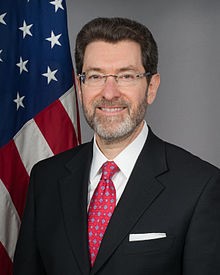 May 26, 2025. Memorial Day has particular meaning for me. I would not be alive if it were not for the US military. It helped
May 26, 2025. Memorial Day has particular meaning for me. I would not be alive if it were not for the US military. It helped  save both my parents in World War II—though in very different ways.
save both my parents in World War II—though in very different ways.
In spring 1945, my mom had been in Nazi captivity for a year—transferred from Auschwitz to a slave labor camp in Neuengamme Germany, packing (and when she could, sabotaging) ammunition. When she was flagging, a friendly jailer whispered to her to hang on—the allies were near. But for the US Armed Forces joining the fight, at terrible cost to so many American soldiers and families, my mom would not have survived.
My Dad’s connection was more direct: he actually served in those forces. He fled Europe for the US in 1940, arrived here with no papers, and enlisted in the Army to become a citizen. Who knows what would’ve become of him if the Army hadn’t welcomed him. While my parents didn’t meet until years after the war (in Israel, of all places), the US military was their godsend, and so mine.
I thought of all that this weekend, as I watched a group of veterans process at the Brown University commencement ceremony (I was there for my 40th reunion). The university has a program for veterans to get college degrees. The diverse platoon was composed of about twenty men and women; short and tall; black, brown, and white; all clad in gowns and mortarboards instead of uniforms or camouflage. They were greeted with cheers and whoops for their own accomplishments, of course, but also for the honor of the extraordinary institution they represent.
The American idea, which they and their absent comrades fought and died for, is being attacked from within this Memorial Day. How do we honor those who died for freedom when we see liberty under attack here at home? How do we salute the flag and that idea of America it stands for, when its meaning is being assaulted daily by the very administration entrusted with its care?
I know some might say we should simply remember our lost soldiers today, without tarnishing that tribute by addressing our political climate. But to my mind, looking away squanders their sacrifice. It is our responsibility to be candid about the crisis and to honor their service more urgently than ever.
We can do that by recommitting ourselves to defending our democracy. To memorialize our veterans’ sacrifices is to attend to the fragile, unfinished work of fighting autocracy and building a country worthy of their service. It is to hold tight to the idea of America, even when its practice falters. To do our part, as they did—not on distant battlefields, but on our streets, among our communities, and in our courthouses.
For me, that mission is informed by a Jewish aphorism that my parents, both saved by American soldiering, would sometimes say to me:
לֹא עָלֶיך הַמְלָאכָה לִיגמוֹר, וְלֹא אַתָּה בֶן חֹרִין לְחִבָּטֵל מִמֶנָה
“Your job is not to finish the work—but neither are you, the child of free people, not to do your share.”
President Trump’s Memorial Day Message Via Truth Social:

Meidas Touch Network, Commentary: Today in Politics, Bulletin 139, Ron  Filipkowsk, right, May 26, 2025. Trump posted a Memorial Day message with this moving tribute to the men and women who paid the ultimate price serving their country in the military (shown above and below):
Filipkowsk, right, May 26, 2025. Trump posted a Memorial Day message with this moving tribute to the men and women who paid the ultimate price serving their country in the military (shown above and below):
“HAPPY MEMORIAL DAY TO ALL, INCLUDING THE SCUM THAT SPENT THE LAST FOUR YEARS TRYING TO DESTROY OUR COUNTRY THROUGH WARPED RADICAL LEFT MINDS, WHO ALLOWED 21,000,000 MILLION PEOPLE TO ILLEGALLY ENTER OUR COUNTRY, MANY OF THEM BEING CRIMINALS AND THE MENTALLY INSANE, THROUGH AN OPEN BORDER THAT ONLY AN INCOMPETENT PRESIDENT WOULD APPROVE, AND THROUGH JUDGES WHO ARE ON A MISSION TO KEEP MURDERERS, DRUG DEALERS, RAPISTS, GANG MEMBERS, AND RELEASED PRISONERS FROM ALL OVER THE WORLD, IN OUR COUNTRY SO THEY CAN ROB, MURDER, AND RAPE AGAIN — ALL PROTECTED BY THESE USA HATING JUDGES WHO SUFFER FROM AN IDEOLOGY THAT IS SICK, AND VERY DANGEROUS FOR OUR COUNTRY.” (Shown below:)
… He then made a post telling people to “ENJOY!!!” his speech at Arlington National Cemetery: “I will be making a Memorial Day Speech at Arlington at 11:00 AM. ENJOY!!!”
… Trump voter and former talk show host John Cardillo: “Sorry, but this is grossly inappropriate. There is nothing happy about Memorial Day. And the rest of it on this day is just unbecoming for a Commander-in-Chief. Sad part is pretty much everyone feels the same, but too many are terrified to speak up.”
… In his speech at Arlington before Trump, SecDef Pete Hegseth, who repeatedly expressed hostility in the past to women serving, refused to acknowledge them: “The American soldier fights not because he hates what is in front of him, but because he loves what is behind him. We honor his sacrifice, his courage, his duty, and his love. The young men with hopes and dreams and loves is called by his country, leaves behind his hometown, his parents, his siblings, his sweetheart, all that he knows to go fight a war that he may or may not understand.” (Emphasis added.)
… Trump went about as far as he has ever gone towards criticizing Putin a little bit when he was asked about recent bombings after Ukraine signed the cease fire agree ment: “I’m not happy with what Putin is doing. He’s killing a lot of people and I don’t know what the hell happened to Putin. I’ve known him a long time. We’re in the middle of talking and he’s shooting rockets into Kyiv and other cities. I don’t like it at all. I’m surprised.”
ment: “I’m not happy with what Putin is doing. He’s killing a lot of people and I don’t know what the hell happened to Putin. I’ve known him a long time. We’re in the middle of talking and he’s shooting rockets into Kyiv and other cities. I don’t like it at all. I’m surprised.”
… If he really is surprised, he’s the only one who is surprised.
… Fox Chief Political Analyst Brit Hume: “Glad to hear President Trump say this, but Putin hasn’t changed. He’s always been a brutal tyrant.”
… In other words, Trump promised repeatedly during the campaign that he had a secret plan to end the war in 24 hours and he was just bullshitting everyone because he doesn’t have the first clue what to do, he gave away all negotiating leverage months ago when he agree up front to most of what Russia was asking for before negotiations even began, and his special envoy Steve Witkoff is a dope.
… Witkoff, the man Trump entrusted to negotiate an end to the war, has never been a diplomat, never served in the military, never worked in govt at any capacity, and is not a historian or expert on affairs in the region. He got the job because he is a wealthy real estate investor pal of Trump’s from NYC and Witkoff’s son is a major player in the crypto industry, which is now Trump’s largest source of revenue.
… Witkoff has also not taken a single person from the State Dept with him during any of his 4 meetings with Putin and even used a Kremlin translator because he didn’t bring his own. Why has this been a disaster? Because Trump and Witkoff are incompetent clowns.
 Paul Krugman via Substack, Commentary: The Economic Consequences of Destroying Harvard, Paul Krugman, right, May 26, 2025. Harvard is easy to dislike. It’s rich. It’s elitist. It rejected my application back when I was a high school senior.
Paul Krugman via Substack, Commentary: The Economic Consequences of Destroying Harvard, Paul Krugman, right, May 26, 2025. Harvard is easy to dislike. It’s rich. It’s elitist. It rejected my application back when I was a high school senior.
 But the Trumpist effort to destroy Harvard and other elite universities — for that is clearly their intention — will do vast damage to our nation’s future.
But the Trumpist effort to destroy Harvard and other elite universities — for that is clearly their intention — will do vast damage to our nation’s future.
The most important aspect of this campaign of intimidation and disruption is, of course, the attack on freedom of thought. I hope that nobody actually believes the MAGA line that universities are indoctrinating their students in wokeness, DEI, Marxism, whatever. The real complaint, obviously, is that these institutions aren’t indoctrinating their students — that they are exposing young people to a variety of ideas and encouraging them to think for themselves, when they should be preaching right-wing dogma and obedience to whatever The Leader says they should believe.
Given this terrifying reality of the Trumpian war on learning, indeed on scientific thought itself, it may seem crass to examine the economic consequences of the attacks on higher education. Yet it’s important to understand that these consequences will also be disastrous – both for the current economy and for the economy’s long-term future.
 Harvard is a major U.S. exporter. The foreign students that the Trump administration is trying to ban usually pay their own tuition — money that shows up as a credit in the US trade balance. But arguably the much larger issue is that Harvard is a crucial element within the Greater Boston economy. This regional economy is one of the crown jewels of the U.S. economy, one of the most important generators of high incomes, specialized knowledge and innovation.
Harvard is a major U.S. exporter. The foreign students that the Trump administration is trying to ban usually pay their own tuition — money that shows up as a credit in the US trade balance. But arguably the much larger issue is that Harvard is a crucial element within the Greater Boston economy. This regional economy is one of the crown jewels of the U.S. economy, one of the most important generators of high incomes, specialized knowledge and innovation.
![]() New York Times, Campus Crackdown: Trump Suggests Giving Trade Schools Money Taken From Harvard, Stephanie Saul, May 26, 2025. In a social media post, the president mused about redirecting $3 billion in research grant funding that his administration has frozen or withdrawn, but he gave no details.
New York Times, Campus Crackdown: Trump Suggests Giving Trade Schools Money Taken From Harvard, Stephanie Saul, May 26, 2025. In a social media post, the president mused about redirecting $3 billion in research grant funding that his administration has frozen or withdrawn, but he gave no details.
President Trump floated a new plan on Monday for the $3 billion he wants to strip from Harvard University, saying in a social media post that he was thinking about using the money to fund vocational schools.
“I am considering taking THREE BILLION DOLLARS of Grant Money away from a very antisemitic Harvard, and giving it to TRADE SCHOOLS all across our land,” Mr. Trump posted on Truth Social, his social media platform.
![]() The announcement, among the president’s Memorial Day social media messages, did not appear to refer to any new cut in funding, but rather to a redistribution of money the administration already announced it had frozen or stripped from Harvard and its research partners.
The announcement, among the president’s Memorial Day social media messages, did not appear to refer to any new cut in funding, but rather to a redistribution of money the administration already announced it had frozen or stripped from Harvard and its research partners.
Mr. Trump gave no details about how such a plan would work.
The message was accompanied by yet another post accusing Harvard of being slow to respond to the administration’s requests for information on “foreign student lists.” Mr. Trump said his administration wanted them in order to determine how many “radicalized lunatics, troublemakers all, should not be let back into our Country.”
The posts seemed intended to keep up public relations pressure on Harvard, the nation’s oldest and wealthiest university. Harvard is engaged in an epic battle with the White House, rooted in the administration’s claims that the university tolerates antisemitism and promotes liberal ideology.
Harvard declined on Monday to comment on the president’s post.
The university is battling the White House in federal court in Boston to secure the reinstatement of grants and contracts that the government has frozen or withdrawn, amounting to more than $3 billion. In a separate lawsuit, the university is also fighting Mr. Trump’s plan to take away the university’s right to admit international students.
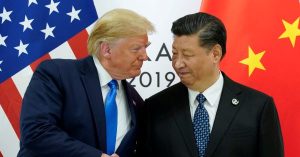
President Trump and China’s leader Xi Jinping at a 2019 meeting.
![]() New York Times, Analysis: Trump’s Vision: One World, Three Powers? Edward Wong, May 26, 2025. President Trump’s recent actions and statements suggest he might want an arrangement where the U.S., China and Russia each dominates its sphere of influence.
New York Times, Analysis: Trump’s Vision: One World, Three Powers? Edward Wong, May 26, 2025. President Trump’s recent actions and statements suggest he might want an arrangement where the U.S., China and Russia each dominates its sphere of influence.
 For President Trump, anytime is a good time for deal-making, but never more so than now with the leaders of China and Russia.
For President Trump, anytime is a good time for deal-making, but never more so than now with the leaders of China and Russia.
Last week, Mr. Trump said he wanted to normalize commerce with Russia, appearing to lessen the pressure on Moscow to settle its war with Ukraine. And he is trying to limit the fallout from his own global trade war by urging China’s leader to call him.
“We all want to make deals,” Mr. Trump said in a recent interview with Time magazine. “But I am this giant store. It’s a giant, beautiful store, and everybody wants to go shopping there.”
Mr. Trump may have something even bigger in mind involving Russia and China, and it would be the ultimate deal.
His actions and statements suggest he might be envisioning a world in  which each of the three so-called great powers — the United States, China and Russia — dominates its part of the globe, some foreign policy analysts say.
which each of the three so-called great powers — the United States, China and Russia — dominates its part of the globe, some foreign policy analysts say.
It would be a throwback to a 19th-century style of imperial rule.
Mr. Trump has said he wants to take Greenland from Denmark, annex Canada and re-establish American control of the Panama Canal. Those bids to extend U.S. dominance in the Western Hemisphere are the clearest signs yet of his desire to create a sphere of influence in the nation’s backyard.

![]() New York Times, News Analysis, For Trump, Civil Rights Protections Should Help White Men, Erica L. Green, May 26, 2025. Administration officials pick and choose which civil rights protections they want to enforce, and for whom.
New York Times, News Analysis, For Trump, Civil Rights Protections Should Help White Men, Erica L. Green, May 26, 2025. Administration officials pick and choose which civil rights protections they want to enforce, and for whom.
In his drive to purge diversity efforts in the federal government and beyond, President Trump has expressed outright hostility to civil rights protections.
 He ordered federal agencies to abandon some of the core tenets of the Civil Rights Act of 1964, on the basis that they represented a “pernicious” attempt to make decisions based on diversity rather than merit.
He ordered federal agencies to abandon some of the core tenets of the Civil Rights Act of 1964, on the basis that they represented a “pernicious” attempt to make decisions based on diversity rather than merit.
But in recent weeks, Mr. Trump has turned to those same measures — not to help groups that have historically been discriminated against, but to remedy what he sees as the disenfranchisement of white men.
The pattern fits into a broader trend in the administration, as Trump officials pick and choose which civil rights protections they want to enforce, and for whom. Across the government, agencies that have historically worked to fight discrimination against Black people, women and other groups have pivoted to investigating institutions accused of favoring them.
“The plain message that they are conveying is: If you even think about, talk about or claim to be in favor of diversity, of equity, of inclusion, of accessibility, you will be targeted,” said Maya Wiley, the president and chief executive of the Leadership Conference on Civil and Human Rights.
“They’re conveying that white men are the most discriminated against people in American society,” she added, “and therefore entitled to affirmative action.”

A crater in a residential area in Odesa, Ukraine, after a drone strike, on Sunday (Reuters photo by Nina Liashonok)
![]() New York Times, Russia Intensifies Attacks on Ukraine as U.S. Steps Back, Marc Santora, May 26, 2025. With diplomatic efforts to reach a cease-fire appearing remote, and President Trump apparently abandoning the process, Russia has been escalating its assaults on Ukrainian cities and on the battlefield.
New York Times, Russia Intensifies Attacks on Ukraine as U.S. Steps Back, Marc Santora, May 26, 2025. With diplomatic efforts to reach a cease-fire appearing remote, and President Trump apparently abandoning the process, Russia has been escalating its assaults on Ukrainian cities and on the battlefield.
Russia unleashed yet another massive aerial bombardment aimed at Ukrainian cities and towns before dawn on Monday, pressing its advantage as the United States increasingly removes itself from the conflict and diplomatic efforts to end it.
 At least 355 Russian drones swarmed the skies across Ukraine and bombers unleashed nine missiles, Ukraine said. The attack followed criticism by President Trump of President Vladimir V. Putin of Russia, whom he accused on social media of going “absolutely CRAZY” in his bid to conquer Ukraine.
At least 355 Russian drones swarmed the skies across Ukraine and bombers unleashed nine missiles, Ukraine said. The attack followed criticism by President Trump of President Vladimir V. Putin of Russia, whom he accused on social media of going “absolutely CRAZY” in his bid to conquer Ukraine.
But Mr. Trump, speaking to reporters before boarding Air Force One on Sunday, gave no indication that he is willing to provide Ukraine with military assistance. He also declined to answer questions about whether the attacks will lead to a change in policy.
Over the past week, Russia has directed at least 1,390 drones and 94 missiles at targets across Ukraine, the Ukrainian Air Force said. The attacks have killed at least 30 civilians and injured more than 163, Ukraine says.
The campaign comes a week after Mr. Trump spoke to Mr. Putin by telephone and appeared ready to abandon his efforts to secure a cease-fire.

U.S. Army Spc. Seth Wymer, with the 3rd Infantry Regiment (The Old Guard), and a sentinel at the Tomb of the Unknowns, places a U.S. flag at the foot of one of four crypts at Arlington National Cemetery in Arlington, Va., May 23, 2013. |Department of Defense photo by Staff Sgt. Megan Garcia, U.S. Army]
Lincoln Square Media, Opinion: Look in the Mirror: Are We Worth their Sacrifice?  Evan Fields (a veteran who writes the News from Underground Substack), May 26, 2025. With our country adrift, Memorial Day is losing its meaning for too many.
Evan Fields (a veteran who writes the News from Underground Substack), May 26, 2025. With our country adrift, Memorial Day is losing its meaning for too many.
Memorial Day is an opportunity for us to reflect not only on the dead and their sacrifice, but on ourselves. An opportunity for us to look in the mirror and ask some uncomfortable questions:
- Do we vote in every election — or only when it feels urgent?
- Do we speak up when power is being abused — or wait for someone else to?
- Do we fight for truth — or just amplify outrage?
- Do we protect liberty and justice for all — or just those who look like us?
These holidays become a reminder that patriotism becomes performance and not a series of actions for the greater good. Patriotism doesn’t look like flags on trucks, slogans on shirts, or fireworks on the fourth of July. Patriotism is espousing and honoring the values that we are supposed to be reflecting on this weekend.


The Hartmann Report, Opinion: Why Corruption Always Breeds Tyranny: Lessons from Trump’s Second-Term Playbook, Thom Hartmann, right, May 26, 2025. The  chilling similarities to past tyrants—and why America can’t look away anymore…
chilling similarities to past tyrants—and why America can’t look away anymore…
“All tyrannies rule through fraud and force, but once the fraud is exposed they must rely exclusively on force.” — George Orwell
It’s axiomatic that dictators are corrupt. But understanding the inevitable relationship between corruption and dictatorship — and how it flows in both directions — is essential to understanding the direction the Trump Crime Family is taking America.
First, it’s important to know that there’s no such thing as a dictator who’s not corrupt. Every dictator in world history, with the possible exception of Cincinnatus, has been massively corrupt.
To defy public opinion while skimming wealth out of the state’s coffers and public commons, national leaders must use the typical tools of dictatorship to intimidate good government advocates into silence: violence, threats, capture of police agencies and courts, intimidation of the press, cowing politicians, and prisons.
I’ve worked in and negotiated with governments in multiple countries where this was the plain reality: Uganda under Amin, Haiti, The Philippines under Marcos, Thailand during the military coup, Colombia, Peru, Russia, South Sudan, China in the 1980s, and a handful of others.
In every case the media was cowed, courts were run by sycophants loyal to Dear Leader, and the police were largely unaccountable to the people while kleptocrats shoveled fortunes into offshore banks and American or British real estate (we are only one of two developed countries in the world that allows anonymous shell companies to “invest” in real estate).
Less obvious, though, is how politicians in functioning democracies become dictators in order to protect their own corrupt attempts to profit off their leadership roles and loot the national purse.
Americans are particularly blind to this, as we’ve never had a president who publicly attempted to use his position of power to enrich himself (even Nixon had the good sense to try to hide the bribes he took from the milk lobby and Jimmy Hoffa).
Looking at how this works in other countries, however, reveals the pattern.
First, the democratically elected leader takes power, like Putin did in Russia and Orbán did in Hungary.
In the beginning, things seem relatively normal, although there’s an apparent zeal for “reforms” that seem questionable like replacing government functions with private contractors close to the leader, appointing incompetent but totally loyal toadies to run major essential agencies, and changes to election laws making it easier for wealthy people to buy elections and harder for democracy advocates to vote.
Those “reforms” are the early warnings that, if not stopped quickly, a dictatorship is being birthed.
Next come loud complaints about “fake news,” “enemies within the government,” and “activist judges”: This is the second major warning that the newly elected leader is trying to move the country toward authoritarianism.
Once the public is inured to these signals, the next step is for the leader to actively convert his position of political power into cash for himself, his family (inevitably: remember Saddam’s sons Uday and Qusay?), and the oligarchs he’s brought into his circle of power.
He sells access to himself and the senior levels of his government using barely-legal schemes, bestows favors to corrupt foreign nations and their leaders in exchange for their enriching his family, and systematically replaces judges and agency heads with people whose first loyalty (and, often, financial interest) is to him personally rather than the nation or the rule of law.
This last point is key, and why virtually every senior official in every corrupt foreign government I’ve ever met or negotiated with wasn’t particularly bright and definitely wasn’t qualified to hold the position of power they did.
This is where we are now in America. Our:
—  Secretary of Homeland Security, right, doesn’t know what habeas corpus is,
Secretary of Homeland Security, right, doesn’t know what habeas corpus is,
— Secretary of State refuses to call Putin a war criminal (after demanding, years ago, that Rex Tillerson in that same position do so),
— Secretary of Education is a billionaire wrestling promoter,
— Lead negotiator with Putin about Ukraine is a real estate billionaire friend of Trump with no diplomatic experience,
— Secretary of Transportation is a reality TV star with no experience in that field,
— Secretary of Defense is a drunk and accused rapist who ran two tiny veterans’ organizations into the ground,
— Secretary of Health is a conspiracy-nut lawyer with no training in medicine,
— Social Security Commissioner is a former Wall Street executive who had to google his own new job description,
— EPA Administrator is a former congressman with deep connections to the fossil fuel industry,
— Secretary of the Interior was heavily invested in fossil fuels,
— US Attorney for New Jersey is a former parking garage lawyer, etc.
During his first term, Trump followed the advice of people entrenched in the federal bureaucracy and repeatedly appointed people with reasonable qualifications for their jobs. One after another, from Comey to Tillerson to Sessions and beyond, when they refused to swear personal loyalty to Trump or help him promote corrupt schemes he fired them.
This time, following what could be called the “Putin Rule,” Trump has put 13 of his billionaire buddies in his cabinet and stocked his senior-most roles in critical federal agencies with incompetent but reliably loyal bootlickers.
This illustrates how a wannabe dictator becomes a real dictator. If he’s committed to enriching himself at the public trough (as all dictators are), he really has no choice: he must crack down when his corruption and violations of law are called out.
This is how dictators are always created, at least every one in countries I’ve interacted with.
Meidas Touch Network, Opinion: Meidas Founder Delivers Memorial Day  Message, Ben Meiselas, May 26, 2025. Today we honor the American soldiers who made the ultimate sacrifice for our country.
Message, Ben Meiselas, May 26, 2025. Today we honor the American soldiers who made the ultimate sacrifice for our country.
My grandpa Murray Golden (hence our slogan, “Truth is Golden”), who passed away almost 20 years ago, was a tail gunner in World War II. He was a Purple Heart recipient.
When we would go fishing in his small pond in Boca, Florida, he would share with me the stories of those he served with who didn’t make it back home. It was very emotional and left a lasting impression on me. I always think about that on Memorial Day.
I always reflect on the bravery of those who fought and died for our country, and I hope that in some small way I am making them proud by building out this network.
Memorial Day also marks the unofficial start of summer. You’ve heard me call it this before, but this will be known as “Democracy Summer.” We are going to see the largest mass peaceful protests in the history of the country. I can tell that’s where we are headed.
The Trump regime has done so much to hurt the people of this country that we will need a collective release of our anger that will also be anchored by our love. The big protest coming up is the No Kings Protest on June 14, where I expect millions of people across the country will show up. Protests will continue to grow from there. We are in touch with all the organizers and will be on the frontlines and embedded to give you the coverage corporate news wants to cover up.
![]() New York Times, Analysis: Trump Delays Imposing 50 Percent Tariffs on
New York Times, Analysis: Trump Delays Imposing 50 Percent Tariffs on  E.U. Alan Rappeport and Ana Swanson, May 26, 2025 (print ed.) President Trump said on Sunday that he would delay imposing 50 percent tariffs on all imports from the European Union until July 9 to allow more time for trade negotiations.
E.U. Alan Rappeport and Ana Swanson, May 26, 2025 (print ed.) President Trump said on Sunday that he would delay imposing 50 percent tariffs on all imports from the European Union until July 9 to allow more time for trade negotiations.
May 24
 Cornell Daily Sun, ‘Ithaca Will Always Be Your Home’: Kotlikoff Addresses and Confers Degrees to Class of 2025, Zeinab Faraj, May 24, 2025. Despite the wet, windy and rainy conditions on Saturday, more than 8,000 graduates for Cornell’s 157th Graduating Class gathered at Schoellkopf Field to receive conferments of their degrees from President Michael Kotlikoff.
Cornell Daily Sun, ‘Ithaca Will Always Be Your Home’: Kotlikoff Addresses and Confers Degrees to Class of 2025, Zeinab Faraj, May 24, 2025. Despite the wet, windy and rainy conditions on Saturday, more than 8,000 graduates for Cornell’s 157th Graduating Class gathered at Schoellkopf Field to receive conferments of their degrees from President Michael Kotlikoff.
 In his address to the class, Kotlikoff, right, told the stories of the founders of Cornell, Ezra Cornell and Andrew Dickson White and explained the divisions the University has faced over the last few years.
In his address to the class, Kotlikoff, right, told the stories of the founders of Cornell, Ezra Cornell and Andrew Dickson White and explained the divisions the University has faced over the last few years.
“Today, our nation is confronting old differences, amplified in new ways,” Kotlikoff said. “Each of us is invited every day … into private worlds built only for us, where we hear only the opinions we agree with, see only the stories we want to read, and watch only news that an algorithm predicts will click on and like.”
Kotlikoff affirmed that Cornell’s founders and motto of “any person, any study” was designed to confront differences and for students and have a community that would allow discourse and disagreements.
Kotlikoff’s address follows a school year full of student demonstrations and protests amid the ongoing war in Gaza, the recent cancellation of Kehlani’s invitation to Slope Day and the freezing of over $1 billion to Cornell from the Trump administration.

![]() New York Times, Trump Seeks Extensive Student Data in Pressure Campaign to Control Harvard, Michael C. Bender, May 24, 2025 (print ed.). Harvard and the federal government are locked in a battle that boils down to turning over records on international students. But Harvard says it is also about the First Amendment.
New York Times, Trump Seeks Extensive Student Data in Pressure Campaign to Control Harvard, Michael C. Bender, May 24, 2025 (print ed.). Harvard and the federal government are locked in a battle that boils down to turning over records on international students. But Harvard says it is also about the First Amendment.
The latest confrontation between Harvard University and the Trump administration began last month with a far-reaching demand for data on international students.
 Kristi Noem, right, the secretary of the Department of Homeland Security, sent a letter to Harvard requesting, among other things, coursework for every international student and information on any student visa holder involved in misconduct or illegal activity.
Kristi Noem, right, the secretary of the Department of Homeland Security, sent a letter to Harvard requesting, among other things, coursework for every international student and information on any student visa holder involved in misconduct or illegal activity.
 Harvard rebuffed parts of the request, and the Trump administration retaliated on Thursday. In one of its most aggressive moves so far against the university, the government said Harvard could no longer enroll any international students, who account for about one-fourth of its total enrollment.
Harvard rebuffed parts of the request, and the Trump administration retaliated on Thursday. In one of its most aggressive moves so far against the university, the government said Harvard could no longer enroll any international students, who account for about one-fourth of its total enrollment.
It also expanded its request for records to include any videos of international students, on campus or off, involved in protests or illegal or dangerous activity.
The conflict has only further raised the stakes over the future of America’s oldest and most powerful university.
The administration’s attempt to vacuum up vast amounts of private student data opens a new front in Mr. Trump’s crackdown on dissent from his political agenda. The strategy is aimed at realigning a higher education system the president sees as hostile to conservatives by stamping out what it says is antisemitism on campus and the transgender and diversity policies it says are rooted in “woke” ideology.
Harvard counters that it has provided all the data that is legally required and that the administration’s unrelenting pressure campaign — including the termination of billions in federal research grants — amounts to an attempted takeover of the institution, bullying the university into changing what it can teach and whom it can hire.
Harvard said the government’s latest action “is the culmination of an unprecedented and retaliatory attack” on the school’s freedom of speech.
![]() New York Times, Trump Gives Commencement Address at West Point, Stressing a New Era, Erica L. Green, May 24, 2025. The president said the graduating cadets would enter a service no longer subject to “absurd
New York Times, Trump Gives Commencement Address at West Point, Stressing a New Era, Erica L. Green, May 24, 2025. The president said the graduating cadets would enter a service no longer subject to “absurd  ideological experiments” or “nation-building crusades.”
ideological experiments” or “nation-building crusades.”
President Trump told cadets in a commencement address at the United States Military Academy at West Point on Saturday that they were the first graduates to serve in a “golden age” of the nation that was a result of his efforts to rebuild the military and reshape American society.
Gone are the “nation-building crusades” in countries that “wanted nothing to do with us” and leadership that subjected service-members to “absurd ideological experiments here and at home,” Mr. Trump told the group of about 1,000 cadets.
 Wearing his red “Make America Great Again” hat, Mr. Trump leaned into his aggressive agenda to purge diversity, equity and inclusion programs from the government, military and virtually every facet of American life to make the pitch that the nation is worth fighting for again. He drew applause from guests at times, such as when he discussed the issue of transgender athletes playing in female sports and hiring on merit over diversity.
Wearing his red “Make America Great Again” hat, Mr. Trump leaned into his aggressive agenda to purge diversity, equity and inclusion programs from the government, military and virtually every facet of American life to make the pitch that the nation is worth fighting for again. He drew applause from guests at times, such as when he discussed the issue of transgender athletes playing in female sports and hiring on merit over diversity.
At the outset of his second term, he issued a spate of executive orders targeting programs and policies that have helped address systemic racism, which he deemed divisive and unpatriotic.
He claimed that his predecessors had “subjected the armed forces to all manner of social projects and political causes, while leaving our borders undefended and depleting our arsenals to fight other countries’ wars.”
“All of that’s ended. It’s ended strongly,” he said. ”They’re not even allowed to think about it anymore.”
Mr. Trump’s crusade against diversity has been particularly pronounced in the military, where there has been an aggressive erasure of the valor of Black, female and other groups, down to eliminating and obscuring content honoring those buried at Arlington National Cemetery.
MeidasTouch Network, Opinion: Bloomberg Just Gave US MIDDLE FINGER…I AM PISSED!! Ben Meiselas, May 25, 2025. I am pissed. I usually like the work of  many Bloomberg writers, especially in the business and podcast space. But I just saw that one of their writers posted
many Bloomberg writers, especially in the business and podcast space. But I just saw that one of their writers posted  the most insane state regime propaganda for Trump, and I am livid!
the most insane state regime propaganda for Trump, and I am livid!
A Bloomberg reporter whose beat is the environment and energy reported on Trump’s unhinged and barely coherent speech today before Army grads at West Point. She acted like Trump gave a normal speech and said Trump’s advice to the Army grads was “do what you love, think big, work hard and never give up…”
Now, I watched that whole damn speech. I reported on it here.

It was unadulterated fascist insanity. He talked about “trophy wives,” lied about Obama and defamed him by claiming he gave hypersonic military secrets to Russia, said he doesn’t like stealth technology, and attacked the transgender community. Throughout the whole speech, Trump was wearing a red political campaign hat as well.
Seriously, what the hell is wrong with these people?!!
I am just flabbergasted and aghast at the media impulse to take Trump’s sickening behavior and frame it through some normal lens while he tries to destroy our country and our free press. Are they auditioning for a job on Fox?!! Do they love his fascist, putrid scent?!!
CNN, Colleges are canceling affinity graduations due to anti-DEI policies,  Nicquel Terry Ellis, May 24, 2025. Here is how students are preserving the traditions.
Nicquel Terry Ellis, May 24, 2025. Here is how students are preserving the traditions.
Harvard is among several universities across the country that have canceled affinity graduations amid threats from President Donald Trump to block medical research funding and revoke accreditation from schools that don’t end diversity, equity and inclusion practices. Trump decries these programs as “illegal and immoral discrimination.”
Affinity graduations are optional events typically led by students to celebrate different student identities and ethnicities. Commonly held ceremonies often honor Black, Hispanic, Asian, first-generation and LGBTQ+ students. Students say the events are significant because they honor the music, apparel, food, history, language and traditions unique to their identity.

Lincoln Square Media, Legal Commentary: Can We Trust Courts to Stop Trump’s Lawlessness? Sam Bagenstos (Professor of law and public policy, May 25, 2025.  The harms that Trump is causing — to our people, our polity, our politics, and so much more — go well beyond any possible violations of law.
The harms that Trump is causing — to our people, our polity, our politics, and so much more — go well beyond any possible violations of law.
Just following the mass of litigation against the second Trump Administration can be a full-time job.
One leading tracker currently identifies 244 distinct cases filed against the administration. Many of these cases have been through multiple stages: temporary restraining orders, preliminary injunctions, summary judgment motions, enforcement and contempt proceedings, and appeals (and requests for stays) at each stage — in a number of instances going all the way to the Supreme Court.
And Trump’s been back in office for a mere four months!
Even the past weeks have been dizzying. On May 16, the Supreme Court issued its latest ruling in A.A.R.P. v. Trump. (The letters “A.A.R.P.” here are the initials of the person who filed the lawsuit, not the well-known advocacy organization for older Americans.) The Court seemed to take a strong stand against Trump’s mass deportations. It issued an injunction preventing the deportation of immigrants under the Alien Enemies Act without due process, and it held that “notice roughly 24 hours before removal, devoid of information about how to exercise due process rights to contest that removal, surely does not pass muster.”
Yet on May 19 — the very next business day — the Court issued an order that had the effect of removing “Temporary Protected Status” from over 300,000 Venezuelan immigrants, thus clearing an obstacle to their deportation. As one leading immigration lawyer noted, “This is the largest single action stripping any group of non-citizens of immigration status in modern U.S. history. That the Supreme Court authorized it in a two-paragraph order with no reasoning is truly shocking.” Only Justice Ketanji Brown Jackson noted her dissent.
And on May 22, the Court issued an order that all but overrules a 90-year-old precedent upholding statutes that protect the members of independent agencies from being fired at will by the President. The Court’s order aggressively supported Trump’s efforts to eliminate independent sources of authority within the government who might stand up to him.
Former General Counsel of the Office of Management and Budget and the Department of Health and Human Services under President Biden).
Paul Krugman via Substack, Economic Commentary: What Deindustrialization  Can Teach Us About The Effects of AI on Workers, Paul Krugman, right, May 25, 2025. (Editor’s Note: This column begins with a futuristic prediction by novelist Kurt Vonnegut, who had been a Cornell Daily Sun editor before serving in World War II and then undertaking work at a major General Electric industrial plant).
Can Teach Us About The Effects of AI on Workers, Paul Krugman, right, May 25, 2025. (Editor’s Note: This column begins with a futuristic prediction by novelist Kurt Vonnegut, who had been a Cornell Daily Sun editor before serving in World War II and then undertaking work at a major General Electric industrial plant).
In 1952 Kurt Vonnegut published “Player Piano,” a cautionary tale about the social consequences of automation. In his vision, pre-programmed machines would eliminate the need for workers, leading to a society  plagued by mass unemployment and anomie.
plagued by mass unemployment and anomie.
He was basically right about technology. We haven’t done away completely with the need for human workers in manufacturing, but U.S. manufacturing produced almost 10 times as much in 2024 as it had in 1947 while employing 10 percent fewer workers.
But he was completely wrong about technological progress causing mass unemployment. More than 70 years after Player Piano, the percentage of Americans in their prime working years with jobs was far higher than when he wrote.
True, this was largely because far more women entered the paid work force. But the important insight is that despite automation the vast majority of Americans seeking jobs continued to find them.
This may seem like a debate about history. But much of what Vonnegut and others said in the 1950s about the devastating effects automation would have on workers is echoed, almost word for word, in what many people are saying now about the employment effects of AI. Now as then there are pervasive warnings of a job apocalypse that will leave much of the population surviving, if at all, on government handouts.
Yet fears that technology can destroy some jobs aren’t misguided. In fact, last week I argued that technology-driven productivity growth, rather than globalization, is the main reason employment in manufacturing has declined from around 30 percent of the work force in the 1950s to less than 10 percent today.
But while technology can and has destroyed some jobs, even whole occupations, it has never led to mass unemployment. And it probably never will, because other jobs have always emerged to replace those that have been lost. This phenomenon of technology-induced job creation alongside job destruction is inherent in the logic of how the economy works.
Which is not to say that no one is hurt in the process. Technological progress — like international trade — makes the economy richer as a whole but often makes some people, possibly millions of people, worse off. That is, overall incomes may rise, but there are almost always losers as well as winners. And it’s a policy choice whether to use some of the economy’s increased bounty to help some of those who are hurt.

![]() New York Times, Judge Orders Trump Officials to Seek Return of Guatemalan Man to U.S., Mattathias Schwartz, May 24, 2025. Judge Brian Murphy criticized the government for errors in the case and said the man, who feared persecution if he was deported, was likely to show “his removal lacked any semblance of due process.”
New York Times, Judge Orders Trump Officials to Seek Return of Guatemalan Man to U.S., Mattathias Schwartz, May 24, 2025. Judge Brian Murphy criticized the government for errors in the case and said the man, who feared persecution if he was deported, was likely to show “his removal lacked any semblance of due process.”
A federal judge ordered the Trump administration late Friday night to facilitate the return of a Guatemalan man who had been deported to Mexico, despite fearing persecution and having told U.S. authorities about the violence he had experienced there.
The man, known by the initials O.C.G., is gay and is now living in hiding in Guatemala, “in constant panic and constant fear,” according to a sworn declaration. “I can’t be gay here, which means I cannot be myself.”
The ruling, by Judge Brian E. Murphy of the U.S. District Court in Boston, criticized the government for first claiming that O.C.G. had said he was not afraid of being sent to Mexico, where he said he was raped and held captive, but later admitting that it was “unable to identify” the officials to whom he had supposedly made that statement.
Judge Murphy also found that O.C.G. was likely to “succeed in showing that his removal lacked any semblance of due process.”
The decision added another flashpoint to the high-stakes battle over President Trump’s deportation policies playing out across the federal courts. A string of judges has faulted the administration for a lack of adequate due process or otherwise carrying out deportations in ways that exceed the president’s authority. Mr. Trump and his aides, in turn, have questioned the authority of courts to hear such cases and even called for the impeachment of judges who rule against them.

Cornell Daily Sun, No. 1 Men’s Lacrosse Sends No. 5 Penn State Home in NCAA Semifinal, Advances to Championship Game, Alexis Rogers, May 24, 2025. What happens when the best offense in the country meets one of the best defenses?
 In Saturday’s NCAA Tournament Semifinal between No. 1 Cornell and No. 5 Penn State, the answer was stalemate.
In Saturday’s NCAA Tournament Semifinal between No. 1 Cornell and No. 5 Penn State, the answer was stalemate.
After a first quarter that remained 0-0 until the final 10 seconds, the score was tied up five times before the Red (17-1, 6-0 Ivy) was able to pull ahead of the Nittany Lions (12-5, 3-2 Big 10). Cornell fended off a late Penn State attempt to come back and advanced to the NCAA Championship with a 11-9 victory.
Pulling off a win against the only team that bested Cornell in the regular season was the ideal sendoff for the final dance.
May 23

![]() New York Times, Judge Blocks Trump Effort to Bar International Students at Harvard, Stephanie Saul, May 23, 2025. Harvard sued and asked for a restraining order less than 24 hours after the Trump administration had said it would block current and future international students from attending the university.
New York Times, Judge Blocks Trump Effort to Bar International Students at Harvard, Stephanie Saul, May 23, 2025. Harvard sued and asked for a restraining order less than 24 hours after the Trump administration had said it would block current and future international students from attending the university.
Harvard University sued the Trump administration on Friday, less than 24  hours after the Department of Homeland Security said it would block international students from attending the nation’s oldest university and one of its most prestigious.
hours after the Department of Homeland Security said it would block international students from attending the nation’s oldest university and one of its most prestigious.
Later Friday morning, at the university’s request, a federal judge in Boston moved swiftly to block implementation of the federal government’s order.
The judge, Allison D. Burroughs issued a temporary restraining order against the federal edict, agreeing that Harvard had shown that its implementation would cause “immediate and irreparable injury” to the university.
The administration action, and Harvard’s response, signified a dramatic escalation of the battle between the administration and Harvard. And the university’s forceful and almost immediate response served as evidence that stopping the flow of international students to Harvard, which draws some of the world’s top scholars, would destabilize Harvard’s very existence.
 In a letter to the Harvard community delivered Friday morning, Dr. Alan M. Garber, Harvard’s president, wrote, “We condemn this unlawful and unwarranted action,” adding that it “imperils the futures of thousands of students and scholars across Harvard and serves as a warning to countless others at colleges and universities throughout the country who have come to America to pursue their education and fulfill their dreams.”
In a letter to the Harvard community delivered Friday morning, Dr. Alan M. Garber, Harvard’s president, wrote, “We condemn this unlawful and unwarranted action,” adding that it “imperils the futures of thousands of students and scholars across Harvard and serves as a warning to countless others at colleges and universities throughout the country who have come to America to pursue their education and fulfill their dreams.”
The lawsuit, which accused the Trump administration of a “campaign of retribution” against the university followed an announcement on Thursday that Harvard’s Student and Exchange Visitor Program certification had been revoked, halting the university’s ability to enroll international students.
The lawsuit was the second time in a matter of weeks the university had sued the federal government.
In the new lawsuit, the university accused the Trump administration of exerting “clear retaliation for Harvard exercising its First Amendment rights to control Harvard’s governance, curriculum and the ‘ideology’ of its faculty and students.”
“With the stroke of a pen, the government has sought to erase a quarter of Harvard’s student body, international students who contribute significantly to the university and its mission,” the lawsuit said. “Without its international students, Harvard is not Harvard.”
The administration said Harvard had not complied with a list of demands sent on April 16 that contained records of protest activity dating back five years, including videotapes of misconduct and records of disciplinary actions involving international students.
Harvard’s lawsuit also said that the university had been working to comply with the April 16 request, along with a letter attacking the university for failure to condemn antisemitism.
- New York Times, Judge Blocks Trump Administration From Revoking Student Visas, Chris Cameron, May 23, 2025 (print ed.). Judge Jeffrey White of the Northern District of California provided temporary relief to some international students while a legal battle continues.
The Bulwark, Opinion: An Unprecedented Assault on American Greatness,  William Kristol, right, May 23, 2025. If the Trump administration’s sudden
William Kristol, right, May 23, 2025. If the Trump administration’s sudden  assault on thousands of foreign students legally studying at Harvard seems unprecedented, it’s because it is.
assault on thousands of foreign students legally studying at Harvard seems unprecedented, it’s because it is.
 If the abrupt abrogation of temporary protected status for hundreds of thousands of Venezuelans legally living and working in the United States seems unprecedented, it’s because it is.
If the abrupt abrogation of temporary protected status for hundreds of thousands of Venezuelans legally living and working in the United States seems unprecedented, it’s because it is.
If the sudden arrests and deportations of law-abiding immigrants checking in as ordered at government offices seems unprecedented, it’s because it is. If the deportations of other immigrants without anything like due process and basically in defiance of court orders to prisons in third countries seems unprecedented, it’s because it is.
And if it all seems utterly stupid and terribly cruel and amazingly damaging to this country, it’s because it is.
![]() New York Times, Campus Crackdown: How Can the Government Stop Harvard From Enrolling International Students? Miriam Jordan, May 23, 2025 (print ed.). The Trump administration is relying on an obscure bureaucratic lever to stop the school, the latest in a series of aggressive moves.
New York Times, Campus Crackdown: How Can the Government Stop Harvard From Enrolling International Students? Miriam Jordan, May 23, 2025 (print ed.). The Trump administration is relying on an obscure bureaucratic lever to stop the school, the latest in a series of aggressive moves.
The government has enormous power over who comes into the United States, and who doesn’t. For college and universities, the Department of Homeland Security has a vast system just to manage and track the enrollment of the hundreds of thousands of international students studying across the country at any given time. But a school needs government certification to use this database, known as SEVIS, for the Student and Exchange Visitor Information System. And this vulnerability is what the Trump administration is exploiting against Harvard.

President Trump and China’s leader Xi Jinping at a 2019 meeting.
![]() New York Times, In Attacks on Harvard, Chinese See Yet Another Reason to Write Off the U.S., Vivian Wang, May 23, 2025. Beyond the shock for students, President Trump’s moves against higher education are being seen in China as a blow to one of the last admirable American institutions.
New York Times, In Attacks on Harvard, Chinese See Yet Another Reason to Write Off the U.S., Vivian Wang, May 23, 2025. Beyond the shock for students, President Trump’s moves against higher education are being seen in China as a blow to one of the last admirable American institutions.
If the Trump administration succeeds in blocking Harvard from enrolling international students, the hardest-hit group would be students from China, who make up the school’s biggest share of current students from overseas.
 The consequences are likely to extend far beyond those select few who could gain entry to the prestigious university. The move could reshape the broader relationship between the two countries by cutting off one of the few remaining reasons that people in China still admire the United States.
The consequences are likely to extend far beyond those select few who could gain entry to the prestigious university. The move could reshape the broader relationship between the two countries by cutting off one of the few remaining reasons that people in China still admire the United States.
The flow of students from China to the United States has long been one of the most reliable ballasts in the two countries’ relationship, despite growing geopolitical tensions and China’s superpower ambitions. China until recently was by far the biggest source of international students to the United States, sending hundreds of thousands of people each year.
Even as other symbols of the United States — Hollywood, for example, or iPhones — lost their cachet for many Chinese, American universities remained a source of aspiration, even veneration.
 Elite universities like Harvard played a particularly important role in that admiration. In recent years, even student exchanges have started to suffer from the two countries’ frosty ties, as many have worried about anti-Chinese discrimination, difficulty securing visas or crime. But schools like Harvard were an exception: They remained as attractive as ever to Chinese students, who were willing to overlook other concerns for the promise of a best-in-the-world education.
Elite universities like Harvard played a particularly important role in that admiration. In recent years, even student exchanges have started to suffer from the two countries’ frosty ties, as many have worried about anti-Chinese discrimination, difficulty securing visas or crime. But schools like Harvard were an exception: They remained as attractive as ever to Chinese students, who were willing to overlook other concerns for the promise of a best-in-the-world education.
![]() New York Times, Hundreds Join Trump at ‘Exclusive’ Dinner, Dreaming of Crypto Fortunes, David Yaffe-Bellany and Eric Lipton, May 23, 2025 (print ed.). The guests were the biggest investors in President Trump’s memecoin. They were greeted with chants of “shame” as they arrived at his Virginia golf club.
New York Times, Hundreds Join Trump at ‘Exclusive’ Dinner, Dreaming of Crypto Fortunes, David Yaffe-Bellany and Eric Lipton, May 23, 2025 (print ed.). The guests were the biggest investors in President Trump’s memecoin. They were greeted with chants of “shame” as they arrived at his Virginia golf club.
President Trump gathered Thursday evening at his Virginia golf club with the highest-paying customers of his personal cryptocurrency, promising that he would promote the crypto industry from the White House as protesters outside condemned the event as a historic corruption of the presidency.
The gala dinner held at the Trump National Golf Club in suburban Washington, where Mr. Trump flew from the White House on a military helicopter, turned into an extraordinary spectacle as hundreds of guests arrived, many having flown to the United States from overseas.
At the club’s entrance, the guests were greeted by dozens of protesters chanting “shame, shame, shame.”
It was a spectacle that could only have happened in the era of Donald J. Trump. Several of the dinner guests, in interviews with The New York Times, said that they attended the event with the explicit intent of influencing Mr. Trump and U.S. financial regulations.

![]() New York Times, Under President Trump, a Mainstay for Small Businesses Clamps Down, Lydia DePillis, May 23, 2025. At the Small Business Administration, staffing cuts and stricter loan terms are making it harder for entrepreneurs to get access to capital and assistance.
New York Times, Under President Trump, a Mainstay for Small Businesses Clamps Down, Lydia DePillis, May 23, 2025. At the Small Business Administration, staffing cuts and stricter loan terms are making it harder for entrepreneurs to get access to capital and assistance.
For entrepreneurs who want a loan, a government contract or just some advice, the Small Business Administration is generally a first stop. But over the past few months, getting the agency’s help has become more difficult.
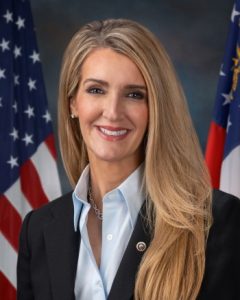
Under its administrator, Kelly Loeffler, right, a corporate executive turned senator from Georgia and vocal supporter of President Trump, the agency has aggressively cut staff. It is rolling back changes made during the Biden administration aimed at easing access to credit for the smallest enterprises, and has lowered targets for how much the federal government should buy from them.
The changes are especially problematic for Black, Hispanic and immigrant entrepreneurs. In the name of eradicating diversity, equity and inclusion practices, the Small Business Administration is shedding programs aimed at helping disadvantaged businesses, including those run by women.
While banks that administer the S.B.A.’s major loan programs have welcomed some of the changes, Democrats and small-business advocates have decried them — especially as the agency is also supposed to inherit a $1.66 trillion student loan portfolio from the largely dismantled Education Department.
“It’s unconscionable that the Trump administration would treat such a vital agency so callously,” said Senator Edward J. Markey of Massachusetts, the ranking Democrat on the Senate Committee on Small Business and Entrepreneurship.
May 22

![]() New York Times, Trump Administration Halts Harvard’s Ability to Enroll International Students, Michael S. Schmidt and Michael C. Bender, May 22, 2025. The move was a major escalation in the administration’s efforts to pressure the college to fall in line with President Trump’s demands.
New York Times, Trump Administration Halts Harvard’s Ability to Enroll International Students, Michael S. Schmidt and Michael C. Bender, May 22, 2025. The move was a major escalation in the administration’s efforts to pressure the college to fall in line with President Trump’s demands.
 The Trump administration on Thursday halted Harvard University’s ability to enroll international students, taking aim at a crucial funding source for the nation’s oldest and wealthiest college in a major escalation in the administration’s efforts to pressure the elite school to fall in line with the president’s agenda.
The Trump administration on Thursday halted Harvard University’s ability to enroll international students, taking aim at a crucial funding source for the nation’s oldest and wealthiest college in a major escalation in the administration’s efforts to pressure the elite school to fall in line with the president’s agenda.
The administration notified Harvard about the decision after a back-and-forth in recent days over the legality of a sprawling records request as part of the Department of Homeland Security’s investigation, according to three people with knowledge of the negotiations. The people spoke on the condition of anonymity because they were not authorized to discuss the matter publicly.
The latest move is likely to prompt a second legal challenge from Harvard, according to another person familiar with the school’s thinking who insisted on anonymity to discuss private deliberations. The university sued the administration last month over the government’s attempt to impose changes to its curriculum, admissions policies and hiring practices.
“I am writing to inform you that effective immediately, Harvard University’s Student and Exchange Visitor Program certification is revoked,” according to a letter sent to the university by Kristi Noem, the homeland security secretary.
About 6,800 international students attended Harvard this year, or roughly 27 percent of the student body, according to university enrollment data. That was up from 19.7 percent in 2010.
The move is likely to have a significant effect on the university’s bottom line. Tuition at Harvard is $59,320 for the school year that begins later this year, and costs can rise to nearly $87,000 when room and board are included. International students tend to pay larger shares of education costs compared with other students.
In a news release confirming the administration’s move, the Department of Homeland Security sent a stark message to Harvard’s international students: “This means Harvard can no longer enroll foreign students, and existing foreign students must transfer or lose their legal status.”

 New York Times, Shock at Harvard After Government Says International Students Must Go, Jenna Russell and Miles J. Herszenhorn, May 22, 2025. Fear and confusion mounted quickly on Thursday as international students, who make up more than a quarter of the university’s enrollment, sought clarity or reassurance.
New York Times, Shock at Harvard After Government Says International Students Must Go, Jenna Russell and Miles J. Herszenhorn, May 22, 2025. Fear and confusion mounted quickly on Thursday as international students, who make up more than a quarter of the university’s enrollment, sought clarity or reassurance.
Just before the Trump administration announced on Thursday that it would bar international students from Harvard, staff members from the university’s International Office met with graduating seniors at the Kennedy School of Government, congratulating them on their degrees — and on surviving the chaos of recent months.
 Then, within minutes of the meeting’s end, news alerts lit up the students’ phones.
Then, within minutes of the meeting’s end, news alerts lit up the students’ phones.
Chaos was breaking out again: Kristi Noem, right, the homeland security secretary, had notified Harvard that its permission  to enroll international students was revoked. With that, the degrees and futures of thousands of Harvard students — and an integral piece of the university’s identity and culture — were plunged into deep uncertainty.
to enroll international students was revoked. With that, the degrees and futures of thousands of Harvard students — and an integral piece of the university’s identity and culture — were plunged into deep uncertainty.
“There are so many students from all over the world who came to Harvard to make it a better place and to change America and change their home countries for the better,” said Karl Molden, a student from Vienna who had just completed his sophomore year. “Now it’s all at risk of falling apart, which is breaking my heart.”
The university has faced rapid-fire aggressions since its president, Alan M. Garber, told the Trump administration in April that Harvard would not give in to demands to change its hiring and admissions practices and its curriculum. After the government froze more than $2 billion in grants, Harvard filed suit in federal court in Boston. Since then, the administration has gutted the university’s research funding, upending budgets and forcing some hard-hit programs to reimagine their scope and mission.
Graduate programs would be hit especially hard. At the Kennedy School, 59 percent of students come from outside the United States. International students make up 40 percent of the enrollment at the T.H. Chan School of Public Health and 35 percent at the Harvard Business School.
Because international students do not qualify for federal financial aid, and typically pay more for their education, they contribute disproportionately to the university’s revenue, in addition to bringing diverse perspectives that enrich campus life and classroom discussions.
“This will destroy the university as we know it,” said Kirsten Weld, a professor who specializes in Latin American history and the president of the Harvard chapter of the American Association of University Professors. “Harvard is situated in the United States physically, but its students and faculty hail from all over the world. That is fundamental to the work and mission of the institution. You cannot take that away and have an institution left at the end of it.”
Fear and confusion spread quickly on Thursday as international students flooded group message boards with anxious questions and refreshed their email inboxes.
Roll Call, Sweeping budget package passes House after weeks of arm-twisting, David Lerman and Caitlin Reilly, May 22, 2025. Last-minute lobbying by Trump, key changes to text woo enough rebellious conservatives.
 House Republicans passed their “big, beautiful” reconciliation bill early Thursday morning, sending to the Senate a filibuster-proof package that would deliver the major elements of President Donald Trump’s legislative agenda, from tax cuts and border security to lifting the nation’s borrowing limit.
House Republicans passed their “big, beautiful” reconciliation bill early Thursday morning, sending to the Senate a filibuster-proof package that would deliver the major elements of President Donald Trump’s legislative agenda, from tax cuts and border security to lifting the nation’s borrowing limit.
 The 215-214 vote capped weeks of grueling negotiations behind the scenes between House leaders and warring factions of the Republican conference. While moderates in high-tax states sought additional tax relief, hardcore conservatives sought deeper cuts to federal spending, particularly on Medicaid, and a faster repeal on clean energy tax credits they dubbed the “green new scam.”
The 215-214 vote capped weeks of grueling negotiations behind the scenes between House leaders and warring factions of the Republican conference. While moderates in high-tax states sought additional tax relief, hardcore conservatives sought deeper cuts to federal spending, particularly on Medicaid, and a faster repeal on clean energy tax credits they dubbed the “green new scam.”
![]() New York Times, Judge Blocks Trump Administration From Dismantling Education Department, Michael C. Bender, May 22, 2025. The order issued by a federal judge in Boston also directs officials to reinstate thousands of fired employees.
New York Times, Judge Blocks Trump Administration From Dismantling Education Department, Michael C. Bender, May 22, 2025. The order issued by a federal judge in Boston also directs officials to reinstate thousands of fired employees.
A federal judge on Thursday blocked President Trump’s executive order aimed at dismantling the Education Department and ordered officials to reinstate thousands of fired employees in a ruling that marked at least a temporary setback for the president and his plans.
The decision from Judge Myong J. Joun of the U.S. District Court for the District of Massachusetts was a preliminary injunction, meaning it will remain in force until the case is resolved or a higher court overturns it.
![]() New York Times, In Firing Watchdogs, Trump Sidesteps Laws and Moves to Expand Power, Elena Shao, May 22, 2025. President Trump summarily dismissed more than a dozen members of independent oversight bodies during his first two months in office, defying typical procedures and federal laws that say presidents cannot remove certain officials without good cause, like misconduct or neglect.
New York Times, In Firing Watchdogs, Trump Sidesteps Laws and Moves to Expand Power, Elena Shao, May 22, 2025. President Trump summarily dismissed more than a dozen members of independent oversight bodies during his first two months in office, defying typical procedures and federal laws that say presidents cannot remove certain officials without good cause, like misconduct or neglect.
 The targeted firings of these officials, which have resulted in multiple legal challenges, are part of Mr. Trump’s strategy to prompt the conservative Supreme Court to decide whether a president can remove members of certain independent agencies at will. The Supreme Court on Thursday agreed, for now, to allow Mr. Trump to remove the leaders of two independent agencies who had filed suits contesting their firings.
The targeted firings of these officials, which have resulted in multiple legal challenges, are part of Mr. Trump’s strategy to prompt the conservative Supreme Court to decide whether a president can remove members of certain independent agencies at will. The Supreme Court on Thursday agreed, for now, to allow Mr. Trump to remove the leaders of two independent agencies who had filed suits contesting their firings.
If the court were to eventually side with Mr. Trump, it could grant a president the authority to dismiss members of independent commissions and boards without cause or explanation — and almost certainly imperil the independence of these bodies. The majority of the court appeared to make an exception for the Federal Reserve Board.
“There is a potential for a government that is devoid of a lot of the checks and balances that we have come to rely on,” said Sharon Block, a professor at Harvard Law School and a former member of the National Labor Relations Board, one of the agencies Mr. Trump has targeted.
Out of the 13 targeted firings, nine members of independent boards and two leaders of independent watchdog agencies, each represented below by a bar, were fired before their terms had expired.
Pro Publica, Investigation: More Than a Dozen U.S. Officials Sold Stocks Before Trump’s Tariffs Sent the Market Plunging, Robert Faturechi, Pratheek Rebala and Brandon Roberts, May 22, 2025. Records show well-timed trades by executive  branch employees and congressional aides. Even if they had no insider information, ethics experts say such trading undermines faith in government and the markets.
branch employees and congressional aides. Even if they had no insider information, ethics experts say such trading undermines faith in government and the markets.
The week before President Donald Trump unveiled bruising new tariffs that sent the stock market plummeting, a key official in the agency that shapes his administration’s trade policy sold off as much as $30,000 of stock.
Two days before that so-called “Liberation Day” announcement on April 2, a State Department official sold as much as $50,000 in stock, then bought a similar investment as prices fell.
And just before Trump made another significant tariff announcement, a White House lawyer sold shares in nine companies, records show.
More than a dozen high-ranking executive branch officials and congressional aides have made well-timed trades since Trump took office in January, most of them selling stock before the market plunged amid fears that Trump’s tariffs would set off a global trade war, according to a ProPublica review of disclosures across the government.
All of the trades came shortly before a significant government announcement or development that could influence stock prices. Some who sold individual stocks or broader market funds used their earnings to buy investments that are generally less risky, such as bonds or treasuries. Others appear to have kept their money in cash. In one case unrelated to tariffs, records show that a congressional aide bought stock in two mining companies shortly before a key Senate committee approved a bill written by his boss that would help the firms.
Using nonpublic information learned at work to trade securities could violate the law. But even if such actions aren’t influenced by insider knowledge, ethics experts warn that trading stock while the federal government’s actions move markets can create the appearance of impropriety. The recent trades by government officials, they said, underscore that there should be tighter rules on how, or if, federal employees can trade securities.
“The executive branch is routinely engaged in activities that will move the market,” said Tyler Gellasch, who, as a congressional aide, helped write the law on insider trading by government officials and now runs a nonprofit focused on transparency and ethics in capital markets. “I don’t think members of Congress and executive branch officials should be trading securities. To the extent they have investment holdings, it should be managed by someone else outside their purview. The temptation to put their own personal self-interest ahead of their duties to the country is just too high.”
There is no evidence that the trades by government officials identified by ProPublica were informed by nonpublic information. Still, when government officials trade stock at opportune times, Gellasch said, even if it was based on luck and not inside information, it undermines trust in government and the markets
“It then becomes a thing where our markets look rigged,” he said.
In response to questions from ProPublica, the officials who made the trades either said they had no insider information that would help them time their decisions or did not respond to questions about the transactions.
Questions about trades based on nonpublic information have swirled around Congress for years and began anew after Trump’s tariffs announcements led to wild swings in the market. Lawmakers’ trades are automatically posted online and, after multiple congressional stock-trading scandals, are widely scrutinized as soon as they become public.
But less attention is paid to the trades of executive branch employees and congressional aides whose work could give them access to confidential information likely to influence markets once made public.
Last week, ProPublica reported that Attorney General Pam Bondi sold between $1 million and $5 million worth of shares of Trump Media, the president’s social media company, on April 2. After the market closed that day, Trump unveiled his “Liberation Day” tariffs, sending the market reeling. Bondi’s ethics agreement required her to sell by early May, but why she sold on that date is unclear. She has yet to answer questions about the trades, and the Justice Department did not respond to requests for comment.
Earlier this week, ProPublica reported that Sean Duffy, Trump’s transportation secretary, sold shares in almost three dozen companies on Feb. 11, two days before Trump announced plans to institute wide-ranging “reciprocal” tariffs. A Transportation Department spokesperson said Duffy’s account manager made the trades and that Duffy had no input on the timing.
Using insider government information to buy or sell securities could violate the Stop Trading on Congressional Knowledge, or STOCK, Act. But no cases have ever been brought under the law, and some legal experts have doubts it would hold up to scrutiny from the courts, which in recent years have generally narrowed what constitutes illegal insider trading.
Thousands of government employees are required to file disclosure forms if they sell or buy securities worth more than $1,000. In many cases, the records are available only in person in Washington, D.C., or through a records request. The documents do not include exact amounts bought or sold but instead provide a broad range for the totals of each transaction.
ProPublica examined hundreds of records for trades shortly before major tariff announcements or other key government decisions. Trump, of course, repeatedly said on the campaign trail that he intended to institute dramatic tariffs on foreign imports. But during the first weeks of his term, investors were not panic selling, seeming to assume that his campaign promises were bluster. Several tariff announcements by Trump early on shook the markets, but it wasn’t until he detailed his new tariffs on April 2 that stocks dived.
May 21
 The Hartmann Report, Investigative Commentary: The Biggest Political Con of
The Hartmann Report, Investigative Commentary: The Biggest Political Con of  the Last Century Unmasked, Thom Hartmann, right, May 21, 2025. Why the destruction of public institutions, the middle class, and government itself may not be a mistake — but the mission.
the Last Century Unmasked, Thom Hartmann, right, May 21, 2025. Why the destruction of public institutions, the middle class, and government itself may not be a mistake — but the mission.
Neal deGrasse Tyson makes a very relevant point this week:
“If a foreign adversary snuck into our Federal budget and cut science research and education the way we’re cutting it ourselves — strategically undermining America’s long-term health, wealth, and security — we would likely consider it an act of war.”
Trump’s administration just said you can’t get the Covid vaccine unless you’re over 65 or sick, setting up America for more death and disease. As Noah Berlatsky notes in his great Substack newsletter:
“This is the latest effort by Trump to try to kick start a major US pandemic and degrade the health and welfare of the country. Trump has also rolled back food testing, including testing for bacteria in infant formula. He’s made major cuts at the FAA, leading to fears for airline safety—and a number of dramatic airline safety failures already may be related to the destruction of capacity.
 Cuts at the NOAA may diminish the ability to warn about dangerous weather events. The Republican proposals for Medicaid cuts are likely to lead to tens of thousands of deaths. And of course Trump’s senseless tariffs are increasing inflation, destroying jobs, and could still easily end us in a recession.“
Cuts at the NOAA may diminish the ability to warn about dangerous weather events. The Republican proposals for Medicaid cuts are likely to lead to tens of thousands of deaths. And of course Trump’s senseless tariffs are increasing inflation, destroying jobs, and could still easily end us in a recession.“
But why? What the hell is going on here?
![]() New York Times, House G.O.P. Races to Revamp Major Policy Bill, Grasping for Votes to Pass It, Michael Gold, May 21, 2025. A key committee met after midnight on Wednesday and worked through dawn as Republican leaders finalized changes aimed at winning over holdouts in hopes of bringing the bill to the floor in short order.
New York Times, House G.O.P. Races to Revamp Major Policy Bill, Grasping for Votes to Pass It, Michael Gold, May 21, 2025. A key committee met after midnight on Wednesday and worked through dawn as Republican leaders finalized changes aimed at winning over holdouts in hopes of bringing the bill to the floor in short order.
House Republican leaders labored on Wednesday to win over holdouts for their sweeping domestic policy bill to deliver President Trump’s agenda, slogging through a marathon overnight committee session to prepare the measure for a floor vote.
The powerful Rules Committee began meeting after midnight on Wednesday morning and continued debating the measure as morning broke, while Republicans worked behind the scenes to hammer out enough concessions to cobble together the votes in their fractious ranks to push it through the House.
But as the session dragged into its eighth hour, they had yet to release any new language and the panel had yet to vote to send the legislation to the floor.
Any changes to what Mr. Trump calls the “big, beautiful bill,” would spring from extensive negotiations between Speaker Mike Johnson and Republicans from disparate factions who have so far refused to back the legislation.
Paul Krugman via Substack, Economic Analysis: A Liz Truss Moment for America?  Paul Krugman, right, May 21, 2025. Despite hitting a few speed bumps, Congress seems likely to pass Donald Trump’s “big, beautiful bill” — legislation that combines big tax cuts for the rich with vicious cuts in social programs — within a few days.
Paul Krugman, right, May 21, 2025. Despite hitting a few speed bumps, Congress seems likely to pass Donald Trump’s “big, beautiful bill” — legislation that combines big tax cuts for the rich with vicious cuts in social programs — within a few days.
This momentous move will take place with almost no public discussion; the final hearing of the House Rules Committee began at 1 AM this morning. That’s right, 1 AM. We’re clearly watching a bum’s rush, an attempt to ram this atrocity through before the public understands what’s happening.
I have already focused on the bill’s cruelty. It’s also deeply irresponsible, undermining America’s hard-won reputation as a country that honors its obligations.
The cuts to Medicaid and food stamps won’t come close to offsetting the revenue loss from the tax cuts for the rich. Neither will revenue from tariffs. And can we all now acknowledge that DOGE’s promise to eliminate hundreds of billions in “waste, fraud and abuse” hasn’t just failed? It has ended up being a complete waste of time, which it has tried to conceal with fraudulent claims of achievement, all while abusing dedicated civil servants and driving them out of government in ways that will impoverish America in the long run — and maybe not that long. We’re a world leader in education, science and technology that is systematically destroying the very basis of our success.
So we’re looking at a large increase in an already high budget deficit when we’re already at full employment, interest rates are already at multiyear highs, and future growth prospects are declining.
Letters from An American via Substack, Historical Commentary: May 20, 2025 [Trump  Officials Face Senate], Heather Cox Richardson, right, May 21, 2025. Today was a rough day for administration officials on Capitol Hill as Senate committees held hearings on the 2026 budget requests for the Department of Homeland Security, the Department of Health and Human Services, and the Department of State.
Officials Face Senate], Heather Cox Richardson, right, May 21, 2025. Today was a rough day for administration officials on Capitol Hill as Senate committees held hearings on the 2026 budget requests for the Department of Homeland Security, the Department of Health and Human Services, and the Department of State.
 The Senate Finance Committee also held a hearing for Trump’s nominee to be Commissioner of Internal Revenue, former Missouri representative William “Billy” Long. Democrats came prepared and demanded answers that the department secretaries and nominee were either unable or unwilling to give.
The Senate Finance Committee also held a hearing for Trump’s nominee to be Commissioner of Internal Revenue, former Missouri representative William “Billy” Long. Democrats came prepared and demanded answers that the department secretaries and nominee were either unable or unwilling to give.
Secretary of Homeland Security Kristi Noem was testifying before the Senate Homeland Security and Governmental Affairs Committee about the Department of Homeland Security’s budget for fiscal year 2026. When Senator Maggie Hassan (D-NH) asked her to define “habeas corpus,” Noem’s response indicated she has no understanding of the nation’s fundamental law.
“Habeas corpus is a constitutional right that the president has to be able to remove people from this country,” Noem said. Hassan corrected her: “Habeas corpus is the legal principle that requires that the government provide a public reason for detaining and imprisoning people. If not for that protection, the government could simply arrest people, including American citizens, and hold them indefinitely for no reason. Habeas corpus is the foundational right that separates free societies like America from police states like North Korea.”
Noem’s habit in these hearings is simply to ignore questions and to attack, and she tried that with Hassan, suggesting that the president has the right to suspend habeas corpus if circumstances require it.

 New York Times, F.D.A. Poised to Restrict Access to Covid Vaccines, Christina Jewett and Apoorva Mandavilli, May 21, 2025 (print ed.). Agency leaders said there was evidence to justify approval only for older people and those with medical conditions. Many others may not be able to get the shots.
New York Times, F.D.A. Poised to Restrict Access to Covid Vaccines, Christina Jewett and Apoorva Mandavilli, May 21, 2025 (print ed.). Agency leaders said there was evidence to justify approval only for older people and those with medical conditions. Many others may not be able to get the shots.
The Food and Drug Administration will permit use of Covid vaccines by adults over 65 and those with certain medical conditions in the fall, but may require additional studies before approving the shots for healthy Americans younger than 65, agency officials said on Tuesday.
At this point, the additional doses offer “uncertain” benefits to many young and middle-aged people who have already been vaccinated or have had Covid, Dr. Vinay Prasad, the F.D.A.’s vaccine division chief, and Dr. Martin Makary, the agency’s commissioner, wrote in The New England Journal of Medicine.
“The F.D.A. will approve vaccines for high-risk persons and, at the same time, demand robust, gold-standard data on persons at low risk,” the officials wrote.
Until now, annual Covid shots were recommended for everyone aged 6 months and older. Scientific advisers to the F.D.A. are set to meet Thursday to decide on the composition of the Covid vaccine to be made available in the fall.
During the pandemic, both Dr. Prasad and Dr. Makary sharply criticized vaccine mandates and other public health measures intended to turn back the coronavirus.
 Robert F. Kennedy Jr., right, the health secretary, is a longtime vaccine skeptic who spent years campaigning against the Covid shots, claiming falsely at one point that the Covid vaccines have killed more people than the virus.
Robert F. Kennedy Jr., right, the health secretary, is a longtime vaccine skeptic who spent years campaigning against the Covid shots, claiming falsely at one point that the Covid vaccines have killed more people than the virus.
As a measles outbreak spreads through Texas and other states this year, Mr. Kennedy has offered only muted support for vaccination and has repeatedly raised questions about the safety of the measles shot while suggesting falsely that miracle treatments like cod liver oil were available.
During a livestreamed “town hall” on Tuesday afternoon, Dr. Prasad said he thought the new approach to Covid vaccination was “a reasonable compromise,” leaving the shots available to many Americans “but also generating evidence.”Chasing Tax Cuts, Trump and Republicans Want to Make States Pay, Tony Romm, May 13, 2025. https://www.nytimes.com/2025/05/13/us/politics/trump-republicans-tax-cuts-spending-states.html G.O.P. leaders are exploring cuts to federal aid, leaving some states fearful that their budgets cannot absorb billions of dollars in new costs.
Across the country, state leaders are beginning to express alarm about the budgetary fallout from President Trump’s economic agenda, warning that they will not be able to pick up the bill if the federal government reduces its funding for major public services. To governors and other officials, many of whom are Democrats, the fear is that Washington could sharply curtail federal programs that help states improve their infrastructure, respond to natural disasters, expand education and provide a suite of health, housing and nutrition benefits to the poor.
May 20
![]() New York Times, Republican Plan to Tax Elite Colleges Could Hit in Unexpected Places, Stephanie Saul and Steven Rich, May 20, 2025. A plan for a hefty new tax on university endowments was crafted to target “woke” schools, lawmakers said. But a small Kansas college and a Texas medical school might also be hit.
New York Times, Republican Plan to Tax Elite Colleges Could Hit in Unexpected Places, Stephanie Saul and Steven Rich, May 20, 2025. A plan for a hefty new tax on university endowments was crafted to target “woke” schools, lawmakers said. But a small Kansas college and a Texas medical school might also be hit.
McPherson College, in the middle of Kansas wheat country, is a small school that accepts the vast majority of its applicants, many from surrounding towns. It is best known for its degree in classic car restoration.
 The college might still end up a potential target in a Republican plan aimed primarily at the Ivy League, which would impose billions in taxes on the investment returns of several dozen private colleges and universities.
The college might still end up a potential target in a Republican plan aimed primarily at the Ivy League, which would impose billions in taxes on the investment returns of several dozen private colleges and universities.
The goal of the proposal, laid out in a report last week from Republicans on the House Ways and Means Committee, is to hold accountable “woke, elite universities that operate more like major corporations.” McPherson could be on the list because it has an endowment of $1.6 billion, thanks to an anonymous donation a few years ago.
An analysis by The New York Times shows that at least 58 schools would potentially be subject to the tax, based on the size of their endowments and enrollments. The list includes highly selective and wealthy institutions like Harvard and the Massachusetts Institute of Technology, but also smaller schools like Berry College in Georgia and DePauw University in Indiana.
The tax idea has been discussed by Republicans since at least President Trump’s first term, when a 1.4 percent tax was imposed on some  endowments. Momentum to broaden it grew in 2023, when JD Vance, then a senator from Ohio, proposed a 35 percent tax on endowments of $10 billion and larger.
endowments. Momentum to broaden it grew in 2023, when JD Vance, then a senator from Ohio, proposed a 35 percent tax on endowments of $10 billion and larger.
The tax, part of the House proposal that President Trump has called the “big, beautiful bill,” would be tiered depending on the size of the school’s endowment and enrollment, with a top rate of 21 percent for those with endowments of at least $2 million per student.
![]() New York Times, Guest Essay: The President Will Destroy You Now, Thomas B. Edsall, May 20, 2025. One thing stands out amid all the chaos, corruption and disorder: the wanton destructiveness of the Trump presidency.
New York Times, Guest Essay: The President Will Destroy You Now, Thomas B. Edsall, May 20, 2025. One thing stands out amid all the chaos, corruption and disorder: the wanton destructiveness of the Trump presidency.
The targets of Trump’s assaults include the law, higher education, medical research, ethical standards, America’s foreign alliances, free speech, the civil service, religion, the media and much more.
J. Michael Luttig, a former federal appeals court judge appointed by President George H.W. Bush, succinctly described his own view of the Trump presidency, writing by email that there has never before “been a U.S. president who I consider even to have been ‘destructive,’” let alone a president who has intentionally and deliberately set out to destroy literally every institution in America, up to and including American democracy and the rule of law.”
Some of the damage Trump has inflicted can be repaired by future administrations, but repairing relations with American allies, the restoration of lost government expertise and a return to productive research may take years, even with a new and determined president and Congress.
Let’s look at just one target of the administration’s vendetta, medical research. Trump’s attacks include cancellation of thousands of grants, cuts in the share of grants going to universities and hospitals; and proposed cuts of 40 percent or more in the budgets of the National Institutes of Health, the Centers for Disease Control and Prevention and the National Science Foundation.
 The Hartmann Report, Commentary: The Final Checkmate: Republicans Move to Destroy the Balance of Powers, Thom Hartmann, right, May 20, 2025. In a legal sleight of hand, Republicans want to strip judges of their power to enforce rulings
The Hartmann Report, Commentary: The Final Checkmate: Republicans Move to Destroy the Balance of Powers, Thom Hartmann, right, May 20, 2025. In a legal sleight of hand, Republicans want to strip judges of their power to enforce rulings  — because holding Trump in contempt might actually work.
— because holding Trump in contempt might actually work.
With almost no mention by our mainstream corporate press, Republicans in the House of Representatives are proposing to end all checks on the power of Donald Trump, effectively ending the American experiment of a democratic republic. It’s shockingly anti-American.
Since the only branch of government standing against Trump right now is the courts, Republicans believe they’ve found a way to end that resistance. Here’s the backstory.
The grand invention of our Founders, cribbed from the Iroquois Confederacy and following an outline Montesquieu suggested (based on his reading about Native Americans), was a three-branches-of-government system where each branch would act as a check on the power of the other two.
Right now the Trump administration is pretty clearly in contempt of at least one Supreme Court order and several from lower courts around the issue of deporting Venezuelan nationals to a brutal concentration camp in El Salvador.
Both Judge Boasbert and Judge Xinis have implied that they may hold Trump’s lawyers in contempt unless they provide answers to their questions about why they’re refusing to comply with court orders.
Again, the power of contempt is the only “real” enforcement power the courts have, the only way they can make their orders stick. They can start by fining or jailing Trump’s lawyers who are standing before them, and work their way up from there all the way, arguably, to the president himself.
So far, Trump has effectively neutered Congress; there’s not a single elected Republican who’s willing to seriously challenge his questionable actions, particularly his denial of due process to foreign students and undocumented aliens.
Which leaves only the courts as a check on his power.
Which is apparently why toady Republicans in the House have inserted the following language into their “Big Brutal Bill” (as Ro Khanna calls it) that provides for trillions in tax breaks for billionaires like Trump, Musk, Zuckerberg, Bezos, etc.:
“No court of the United States may use appropriated funds to enforce a contempt citation for failure to comply with an injunction or temporary restraining order if no security was given when the injunction or order was issued….”
In plain language, what this says is that no court can enforce a contempt charge against Trump or his people unless the person or group who brought the charges against the president or his administration had first posted a cash bond.
So, here’s the kicker: in civil proceedings, like virtually 100% of the cases Trump is involved with regarding his abuse of power and refusal to acknowledge due process, there is no bond involved.
Thus, if this becomes law, Congress will have stripped the courts — including the Supreme Court — of their ability to use the power of contempt to enforce their rulings. This is way beyond Andrew Jackson’s worst fever dreams.
With this single stroke, Trump will have crowned himself king. No congress and no court can stop him. Even if Congress were to try, it would take the courts to enforce their hearings, investigations, subpoenas, and laws, and without the power of contempt the courts will have lost that ability.
Democracy Project, Opinion: The political prosecution of Rep. McIver is just the  beginning, Marc Elias, below right, May 20, 2025. The weaponization of our government has officially begun.
beginning, Marc Elias, below right, May 20, 2025. The weaponization of our government has officially begun.
Ever since he won the 2024 election, I have predicted that it was 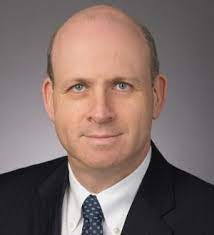 only a matter of time before Donald Trump used the full powers of the federal government to target his political opponents. Last night, time ran out.
only a matter of time before Donald Trump used the full powers of the federal government to target his political opponents. Last night, time ran out.
In an oddly worded statement, the Department of Justice announced its first criminal prosecution of a political opponent. New Jersey’s Acting U.S. Attorney Alina Habba, revealed she was charging Democratic Congresswoman LaMonica McIver with assault related to her recent visit to a federal immigration detention center.
 On May 9, McIver, left, and two other members of Congress were making a routine, lawful oversight visit to a federal facility when they were blocked by federal agents for several hours. At first, the government tried to demonize Newark’s mayor, Ras Baraka, who joined the members of Congress on the visit — threatening him with criminal trespass charges. While those charges have since been dropped, the Trump administration isn’t backing down. The crisis has now escalated with the prosecution of a member of Congress for simply doing her job.
On May 9, McIver, left, and two other members of Congress were making a routine, lawful oversight visit to a federal facility when they were blocked by federal agents for several hours. At first, the government tried to demonize Newark’s mayor, Ras Baraka, who joined the members of Congress on the visit — threatening him with criminal trespass charges. While those charges have since been dropped, the Trump administration isn’t backing down. The crisis has now escalated with the prosecution of a member of Congress for simply doing her job.
Habba, who has no prior prosecutorial experience, was previously general counsel to a parking garage company before joining the motley group of  Trump lawyers representing him in various civil and criminal cases. In that role, she proved to be an incompetent but loyal foot soldier for Trump. After a brief stint in the White House, she was named Acting U.S. Attorney for New Jersey.
Trump lawyers representing him in various civil and criminal cases. In that role, she proved to be an incompetent but loyal foot soldier for Trump. After a brief stint in the White House, she was named Acting U.S. Attorney for New Jersey.
While McIver’s prosecution certainly isn’t the first act of political weaponization from the administration, it is by far the most dangerous. Previously, the buffoonish Ed Martin – who was briefly the U.S Attorney for Washington, D.C., before he was replaced by Jeanine Pirro – sent out bogus letters with vaguely worded threats to various elected officials. But Martin never actually prosecuted anyone.
And though the White House has issued a series of threatening executive orders targeting individuals, none of those actions have yielded public criminal investigations, let alone charges. Even targeting law firms and universities, which imposed financial and business costs, did not include criminal prosecution.
While we’re only starting to see political prosecutions now, the alarm bells have been ringing since day one. Attorney General Pam Bondi doesn’t even try to feign independence from the White House and makes no secret of her loyalty to Trump. Several of her deputies, like Habba, are former members of Trump’s criminal defense team. The guardrails that once protected against misuse of the Department of Justice have been deliberately dismantled.
To top it off, it’s not surprising that the first prosecution targets a Black woman, recently elected to Congress, who was attempting to conduct lawful oversight at an immigration facility. The administration is no doubt hoping that the Congresswoman is too unknown to attract political support, and that the circumstances surrounding the incident are too murky to engage a distracted public.
We cannot allow that to be the case.
Only eight days after Trump took office, I warned that there would be political retribution and outlined a specific strategy that we must now deploy: “It is incumbent on the media, civil society groups, judges, and individual citizens to adopt a presumption of skepticism when it is told that a political opponent of Trump is under an ethical or legal cloud.”
Most importantly, the public needs to destigmatize those being attacked by Trump. We should not only give the Congresswoman the presumption of innocence — we should assume the U.S. Attorney’s office is acting with malice and in bad faith.
![]() New York Times, Judge Says Deportation to South Sudan Appears to Have Violated Court Order, Hamed Aleaziz and Alan Feuer, May 20, 2025. The judge ordered a Justice Department lawyer to track down the plane apparently carrying a Burmese migrant and see whether it could be turned around midflight. He also threatened officials with contempt.
New York Times, Judge Says Deportation to South Sudan Appears to Have Violated Court Order, Hamed Aleaziz and Alan Feuer, May 20, 2025. The judge ordered a Justice Department lawyer to track down the plane apparently carrying a Burmese migrant and see whether it could be turned around midflight. He also threatened officials with contempt.
A federal judge in Boston said on Tuesday that the Trump administration had apparently violated an order he issued in April by flying a Burmese immigrant to South Sudan without first giving him enough time to challenge his removal over fears about being sent to a country not his own.
The stern remarks by the judge, Brian E. Murphy, came at a hearing in Federal District Court in Boston where immigration lawyers raised concerns that at least one other immigrant had also been flown to South Sudan without proper due process.
Meidas Touch Network, Opinion: CBS Gave US ALL the Middle Finger… MEIDAS  RESPONDS!! Ben Meiselas, May 20, 2025. I am pissed off!!
RESPONDS!! Ben Meiselas, May 20, 2025. I am pissed off!!
It appears that CBS and its parent company Paramount are moving closer to settling a BS lawsuit filed by Donald Trump—to pay Trump directly as a quid pro quo for the U.S. government approving the merger between Paramount and a company called Skydance. The merger would put approximately $5 billion in cash into the hands of Paramount shareholders, including its controlling shareholder Shari Redstone.
 Shari Redstone inherited Paramount—once called Viacom—from her dad, Sumner Redstone. Shari wants to sell her shares to Skydance so she can make billions.
Shari Redstone inherited Paramount—once called Viacom—from her dad, Sumner Redstone. Shari wants to sell her shares to Skydance so she can make billions.
The merger requires approval by various United States government agencies, like the FCC. Trump’s FCC has threatened to withhold approval of the merger.
Trump personally sued Paramount and CBS (which owns 60 Minutes) in Texas federal court, forum-shopping to get a Trump-appointed judge. He claims he was injured under Texas consumer laws because 60 Minutes lightly edited its interview with former VP Kamala Harris in October 2024.
Trump was too scared to sit for an interview with 60 Minutes in this election cycle. Yet he claims he was injured to the tune of $20 billion based on how CBS presented its interview with Kamala Harris.
May 19
Paul Krugman via Substack, Opinion: Attack of the Sadistic Zombies, Paul Krugman, right,  May 19, 2025. The GOP budget is incredibly cruel — and that’s the point.
May 19, 2025. The GOP budget is incredibly cruel — and that’s the point.
Republicans in Congress, taking their marching orders from Donald Trump, are on track to enact a hugely regressive budget — big tax giveaways to the wealthy combined with cruel cuts in programs that serve lower-income Americans. True, the legislation suffered a setback last week, initially failing to make it out of committee. But that was largely because some right-wing Republicans didn’t think the benefit cuts were vicious enough.
 But this reconciliation bill — that is, legislation structured in such a way that it can’t be filibustered and may well pass with no Democratic votes — is different in both degree and kind from what we’ve seen before: Its cruelty is exceptional even by recent right-wing standards. Furthermore, the way that cruelty will be implemented is notable for its reliance on claims we know aren’t true and policies we know won’t work — what some of us call zombie ideas.
But this reconciliation bill — that is, legislation structured in such a way that it can’t be filibustered and may well pass with no Democratic votes — is different in both degree and kind from what we’ve seen before: Its cruelty is exceptional even by recent right-wing standards. Furthermore, the way that cruelty will be implemented is notable for its reliance on claims we know aren’t true and policies we know won’t work — what some of us call zombie ideas.
And it’s hard to avoid the sense that the counterproductive viciousness is actually the point.
The House Reconciliation Bill, by slashing benefits — especially Medicaid — will cause immense, almost inconceivable hardship to the bottom 40 percent of Americans, especially the poorest fifth.
Medicaid, in case anyone needs reminding, is the national health insurance program for low-income Americans who probably don’t have any other way to pay for medical care. In 2023 Medicaid covered 69 million Americans, far more than Medicare (which covers seniors), including 39 percent of children.
Providing health care to children, by the way, isn’t just about social justice and basic decency. It’s also good economics: Children who receive adequate care grow up to be more productive adults. Among other things they end up paying more taxes, so Medicaid for children almost surely pays for itself.
And although Republican legislation apparently won’t explicitly target childrens’ care, it will impose paperwork requirements that will cause both children and their parents to lose coverage.
Paul Krugman is a Neo-Keynesian economist, Nobel laureate, academic, author, and media columnist, known for his work on international trade theory and economic geography. Considered one of the world’s most influential economists, Krugman is renowned for redefining existing theories of international trade and either founding or co-founding several new disciplines in international economics.
May 16
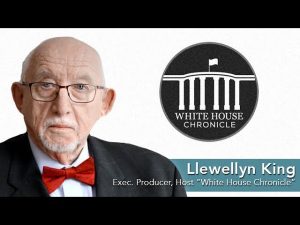
White House Chronicle, Commentary: How Technology Built the British Empire, Llewellyn King, above, May 16, 2025. As someone who grew up in the last days of the British Empire, I am often asked how it was that so few people controlled so much of the world for so long?
 The simple answer is technology underpinned the British Empire, from its tentative beginnings in the 17th century to its global dominance in the 18th and 19th centuries and most of the first half of the 20th century.
The simple answer is technology underpinned the British Empire, from its tentative beginnings in the 17th century to its global dominance in the 18th and 19th centuries and most of the first half of the 20th century.
America filled the gap left by Britain as the dominant force in the world, admired, copied and envied. But underpinning that state of esteem and  financial ease was tech leadership, medical leadership, and cultural leadership through film and television. America became the techno supremo.
financial ease was tech leadership, medical leadership, and cultural leadership through film and television. America became the techno supremo.
Now government research funding is being butchered across the board from advanced energy to, most shameful of all, the philistine slashing of the National Institutes of Health’s research budgets. Changing times doomed the British Empire, America’s future is at stake and it will be determined by technology and medicine. If we underfund research, the future is known.
May 14
![]() New York Times, Kennedy Clashes With Top Democrat Who Accused Him of ‘Destroying’ Health Agencies, Sheryl Gay Stolberg, May 14, 2025. Health Secretary Robert F. Kennedy Jr., right, whose drastic overhaul of the federal health apparatus has left scientists and patients reeling, clashed on Wednesday with a senior House
New York Times, Kennedy Clashes With Top Democrat Who Accused Him of ‘Destroying’ Health Agencies, Sheryl Gay Stolberg, May 14, 2025. Health Secretary Robert F. Kennedy Jr., right, whose drastic overhaul of the federal health apparatus has left scientists and patients reeling, clashed on Wednesday with a senior House  Democrat, who accused him of “destroying the crown jewels of our health system” and of violating the law by cutting funding appropriated by Congress for lifesaving medical research.
Democrat, who accused him of “destroying the crown jewels of our health system” and of violating the law by cutting funding appropriated by Congress for lifesaving medical research.
“We are not withholding money for lifesaving research,” Mr. Kennedy insisted. After a fiery back and forth, Representative Rosa DeLauro of Connecticut, the top Democrat on the House Appropriations Committee, looked disgusted. “Unbelievable,” she said, shaking her head. “Unbelievable.”
He faced similar accusations from Representative Steny H. Hoyer of Maryland, the former Democratic leader.
 The sharp exchanges on Wednesday morning came during Mr. Kennedy’s testimony before the appropriations panel, his first appearance on Capitol Hill since becoming health secretary. He will also appear on Wednesday afternoon before the Senate health committee, whose Republican chairman will call on him to explain to Americans how his reforms “will make their lives easier, not harder.”
The sharp exchanges on Wednesday morning came during Mr. Kennedy’s testimony before the appropriations panel, his first appearance on Capitol Hill since becoming health secretary. He will also appear on Wednesday afternoon before the Senate health committee, whose Republican chairman will call on him to explain to Americans how his reforms “will make their lives easier, not harder.”
The back-to-back appearances were scheduled so that Mr. Kennedy could promote President Trump’s budget for the Department of Health and Human Services for the next fiscal year.
But he is also facing sharp questions about the huge reductions he has already imposed on research grants and jobs, which key Democrats have condemned as part of what they call Mr. Trump’s “war on science.”

The Bulwark, Commentary: Autocrats, Kleptocrats, Plutocrats… Oh My! William Kristol, below right, May 14, 2025. What a spectacle! There they were yesterday, assembled in Riyadh, Saudi Arabia, autocrats and plutocrats and kleptocrats, gathered to enjoy each other’s company under the  benevolent patronage of their host, His Royal Highness Crown Prince Mohammed bin Salman.
benevolent patronage of their host, His Royal Highness Crown Prince Mohammed bin Salman.
Saudi Arabia was an appropriate destination for Donald Trump’s first foreign trip in his second term as president. He chose to visit not a democracy but a despotism; not a free nation but one of the world’s most unfree; not a land of tolerance but of repression. And Trump made it clear yesterday that he did not consider these features unfortunate or undesirable aspects of life under the House of Saud. There was not a hint of criticism or even of hesitation in the fulsome praise Trump heaped upon his hosts. The American president admires the Saudi achievements in autocracy, plutocracy, and kleptocracy.
Lincoln Square, Commentary, Here is a specific thing you can do to fight Trump’s politicization of public services, Don Moynihan, May 14, 2025. Feeling overwhelmed?  That’s OK. Here’s your guide to fighting back against Trump’s war on federal workers and basic competence.
That’s OK. Here’s your guide to fighting back against Trump’s war on federal workers and basic competence.
Trump’s maximalist strategy of firing off one executive action after another seeks to overwhelm us. Finding some tangible way to respond sometimes feels impossible.
So, here is something that you can do: Take the time you would have spent complaining about politics online, and use it to write a comment opposing the proposed Office of Personnel Management rule to politicize public services. You can do it in 5 minutes. Deadline is May 23rd!
 Why should you do this? The proposed rule seeks to reinstate Schedule F, Trump’s never implemented plan to institutionalize political control and loyalty tests for the career bureaucracy by turning 50,000 or more career civil servants into political appointees. Federal comments really do matter. By law, they must be read by the administration, and substantive comments require a response. Failure to do so can see the rule tossed out by courts.
Why should you do this? The proposed rule seeks to reinstate Schedule F, Trump’s never implemented plan to institutionalize political control and loyalty tests for the career bureaucracy by turning 50,000 or more career civil servants into political appointees. Federal comments really do matter. By law, they must be read by the administration, and substantive comments require a response. Failure to do so can see the rule tossed out by courts.
It’s easy: Enter a comment here. No log in. Just click on the “submit a public comment” button. You can enter text, or upload a document. The volume of opposing comments matters, so writing something short and sweet is great. You don’t need to read the rule in depth or be an expert. The proposed rule is bad and protecting nonpartisan civil servants is good. See more details below or take a look at the comments people have already posted.
More detailed and informed comments are even better. One thing that is different from the first time Schedule F was introduced is that we now have a track record showing how Trump’s much more politicized mismanagement of the federal government is having negative effects, and handing him more power would be a disaster. I am especially appealing to people with deep knowledge of policies and management to explain how Schedule F would hurt their domain of expertise. Please, please, please weigh in to provide actual information about how providing protections for career officials will protect against political abuses. If a bunch of people with real and credible experience comment, it becomes harder for the administration and judges to ignore us. I will leave comments to this piece open, so people can share their comments if they wish.
May 13
![]() New York Times, Chasing Tax Cuts, Trump and Republicans Want to Make States Pay, Tony Romm, May 13, 2025. G.O.P. leaders are exploring cuts to federal aid, leaving some states fearful that their budgets cannot absorb billions of dollars in new costs.
New York Times, Chasing Tax Cuts, Trump and Republicans Want to Make States Pay, Tony Romm, May 13, 2025. G.O.P. leaders are exploring cuts to federal aid, leaving some states fearful that their budgets cannot absorb billions of dollars in new costs.
 Across the country, state leaders are beginning to express alarm about the budgetary fallout from President Trump’s economic agenda, warning that they will not be able to pick up the bill if the federal government reduces its funding for major public services. To governors and other officials, many of whom are Democrats, the fear is that Washington could sharply curtail federal programs that help states improve their infrastructure, respond to natural disasters, expand education and provide a suite of health, housing and nutrition benefits to the poor.
Across the country, state leaders are beginning to express alarm about the budgetary fallout from President Trump’s economic agenda, warning that they will not be able to pick up the bill if the federal government reduces its funding for major public services. To governors and other officials, many of whom are Democrats, the fear is that Washington could sharply curtail federal programs that help states improve their infrastructure, respond to natural disasters, expand education and provide a suite of health, housing and nutrition benefits to the poor.
Meidas Touch Network, Trump Cuts Another $450M in Funding From Harvard, Troy Matthews, May 13, 2025. Yes, why would the U.S. want more doctors? The Trump  administration announced it was pulling an additional $450 million in funding from Harvard University this week, after freezing $2.2 billion in grant funding last week. The White House called the cuts punitive as a result of a failure of Harvard to address race discrimination and antisemitism on its campus.
administration announced it was pulling an additional $450 million in funding from Harvard University this week, after freezing $2.2 billion in grant funding last week. The White House called the cuts punitive as a result of a failure of Harvard to address race discrimination and antisemitism on its campus.
 The cuts represent funding from eight different government agencies, including from the Department of Education and Department of Health and Human Services, which have typically given Harvard and other Ivy League schools funding for advanced research in medical sciences.
The cuts represent funding from eight different government agencies, including from the Department of Education and Department of Health and Human Services, which have typically given Harvard and other Ivy League schools funding for advanced research in medical sciences.
“There is a dark problem on Harvard’s campus, and by prioritizing appeasement over accountability, institutional leaders have forfeited the school’s claim to taxpayer support,” the Trump Joint Task Force to Combat Anti-Semitism said in a statement.
“Harvard, and its leadership group who are tainted by the egregious infractions under its watch, faces a steep, uphill battle to reclaim its legacy as a lawful institution and center of academic excellence.” Harvard, “will not surrender its independence or relinquish its constitutional rights,” university President Alan Garber said recently. “Neither Harvard nor any other private university can allow itself to be taken over by the federal government.”
May 11
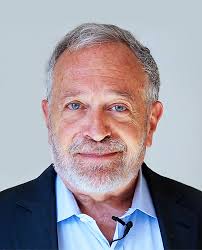 Robert Reich via Substack, Commentary: Moral clarity in a time of monsters, Robert Reich, right, May 11, 2025. Former U.S. Secretary of Labor Robert Reich is a professor at the University of California at Berkeley.
Robert Reich via Substack, Commentary: Moral clarity in a time of monsters, Robert Reich, right, May 11, 2025. Former U.S. Secretary of Labor Robert Reich is a professor at the University of California at Berkeley.
We are living in a time when monsters roam the globe: Trump, Putin, Netanyahu, Xi, Modi, Erdoğan, and others.
They are destroying countless lives, fueling hate, spreading fear.
What is our moral obligation as human beings in the face of this? How do we maintain integrity in a time of monsters?
Some people I know are in denial. They’ve stopped listening to the news. They’d rather not know what the monsters are doing.
I understand. It’s all too painful — the abductions and deportations in the United States, horrific deaths in Ukraine and Gaza, abuses of human rights in China’s Xinjiang region and in Turkey, violence in Kashmir.
Why learn of it? they ask. Nothing can be done anyway, they say.
Others are immobilized with grief. They cannot abide the inhumanity and suffering, so they’ve collapsed into despair.
Nothing will be done, they say.
Some others I know are resigned to what’s happening and believe their only real choice is to keep quiet. They don’t speak out against the monsters for fear of reprisal.
It’s the only practical choice, they say.
These are all completely understandable responses. If you are in denial, despair, or submissive silence, you should not feel guilty. You are only human.
But it’s also important to know that these attitudes help the monsters thrive and grow.
When most of us believe that nothing can be done, or assume nothing will be done, or think that silence is the only practical choice, we fuel more monstrosity.
We are in a national emergency, as is much of the rest of the world. If you are in denial or despair or in fearful silence, you are hardly alone.
But if enough of us stand up as Emily did, the monsters cannot win. We will prevail. We will end up with a democracy stronger than it was before the time of monsters.
Robert B. Reich is Professor of Public Policy emeritus at the Goldman School of Public Policy at the University of California, Berkeley. He has served in three national administrations, including as secretary of labor under President Bill Clinton, for which Time Magazine named him one of the ten most effective cabinet secretaries of the twentieth century.
![]() New York Times, How One Ivy League University Has Avoided Trump’s Retribution So Far, Vimal Patel, May 11, 2025. Some 600 college leaders recently signed a letter opposing the Trump administration’s interference in higher education. The only Ivy League president who did not sign the letter was Sian Beilock, the president of Dartmouth College.
New York Times, How One Ivy League University Has Avoided Trump’s Retribution So Far, Vimal Patel, May 11, 2025. Some 600 college leaders recently signed a letter opposing the Trump administration’s interference in higher education. The only Ivy League president who did not sign the letter was Sian Beilock, the president of Dartmouth College.
Dartmouth College is not on the Trump administration’s target lists and its funding remains intact, unlike the rest of its peers. Its president may be why.
Instead, she wrote her own letter to her campus, saying that higher education institutions should strive to do better, “to further our standing as a trusted beacon for knowledge and truth.”
“Reflection does not mean capitulation,” she added.
It is the kind of message, her critics and supporters say, that has so far helped to keep Dartmouth out of the Trump administration’s cross hairs.
Six of the eight Ivies are facing major funding threats, to the tune of billions of dollars, as the federal government attempts to punish them over concerns about antisemitism and other issues. Harvard University alone could lose over $2 billion. And every Ivy but Dartmouth is being investigated over allegations that they have allowed antisemitism on campus.
The onslaught is unlike anything universities have experienced, academic leaders say. In addition to stripping schools of research money, the administration has threatened to increase taxes on university endowments, reshape college accreditation and even revoke tax exemptions from schools.
Dartmouth College’s president, Sian Beilock, is the youngest Ivy League president and has been on the job less than two years. Credit…Caleb Kenna for The New York Times
While Dartmouth hasn’t been targeted specifically, it would not emerge unscathed if the Republican administration gets its way. Higher endowment taxes could bring a significant financial blow, for example. And the administration’s visa crackdown has entangled some current and former Dartmouth students.
Dr. Beilock’s supporters see her as a champion of free expression and dialogue among people with different political viewpoints. They say she has been consistent, supporting these ideas long before the Trump administration or even the Hamas attack on Israel complicated campus politics.
May 8, 2025
 Cornell University, Cornell President’s Message To Cornellians, Michael I. Kotlikoff, Ph.D., President, shown at right, May 8, 2025. Today, across all of our campuses, Cornell scientists are developing new technologies, finding better ways to treat and cure diseases, and continually expanding our understanding of life, on earth and beyond. Editor’s Note: Cornell has no official role in encouraging the Town Hall. Any participation in it by individuals is independent of university status.
Cornell University, Cornell President’s Message To Cornellians, Michael I. Kotlikoff, Ph.D., President, shown at right, May 8, 2025. Today, across all of our campuses, Cornell scientists are developing new technologies, finding better ways to treat and cure diseases, and continually expanding our understanding of life, on earth and beyond. Editor’s Note: Cornell has no official role in encouraging the Town Hall. Any participation in it by individuals is independent of university status.
The real-world impact of this work is incalculable. It strengthens our national security, protects the safety and stability of our food supply, and ensures the progress and resilience of our nation.
For decades, federal agencies have relied on Cornell and other research universities to perform the highly specialized research and development work that improves and enhances our lives. This partnership has been critical to advancing and maintaining America’s economic, political, and military strength in the postwar era. Now, recent federal actions and funding freezes have imperiled that partnership—and the work on which so much of our national wellbeing and strength depend.
The impact of this funding freeze is immediate and devastating. Grants that support research to prevent midair airplane collisions, find new treatments for drug-resistant prostate cancer, develop new materials for jet fighter wings, and build a miniature heart-assist pump for infants with life-threatening congenital heart disease have all been halted.
To date, federal agencies have stopped work on or terminated more than 100 research projects at Cornell, abruptly ending ongoing research grants with no official notice of their future status. Media reports have suggested that more than $1 billion in federal funding to Cornell will be suspended.
While the university is doing what it can to protect the infrastructure of our research enterprise, finding stopgap ways to pay research faculty and staff and cover the expenses of running their labs, the financial loss is not sustainable. Every campus, every college, and every school at Cornell has been impacted.
-
- How Cornell is responding
-
- Three ways you can help
May 7

University of Southern California (USC), Prof. Howard Rodman On Accepting Academic Freedom Award, Howard Rodman, above, (professor of writing at USC School of Creative Arts and former  Cornell Daily Sun Managing editor in 1971), May 7, 2025. Remarks on accepting the Walter Wolf Award, “bestowed by the Academic Senate to a USC faculty member for defense and advocacy of academic freedom or for other manifestations of social conscience, through distinguished faculty service, teaching, scholarship, or activity as a public intellectual.”
Cornell Daily Sun Managing editor in 1971), May 7, 2025. Remarks on accepting the Walter Wolf Award, “bestowed by the Academic Senate to a USC faculty member for defense and advocacy of academic freedom or for other manifestations of social conscience, through distinguished faculty service, teaching, scholarship, or activity as a public intellectual.”
Prof. Rodman: Walter was born in Frankfurt and was able to escape Germany shortly after Kristallnacht in 1938. So he knew first-hand the horrors of the 20th century, as we are knowing, first-hand, the horrors of the 21st. Walter Wolf fought back. And so in the spirit of his example, allow me to do the same.
The process by which we internalize the power of those who oppress us:
I want to talk about this in the context of academia — learnèd helplessness, if you will, with the accent on the second syllable.
Let us take the example of Columbia University. They were told that they had to do more to combat antisemitism — which in this case meant turning their campus into an armed fortress, calling in the NYPD, ratting out protesters to ICE.
They did absolutely everything asked of them. Their reward? Their president was hauled before a House Committee, was humiliated for not having done enough, was fired.
And more: four hundred million dollars in federal funds were frozen. Columbia was told to put one of its departments into receivership, to sign a consent decree monitored by the judicial system. As we speak, Columbia is negotiating the terms of that surrender.
The lesson that should be drawn: any small obedience to tyrants only emboldens them to demand further obedience.
The lesson that USC drew from Columbia was
very different: let’s chip away at our mission ourselves in hopes that they won’t take the rest of it away from us.
Learned helplessness, masquerading as strategy, as N-dimensional chess. So we scrubbed certain words from our websites — if you think of it, not all that different than burning books.
Our strategy, if we have one, has not been to stand with
our sister institutions — when they came for Harvard, we
remained silent — but rather to deploy the ‘Trojan
caucus’ in an attempt to limit the depredations demanded
of USC. What, alas, this signals to the world: we want
to save our own skin, but only our own skin.
…we betray our University. And we betray ourselves.
Howard A. Rodman, right, is Professor, School of Cinematic Arts,  University of Southern California. Other posts and honors include:
University of Southern California. Other posts and honors include:
- Vice President, Academy of Motion Picture Arts and Sciences
- Artistic Director, Sundance Screenwriting Labs
- Past President, Writers Guild of America West
- Officier de l’Ordre des Arts et des Lettres
May 5
 The Bulwark, Opinion: Our Megalomaniacal President, William Kristol, below right, May 5, 2025. Trump has always been a narcissist. But it’s gotten much worse.
The Bulwark, Opinion: Our Megalomaniacal President, William Kristol, below right, May 5, 2025. Trump has always been a narcissist. But it’s gotten much worse.
Why is Donald Trump’s second term so much more dangerous than his first? Trump has always been a narcissist. But what do you call it when success  and power go to a narcissist’s head? Megalomania?
and power go to a narcissist’s head? Megalomania?
As Trump said in his recent interview with the Atlantic: “The first time, I had two things to do—run the country and survive; I had all these crooked guys . . . And the second time, I run the country and the world.”
Now, most presidents wouldn’t say in the first place that they “run the country.” They might recognize that other branches of government play a role, and that other national institutions matter. They might grasp the fact that this is a free country, not one the president “runs.”
So the narcissism is jarring. But Trump’s self-described progression from “I run the country” to “I run the country and the world” seems to represent a progression from narcissism to megalomania. Running the world sounds . . . God-like.
Tariffs are one of the miraculous ways that Trump believes will enable him  to run the world. As he explained to Time magazine:
to run the world. As he explained to Time magazine:
You have to understand . . . I’ve made all the deals. . . . The deal is a deal that I choose. View it differently: We are a department store, and we set the price. I meet with the companies, and then I set a fair price, what I consider to be a fair price, and they can pay it, or they don’t have to pay it. They don’t have to do business with the United States, but I set a tariff on countries. . . . So I will set a price.
What an image: The United States as Trump’s department store. It’s a store where he sets the prices, where neither Congress nor companies nor markets nor other countries have any say. It’s all him.

 Democracy Docket, Commentary: My time on 60 Minutes and why I refuse to stay silent,
Democracy Docket, Commentary: My time on 60 Minutes and why I refuse to stay silent,  Marc Elias, right, May 5, 2025.
Marc Elias, right, May 5, 2025.
I have been fighting Donald Trump nonstop for a decade. I officially became general counsel to Hillary Clinton’s 2016 campaign on April 12, 2015. A month later, on June 16, Trump announced his campaign.
People often forget that in 2016, Trump and his campaign were fixated on undermining free and fair elections. I was equally determined to protect them. That year, I led litigation efforts in several battleground states aimed at defending voting rights. Our efforts were in vain. While we won some of the lawsuits, we lost the election.
Even after he won the 2016 election, Trump’s disdain for democracy remained central to his identity. Donald Trump became the 45th President as an avowed election critic, vote suppressor and someone who bore a personal grudge against me.
The basic outlines of his grievances against me are well known. He hates me for working for Hillary Clinton. He despises me for humiliating him in court after the 2020 election. He is livid that I call out his lies, refuse to back down and continue to defeat him and the GOP in court.
I have endured his scurrilous attacks for years. He has sued me for racketeering — and lost. He has unleashed his right-wing army of online trolls. Since his reelection, he has threatened me, defamed me and singled me out by name in two executive orders.
The latest development in this saga took place late on Friday, when a federal judge permanently blocked Trump’s executive order seeking to punish my former law firm for my work while I was a partner there. As the court dryly explained:
“Perkins Coie’s representation of President Trump’s political opponent in the 2016 presidential campaign and representation of other clients in connection with election litigation has drawn President Trump’s attention and ire, as reflected in his public statements and his filing of a lawsuit against the Firm.”
The judge offered several examples of those statements. For instance, the court noted that in March 2024, Trump posted an article on his social media platform entitled “Marc Elias Is Scared…And He Should Be.”
More ominously, the court noted that Trump twice, in the fall of 2024, posted “his intent, if elected, to investigate and prosecute ‘Lawyers’ and others he perceived to be helping political opponents and ‘involved’ in what he perceived to be ‘unscrupulous behavior.’”
Which brings me to my appearance Sunday night on 60 Minutes.
 Several weeks ago, a producer from the broadcast reached out to say they were working on a story about Trump’s targeting of law firms. I had already written about the topic, expressing my outrage at Trump’s actions and my deep disappointment with the legal industry’s failure to unite behind the targeted firms.
Several weeks ago, a producer from the broadcast reached out to say they were working on a story about Trump’s targeting of law firms. I had already written about the topic, expressing my outrage at Trump’s actions and my deep disappointment with the legal industry’s failure to unite behind the targeted firms.
After I shared my views, the producer asked if I’d be willing to discuss the topic on camera. I was unsure. I had previously appeared in a 60 Minutes episode in 2020 about GOP plans to attack voting rights, so I knew the drill — lots of time talking, for a clip or two in the final cut.
However, I quickly learned that few other lawyers — particularly partners at large law firms — were willing to speak on television. The same fear that had prevented Big Law firms from standing up to Trump was now making their partners unwilling to speak out publicly. Even the targeted firms remained quiet.
In 2020, I created Democracy Docket to expose Trump’s lies about elections and democracy in court. Over the years, it had grown into a full-fledged media company. In 2024, I began writing more frequently and doing more on its YouTube channel. It, too, faced a crossroads.
If Kamala Harris had won, I might have scaled back. I could have continued practicing law and writing, without maintaining the same grueling schedule I’d kept for three decades. I had even planned to take time off to write a book.
But with Trump back in office, I decided all of that would have to wait. I promised myself that I would continue to fight Trump and his authoritarian vision for this country with everything I have.
So, I agreed to talk to 60 Minutes, and I promised myself I would not pull punches.
From the opening words of Judge Beryl Howell’s opinion — “No American President has ever before issued executive orders like the one at issue in this lawsuit” — to the 60 Minutes closing credits, this has been an emotional weekend for me personally.
I have no doubt that Trump’s hateful words are not behind me. I am certain he will escalate his campaign of political retribution. But, for my part, I will not stop fighting. I will never back down. And I will always speak out.
May 4

CBS 60 Minutes, How law firms targeted by Trump are responding to White House  pressure, Anchor Scott Pelley, right, May 4, 2025. In recent weeks, President Trump has signed orders targeting several law firms. Some lawyers warn that the president’s assault on the legal profession threatens the rule of law itself.
pressure, Anchor Scott Pelley, right, May 4, 2025. In recent weeks, President Trump has signed orders targeting several law firms. Some lawyers warn that the president’s assault on the legal profession threatens the rule of law itself.
It was nearly impossible to get anyone on camera for this story because of the fear now running through our system of justice. In recent weeks, President Trump has signed orders against several law firms — orders with the power to destroy them. That matters because lawsuits have been a check on the president’s power.
Many firms and attorneys have been targeted. Among them Mark Elias, below right, a  longtime opponent of Trump who is the only lawyer the president has named who was willing to appear on 60 Minutes. Elias and others are warning that Trump’s assault on the legal profession threatens the rule of law itself.
longtime opponent of Trump who is the only lawyer the president has named who was willing to appear on 60 Minutes. Elias and others are warning that Trump’s assault on the legal profession threatens the rule of law itself.
60 Minutes: Elias says that for him it began with the president’s personal grudge:
![]() “Donald Trump hates me because I fight hard and I fight for free and fair elections. I insist on fighting for democracy in court fighting for voting rights in court and insist on telling the truth about what the outcome of the 2020 election was.”
“Donald Trump hates me because I fight hard and I fight for free and fair elections. I insist on fighting for democracy in court fighting for voting rights in court and insist on telling the truth about what the outcome of the 2020 election was.”
60 Minutes: Are there risks in doing the work that you’re doing?
![]() “I’d be an idiot not to be worried. The question, though, is what do you do, right? Do you just cower in the corner? Do you just try to disappear? Do you just leave democracy to fend for itself? Or do you stand tall and do the best you can every day to represent your clients and try to preserve the rule of law?”
“I’d be an idiot not to be worried. The question, though, is what do you do, right? Do you just cower in the corner? Do you just try to disappear? Do you just leave democracy to fend for itself? Or do you stand tall and do the best you can every day to represent your clients and try to preserve the rule of law?”
60 Minutes: Mark Elias first crossed Trump in 2016. He was the top lawyer for the Clinton campaign. Then, in 2020 when Trump and allies challenged the election results, Elias fought in court and won. Trump calls him a thug.
 “Donald Trump is the walking embodiment of everything that is wrong with the American political system. And so when Donald Trump says that I am unethical or that I am undermining his vision of America, I say, ‘Boy, I must be doing something right.'”
“Donald Trump is the walking embodiment of everything that is wrong with the American political system. And so when Donald Trump says that I am unethical or that I am undermining his vision of America, I say, ‘Boy, I must be doing something right.'”

![]() New York Times, Trump Says ‘I Don’t Know’ When Asked About Due Process and Upholding Constitution, Jonathan Swan, May 4, 2025. President Trump (shown above in a file photo in the White House Oval Office) repeatedly said he didn’t know when asked in a TV interview whether every person on American soil was entitled to due process, as guaranteed by the Fifth Amendment.
New York Times, Trump Says ‘I Don’t Know’ When Asked About Due Process and Upholding Constitution, Jonathan Swan, May 4, 2025. President Trump (shown above in a file photo in the White House Oval Office) repeatedly said he didn’t know when asked in a TV interview whether every person on American soil was entitled to due process, as guaranteed by the Fifth Amendment.
President Trump said in an interview that aired on Sunday that he did not know whether every person on American soil was entitled to due process, despite constitutional guarantees, and complained that adhering to that principle would result in an unmanageable slowdown of his mass deportation program.
The revealing exchange, on NBC’s “Meet the Press,” was prompted by the interviewer Kristen Welker asking Mr. Trump if he agreed with Secretary of State Marco Rubio that citizens and non-citizens in the United States were entitled to due process.
![]() New York Times, Trump Battles Academia, but Especially the Ivy League, Elisabeth Bumiller, May 4, 2025. Beyond the politics is a brew of resentment and reverence that the president, an Ivy League graduate himself, has long harbored for a club that has never accepted him.
New York Times, Trump Battles Academia, but Especially the Ivy League, Elisabeth Bumiller, May 4, 2025. Beyond the politics is a brew of resentment and reverence that the president, an Ivy League graduate himself, has long harbored for a club that has never accepted him.
There it was for all to see, President Trump’s tangled relationship with the Ivy League, delivered in a burst at his rally in Michigan on Tuesday night.
“He’s the top,” the president said of Dr. Mehmet Oz, the TV celebrity doctor he chose to oversee Medicare and Medicaid. “I mean, he went to Harvard.” But then: “I shouldn’t even mention that anymore because that used to be a good thing. Today it doesn’t mean much.”
There was this about Gen. Mark A. Milley, the president’s first-term choice as chairman of the Joint Chiefs of Staff: “You know, he went to Princeton,” Mr. Trump said in 2019. “And he went to Columbia.” But then: “I’m not sure, was that a good thing or a bad? Did I like it or not?” The president never answered, although he called General Milley, whom he has since reviled, a “smart cookie.”
And on Justice Brett Kavanaugh: “He was, I believe, No. 1 at Yale,” Mr. Trump said in 2018 of his Supreme Court nominee. “Is that a correct statement?” It was not, since Yale does not calculate class rank.
What is correct is that the president’s war on academia has focused intensely on the Ivy League, the richly endowed collection of eight schools, most founded in the colonial era, that cost $90,000 or more a year, send a disproportionate number of graduates into America’s leadership class and accounted for less than 1 percent of the nation’s undergraduate enrollment in the fall of 2022.
Mr. Trump’s attacks on this elite group — Harvard, Yale, Princeton, Columbia, Cornell, Brown, Dartmouth and the University of Pennsylvania — have endeared him to his political base. He is withholding, or threatening to withhold, billions of dollars in federal funding from six of the eight schools because, he says, they are citadels of antisemitism and liberal indoctrination. Officials in higher education acknowledge failures, but call the president’s crackdown a perilous threat to academic freedom.
The Trump administration has targeted many other colleges and universities for potential antisemitism, some 60 in all. And yet the eight Ivies are cultural touchstones for Mr. Trump. Beyond the politics is a complex brew of resentment and reverence that the president, an Ivy League graduate himself, has long harbored for a club that has never really accepted him.
“They don’t return the love to him,” said Alan Marcus, a business and political consultant who oversaw Mr. Trump’s public relations from 1994 to 2000. After the president’s companies went through multiple bankruptcies in the 1990s, Mr. Marcus said that as part of an attempted comeback for his client he tried to get Mr. Trump to deliver a college commencement address or receive an honorary degree.
“I called a few people I knew on boards,” Mr. Marcus said. “But I got essentially laughed at.”
Timothy L. O’Brien, a biographer of Mr. Trump, said the president’s ire about the upper echelon of academia was not surprising. “He has a long track record of criticizing elites that he desperately wants to be accepted by,” Mr. O’Brien said. As far as the Ivy League, he said, “he could barely wait to get in himself.”
May 2
Cornell Daily Sun, Cornell Law Professor Initiates Several Federal Investigations  into Ithaca’s Educational Institutions, Giselle Redmond, May 2, 2025. Ithaca City School District is one of the institutions under federal investigation for race-based discrimination.
into Ithaca’s Educational Institutions, Giselle Redmond, May 2, 2025. Ithaca City School District is one of the institutions under federal investigation for race-based discrimination.
Both Ithaca College and the Ithaca City School District are currently being federally investigated in response to complaints filed by the Equal Protection Project, an organization founded by Prof. William Jacobson, a Cornell Law professor.
Jacobson created the EPP in 2023. In a statement to The Sun, Jacobson wrote that he founded the organization in response to “discrimination done in the name of DEI,” which they view as “a dehumanizing group ideology that reduces people to proxies for their group.”
Since its founding, the organization has challenged over 200 programs and scholarships at over 70 institutions over the past two years, according to Jacobson.
In June 2024, the EPP filed a complaint to the OCR, stating that two scholarships offered by Ithaca College violated Title VI of the Civil Rights Act of 1964, which “prohibits discrimination based on race, color, or national origin in programs or activities that receive federal financial assistance.”
The EPP claimed that the African Latino Society Memorial Scholarship and Rashad G. Richardson “I Can Achieve” Memorial Scholarship were discriminatory because they were only offered to students of color.
These scholarships both aim to support students who have improved the lives of POC in the Ithaca community, according to Ithaca College’s website.
On March 13, Jacobson received a letter from the OCR that opened an investigation into his complaint to assess whether or not Ithaca College restricted access to scholarships based on race or color.
In a statement to The Sun, Dave Maley, director of public relations at Ithaca College, denied Jacobson’s allegations.
“Ithaca College does not discriminate on the basis of race in the awarding of the scholarships,” Maley wrote. “We are confident that our programs and resources are in compliance with applicable Civil Rights laws.”
According to Ithaca College’s scholarship descriptions, ideal candidates for the scholarships would “have made significant contributions toward improving the quality of life for BIPOC youth” and “[exemplified] leadership in programs with the BIPOC Unity Center or other programs across campus.” Race or color are not listed as criteria for the scholarships.
However, according to the EPP complaint, a previous version of the website stated that the Richardson Scholarship was to be awarded to “a high-achieving, student of color” and the ALS scholarship to “a student of color at Ithaca College who has made significant contributions to the Ithaca College campus.”
Just two months after filing a complaint against Ithaca College, the EPP filed another complaint — this time against the Ithaca City School District on Aug. 12.
The complaint was regarding the school district’s Students of Color United Summit, an event aiming to uplift students of color from within the ICSD. The event’s website, which has since been taken down, specified that it was a “closed event ONLY for SOC from 6th-12th grade.”
May 1

Cornell Daily Sun, Commentary: U.S. Universities in Crisis: The Implicit and Explicit Threat of Nationalization,  Daniel R. Schwarz, below right, May 1, 2025. Using the threat of withholding research funds and taxing endowments, Trump and his acolytes are trying to nationalize universities. Under the guise of fighting antisemitism, they want to put universities under the auspices of various kinds of monitors, perhaps in some cases judges, who will control what universities do.
Daniel R. Schwarz, below right, May 1, 2025. Using the threat of withholding research funds and taxing endowments, Trump and his acolytes are trying to nationalize universities. Under the guise of fighting antisemitism, they want to put universities under the auspices of various kinds of monitors, perhaps in some cases judges, who will control what universities do.
Disregarding democracy, autocrats are bullies who stifle dissent and debate to impose their worldview. The Trump administration lives by intimidation, whether it be directed at the press, the legal establishment, cultural resources or the media.
Defending the right to express fact-based opinions and different interpretations of the same facts, universities must resist intimidation by an authoritarian regime that seeks compliant silence in the face of outrageous demands. Universities’ leadership must not follow the example of some leaders of the U.S. media, medical, educational, legal and corporate worlds who have been cowed into silence and succumbed to threats.
Despite Columbia University agreeing to his conditions, it still has not had its $400 million released because Trump’s end game is to continue making new demands on universities until they capitulate to his conditions on admission as well as his stipulations for muzzling free speech, hiring conservatives, testing the politics of foreign students and dismantling programs that encourage diversity and inclusion.
The failure of the GOP majority in Congress to resist or challenge Trump enables him to rule by executive order, which means ruling by decree. As Frank Bruni and others have remarked, we have entered a world of unpredictable darkness.
A personal note: When I was a guest at Peking University four years after the 1989 Tiananmen Square student protest demonstrations, which ended with the army massacring 200 protestors, the university was run by the army. Professors were humiliated when they came to work, having to show their credentials every day. I was told my lecture would be heard by party factotums whose reports could jeopardize my hosts. That is what happens when universities fall under government control.
U.S. universities must be independent of government control. Those who understand the role of universities in a democracy applaud Harvard’s president, Alan M. Garber, who refused to capitulate: “Neither Harvard nor any other private university can allow itself to be taken over by the federal government.” Nor, I would argue, can the great public universities submit to government interference even though they are vulnerable to state interference.
Daniel R. Schwarz is Frederic J. Whiton Professor of English and Stephen H. Weiss Presidential Fellow at Cornell University where he has been a faculty member for 57 years.
April 29
 ABC News, HHS firings, questioning safety of vaccines: How the Trump administration may be ‘attacking’ science, Mary Kekatos, April 29, 2025. Officials have been questioning what is believed to be established science.
ABC News, HHS firings, questioning safety of vaccines: How the Trump administration may be ‘attacking’ science, Mary Kekatos, April 29, 2025. Officials have been questioning what is believed to be established science.
The first 100 days of President Donald Trump’s second term have been filled with mass firings, cancellations of research grants, university funding cuts and questions over what should be studied.
Thousands of people have been let go at federal agencies and critical research has been put on hold. Additionally, Health and Human Services Secretary  Robert F. Kennedy Jr., right, has questioned the safety and efficacy of vaccines and antidepressant medications despite dozens of studies proving they are safe and effective.
Robert F. Kennedy Jr., right, has questioned the safety and efficacy of vaccines and antidepressant medications despite dozens of studies proving they are safe and effective.
Doctors and public health specialists critical of the administration tell ABC News they view these actions as an “attack” on science, damaging the reputation of respected agencies and by questioning what is believed to be established science.
MORE: RFK Jr. said HHS layoffs are needed as ‘Americans are getting sicker.’ Here’s what the data shows.
“It’s completely unprecedented,” Steve Cohen, senior vice dean of Columbia University’s School of Professional Studies and a professor of public affairs at Columbia’s School of International and Public Affairs, told ABC News. “It’s frankly a little unhinged. I’ve never seen anything like it.”
The White House did not respond to ABC News’ request for comment.
An HHS official told ABC News that framing the actions of the admiration as an “attack” is “fundamentally dishonest.”
“Further reviewing pharmaceutical products with gold standard science and common sense is not an ‘”attack on science’ — it’s what the American people have asked for and deserve,” the official said. ” Let’s be clear: Secretary Kennedy is not anti-vaccine — he is pro-safety, pro-transparency, and pro-accountability.”
Thousands of layoffs
Earlier this month, HHS began to lay off 10,000 workers as part of a massive restructuring plan.
Sources previously told ABC News that affected offices included most of the Centers for Disease Control and Prevention’s Office on Smoking and Health, key offices in the Center for Tobacco Products, most of the National Institute for Occupational Safety and Health, and the entire assisted reproductive technology team at the CDC.
There have also been local impacts in communities due to federal layoffs. ABC News previously reported in March, the CDC was poised to send its lead ‘disease detectives’ to Milwaukee amid an ongoing lead crisis in schools, but the entire division was cut under sweeping HHS layoffs, leaving local health officials without help they were relying on.
Scientists have also been laid off at NASA, the Environmental Protection Agency, the Department of Agriculture and the National Oceanic and Atmospheric Administration.
Cohen said these firings have put studies on hold and have greatly reduced the capacity of the federal government to review research.
“Scientists inside agencies, whether they’re environmental scientists or medical scientists or people focusing on vaccines or drugs, are being fired, and so some of the research capacity in Washington, in the federal government is being eliminated, and also their ability to judge proposals from universities,” he said.
“The only place I haven’t seen [firings] happen yet are the laboratories,” Cohen added.
Cuts that are currently proposed or have already been implemented include the elimination of the Office of Infectious Disease and HIV Policy, created by Brett Giroir, the former U.S. assistant secretary for health.
Giroir, who helped convince Trump in his first term to set a goal to end the HIV epidemic in the U.S., wrote in a post on social media last week that the president could ruin his legacy and mission with such cuts.
Canceling research grants, funding cuts to universities
Millions of dollars’ worth of grants have been terminated at the National Institutes of Health related to studies involving LGBTQ+ issues, gender identity and diversity, equity and inclusion (DEI) because they do not “effectuate” the “priorities” of President Donald Trump’s administration, according to copies of termination letters sent to grant recipients and viewed by ABC News.
Dr. Harold Varmus, a cancer researcher at Weill Cornell Medicine in New York City and former director of the NIH, said these terminations are “detrimental” because they may be affecting people in the middle of clinical trials, or affecting the early stages of experimental work.
Research projects focusing on minority populations have major benefits, Varmus noted.
“The purpose of health research in this country is to address problems faced by everybody and to explore every facet of a population that may affect their health,” he said. “To single out certain categories of individuals who would not be appropriate to study seems ludicrous to me … one of the great strengths of America is that we are diverse.”
May 1
The Ithacan, Q&A: President La Jerne Cornish discusses financial challenges and issues with the federal government, Lorien Tyne and Kaeleigh Banda, May 1, 2025. Editor-in-Chief Lorien Tyne and News Editor Kaeleigh Banda spoke with Ithaca College President La Jerne Cornish about how IC is responding to institutional financial challenges and political pressures from the federal government.
This interview has been edited for length and clarity.
Kaeleigh Banda: Two of the college’s scholarships are under investigation right now for alleged racial discrimination, and you recently attended an SGC meeting and stated, “We will comply with the law when it’s the law, but it’s not the law yet,” regarding those anti-DEI efforts. Can you just expand on what you meant by that?
La Jerne Cornish: The only criterion for eligibility for each of those scholarships is that you are a current undergraduate student. We do not admit students to Ithaca College based on race. … So somebody made some assumptions about the scholarships, and it was inaccurate.
KB: You recently signed “A Call for Constructive Engagement.” Can you talk more about the decision-making behind that?
LJC: It’s who we are and what we stand for as an institution. I just repeated what our strategic planning goal is. We are going to continue to defend people’s freedom of speech, freedom to express themselves [and] right to protest. What this [federal] administration is doing goes against our values, and I don’t mind signing something in support of our values.
KB: How does this institution plan on following through on all those points made in “A Call for Constructive Engagement?”
April 21
Cornell Daily Sun, ‘Ithaca is Under the Microscope’: Amid Immigrant Crackdowns, Open Doors English Fosters Belonging Through English Learning, Shubha Gautam, April 21, 2025. Operating out of the third floor of Ithaca’s First Presbyterian Church, Open Doors English teaches English as a second language to adults through beginner, intermediate and advanced level classes taught four days a week.
ODE serves students who speak 29 different languages, and just within the last year they have enrolled over 260 new students “regardless of their personal circumstances or ability to pay,” according to a March 27 press release from the organization.
Hilary Boyer, co-director of ODE, said the organization grew out of a wish to “serve everybody that needed [ESL services] in the community.” Previously, Boyer and five of the eight current educators and administrators at ODE worked as ESL teachers at the Tompkins-Seneca-Tioga Board of Cooperative Educational Services.
During the 2018-2019 school year, however, TST BOCES limited ESL enrollment to students planning to enter the workforce. According to Boyer, educators felt this decision unfairly left out students without legal permission to work, such as asylum-seekers who must wait 180 days after their initial asylum application to receive a work permit and students with young children.
Boyer and her fellow teachers decided to start a volunteer ESL program open to everyone, which ran for a semester before being officially established as ODE in Fall of 2019. With an umbrella 501(c)3 status from the Center for Transformative Action, ODE runs off community donations and grants, according to Boyer.
April 18

Cornell Review, Why the Endowment Won’t Solve Cornell’s Problems, Staff Report, April 18, 2025. Cornell is facing many challenges, particularly the Trump Administration is suspending $1 billion in federal research grants due to alleged antisemitism and improper diversity, equity, and inclusion (DEI) programs.
For the year ending June 30, 2023, Cornell received $157 million in state and federal appropriations, $826.5 million in federal grants, and $70.7 million in state grants. This compares with $307 million in grants from the private sector. Yet, all of these are small parts of Cornell’s $5.9 billion in annual operating expenses.
In response, many people are asking whether Cornell can withstand this challenge by using its endowment to fill the gap. As of March 2025, the endowment was worth $10,332,429,674, which is the 14th largest in the country. However, most experts claim that a better measurement is the endowment per student, and Cornell ranks 71st by that measure.
April 8
![]() New York Times, Trump Administration Freezes $1 Billion for Cornell and $790 Million for Northwestern, Officials Say, Michael C. Bender and Sheryl Gay Stolberg, April 8, 2025, Updated April 15, 2025. The funding pause amid civil rights investigations into both universities sharply escalates the Trump administration’s campaign against elite colleges.
New York Times, Trump Administration Freezes $1 Billion for Cornell and $790 Million for Northwestern, Officials Say, Michael C. Bender and Sheryl Gay Stolberg, April 8, 2025, Updated April 15, 2025. The funding pause amid civil rights investigations into both universities sharply escalates the Trump administration’s campaign against elite colleges.
The Trump administration has frozen more than $1 billion in funding for Cornell and $790 million for Northwestern amid civil rights investigations into both schools, two U.S. officials said.
 The funding pause involves mostly grants from and contracts with the Departments of Agriculture, Defense, Education and Health and Human Services, according to the officials, who spoke on the condition of anonymity to discuss the unannounced decision.
The funding pause involves mostly grants from and contracts with the Departments of Agriculture, Defense, Education and Health and Human Services, according to the officials, who spoke on the condition of anonymity to discuss the unannounced decision.
The moves are the latest and largest in a rapidly escalating campaign against elite American universities that has resulted in billions in federal funds being suspended or put under review in just over a month. Other schools that have had funds threatened include Brown, Columbia, Harvard, the University of Pennsylvania and Princeton.
Cornell and Northwestern are both facing investigations into allegations of antisemitism and into accusations of racial discrimination stemming from their efforts to promote diversity.
Cornell officials said in a statement that they had received more than 75 stop-work orders from the Defense Department on Tuesday, but that they had no information to confirm that more than $1 billion in funding had been suspended. The affected grants, they said, supported research that they described as “profoundly significant to American defense, cybersecurity and health.”
“We are actively seeking information from federal officials to learn more about the basis for these decisions,” said the joint statement from Michael Kotlikoff, the university president; Kavita Bala, the provost; and Robert Harrington, provost for medical affairs.
Jon Yates, a spokesman for Northwestern, said that the university had not been notified by the federal government that funding had been frozen.
Northwestern, a Big Ten university, is the first non-Ivy League school to have funding from the Trump administration targeted under investigations of alleged discrimination. The university issued a “progress report” last week that highlighted its efforts to protect Jewish students, including mandatory antisemitism training for all students, faculty and staff.
“Federal funds that Northwestern receives drive innovative and lifesaving research, like the recent development by Northwestern researchers of the world’s smallest pacemaker, and research fueling the fight against Alzheimer’s disease,” Mr. Yates said. “This type of research is now at jeopardy.”
March 21

Credit: Ryan Young / Cornell University
Cornell University / Cornell Chronicle, Michael Kotlikoff named Cornell’s 15th president, David Nutt, March 21, 2025. The Cornell Board of Trustees today voted to appoint Michael I. Kotlikoff, who has served as interim president since July 2024, Cornell’s 15th president, effective immediately.
“Over the last eight months as interim president – and his 25 years on Cornell’s faculty – Mike has demonstrated the leadership and vision that the university needs right now,” said Board of Trustees Chair Kraig Kayser, MBA ’84. “His institutional knowledge, expertise and passion for our shared mission will continue to help him lead Cornell through a period of great uncertainty and provide much-needed continuity at a critical time.”
As interim president, Kotlikoff has sought to foster connection and dialogue on campus and to highlight the unique attributes of Cornell – including its history and its ethos.
“I’ve spent 25 wonderful years at Cornell, and serving this university is an honor and a privilege,” Kotlikoff said. “I’m committed to finishing my career here, leading an institution I love through these challenging times. As higher education across the U.S. navigates difficult political, financial and societal headwinds, I hope to guide Cornell in ways that reflect our core principles as an institution committed to doing ‘the greatest good.’”
A professor of molecular physiology, Kotlikoff arrived at Cornell in 2000 to build a new department in biomedical sciences at the College of Veterinary Medicine (CVM). He also launched and led the university’s Mammalian Genomics Life Science Initiative. He was named dean of CVM in 2007, and he became university provost in 2015.
“Mike has been a dedicated advocate and champion for Cornell for decades,” said Anne Meinig Smalling ’87, chair of the Board of Trustees Executive Committee and the incoming board chair. “His values, knowledge and insights are deeply appreciated by all who know him. I and the other trustees look forward to working with Mike in the months and years ahead.”
Previously, Kotlikoff was professor and chair of the Department of Animal Biology at the University of Pennsylvania, where he earned his B.A. in 1973 and VMD in 1981, with a Ph.D. from the University of California, Davis, in 1984.
A professor of molecular physiology, Kotlikoff arrived at Cornell in 2000 to build a new department in biomedical sciences at the College of Veterinary Medicine (CVM). He also launched and led the university’s Mammalian Genomics Life Science Initiative. He was named dean of CVM in 2007, and he became university provost in 2015.
“Mike has been a dedicated advocate and champion for Cornell for decades,” said Anne Meinig Smalling ’87, chair of the Board of Trustees Executive Committee and the incoming board chair. “His values, knowledge and insights are deeply appreciated by all who know him. I and the other trustees look forward to working with Mike in the months and years ahead.”
Previously, Kotlikoff was professor and chair of the Department of Animal Biology at the University of Pennsylvania, where he earned his B.A. in 1973 and VMD in 1981, with a Ph.D. from the University of California, Davis, in 1984.
By the time he was hired at Cornell in 2000, his research interests had expanded from studying ion channel proteins that control muscle excitability to using genetics to understand the fundamental processes that underlie and limit repair of the damaged mammalian heart. His arrival opened new opportunities for studying mouse genetics at the university. His lab’s breakthroughs included developing optogenetic signaling molecules that can be expressed in mice to explore cell function; ways to use cell therapy to treat cardiac arrythmias in injured hearts; and an understanding of the limits of precursor cells in heart repair. He has published 152 papers and his lab, which he closed in 2021, was continuously funded by the National Institutes of Health since he began his research career. He has served in numerous roles at the NIH, including chairing the Board of Scientific Counselors at the National Heart, Lung, and Blood Institute and serving on the NIH Council of Councils.
Kotlikoff also has the distinction of having been Cornell’s longest-serving provost and served as chief budget officer in addition to chief academic officer. As provost, he helped steward many large and complicated projects, such as the creation of the SC Johnson College of Business and the Cornell Jeb E. Brooks School of Public Policy; the Radical Collaboration initiative; the North Campus Residential Expansion; and the university’s COVID-19 response.
His wife, Carolyn McDaniel, retired in 2024 as a professor of practice in CVM. They have two children: Phoebe, a lawyer and former submarine officer with the U.S. Navy, and Emmett ’16, who graduated from Cornell with a bachelor’s degree in computer science and currently works for Google.
June 23-26, 1994
Carl Sagan predicted today’s United States 30 years ago in this prescient speech given back in 1994.
“And it’s a foreboding I have, maybe ill placed, of an America in my children’s generation or my grandchildren’s generation; when all the manufacturing industries have slipped away to other countries; when we’re a service and information  processing economy; when awesome technological powers are in the hands of a very few and no one representing the public interest, can even grasp the issues; when the people have lost the ability to set their own agendas or even to knowledgeably question those who do set the agendas; when there is no practice in questioning those in authority when clutching our crystals and religiously consulting
processing economy; when awesome technological powers are in the hands of a very few and no one representing the public interest, can even grasp the issues; when the people have lost the ability to set their own agendas or even to knowledgeably question those who do set the agendas; when there is no practice in questioning those in authority when clutching our crystals and religiously consulting  our horoscopes, our critical faculties in steep decline, unable to distinguish between what’s true and what feels good, we slide things to the noticing into superstition and darkness. That worries me, and I don’t think that, we have adequate protections against that. I don’t think this is just a a kind of fantasy. There are reasons to worry.”
our horoscopes, our critical faculties in steep decline, unable to distinguish between what’s true and what feels good, we slide things to the noticing into superstition and darkness. That worries me, and I don’t think that, we have adequate protections against that. I don’t think this is just a a kind of fantasy. There are reasons to worry.”
This excerpt is from Carl Sagan’s keynote address “Wonder and Skepticism” at the CSICOP Conference in Seattle, Washington, June 23-26, 1994. This passage would appear in his 1995 book, “The Demon-Haunted World: Science as a Candle in the Dark.”

Carl Sagan, one of Cornell’s most famous faculty members, poses with a model of the Viking lander in Death Valley, California. Oct. 26, 1980. Source: NASA Jet Propulsion Laboratory. At Cornell, where Sagan was a faculty member from 1968 until his death, he was the David Duncan Professor of Astronomy and Space Sciences and Director of the Laboratory for Planetary Studies.
Cornell’s Uris Library: One of Cornell’s most famous faculty members and a prolific scholar, Carl Sagan (1934-1996) is probably best remembered as a television personality. Through his Peabody award-winning PBS series and book, Cosmos (1980), and many appearances with Johnny Carson on the Tonight Show, Sagan inspired millions of viewers and readers, popularizing science for a vast audience.
His success may have had to do with his infectious enthusiasm for astronomy’s “billions and billions” of opportunities. His prominence was based, however, on an impressive career that included advising NASA, countless awards (including the 1978 Pulitzer Prize for general non-fiction for his The Dragons of Eden: Speculations on the Evolution of Human Intelligence, 1977), and influential research on atmospheric conditions on Venus, Mars and Titan.
###